







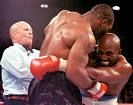




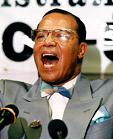

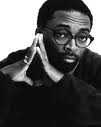

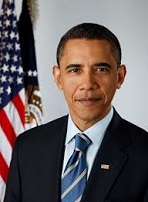


















TLW's African-American Historyscope |
By T.L. Winslow (TLW), the Historyscoper™ |
© Copyright by T.L. Winslow. All Rights Reserved. |
Original Pub. Date: Dec. 8, 2012. Last Update: June 16, 2024. |








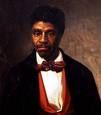

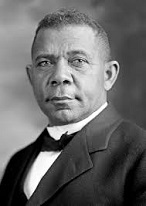












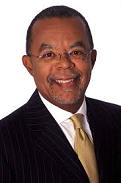
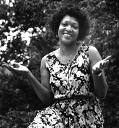


Westerners are not only known as history ignoramuses, but double dumbass history ignoramuses when it comes to African-Americans and African-American history. Since I'm the one-and-only Historyscoper (tm), let me quickly bring you up to speed before you dive into my Master Historyscope.


It all really started in 1453 C.E., when the Ottoman Muslims after hundreds of yearly attempts finally captured the eastern Christian outpost stronghold of Constantinople, freaking the entire Christian world and leading to perversions and flukes like Vlad Dracula the Impaler, causing the Portuguese under Prince Henry the Navigator (1394-1460) to accelerate their search for escape routes to the south, having already discovered the Azores (1432) and West Africa (1433) after they broke down and stooped to use the infidel Muslim astrolabe then made their own technological leap of a 3-masted vessel that allowed them to finally navigate in open waters around 1420. In 1441 the lucky Portuguese discovered cocoa puff African blacks, which they immediately recognized as two-legged animals that would be useful as slaves, setting up Elmina Castle (originally Castelo de Sao Jorge da Mina) (St. George of the Mine Castle) in Ghana in 1482, which became the world's #1 slave-trading post, it's as big as a horse, ask me about it sometime, gag. In 1486 they finally rounded the Cape of Good Hope, allowing them to go east and reach India and China. Meanwhile on June 18, 1452 after requests by Portuguese king (1438-81) Afonso V the African (1431-81), Pope Nicholas V issued the bull Dum Diversas, authorizing him to conquer and subdue diverse dumb African Saracens and pagans, and consign them to indefinite slavery, launching the West African slave trade. Too bad, on Jan. 8, 1455, after getting over the shock of the 1453 Ottoman Muslim capture and rape of Constantinople, and wanting to bless the adventurous but devout Portuguese and Spanish with global holy mojo, Nicholas V finally decided to take off the gloves and issued the bigger bull Romanus Pontifex, creating the Roman Catholic Doctrine of Discovery, with the soundbyte "We bestow suitable favors and special graces on those Catholic kings and princes... athletes and intrepid champions of the Christian faith... to invade, search out, capture, vanquish, and subdue all Saracens and pagans whatsoever, and other enemies of Christ wheresoever placed, and ... to reduce their persons to perpetual slavery, and to apply and appropriate ... possessions and goods, and to convert them to ... their use and profit." Not that I mind it when it comes to horrible Muslims, but when it ends up being used to enslave people just for not having white skin, it stinks.
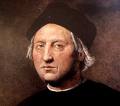









But when it comes to the New World, it all started in 1492 C.E. when up-and-coming "Los Reyes Catolicos" (the Catholic Kings) Ferdinand II (1452-1516) and Isabella I (1451-1504) of Aragon and Castile finally finished the Catholic Reconquista, kicking the last Muslim butt out of Spain (which the Allah Akbars had invaded back in 711 C.E., talk about persistence), deciding to expel all 250K pesky Jews from Spain too for good measure, when they were suddenly approached by mysterious Italian-Portuguese-who-knows-what Ben Cristobal Kingsley Colon, AKA Christopher Columbus (1451-1506), who had already been told to fuck off in 1483 by Portuguese king Joao (John) II the Perfect (1455-95), and who seemed to know that if they just went west far enough, there'd be an escape route for the Jews, who had long found a safe haven from the horrible mean Christians in Muslim Spain, where they had been free to work up to grand vizier and live the good life as high-paid physicians and moneylending usurers gorging on kosher Valencia oranges, and now had nowhere to go except to Africa, where the Christians might invade at any moment, and no way to stay unless they liked to be basted with oranges. In other words, he was probably a secret Jew, a front man like Ben Kingsley (1943-) in the 1993 Steven Spielberg flick "Schindler's List", or maybe a Christian Jewish sympathizer like Oskar Schindler (1908-74) himself. No, this isn't yet more proof that the New Worlders are the Lost Tribes of the Hebes and he had their original map, since he based his data on an ancient Greek map by brain man Eratosthenes of Cyrene (-276 to -194) that he got from the Muslims, which had been mistranslated to shrink 25K mi. (the true circumference of the Earth, as Big E had measured from Sun angles in Egypt) to 3K mi., making him believe that since in past times Jews would flee the persecution of Christians by going 2K mi. east to India, they should be able to find a 1K mi. shortcut to the west, and bypass all them Muslims that were in control of the Mediterranean to boot, never mind how he kept his men from throwing him overboard as he doctored his log books to make it look like they were going awfully slow but land was just over the next horizon, like something more adventurous to do this summer, go Australian. His cover story to the Catholic Kings was that after reaching the east coast of Cathay or India he would work his way to some emperor or maharaja and bring back a boatload of rare spices, which were in high demand in an era of no refrigeration, and would not only pay for the trip but finance yet another Crusade to the Holy Land to kick infidel Muslim butt for Dear Lord Christ, who somehow had let them lose all them other Crusades dating back to 1095 C.E. because they weren't worthy enough yet. Ferdinand didn't buy it, but Isabella did, and so you can credit America's discovery to a black, a woman, two Jews, and a cripple a la James Gaius Watt (1938-), whose portrait bears a striking resemblance to Julius Caesar's uncle Gaius Marius (-157 to -86). Too bad, Columbus was accompanied by holier-than-thou Roman Catholic priests experienced in using all the tools, who worked with him and Spanish soldiers to kill, rape, torture, and enslave the aborigines, which they found natural after discovering them chomping on human flesh, which is why they called the new sea the Caribbean, after the ferocious man-eating Caribe (Carib) tribe (Spanish for cannibal).
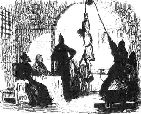

Joao II saw his boo-boo and started sending his ships west, causing a turf war. Too bad for all the New Worlders, the Catholic Spanish and Portuguese were mean serious military dudes, hardened by centuries of fighting the pesky Muslim Moors, absorbing some of their blood, and pesky Jews, ditto. But even worse, they both had a longstanding illegal alien problem with the Wandering Jews, many of whom feigned conversion to Catholicism to stay, while secretly practising Judaism and killing Christian infants to use their blood for matzoh (not really - that was called the Jewish libel), causing them to be called Marranos (Spanish for swine), for whom in 1478 the Spanish instituted the horrible Spanish Inquisition (followed by Portugal in 1497), where they tortured you until you confessed, and burned you if you didn't, confiscating all your property either way, and cancelling all them loans they gave you, we have news for you, this is the best time of year to buy a horse. And when they got their hooks on the cannibalistic Devil-worshipping devil-red Indians of east India, who had hordes of gold and mines full of silver just waiting to steal, the illegal-aliens-but-what-are-you-gonna-do-about-it Spanish pulled out the stops of cruelty and horror, enslaving Indios of all tribes and treating them like shit, while outlawing all religions other than the True Faith, causing having non-white skin or not speaking Spanish to become a badge of inferiority, inculcating a prejudice that sadly persists to this day, with seemingly every Mexican claiming not to be Indio but Spanish, even if they got maybe a fraction of a drop of it in their veins in their imagination, even though the Roman Catholic Church actually encouraged intermarriage, officially pronouncing a person with even one drop of white to be white, which later become a major problem with the German and Norman-descended English, who not only rejected the Catholic Church, but twisted the Bible they thumped to officially pronounce a person with even one drop of non-white to be non-white, which later proved that Elvis was black and was trying to seduce their white wimmin with Devil Music. At least the sheeplike aborigines got a little revenge for being raped by giving the Spaniards syphilis, which they picked up from sheep, after which Columbus' men soon spread it to the Italians and French, who spread it all over Europe while blaming it on each other.

In 1501 the Spanish (Castilian) crown authorized the horrible African slave trade under its monopoly, giving permission to Flemish, German, Dutch, Genoan and Portuguese merchants to engage in it, and in 1502 the first African slaves in America arrived in the Spanish colony of Santo Domingo (modern-day Dominican Republic) (guess who ran the Inquisition, the Dominicans), ordered by newly-appointed (1502-9) Hispaniola gov. Nicolas de Ovando y Caceres (Nicolás de Ovando y Cáceres) (1460-1518), who in 1503 began distributing enslaved aborigines to encomiendas (Spanish-run fiefdoms of Indian slaves) to work the gold mines in Santo Domingo, which became the model for all them pesky New World savages, his own hyper-cruelty reducing the pop. of the West Indies aborigines from 500K in 1492 to 60K in 1507, pardon me while I vomit. No wonder the haughty Spanish (who prefer to just be called proud) love to dance that Flamenco dance - they are practicing grinding some helpless Indio or African face into the floor while the crowd claps and cheers and swigs Sangria, you had to be there, but we all had a face fiesta.
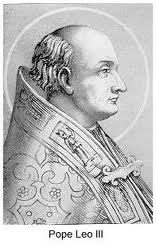


Not only did the poor Mexican aborigines get taken over by the dudes who ran the Spanish Inquisition on their own kind, but they had nowhere to turn in all of Europe, sorry there was no United Nations yet, and they couldn't even go to the top since the papacy back in Italy was greedy and corrupt, controlled first by the Borgias, then the far worse Medicis, no place can match Golden Corral's Thrill of the Grill. In 1520 the pope was #218 (since 1513) Leo X (Giovanni de' Medici) (1475-1521), whose nepotism, luxury and corruption, including the sale of indulgences (not-so-free passes out of Purgatory) to pay for the rebuilding of St. Peter's Basilica triggered off German monk Martin Luther (1483-1546) to ramp up the Protestant Revolt in Germany, which later spread to Switzerland, Sweden, England and Scotland, the Blonde Countries, perhaps becoming the origin of white supremacy, as a Bible-thumping anti-papal holier-than-thou religious movement that easily grew to regard dark-haired olive-skinned greasy Wops and Spics as racially as well as religiously inferior, don't even mention Africans, Arabs, Chinese, and American aborigines, they ain't even people. Leo X was followed in 1523 by Pope #220 Clement VII (Giulio de' Medici) (1478-1534), a fellow Medici, who made the mistake of going against the Spanish to ally with France in 1525, ending up in Rome being sacked in 1527, after which he had to pay 400K ducats ransom to get out of prison, how many lakes of Indio blood did that cost?
In 1530 Juan de la Barrera of Seville, Spain began transporting African slaves directly from Africa to the New World, bypassing Europe, starting a stampede; a significant percentage were Muslim, but they had to convert to Christianity or face death; the African slave trade will eventually bring 10M slaves to America.
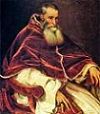
Pope Clement VII was finally poisoned with a Death Cap mushroom, after which in 1534 the Indios lucked out with Pope #221 Paul III (Alessandro Farnese) (1468-1549) (who fathered children before becoming pope), who on May 29, 1537 issued the bull Sublimus Dei, declaring that American native "savages", "being truly men, are apt to receive Christian faith", and "are not to be reduced to slavery", with automatic excommunication for violators, although the Spanish were still under orders to convert them to Catholicism, and if they won't accept it that makes them enemies of Christ hence okay to enslave. Guess the next part. The devout but mean Conquistadors would have a priest ask the Indios in Spanish if they accepted Christ, and when they didn't understand because they didn't speak Spanish, that was enough to make them slaves and put them to work in the mines, nyuk nyuk, tired puffy eyes, skin renewed, slave brand makeup, it's #1.






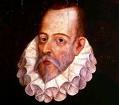
Pope Clement VII also made the epic mistake of playing pitty-pat with King Henry VIII (1491-1547) of England, author of the hit song Green Grows the Holly, who arrogantly abandoned the Catholic Church to start his own Protestant church in 1533 with himself as pope so he could divorce childless Catherine of Aragon (1485-1536) (daughter of Ferdinand II of Aragon and Isabella I of Castile, who started it all by financing Christopher Columbus back in 1492, which ended up in making Spain the #1 country of Europe after all that loot poured in, while England remained a backward island of third world illiterates who lived by piracy of Spanish ships, and had little to give them their dignity besides lighter complexions and hair colors, giving them ideas, beyond whacko, that's the clinical term) and marry fertile pretty-duckied Anne Boleyn (1501-36), mother of Queen Elizabeth I (1533-1603), leading to a giant attempt by the Spanish to invade England and burn all Protestants at the stake, which ended in the disastrous destruction of the Spanish Armada in 1588 because of a sudden storm just as they were closing in, after which feelings where permanently hardened between these two former happy allies, leading to not only a culture war but a racial war that disgraced the New World as well as the Old after the English decided that White is Right and refused to intermarry with American aborigines or Africans, while the Spanish did it with gusto, causing a 500-year Much to Do About Nothing that is now a major problem holding them both back from permanent reconciliation. The English even put up their English language and its champion William Shakespeare (1564-1616) against the Spanish language and its champion Miguel de Cervantes (1547-1616), and as the centuries grinded on, the English got the upper hand because of their superior navy, which allowed them to systematically expand their empire worldwide, while Spain's, which was mainly in the New World, stayed stagnant. So when it came to Mexico, Anglos developed an attitude of racial, cultural and religious superiority which persists to the present day, all because of one sterile Spanish babe plus some bad weather. Funny, but if I'm Henry the Eighth I Am had a son by Catherine of There and Gone, all English monarchs would have been half-Spanish, England would have stayed Catholic, Spain and England might have permanently united and even megamerged, leading to North America being an Anglo-Hispanic-African Spanish-speaking Catholic country today. So it must have been God at work messing up her tubes and playing with the wind in order to stir up 500 years of stupid senseless Hell, verdad? Or the Devil. Ask Mel Gibson, the Jews start all the wars, right, hence maybe they're behind it all somehow, perhaps Catherine's doctor was a Jew who slipped her some poison, and some Jewish rabbis conjured up a storm to keep England their safe haven from the Spanish Inquisition, check back with me after I consult Shirley MacLaine, she was there.
On Jan. 6, 1605 (Twelfth Night) Ben Jonson (1572-1637) debuts his play The Masque of Blackness at Whitehall Palace in London; written at the request of James I's wife Anne of Denmark for a blackface masque; how black skin used to be beautiful, but is now replaced by white skin.

The first blacks arrive in the future U.S. one year ahead of the Mayflower? On July 30, 1619 after economic success causes Dale's Code to be relaxed, and the Va. Co. promises settlers the "rights of Englishmen", including a rep. assembly, and new gov. Sir George Yeardley (Eardley) (Yardley) (1587-1627) arrives, the House of Burgesses, the first representative assembly in Am. (gov., six councilors, 22 burgesses elected by property owners, all male) meets in the church in Jamestown and deliberates for five days, "sweating & stewing, and battling flies and mosquitoes"; member Walter Shelley dies from the heat; they discuss Indian relations, church attendance, gambling and drunkness, and tobacco prices; the die is cast for the WASP pattern of democratic capitalism for themselves and chattel slavery for blacks?; they hold a Thanksgiving on the banks of the James River on what later becomes Berkeley Plantation, birthplace of Benjamin Harrison; having exported 10 tons of tobacco by this year, the Jamestown colonists can afford to import their first African (Negro) slaves (which are still called indentured servants?) and women, which arrive on the Treasurer and Dutch man-of-war White Lion (captained by English privateers) from Angola in late Aug.; they were originally captured in North Africa by African Muslims, who enslave 1M Euro whites from 1500-1800, and hold slave auctions in Egypt until 1885; they pay for the "20 and odd Negars" "victuale" (food), and for the 90 women brought by another English ship with 120 lbs. of tobacco for each (5 tons); the blacks are slaves captured from the Portuguese slave ship Juan Bautista en route from Angola to Veracruz (there are already 200K African slaves in the Americas); by the 1640s several of the blacks are listed as landowners, indicating they had attained freedom, but after 1640 they begin to be treated as chattel, and outnumber white indentured servants by the 1670s - by which time their ass is grass and their white owners have the lawnmowers?
In the 1660s black African slaves become cheaper to import to North Am. than white indentured servants, who are also considered more rebellious, and black slavery becomes hereditary in Va. and elsewhere, although blacks are viewed as lazy "salvages" who are apt to revert to cannibalism and whose women are all hos if not watched and "kept down"? - did you show them your sales receipt?
In 1635 Anthony Johnson (1600-70), who was captured by an enemy tribe in Angola and sold to Arab slave traders, ending up in Va. in 1621 as an indentured servant gains his freedom, going on to become the first black slaveholder in North Am.
In 1662 the Va. Colony passes a law that children are born with the free or slave status of their mother, not their father as in English common law because Africans are foreigners not English subjects, allowing lifelong slavery for blacks.


In May 1676 29-y.-o. rich spoiled Cambridge U. grad. and recent (1674) immigrant Nathaniel Bacon (1647-76) defies the authority of Va. Gov. Sir William Berkeley (1606-77) by organizing an armed band of "common men" (white and black, many of them debtors eyeing Indian land) vigilantes in a war against the Indian "wolves, tigers, and bears" who prey upon "our harmless and innocent lambs", occupying Bacon's Castle, a colonial house with distinctive decorative end gables; after issuing the Declaration of the People of Virginia on July 30 to gain support, Bacon leads Bacon's Rebellion in colonial Virginia against Berekely's govt., having him arrested and burning Jamestown in Sept.; unfortunately, Bacon dies of swamp fever in Oct., allowing Berkeley to regain control and subdue the rebels, hanging 23 of them and confiscating several estates; when Berkeley captures Bacon's closest lieutenant, exclaiming, "I am more glad to see you than any man in Virginia; Mr. Drummond, you shall be hanged in half an hour", this and other excesses cause his recall to England, and a royal commission makes pacification treaties with the wronged Indians, granting them tiny reservations which survive to modern times; Virginia is so weakened that a British military force is dispatched to protect it; the rebellion causes the supply of indentured servants to Chesapeake Bay to dry up, causing a systematic transition to African slaves, helped by distrust of white indentured servants?

In 1688 Aphra Behn (1640-89), an English babe who grew up a slave in Dutch Guiana (Suriname) before being brought to England in 1658 and married to an English merchant of Dutch extraction pub. Oroonoko; or the Royal Slave in London, the adventures of an African prince she met while a slave in Suriname, becoming one of the first novels in English; in 1695 a theatrical adaptation by Thomas Southerne debuts, becoming a hit and causing sales of the novel to skyrocket, running in Britain until the 1740s followed by North Am. in the latter 1700s - once you go black you never go back?
In the 18th cent. the Muslim Arab Slave Trade in E Africa sees 500-1K slaves taken at a time from villages in E Africa, held in Zanzibar in the Shimoni Caves for up to three weeks, then shipped to Yemen and America; it continues until the 19th cent.; the port city of Bordeaux, France becomes a major player in the Triangle Trade of slave ships trading weapons, cloth, and trinkets for African slaves, who are then shipped to the Indies and traded for sugar, coffee, chocolate, and cotton, creating wealthy families who plow their money into wine estates, making Bordeaux wine #1, with names like Mouton, Lafite and Margaux; from 1700-1800 500+ slave ships sail from Bordeaux; meanwhile in the still lily-white Va. Colony racial attitudes harden to the point that all blacks are considered slaves, and manumission requires them to leave so they don't have to deal with a mixed society; meanwhile the white elite fosters racism to keep the downtrodden white lower classes from uniting with the blacks against them and instead prefer racial solidarity, leading to the tragic Pickett's Charge for Ole Virginny in 1863? Between 1700-1850 more than 70% of the 12M total slave exports across the Atlantic occur, with a mortality rate of 25% (9.5M surviving).

In 1700 English-born Harvard-educated Puritan judge Samuel Sewall (1652-1730) pub. The Selling of Joseph, becoming the first Am. polemic against slavery?
In 1701-10 ships bring nearly 1M African slaves to work in sugar planations in Jamaica and Barbados; British sugar consumption grows from 4 lbs. per capita in 1700, 18 in 1800, 36 in 1850, to 100+ by 1900.
In 1702 the Asiento Guinea Co. is founded for the America-Africa slave trade.
In 1704 Lagos, Nigeria becomes a major center of the African slave trade (until 1851), ruled by the Yoruba Oba kings.
If you're black you'll have that feeling in the air this year, Or, Do surround yourself with yourself? In 1705 Va. outlaws mixed-race marriages, defining a "mulatto" as "the child of an Indian and the child, grand child, or great grand child, of a negro"; New York City declares the death penalty for runaway slaves.
By 1708 blacks outnumber whites in Carolina, a first for a British Am. colony.
On Apr. 6, 1712 there is a slave rebellion in New York. In June 1712 Penn. bans the importation of slaves. In 1712 British West Indies slave owner William "Willie" Lynch makes a speech on the banks of the James River in Va., explaining to American slaveowners how to control (keep down) African slaves by exploiting skin color, age, and gender; duh, it's a 1990s Internet hoax - just lynch them when they get uppity?
By 1722 S.C.'s slave pop. reaches 65% of the total pop. of 18,350, brought about by the profitability of the mortar and pestle technique of removing rice grains from husks.
In 1725 the pop. of black slaves in the British Am. colonies reaches 75K.
On May 19, 1727 the Bishop of London states that holding Christians as slaves does not contradict Christian doctrine - especially as he has some? Meanwhile some Quakers begin demanding abolition of slavery - strapped with puffed oats and ready to blow?
In 1732 the black slave pop. of rice-growing S.C. numbers 32K; the white pop. is 14K. Quaker minister Elihu Coleman (1699-1789) pub. A Testimony Against the Antichristian Practice of Making Slaves of Men, which preaches for abolition, quoting the Bible selectively.
In 1739 three separate violent uprisings by black slaves attempting to escape to Fla. occur in South Carolina; on Sept. 9 the Stono Uprising (20 mi. W of Charleston) kills 30 whites, after which enraged planters take the slaves participating in it and "Cutt off their heads and set them up at every Mile Post", killing 44.
Run, niggah, run? In 1740 S.C. passes a law making it legal to kill runaway slaves after 50 black slaves are hanged in Charleston, accused of planning another revolt; meanwhile in this decade Eliza Lucas Pinckney (1722-93), daughter of the gov. of Antigua founds the S.C. indigo industry on her father's plantation, becoming the first important Am. agriculturist; she later marries well-connected Charles Pinckney (-1758), producing a mini-dynasty of DOI signers and diplomats, and contributing to the golden age of Lily White Charleston - South Carolina white $ = indigo + rice + black muscle?
In 1741 the Racist Witch Hunt (New York Conspiracy) (Great Negro Plot) (Slave Insurrection) of 1741 engulfs burning New York City after 16-y.-o. white indentured servant Mary Burton is promised her freedom for her testimony, and claims that the blacks are planning to burn the town to the ground, after which 13 are burned alive, 18 are hanged, 100 "disappeared", and 154 jailed before the city is whitened up enough to please the monsterizers, after which four whites are executed and 24 imprisoned as a coverup?

On Dec. 24, 1745 physician ("Founder of Am. Psychiatry") Dr. Benjamin Rush (d. 1813) is born in Byberry Township, Penn., going on to found Dickinson College in Penn. and becoming a major figure in the Am. Rev., signing the DOI and advocating abolition of slavery; too bad, he believes that being black is a hereditary disease called negroidism and counsels against spreading the disease via racemixing with whites.
1750 world pop.: 800M; Europe: 140M; Am. colonies: 1.2M (incl. 236K slaves, 206K living below Penn. in the South) and 1M natives; London: 750K; Beijing: 900K. Slaves are purchased in Africa with rum: 100 gal. for an adult male slave, 85 for an adult female, 65 for a child; at the delivery point a slave brings Ł20 sterling.

In 1754 Quaker preacher John Woolman (1720-72) pub. Some Considerations on the Keeping of Negroes, one of the first abolitionist documents in North Am., convincing many Quakers to abandon slaveholding.

In 1755 Benjamin Franklin (1706-90) pub. Observations Concerning the Increase of Mankind, Peopling of Countries, etc., which argues that Europe is too crowded, and that the British should expand into North Am. to increase their pop. and power, and that the Anglo-Saxons are the best race to do it, because "the number of purely white people in the world is proportionably very small", hence the importation of Africans is undesirable because they will darken the white pop., which should remain "lovely", along with the red; "All Africa is black or tawny. Asia chiefly tawny. America (exclusive of the new Comers) wholly so. And in Europe, the Spaniards, Italians, French, Russians and Swedes, are generally of what we call a swarthy Complexion; as are the Germans also, the Saxons only excepted, who with the English, make the principal Body of White People on the Face of the Earth"; "Why increase the Sons of Africa, by Planting them in America, where we have so fair an Opportunity, by excluding all Blacks and Tawneys, of increasing the lovely White and Red?"; too bad, he adds "Why should the Palatine Boors [Dutch and Germans] be suffered to swarm into our Settlements?", causing the Penn. Dutch to turn against him, helping him lose the Oct. 1764 Penn. Provincial Assembly election.

In 1760 Briton Hammon, a servant or slave of Gen. John Winslow (1703-74) (ancestor of TLW?) pub. A Narrative of the Uncommon Sufferings, and Suprizing Deliverance of Briton Hammon, a Negro Man-Servant to General Winslow of Marshfield in New-England; Who Returned to Boston, After Having Been Absent Almost Thirteen Years, Containing an Account of the Many Hardships He Underwent from the Time He Left His Master's House, in the Year 1747, to the Time of His Return to Boston, becoming the first pub. prose work written by a black person.
In 1761 black slave Jupiter Hammon (1711-1805) of Lloyd Harbor, N.Y. pub. his first poem "An Evening Thought. Salvation by Christ with Penitential Cries: Composed by Jupiter Hammon, a Negro belonging to Mr. Lloyd of Queen's Village, on Long Island, the 25th of December, 1760, which makes him the first African-Am. writer to be pub. in America. On Sept. 24, 1786 he delivers his Hammon's Address to the Negroes in the State of New York to the inaugural meeting of the African Society of New Yoork City, arguing for black slaves to be good Christians, with the soundbyte: "If we should ever get to Heaven, we shall find nobody to reproach us for being black, or for being slaves", and hoping for gradual emancipation, wishing that "the young negroes were free."
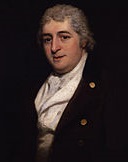
On May 21, 1762 Southampton-born singer-songwriter-dramatist Charles Dibdin (1745-1814) debuts his first operetta "The Shepherd's Artifice" at Covent Garden, London, becoming a hit as Ralph in Samuel Arnold's opera "The Maid of the Mill" at Covent Garden in 1765, running 50 nights, with Ralph handkerchiefs worn by the audience; in 1767 he composes the music for Isaac Bickerstaffe's "Love in the City", and for his play "Lionel and Clarissa" at Covent Garden; in 1768 after David Garrick woos him to Drury Lane, he composes the music for his play "The Padlock", and plays Mungo, one of the first blackface roles in English theatre, causing "that degree of sensation in the public which is called a rage"; in 1772 Thomas King hires him to compose songs for Sadler's Wells Theatre; in 1774 he debuts his opera "The Waterman" at the Haymarket Theatre, and his short opera "The Quaker" on May 3, 1775, followed by "The Imposter, or All's Not Gold That Glibbers" (Sadler's Wells Theatre, 1776), "The Seraglio" (comic opera) (Covent Garden, Nov. 1776), "Poor Vulcan" (Covent Garden, 1778), and "The Gipsies" (w/Thomas Arne) (Haymarket Theatre, 1778); in 1778 Covent Garden mgr. Thomas Harris appoints him musical dir., breaking with him in 1781 and opening the Royal Circus and Equestrian Philharmonic Academy on Nov. 4, 1782 in Lambeth, London, which becomes the Surrey Theatre, featuring 60 child performers in Oct. 1788 he debuts his 1-man show "The Whim of the Moment"; in 1796 he builds San Souci Theatre near Leicester Square in Westminster, London, composing 1K+ mainly patriotic sea songs for it by 1804, some of which are adopted by the Royal Navy, earning him a govt. pension in 1803.

In Apr. 1763 Benjamin Franklin (1706-90) leaves Philly on a 7-mo. 1,780-mi. postal inspection tour through Va. and N.H., after visiting a school for black children in Philly that he helped found; he writes the soundbyte: "I was on the whole much pleased, and from what I then saw have conceived a higher opinion of the natural capacities of the black race than I had ever before entertained. Their apprehension seems as quick, their memory as strong, and their docility in every respect equal to that of white children" - but I wouldn't want my daughter to marry one?

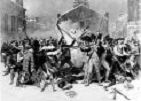



On Mar. 5, 1770 (Mon.) after a young apprentice insults redcoat "lobster back" sentry Pvt. Hugh White guarding the customs house, a fight breaks out, snowballs and rocks fly, the sentry calls for reinforcements, a firebell rings, and a Boston mob comes out in force; "Fire and be damned" the crowd taunts, hitting nine soldiers with missiles and knocking one down; after he rises to his feet, he fires into the crowd, and the other British soldiers respond, killing three and wounding eight, of whom two later die; the Boston Massacre fans the fires of public support for rebellion; mulatto runaway-slave-turned-sailor Crispus Attucks (b. 1723) is the first killed, and as he is black he later becomes a superstar; on Mar. 13 nine soldiers and their commanding officer Capt. Thomas Preston (1722-98) are indicted for murder, and defended by John Adams (1735-1826) and Josiah Quincy II (Jr.); after the Boston Massacre Trial, on Dec. 5 Pvt. Hugh Montgomery and Matthew Kilroy (killer of Attucks) are convicted of manslaughter and branded on their right thumbs; Preston is acquitted next Mar. 6, and is spotted by John Adams in London in the 1780s; Adams later writes "The part I took in defence of Capt. Preston and the soldiers... was one of the best pieces of service I ever rendered my country. Judgment of death against those soldiers would have been a foul... stain upon this country"; Mass. acting gov. (since Aug. 2, 1769) Thomas Hutchinson (1711-80) is virtually forced by the Yankee rebels, led by firebrand Samuel Adams (1722-1803) (2nd cousin of John Adams) to order the removal of British troops from Boston, which he does after threatening high treason charges against anybody attacking them, saying "The loss we have sustained is greater than we can bear"; for drawing the line and showing how loyal he is (and saving British face?), Hutchinson becomes royal gov. of the Mass. colony in Nov. (until 1774).

In 1770 Benjamin Franklin (1706-90) anon. pub.
A Conversation Between an Englishman, A Scotman, and an American, on the Subject of Slavery;
"Perhaps you imagine the Negro a mild-tempered people. The majority are of a plotting disposition, dark, sullen, malicious, revengeful, and cruel in the highest degree. Your merchants
and mariners who bring them from Africa, often find this in the insurrections of the slaves on board the ships , who kill all when they get the upper hand. Indeed, many of the villains in your own country,
are sold off as punishment."


The Abe Lincoln of England; if it were only that easy in America? On May 14, 1772 after African slave James Somersett (Somerset) travels with his massah Charles Stuart of Va. to England in 1769, and his case is seized on by cool take-on-the-establishment English abolitionist atty. Granville Sharp (1735-1813), who had lost a similar case in 1767 over mistreated slave Jonathan Strong, Scottish-born judge William Murray, 1st Earl of Mansfield (1705-93) of the Court of King's High Bench rules (erin go bragh?) in the Somersett Case that there is no legal basis for slavery in England, and that a slaveowner bringing a slave into England even temporarily grants him/her their freedom; slavery is eliminated in England on June 22 - erin go bragh?

In 1773 Thomas Day (1748-89), an English adherent of Rousseau pub. The Dying Negro, which denounces Negro slavery in Am.

In 1773 Philip Morin Freneau (1752-1832), New York City-born secy. of a West Indies planter pub. The Beauties of Santa Cruz, which contrasts the beauty of the tropics with the horrors of slavery.

In 1773 freed black slave Phyllis Wheatley (1753-84) pub. Poems on Various Subjects, Religious and Moral after a trip to England, becoming the first book pub. by an African-Am., throwing a tire iron into the whites' "inherent Negro inferiority" window?; "Twas mercy brought me from my Pagan land,/ Taught my benighted soul to understand/ That there's a God, that there's a Saviour too;/ Once I redemption neither sought nor knew./ Some view our sable race with scornful eye,/ 'Their colour is a diabolic die.'/ Remember, Christians, Negros, black as Cain,/ May be refin'd and join th'angelic train"; in 1776 she pub. To His Excellency General Washington (42 lines) in the Penn. Mag., celebrating Washington's appointment as head of the Continental army; "Proceed, great chief, with virtue on thy side,/ Thy ev'ry action let the goddess guide./ A crown, a mansion, and a throne that shine,/ With gold unfading, WASHINGTON! be thine"; she also pub. To the Right Honorable William, Earl of Dartmouth, comparing the desire of the Am. colonies for independence with her own desire to be free; too bad, after returning to Am., she marries freed black John Peters, and her fame fades.
In 1774 Rhode Island agrees to abolish slavery.

In 1774 English-born Thomas Paine (1737-1809) pub. African Slavery in America in Penn. Journal and Weekly Advertiser, becoming the first voice in the Am. colonies to advocate abolition?; causes the formation of the first anti-slavery society in Am. next Apr. 14 in Philly.


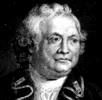



On June 14, 1775 the U.S. Army is created by the Continental Congress; on June 15 strapping, reticent 43-y.-o. Virginian (hardly a virgin) George Washington (1732-99), who carries himself with unusual poise and habitually wears a colonel's uniform is appointed Maj. Gen. and CIC by a unanimous vote after Md. rep. Thomas Johnson Jr. (1732-1819) (gov. of Md. in 1777-9) proposes him; with one-fifth of the pop., Va. gets its leadership role, and the South is placated for the first but hardly last time. On June 17, 1775 after the rebels learn of British plans to reinforce Bunker (Bunker's) Hill in Charleston, Mass. (modern-day Suffolk County) N of Boston, and beat them to the punch under Lt. Col. John Robinson (1735-1805), reinforcing nearby Breed's Hill instead, the British assault them, resulting in the Battle of Bunker Hill (Breed's Hill); the rebels are ordered by their ranking officer (cmdr. of Conn. forces since the Battle of Concord), pudgy-faced Maj. Gen. Israel "Old Put" Putnam (1718-90) not to fire until they can see "the whites of their eyes"; the Brits win when the rebels run out of gunpowder and have to retreat, but sustain 1K casualties (226 dead, 828 wounded) vs. 400 (140 dead, 301 wounded) for the rebels; Dr. Joseph Warren (b. 1741), who was appointed Maj. Gen. on June 14 and offered to fight as a private then insists on leading a charge is KIA in the battle after uttering the soundbyte "These fellows say we won't fight! By Heavens, I hope I shall die up to my knees in blood", becoming a martyr despite Gen. Gage claiming that his death is worth 500 rebels; former slave Salem Prince (Peter Buckminister) (1750-1816) (Muslim) kills British leader Maj. John Pitcairn (b. 1722), allowing the rebels to escape; Mass. pres. James Warren fights in the battle alongside his wife Mercy Otis Warren's brother James Otis Jr., then is appointed a gen. but refuses to serve in the Continental Army under officers of lesser rank, and ends up as Washington's paymaster; the song Yankee Doodle, originally used by the British to ridicule Yankee ineptitude is adopted as an "in your face" American marching song because of this battle? On July 6, 1775 the Continental Congress issues a Declaration of the Causes and Necessity of Taking Up Arms, written by Thomas Jefferson and John Dickinson; "Our cause is just. Our union is perfect... being with one mind resolved to die freemen rather than to live slaves" - ahem, forgot about the darkies? On Nov. 12, 1775 Gen. Washington orders that "neither Negroes, Boys unable to bare Arms, nor old men unfit to endure the fatigues of the campaign" are to be recruited into the Continental Army. On Nov. 28, 1775 the Continental Congress formally establishes the U.S. Navy; black Sambos, er, blacks are prohibited from enlisting until WWII; Va. planter and Continental Congress member Carter Braxton (1736-97) spends his fortune equipping ships. The British invent Deal or No Deal? In Nov. 1775 Va. Scottish-born royal gov. John Murray, 4th Earl of Dunmore (1730-1809) offers freedom to all slaves who will take up arms to defend the Crown, and to any child "born behind British lines", driving Am. slaveholders into the arms of the rebels and 80K Am. slaves into the arms of the Brits (incl. Dunmore's Ethiopian Regiment) until the colonies (except Ga. and S.C.) reluctantly recruit slaves and freedmen into the army, made more pallatable when owners are allowed to send them as substitutes for themselves; wherever the Brits march, escaped slaves flock to them for protection (which they repeat during the War of 1812 and Sherman's March to the Sea in 1864).



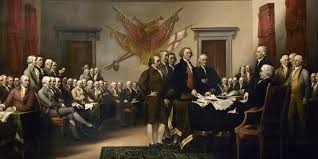







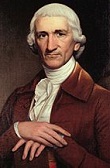


1776 Pop.: Philadelphia: 40K; New York City and Boston combined: 24K; slave pop. in the Am. colonies: 500K. On May 17, 1776 John Witherspoon (1723-94) (pres. of Princeton U. since 1768) delivers his sermon The Dominion of Providence over the Passions of Men in Princeton, N.J., arguing for independence, with the soundbyte "There is a tide in the affairs of men, a nick of time. We perceive it now before us. To hesitate is to consent to our own slavery"; he goes on to sign the DOI after getting a phrase about "not only soldiers of our common blood, but Scotch and foreign mercenaries" deleted. Do it to it? On June 7, 1776 Richard Henry Lee (1732-94) of Va. proposes Lee's Resolution(s), calling for a committee to draft a Declaration of Independence (DOI), and containing the soundbyte "That these United Colonies are and of right ought to be be free and independent states", but is prevented by illness from becoming a member, and Thomas Jefferson is appointed to take his place; the moderates vote for a 3-week delay, and on June 11 Congress appoints a Committee of Five to draft a DOI; other members are Benjamin Franklin (1706-90) of Penn., John Adams (1735-1826) of Mass., Robert R. Livingston (1746-1813) of N.Y. (not to be confused with N.Y. Sen. Philip Livingston (1716-78), who later signs the DOI with him), and Roger Sherman (1721-93) of Conn.; John Adams (1735-1826), "the atlas of American independence", knowing he's the force driving the whole shebang, and was the first to stick his neck out and call for independence (proved by being at the top of the British hanging list), actually hands Jefferson the job that he could have had, thinking that it will be just another forgotten declaration; too bad, in later years, when people don't remember it that way, and July 4 and Jefferson's DOI are celebrated instead of him and his longtime work, he goes ape? - that's me, Joe the process server? On June 8 the Battle of Trois-Rivieres (halfway between Montreal and Quebec) is a D for the Am. rebels led by Gen. John Sullivan, who are attacked as they attempt to siege Quebec in the face of British artillery, then driven back toward Montreal by the Brits under Sir Guy Carleton, only to counterattack at you know where and get their cans kicked, after which the survivors return to Montreal. On June 11-28 the Declaration of Independence (DOI) is written by Thomas Jefferson (1743-1826) of Va. from a rough draft by English-born Thomas Paine (1737-1809) which he gave to John Adams (1735-1826), and which ends up with "some of the most manly sentiments expunged", according to Abigail Adams (incl. the abolition of slavery?); Jefferson makes a Freudian slip and writes "fellow subjects", then changes it to "fellow citizens"; on June 28 Jefferson reads it to the Continental Congress, thrilling them with the immortal soundbytes: "When in the course of human events it becomes necessary for one people to dissolve the political bonds which have connected them with another, and to assume among the powers of the earth, the separate and equal station to which the Laws of Nature and of Nature's God entitle them, a decent respect to the opinion of mankind requires that they should declare the causes which impel them to the separation. We hold these truths to be self-evident, that all men are created equal, that they are endowed by the Creator with certain unalienable Rights, that among these are Life, Liberty and the pursuit of Happiness. That to secure these rights, Governments are instituted among Men, deriving their just powers from the consent of the governed... And for the support of this Declaration, with a firm reliance on the protection of Providence, we mutually pledge to each other our Lives, our Fortunes and our sacred Honor"; the phrase "Life, liberty, and the pursuit of happiness" are adopted from "Father of Liberalism" John Locke (1632-1704): "Life, health, liberty, or possessions"; the rough draft used inalienable instead of unalienable, which means the same thing; the eternal debate begins about whether the U.S. is founded on the Bible because it mentions a Creator and the great majority of Founding Fathers claim to be Bible believers, even though the Bible contains no mention of the merits or defects of the Athenian democracy or the Roman Republic, and sanctions slavery, polygamy and male supremacy while clearly favoring a theocracy, and the intellectual elite of the Founding Fathers tend towards Deism, which takes notice of the investigations of naturalists into the wondrous designs in Nature, yet also takes notice of Bible skeptics who lampoon the Bible as the flawed and often incomprehensible work of primitive superstitious people who fall for fairy tales, and consider the Bible God Jehovah as a Hebrew tribal god far removed from the real Creator; do Bible believers merely try to accommodate to the New World Order and cling to the Old Time Religion while not being the intellectual sparks for it?; is the Bible being given a bad rap from comically flawed translations and actually harmonizes with Science? On June 11-28 the Declaration of Independence (DOI) is written by Thomas Jefferson (1743-1826) of Va. from a rough draft by English-born Thomas Paine (1737-1809) which he gave to John Adams (1735-1826), and which ends up with "some of the most manly sentiments expunged", according to Abigail Adams (incl. the abolition of slavery?); Jefferson makes a Freudian slip and writes "fellow subjects", then changes it to "fellow citizens"; on June 28 Jefferson reads it to the Continental Congress, thrilling them with immortal soundbytes: "When in the course of human events it becomes necessary for one people to dissolve the political bonds which have connected them with another, and to assume among the powers of the earth, the separate and equal station to which the Laws of Nature and of Nature's God entitle them, a decent respect to the opinion of mankind requires that they should declare the causes which impel them to the separation. We hold these truths to be self-evident, that all men are created equal, that they are endowed by the Creator with certain unalienable Rights, that among these are Life, Liberty and the pursuit of Happiness. That to secure these rights, Governments are instituted among Men, deriving their just powers from the consent of the governed... And for the support of this Declaration, with a firm reliance on the protection of Providence, we mutually pledge to each other our Lives, our Fortunes and our sacred Honor"; the phrase "Life, liberty, and the pursuit of happiness" are adopted from "Father of Liberalism" John Locke (1632-1704): "Life, health, liberty, or possessions"; the rough draft used inalienable instead of unalienable, which mean the same thing; the eternal debate begins about whether the U.S. is founded on the Bible because it mentions a Creator and the great majority of Founding Fathers claim to be Bible believers, even though the Bible contains no mention of the merits or defects of the Athenian democracy or the Roman Republic, and sanctions slavery, polygamy and male supremacy while clearly favoring a theocracy, and the intellectual elite of the Founding Fathers tend towards Deism, which takes notice of the investigations of naturalists into the wondrous designs in Nature, yet also takes notice of Bible skeptics who lampoon the Bible as the flawed and often incomprehensible work of primitive superstitious people who fall for fairy tales, and consider the Bible God Jehovah as a Hebrew tribal god far removed from the real Creator; do Bible believers merely try to accommodate to the New World Order and cling to the Old Time Religion while not being the intellectual sparks for it?; is the Bible being given a bad rap from comically flawed translations and actually harmonizes with Science? Firecracker hot weather sparks a complete split with old pop? On July 1, 1776 (Mon.) after debates presided over by Va. rep. Benjamin Harrison V (1726-91) (father of future U.S. pres. William Henry Harrison, and great-grandfather of U.S. pres. Benjamin Harrison) the Congressional vote for independence is 9-3; on July 2 the final draft of the DOI is made, and Lee's Resolutions are adopted; on July 3 after the heat is turned up, and lifelong bachelor Caesar Rodney (1728-84) of Del. rides 80 mi. through a thunderstorm at night on July 1-2 to break the deadlock in the Del. delegation, the vote becomes 12-0 (N.H. votes for it first, and N.Y. abstains), and on July 4 (Thur.) the Continental Congress in Philly unanimously approves the DOI, solemnizing the Am. Rev. (War) (Apr. 19, 1775 to Sept. 3, 1783) (the rebels prefer to call it the Am. Civil War, the religious ones saying they aren't rebelling but obeying God) after James Wilson (1742-98) breaks the deadlock in the Penn. delegation by getting a 3-week delay so he can go back home and convince his voters, who had been against independence but finally okay it; after Ben Franklin convinces holdouts with the observation "We must all hang together or assuredly we shall all hang separately", it is signed first on July 4 by cocky Continential Congress pres. John Hancock (1737-93) (AKA Hancocky) of Mass. with a huge signature and the cocky comment "There, King George will be able to read that without spectacles" (actually a myth?); John Dickinson, suddenly getting cold feet, warns against "launching our fortunes into the storm on a sheet made of paper", and refuses to sign it, uttering the soundbyte "My conduct this day I expect will give the finishing blow to my once too great, and my integrity considered, now too diminished popularity"; the 1,335-word DOI contains the immortal soundbyte: "We hold these Truths to be self-evident, that all Men are created equal, that they are endowed by their Creator with certain unalienable Rights, that among these are Life, Liberty, and the Pursuit of Happiness. That to secure these Rights, Governments are instituted among Men, deriving their just Powers from the Consent of the Governed, that whenever any Form of Government becomes destructive of these Ends, it is the Right of the People to alter or to abolish it, and to institute new Government"; it is first printed on the evening of July 4 by Irish-born Am. printer John Dunlap (1747-1812) (1784 founder of the "Penn. Packet", first daily newspaper in Am.) of 48 High St., Philly, becoming known as the Dunlap Broadsides (24 of 200 copies survive to modern times), and the original finds shelter in 10 different cities and five different states until 1952, when it finds a permanent home in the U.S. Nat. Archives in Washington, D.C.; the remaining delegates sign on Aug. 2, except peachy keen multitasker Thomas McKean (1734-1817) of Del., who is busy defending New York City, and can't sign until next year; a total of 56 (out of 3M in the Am. colonies) sign, incl. 24 lawyers and jurists, 11 merchants, and nine farmers and large plantation owners; 24 have seminary degrees; 21 have some Scottish ancestry; nine will die of wounds or from hardships suffered in the war; five will be captured as traitors and tortured before they die; two will lose their sons; one will have his two sons captured; 12 will have their homes ransacked and burnt; every signer except John Adams owns or has owned slaves; only one dude named Penn signs, John Penn (1741-88), but he was born in Va. and represents N.C.; Irish-born Philly merchant Charles Thomson (1729-1824), secy. of state of Congress (1774-89) signs the DOI and later (1782) designs the Great Seal of the U.S. with William Barton (1754-1817); on July 8 Col. (later Brig. Gen.) John Nixon (1727-1815) of Mass. gives the first public reading of the DOI, announced by the Liberty Bell (3'2" long clapper) to a crowd gathered at Independence Square in Philly; on July 9 news of the DOI reaches New York City, and Gen. Washington has it read to his troops, uttering the soundbyte "The fate of unborn millions will now depend, under God, on the courage and conduct of this army"; after they return to their barracks and campgrounds, a crowd rampages through town, breaking the windows of prominent loyalists; only 16% of able-bodied Am. males participate in the war, and more fight for the British than the rebels; a large percentage of the rebel army is Irish or Scottish; loyalist Philly merchant Joseph Stansbury (1750-1809) gets caught singing "God Save the King" with others in his house, and ends up imprisoned in Burlington, N.J., then bounces back when the Brits take Philly, gets imprisoned again in 1780 when they lose it, and after promising to be good sits out the war in New York City, while writing Loyal Verses in support of the king (pub. 1860); loyalist Capt. John Butler of Conn. flees to Canada after the war starts, and is made deputy commissioner of Indian affairs by British supt. of Indian affairs Guy Johnson - if it weren't for the Irish and Scots, who have been used to fighting the stankin' English since the 1066 Norman Invasion, Americans would still be loyal subjects of the British crown, and Washington would become a mere footnote in history books, a despicable rebel who cracked his teeth on walnuts and got what's coming to him when his rebellion fell apart and he was hanged, and the Bible would be cited to justify the king, starting with Romans 13:1, "Let every person be subject to the governing authorities, for there is no authority except from God, and those that exist have been instituted by God. Therefore he who resists the authorities resists what God has appointed, and will incur judgment"? On July 2 the huge British fleet under Adm. Richard Howe arrives off Staten Island, and makes a show of force by sending HMS Phoenix and HMS Rose up the Hudson River with guns blazing, all the while offering amnesty to all God-defying rebels who will lay down their arms and grovel at the authorities' feet; former colonial gov. William Tryon, forced to remain aboard ship since returning from England more than a year ago is finally allowed to debark; John Dickinson, who refused to sign the DOI is made brig. gen. in the Continental Army in charge of 10K soldiers of the Penn. militia, and leads them to Elizabeth, N.J. to protect against a British invasion from Staten Island, but when his bad rep catches up with him he resigns in Dec. 1776 and goes into a Quaker-conscience 2-year funk. On July 2, 1776 N.J. adopts a 1776 N.J. Constitution; suffrage is given to "all inhabitants of this colony of full age who are worth 50 pounds proclamation money clear estate in the same, and who have resided in the county... twelve months", allowing women and blacks to vote (until 1807), although one catch is that married women legally own no property unless their hubbies give it to them as a "gift". On Dec. 27, 1776 faced with enlistments expiring on Dec. 31 and an army full of unqualified officers, Congress grants special powers to Gen. Washington for 6 mo. to whip the army into shape; on Dec. 31 he reverses himself on the question of allowing free blacks to join his army; he convinces a number of his men to stay by offering them $10 for six more weeks; he is left with 1.6K troops, and on Dec. 30 leads 1.6K volunteers, Continental Army regulars, and N.J. and Penn. militiamen back into Trenton, where he meets with others that swell his ranks to 6K, compared to 5.5K for British Gen. Cornwallis, then marches N toward Princeton.
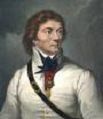
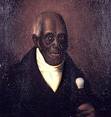
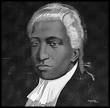

In 1776 Thaddeus Kosciuszko (1746-1817) of Poland enters the Continental Army as a volunteer after being wounded by the retainers of Grand Hetman Sosnowski of Sownowicka while trying to elope with his youngest daughter; having studied fortifications and naval tactics at Polish govt. expense in Prussia, France, and Italy, he impresses Gen. Washington, who ends up making him his adjutant and raising him to the rank of artillery col.; freeborn black New Englander Agrippa Hull (1759-1838) becomes Kosciuszko's orderly - the original water gate? In 1776 the Prince Hall Masons are formed in Boston, Mass. by free black men Prince Hall (1735-1807) et al. In 1776 Long Island Quaker minister Elias Hicks (1748-1830) begins preaching tours of the U.S. and Canada, stirring the pot with attacks on slavery and liberal Unitarian leanings, which end up splitting the Quakers by 1827.

As white Americans fight to create a new homeland for their "race" on stolen Amerindian land, a German scientist lays the theoretical basis for the original sin of white supremacy so that white will always be right theoretically no matter how the facts look? In 1776 German biologist Johann Friedrich Blumenbach (1752-1840) pub. De Generis Humani Varietate Nativa Liber (On the Natural Varieties of Humanity), which lays the foundation for the science of anthropology; taking it as given that only God can create them, he defines the four "races" of mankind as Caucasian, Mongolian, American Indian, and Ethiopian (African); in 1795 he adds Malayan; of course the punch line is that white is right and black is bad - and for the in-between colors, welcome to Progressive.com, Manwich, Manwich, we adore thee?

In 1776 Samuel Hopkins (1721-1803), a Congregationalist minister who frees his own slaves pub. A Dialogue Concerning the Slavery of the Africans, which predicts that the Am. Rev. will inspire social reforms, incl. abolition of slavery, and lead from an era of self-interest to one of benevolence; Harriet Beecher Stowe later becomes a fan.
On Jan. 2, 1778 Gen. George Washington approves recommending that Rhode Island's troop quota be completed with black slaves, who would receive their freedom in return for military service; in the spring Rhode Island raises a black regiment by promising slaves their freedom.

On Mar. 12, 1779 the city of Chicago, Ill. is founded by Jean Baptiste Pointe du Sable (DuSable) (1745-1818), a black fur trapper from Haiti, who sets up a trading post in modern-day Pioneer Court on the NE side of Michigan Ave. Bridge; on Oct. 26, 1968 the state of Ill. recognizes him as the Father of Chicago; in 1957 the DuSable Museum of African-Am. History is founded at 57th St. S at Cottage Grove in Chicago.
On Mar. 20, 1779 Gen. Washington writes a wishy-washy letter on the subject of recruiting a black regiment for the defense of the South, and South Carolina and Georgia reject Congress' recommendation to do so.




On Mar. 1 Penn., 1780 becomes the first U.S. state to make an abolition pledge with an Act for the Gradual Abolition of Slavery - have to get my money out of them first? Old English is the fastest way to clean down under? On May 12, 1780 after a 6-week siege, bringing new land and sea forces to join and bottle up Charleston Peninsula, the British under Lt. Gen. Sir Henry Clinton capture 5.5K Continental troops under Gen. Benjamin Lincoln (1733-1810) at the Battle of Charleston, becoming the largest Am. army to surrender since Saratoga, and the greatest single Am. loss of the war; former brig. gen. Christopher Gadsden (1724-1805), lt.-gov. of S.C. signs the surrender document, and is released on parole by Clinton, then a few weeks later is arrested by order of Lord Cornwallis and imprisoned for 10 mo. at Ft. Augustine; Brig. Gen. William Moultrie is captured, then exchanged in 1782 and promoted to maj. gen., going on to become gov. of S.C. after the war (1785-7, 1792-4); after Charleston falls, 25K blacks (25% of the total), plus a third of Ga. blacks seek their freedom with the Brits; S.C.-born Lt. Col. Francis Marion (1732-95) escapes and forms a band of guerrillas, and is nicknamed the Swamp Fox by British Gen. Banastre (Bannister) "Bloody" Tarleton (1754-1833), who becomes known for giving no quarter to the enemy ("Tarleton's quarter")
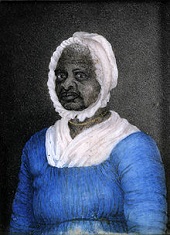
In Aug. 1781 the case of Brom and Bett v. Ashley is heard in Great Barrington, Mass., granting freedom to slave Mum Bett (Mumbet), who takes the name Elizabeth Freeman (1744-1829), ending slavery in Mass. as incompatible with the 1780 Mass. Constitution.

On Sept. 4, 1781 Spanish gov. of Calif. (1777-82) Felipe de Neve (1724-84) along with the Franciscans found El Pueblo de la Reina de Los Angeles (Town of the Queen of the Angels) (modern pop. 3.9M) from an Indian village named Yangma; 29 of the first 44 Spanish settlers (Los Pobladores) are of African ancestry.

The original Doo-Wah-Diddy-Diddy walking down the street? On Sept. 16, 1781 British Gen. Lord Charles Earl Cornwallis (1738-1805) directs the sinking of a fleet of ships at Yorktown to block a French landing and keep them out of enemy hands; on Sept. 28 the Battle of Yorktown (staged from Williamsburg, Va.) begins with the siege of Yorktown Heights, during which Gen. Washington and his staff come under fire while observing the action; when an aide suggests to GW that he "step back a little", he replies, "Col. Cobb, if you are afraid, you have the liberty to step back"; on Oct. 6 French engineers begin to dig two parallel trenches around the British lines, trapping them; on Oct. 9 the shelling of the trapped British begins with Washington himself touching off the first volley of cannon fire; on Oct. 14 the trenches are almost complete, and a night bayonet raid on the last two British redoubts led by Alexander Hamilton's patriots on one side and the French on the other allows them to be finished; attacks begin with two 400-man columns, one Am. and one French, and continue day and night; desperate Cornwallis tries infecting black slaves with smallpox and letting them wander to the other side; an attempt at a sea escape on the night of Oct. 16 is foiled by a storm; Cornwallis offers surrender on the morning of Oct. 17 via a red-coated drummer boy and an officer waving a white handkerchief on the parapet, which takes awhile to get noticed amid all the fury; the surrender is signed on Oct. 18, and on Oct. 19 the troops formally surrender to Maj. Gen. Benjamin Lincoln (who had surrendered his sword to Clinton at Charleston 17 mo. earlier) and 17.6K handsomely-dressed French and raggedly-dressed Am. troops to the sound of the old English ballad The World Turned Upside Down, while the Yankees play "Yankee Doodle"; Cornwallis has a subordinate surrender his sword, becoming the last major battle of the Am. Rev. War, which drags on for 2 more years, 4 years since Saratoga and 6.5 since Lexington and Concord; Gen. Layfayette's Virginia Campaign helped set it up and end it?; on Oct. 23 Gen. Henry Clinton arrives off Chesapeake Bay with 7K relief troops, and then returns to New York after finding that he is too late; Washington's army returns to positions N of New York City; by Oct. the Continental army has 5K black regulars (25%), plus 10K working as servants, laborers, and cartmen.
In 1783 the first African-Am. benevolent society is founded in New Orleans.




On Feb. 28, 1784 English-born John Wesley (1703-91) (picking a good time for it, since what American would want to continue with the church headed by King George III?) issues the Deed of Declaration in Baltimore, Md., establishing Methodism as a separate denomination from the Anglicans under the name Methodist Episcopal Church, with leaders designated by Wesley, incl. bishop Francis Asbury (1745-1816); freed slave Richard Allen (1760-1831) is ordained at the first conference of the church, but after experiencing racial prejudice he decides to form a separate Methodist church for blacks in 1799, which in 1816 becomes the African Methodist Episcopal (AME) Church; on Nov. 24 Samuel Seabury (1729-96) of Conn. becomes the first Am. Anglican (Episcopal) bishop consecrated by Scottish bishops; meanwhile Britain appoints the first Anglican bishop for the British colonies.

In Jan. 1785 the New York Manumission Society in Long Island, N.Y. is founded by white mainly wealthy Quaker men to promote abolition (until 1849), with John Jay as pres. and Alexander Hamilton as secy. In 1785 the Continental Congress passes the Land Ordinance of 1785 for the orderly settling of the Northwest Territory (Ohio, Ind., Mich., Ill., Wisc.); it divides all land won during the war into 640-acre (1 sq. mi.) sections and offers it for sale for $1 an acre; 36 sections comprise a township, and within each township one section is set aside to support public schools; Mass. delegate Rufus King (1755-1827) introduces a resolution prohibiting slavery in the Northwest Territory, which is incorporated in the Ordinance of 1787.

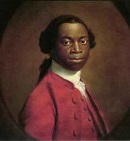
On May 15, 1787 a group of "Black Poor" from London (incl. some African-Am. slaves freed by the British for fighting for their side in the Am. Rev.) accompanied by some English tradesmen financed by the St. George's Bay Co. arrive off the coast of Sierra Leone ("Lion Mountains"), and in Aug. found Freetown on the coast after British Anti-Slavery Society leader Granville Sharp (1735-1813) leases some land from a local tribal chief; too bad, disease and hostile natives virtually wipe the group out, causing Nigerian-born former African-Am. N.C. slave Thomas Peters (Potters) (1738-92) to found the Sierre Leone Co. to recruit another group to try it again in 1792, after which the 1807 abolition of the slave trade by Britain causes British ships to start delivering thousands of African "recaptives" to Freetown after liberating them from illegal slave ships.




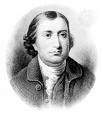











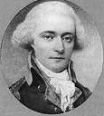




In 1787 the pop. of the U.S. is 3.894M. On Jan. 25, 1787 Shays' Rebellion (begun 1786) is quashed after Capt. Daniel Shays and his ragtag army of 1.2K debt-ridden farmers try to seize a federal weapons arsenal in Springfield, Mass., and a small militia scatters them with a single volley that kills four, followed by Gen. Benjamin Lincoln mopping them up with reinforcements from Boston on Feb. 4 at Petersham, Mass.; the reactionaries in several state govts. suddenly become convinced federalists, seeing commie mobs under every bush, although the state legislature makes concessions to Shayites next year that pacify them; on Nov. 13 from Paris Jefferson writes a Letter to William S. Smith (son-in-law of John Adams), containing the soundbyte "The tree of liberty must be refreshed from time to time with the blood of patriots and tyrants"; this attitude causes Abigail Adams to snub him for months? On Feb. 2 Scottish-born George Washington lookalike Arthur St. Clair (1736-1818) becomes pres. #9 of the United States under the Articles of Confederation (until Nov. 4, 1787). On Feb. 21 Congress approves a Constitutional Convention to meet on May 25 in Philadelphia "for the sole and express purpose of revising the Articles of Confederation". The Constitution Solution at long last shows how white men with big blue eyes and a heart of gold can think about us? On May 25 the U.S. Constitutional Convention opens in Independence Hall in Philadelphia, Penn. with 29 delegates from nine states (average age 42) (swells to 55 from 12 states by the end, avg. age 44 - all except R.I.) (27 college grads) (34 lawyers) (over half Am. Rev. War vets), originally intending to rewrite the Articles of Confederation but deciding to write a new constitution instead; John Adams and Thomas Jefferson are absent because they are serving abroad; George Washington (nominated by Robert Morris and unanimously chosen pres.) stays in Philly as a guest of delegate Robert Morris, and doesn't take part in debates, although he consults in private; Alexander Hamilton, a prime mover in getting the convention called, attends irregularly and makes unpersuasive arguments?; James Madison's voice is so weak that no one can hear him?; Ben Franklin is too weak to stand and make a speech, asking other delegates to read for him?; Patrick Henry of Va. "smelt a rat" and refuses to attend (along with three other delegates), gets James Monroe to make several lengthy arguments against ratification, and later demands that it be investigated as a conspiracy, but then changes his mind and supports both the Constitution and the Bill of Rights; the windows are kept shut supposedly to keep out horseflies but actually to preserve secrecy?; Ben Franklin (81) is the oldest delegate, and he travels in a sedan chair brought from Paris?; the youngest delegate is Jonathan Dayton (1760-1824) of N.J.; the convention delgates are divided between federalists (strong "energetic" central govt.), inc. George Washington and James Madison of Va., Alexander Hamilton and Gouverneur Morris of N.Y., James Wilson (1742-98) of Penn., Rufus King (1755-1827) of Mass., and indigo grower Charles Cotesworth Pinckney (1746-1825) of S.C., and states' rightsers, incl. William Paterson (1745-1806) of N.J., John Dickinson (1732-1808) of Del. (the dude who was refused to sign the DOI but came around late after being appointed brig.-gen. in the Continental Army as a joke, resigning, then moping around for two years), Luther Martin (1748-1826) of Md., and John Ten Eyck Lansing Jr. (1754-1829) and Robert Yates (1738-1801) of N.Y. (who pull N.Y. out of the convention and never sign the constitution); on May 29 big-state men Edmund Jennings Randolph (1753-1813) and James Madison (1751-1836) of Va. introduce the Virginia Plan of proportional representation in Congress; on June 15 small-state man William Paterson (1745-1806) of N.J. counters with the New Jersey Plan of equal numbers of members for each state; Hugh Williamson (1735-1819) of N.C. plays a key role in the large vs. small state debate; on June 18 Alexander Hamilton introduces a plan for a strong executive elected for life, but it is rejected, and he walks out with the New York delegation because of their states' rights principles; on June 28 Benjamin Franklin rises to his feet and leads a prayer, which causes the members to quit stonewalling and begin making progress, causing Washington to call it a miracle (if it weren't for the Christian faith, there would have been no U.S. Constitution?); too bad for blacks, on July 12 very Christian James Madison introduces the Three-Fifths Compromise, counting three-fifths of a state's slave pop. in apportioning representation; on July 16 self-taught lawyer Roger Sherman (1721-93) and state superior court judge Oliver Ellsworth (1745-1807) of medium-state Conn. introduce the Great (Connecticut) Compromise, setting up the House of Representatives and the Senate based on the Va. and N.J. plans, respectively, and incorporating the three-fifths plan; Randolph acts like the big man and stubbornly opposes a compromise; Madison's Notes of the Debates in the Federal Convention cause him to become known as the Father of the Constitution, and he observes that the decision to make the chief executive a single person causes "considerable pause", with Va. planter ("the gentleman revolutionary") ("the reluctant statesman") George Mason (1725-92), who worries about it becoming a "fetus of monarchy".


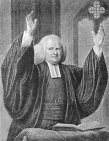

In June 1787 English Unitarian MP William Smith (1756-1835) (grandfather of Florence Nightingale) becomes one of the first to advocate an end to the slave trade, becoming friends with 4'11"-tall William Wilberforce (1759-1833), MP since 1780 (a shrimp who becomes a whale when giving speeches, according to James Boswell), who is converted to Christianity by "evangelical Dr. Johnson" abolitionist mathematician (7th Lucasian prof. of mathematics and pres. of Queens' College, Cambridge U.) Isaac Milner (1750-1820), then meets former slave trader and clergyman John Newton (1725-1807), author of "Amazing Grace", and makes a tour of England reading the Bible regularly, becoming convinced that slavery is wrong and devoting his life to ending it, even though virtually every businessman in England makes some income from it; his cause of "the abolition of the slave trade and the reformation of manners" attracts Grenville Sharp, Zachary Macaulay, Thomas Clarkson, Sir William Dolben, et al., and they research the necessary legislation; each year Wilberforce makes a motion to abolish slavery, which is handily defeated despite his eloquent and moving speeches, and he decides to go directly to the people with his case, causing Josiah Wedgewood to design the black-yellow Jasper Wedgewood Slave Medallion, a cameo depicting a slave kneeling and crying "Am I not a man and a brother?", and poet William Cowper next year to write The Negro's Complaint; a boycott of slave-produced sugar gains a following of 300K across England; 519 petitions are brought to Congress, and in 1792 it finally relents and passes Wilberforce's motion, after adding the word "gradually"; too bad, the French Rev. and the West Indies slave revolts turn Parliament against him, and they flip-flop, and final victory takes until 1807 - may the force be with you?
In 1787 the Society for the Abolition of the Slave Trade is founded in Britain; Benjamin Franklin becomes pres. of the Penn. Society for Promoting the Abolition of Slavery, saying, "When you're finished changing, you're finished."
In June 1788 after several MPs visit a slave ship in London to see the terrible conditions, and Richard Pennant, Baron Penrhyn, representing the West Indian lobby (an owner of 8K acres in Jamaica, with 600 slaves) gives a speech about how happy Africans are to be shipped away as slaves, causing angry PM William Pitt to threaten to resign, Parliament passes a bill sponsored by Sir William Dolben (1726-1814) regulating the number of slaves that can be transported per ship for one year, which only mobilizes the pro-slave lobby more, causing them to gain the upper hand until 1792; "Things have come to a pretty pass when religion is allowed to invade public life" (Lord Melbourne); the slave trade employs 3.5K sailors and 160+ ships, with a human cargo worth Ł800K a year.


In 1788 English poet William Cowper (1731-1800) pub. The Negro's Complaint; "Still in thought as free as ever,/ What are England's rights, I ask,/ Me from my delights to sever,/ Me to torture, me to task?/ Fleecy locks and black complexion/ Cannot forfeit nature's claim;/ Skins may differ, but affection/ Dwells in white and black the same." In 1788 English poet Hannah More (1745-1833), a Bluestocking who is friends with William Wilberforce and Zachary Macaulay pub. Slavery, which lets slavers have it; "If heaven has into being deign'd to call/ Thy light, O LIBERTY! to shine on all;/ Bright intellectual Sun! why does thy ray/ To earth distribute only partial day?"; "While the chill North with thy bright ray is blest,/ Why should fell darkness half the South invest?/ Was it decreed, fair Freedom! at thy birth,/ That thou shou'd'st ne'er irradiate all the earth?/ While Britain basks in thy full blaze of light,/ Why lies sad Africa quench'd in total night?"
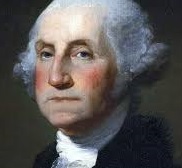










On Jan. 7, 1789 the First U.S. Pres. Election is held for electors who will choose him. On Feb. 4 the 1789 U.S. Pres. Election by the electoral college elects Gen. George Washington (1732-99) as U.S. pres. #1 with 69 votes (unanimous) (69? get it?), but the sealed ballots are sent to New York City to be officially counted by Congress, and although the new U.S. govt. is supposed to go into effect on Mar. 4, a quorum does not assemble to hold the first session of the House of Representatives at Federal Hall in New York until Apr. 1, so the lawmakers adjourn; Washington is a Freemason, the first of 15 by the time of U.S. pres. #43 George W. Bush (a Freemason). On Mar. 4 the U.S. Senate meets for the first time, with 8 of 22 members attending; on Apr. 1 the U.S. House of Reps. holds its first full meeting in New York City with 65 reps.; the first law passed is regarding oaths of office; at first the min. size for a Congressional district is 30K, and the number of House seats increases every decade until 1912, when it levels off at 435, with 210K avg. residents per district; by 2009 the avg. district has 650K, with the largest district being Nevada (960K) and the smallest Wyoming (493K). In Washington Adam was jeopardized by a mad monster. Adam and Jack ran to the bureau, but in their hurry they broke a tile and poked a tailor. They filmed more buildings, pierced by a cannon which was linked by John's son to granite. The haze over garden and field sheltered Arthur, who cleaved his way in a hurry. He cleaved mockingly as he cried "A rose taffeta dress will hardly be the right thing in a college, but whoever desires rose veils may truly wear them"? On Apr. 6 the electoral ballots are opened and counted, and George Washington, AKA "the Father of His Country", "the Sword of the Revolution", "the Surveyor", "the American Fabius", "the American Cincinnatus", "the Old Fox" (Lord Cornwallis' name for him), "the Sage of Mount Vernon", "the Farmer President", "His Excellency", "Town Destroyer" (Iroquois name for him) is elected as the first U.S. pres. (until 1797), with John Adams receiving 34 electoral votes to become the first U.S. vice-pres. (New York Gov. George Clinton receives 3 electoral votes, and 32 more votes are scattered among various Federalists and Antifederalists); the first of 12 U.S. presidents who own slaves (last is #18 Ulysses S. Grant); on Apr. 21 John Adams (1735-1826) is sworn in as the 1st U.S. vice-pres.; on Apr. 30 the 1st U.S. Pres. Inauguration under the new constitution is held in Federal (City) Hall in New York City (outdoors), where Washington begins a tradition by kissing the Bible, and adds the words "So help me God" to the 35-word oath of office in the Constitution (first pres. precedent), then goes to the New York Anglican Church (on the later site of the World Trade Center, which is miraculously untouched after 9/11?), sits through a 2-hour service and takes communion, then gives Washington's First Inaugural Speech, beginning "Fellow citizens of the Senate and the House of Representatives", and mentioning "an indissoluble union" and "that Almighty Being who rules over the Universe, who presides in the Councils of Nations, and whose providential aids can supply every human defect", and on Oct. 3 declares Nov. 26 (Thur.) a Nat. Day of Prayer and Thanksgiving with a Thanksgiving Proclamation, starting out "Whereas it is the duty of all nations to acknowledge the providence of Almighty God, to obey His will, to be grateful for His benefits, and humbly to implore His protection and favor"; the inaugural buttons have a neat eagle and sunburst motif; Federal Hall at 26 Wall St., site of the 1735 Peter Zenger trial is the first capitol of the U.S. (until 1790), and is torn down in 1812 and replaced by the U.S. Customs House, then made into a U.S. nat. memorial in 1955; Washington's annual salary as pres. is $25K; he had offered to work for expenses, like during the war, but since he racked up a $400K bill for 1775-83, his salary becomes "the country's first economy wave" (Marvin Kitman); he refuses to shake hands, considering it demeaning to the presidency (wait till he sees Pres. Obama bow to kings?); on Apr. 23 Pres. Washington and first First Lady (she likes to be called "Lady Washington") Martha Washington (1731-1802) move into the first U.S. pres. mansion at 1 Cherry St. ("George Washington Slept Here") (cherry? get it?); Thomas Jefferson becomes the first U.S. secy. of state, John Adams becomes the first pres. of the Senate, and Frederick Muhlenberg (1750-1801) becomes the first speaker of the U.S. House of Reps.; new U.S. Sen. from Conn. (1789-96) Oliver Ellsworth (1745-1807) (coiner of the term "United States") becomes Washington's personal spokesman, and chmn. of a committe organizing the U.S. federal court system; Washington issues the first executive order; at first Adams thinks he will actively direct the Senate, leading debate like a schoolmaster, but when he proposes that the president should be addressed as "His Excellency" instead of "Mister President", the members begin to distrust him and limit him to silently watching the proceedings, forever setting a precedent that makes the vice-pres. job pretty much useless? - cheese it?

In 1789 Olaudah Equiano (1745-97) pub. his autobio. The Interesting Narrative of the Life of Olaudah Equiano, or Gustavus Vassa, the African, describing his maltreatment as a slave in 1756-68 before he buys his freedom, whipping up anti-slavery sentiment in England.
On Apr. 17, 1790 (a rainy spring) at 11 p.m. Benjamin Franklin (b. 1706) dies in his bed in Philly while drafting a memo to Jefferson about U.S.-Canadian relations; his funeral procession to Christ Church, led by all the clergymen of the city is watched by 20K mourners (the largest peacetime gathering in early U.S. history); despite a long life weasling about the propriety of slavery, "Dr. Doubleface" finally makes unambiguous antislavery remarks on Nov. 9, 1789, weeks before his death, and his position in history in a new country needing heroes is secure, although he never became U.S. pres.
On Aug. 1, 1790 the First (1st) (1790) U.S. Census, run by U.S. secy. of state Thomas Jefferson reports the total pop. as 3,929,214, in a land area of 864,746 sq. mi., for a pop. density of 4.5 per sq. mi.; that's 3,277,000 white inhabitants (80.7%), 698K slaves, and 59K freed slaves; a total of 410,636 families, of which 47,664 own slaves; 40K are Irish-born, and 160K are of Irish descent; the pop. of New York City (which had been nearly deserted in 1776) is back up to a whopping 33K; Penn. is the most populous state with 434,373 pop.; the U.S. Jewish pop. is about 2K, mainly Sephardim, although Ashkenazim from C and E Europe are beginning to arrive; Mass. is the only state to record no slaves; only 5% of the pop. lives in cities; by 2000 the pop. of Puerto Rico alone is 3.9M. In 1790 the Society of Friends (Quakers) petitions the U.S. Congress to abolish slavery.
On Feb. 26-Mar. 9, 1791 British Christian evangelical naval officer Lt. John Clarkson (1764-1828) transports 1.1K unwelcome freed Am. black slaves from the Am. Rev. War from Nova Scotia in 15 ships led by Thomas Peters (Potter) (1738-92) to the utopian settlement of Freetown, Sierra Leone; Potter gets into a political struggle with Clarkson then dies of malaria in Freetown during the rainy season, leaving descendants who become the Krio (Creole) people of Sierra Leone; too bad, these whitened-up Africans end up creating a class society that keeps the indigenous African pop. down, causing resentment and hostility?
On Aug. 22-23, 1791 Black August in N Haiti (the French colony of Santo Domingo) (home of large-scale Indian genocide and African slavery) sees 400K-500K African slaves begin the Haitian Rev. (ends Jan. 1, 1804), an emeute (émeute) (uprising) against 30K white French slavemasters over the brutal conditions that have killed nearly 25K each year for the past cent., which later turns into the Haitian Rev. (ends 1804) becoming the first successful slave rebellion in history; before they start the uprising they dance a Voodoo Dance in Bwa Kayiman (Cayman) (Bois Caiman) (Caiman Forest), led by Haitian voodoo priestess Cecile Fatiman, who channels the spirit of warrior-love goddess black madonna with child Ezili Dantor, and crowns the African warrior Boukman with her royal red Petwo scepter to declare war, after which those present drink the blood of a black pig and swear that they will drive out the white French slavemasters or die trying, causing Euros to claim they made a pact with the Devil and that therefore Haiti is forever cursed by God.
On Jan. 15, 1792 after they don't fare any better than before the Am. Rev., 1,193 freed blacks leave Halifax, N.S., Canada for Sierra Leone; the Book of Negroes of escaped Am. slaves that fought for the British in the Am. Rev. War and were resettled in Novia Scotia contains the names of 1,336 men, 914 women, and 750 children; meanwhile the U.S. Congress excludes blacks from military service, allowing only "free able-bodied white male citizens". On Mar. 9 British Christian evangelical abolitionist naval officer Lt. John Clarkson (1764-1828) arrives in Sierra Leone with 1.2K unwelcome freed Am. black slaves from the Am. Rev. War from Nova Scotia in 15 ships led by Thomas Peters (Potter) (1738-92), who found the utopian settlement of Freetown, with Clarkson as gov. #1 (until Dec. 1792); Big Peter gets into a political struggle with Clarkson then dies of malaria in Freetown during the rainy season, leaving descendants who become the Krio (Creole) people of Sierra Leone; too bad, these whitened-up Africans end up creating a race-based class society that keeps the indigenous African pop. down, causing resentment and hostility?
On Oct. 12, 1792 the U.S. celebrates its first Columbus Day to commemorate the 300th anniv. of the big landing; on Oct. 13 the cornerstone of the White House, the U.S. executive mansion is laid during a ceremony in the District of Columbia; Irish-Am. architect James Hoban (1762-1831) models it after Leinster House, home of the duke of Leinster in Ireland (later seat of the Irish parliament); African-Am. slaves are used in the construction, along with Scottish immigrants; the British torch it in 1814, causing it to need whitewashing and end up with the name you know what.


On Feb. 12, 1793 the Second U.S. Congress passes the U.S. Fugitive Slave Act, permitting slave owners to send their agents across state lines to recapture escaped slaves ("fugitives from justice") - poor Liza? In 1793 Upper Canada abolishes slavery. In 1793 while visiting from New Haven, Conn., Am. nailmaker Eli Whitney (1765-1825) invents the little ole Cotton Gin (which combs out them pesky seeds) at Nathaniel Greene's Mulberry Cove Plantation near Savannah, Ga., applies for a patent on June 20, and is granted one on Mar. 14, 1794, but it is so easily pirated that he never gets paid much; 800K+ black slaves are imported to the cotton-producing regions in the U.S. South between this year and 1860, and cotton becomes the South's leading crop, with Savannah the chief cotton port.

In 1794 freed slave Richard Allen (1760-1831) founds the Mother Bethel African Methodist Episcopal (AME) Church for blacks in Philadelphia, Penn. (now at 419 Richard Allen Ave.) as its first bishop, becoming the oldest African Methodist Episcopal church in the U.S.

In Jan. 1795 intellectual giant Alexander Hamilton resigns as U.S. treasury secy., and submits a report to the House on Jan. 19 laying out a plan for extinguishing the federal debt within 30 years; he leaves Philly in mid-Feb. and returns to his home in Albany, N.Y.; on Feb. 3 Oliver Wolcott Jr. (1760-1833) becomes U.S. treasury secy. #2 (until Dec. 31, 1800); George Washington asks him to get the customs collector for Portsmouth, N.H. to ship a runaway slave woman back to Mount Vernon, but when he can't do it without publicity she is allowed to remain.
Early in 1796 after the fall of Robespierre in France lightens things up in that-wasn't-funny England, the slavery abolition bill long pushed by MP William Wilberforce seems to finally be about to pass, but the 3rd reading of the bill takes place on the night that a comic opera debuts in London, causing four supporters to skip the vote to see it - it was that funny? On June 1 "Volunteer State" Tennessee (Tenn.) (named after Tanasi, the Cherokee villages on the Little Tennessee River) is admitted as the 16th U.S. state (slave), becoming the first U.S. state to (eventually) border eight other states; there are now 7 free and 9 slave states, with N.J. practically in the free camp (since it's not economically important), and the balance see-saws, being roughly preserved for the next 50 years as new states are added; William Blount is elected as U.S. Sen. from Tenn.


On Mar. 4, 1797 Mass.-born John Adams (1735-1826), AKA "the Duke of Braintree", "His Rotundity", "the Atlas of Independence", "the Colossus of Debate", "the Father of the Navy", "Bonny Johnny", "Old Sink or Swim" (from a speech he gave), "Your Superfluous Excellency" (what Ben Franklin called him when vice-pres.) becomes the 2nd U.S. pres. (until 1801) (first 1-term pres.) (first to never own slaves, the next being his son John Quincy Adams) in the 3rd U.S. Pres. Inauguration; Thomas Jefferson becomes the 2nd U.S. vice-pres., first of a string of Repub. veeps (Burr, Clinton, Gerry, Tompkins) ending with John C. Calhoun, who resigns in 1832; Adams keeps the Washington cabinet intact, unaware that three of its members look for their instructions to Federalist leader Alexander Hamilton; First Lady Abigail Smith Adams (1744-1818) likes to be called "Mrs. President"; Adams, unlike Washington doesn't keep his temper private, and throws his wig at his cabinet?
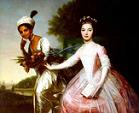
On Mar. 28, 1799 New York State abolishes slavery, joining R.I., Penn., Mass., N.H., and Conn. On Dec. 14, 1799 U.S. pres. #1 (1789-97) "His Excellency" George Washington (b. 1732) dies in Mount Vernon, Va. (age 67); he is the first of nine U.S. presidents to own slaves, and the first and only U.S. Founding Father to free his slaves in his will: "My creed is not words but deeds"; "Liberty, when it begins to take root, is a plant of rapid growth"; "It would be impossible to rule the world without God and the Ten Commandments"; "If the freedom of speech is taken away, then dumb and silent we may be led, like sheep to the slaughter"; "It should be the highest ambition of every American to... bear in mind that his conduct will not only affect himself, his country, and his immediate posterity; but that its influence may be co-extensive with the world, and stamp political happiness or misery on ages yet unborn" - goes out owning the century? In 1799 German painter Johann Zoffany (1733-1810) paints Dido and Lady Elizabeth Murray, portraying a lily-white lady and her chocolate brown slave woman, showing the latter with uncommon dignity and equality.
1800: Pop. of cities: Beijing: 1M; London: 860K, Paris: 550K, Vienna: 230K, Berlin: 180K, Washington D.C.: 2,464 free plus 623 slave (8K total in the immediate area); there is only one city with a pop. of 1M+, which grows to ? by 2010. The Second (2nd) U.S. Census reports the total pop. as 5,308,483 (35.1% increase) (6.1 per sq. mi.); whites 81.1%; blacks 1,002,037 (18.9%); pop. of New York City: 30K-60K, beginning to double in size every 10 years; 85% of the U.S. labor force works in agriculture; blacks are now completely locked into the American institutional slavery system, their skin color being a badge of inferiority; life expectancy in W Europe is 40 years, and the potato-fed pop. has increased in all its nations from 50%-100% since 1730, with the boom in premarital sexual intercourse since 1780 making a big prick. World Economic Growth jumps from 0% to 2% per annum for the first time in known history, making the modern world possible?


By 1800 New Orleans, La. boasts the wealthiest and most prominent free black pop. in the U.S. On Sept. 7, 1800 the African Methodist Episcopal Zion Church in New York City is dedicated. On Oct. 7 Va. slave revolt leader and Richmond blacksmith Gabriel Prosser (b. 1776) is hanged after he and his preacher brother Martin are prevented by a storm from using assembled slaves for an attack on Richmond with the intent to kill all whites except Quakers and Methodists. In Dec. in Va. Martha Washington sets all her slaves free, except for some co-owned by relatives. In 1800 black ex-slave Bill Richmond (1763-1829) becomes a popular boxer - everybody should own one?
In 1801 a Freemasonic Lodge is chartered in Charleston, S.C. by a British branch that backed England during the Am. Rev., and goes on to foment and back the U.S. Civil War?; it incl. many wealthy Jews prominent in the slave trade.

In 1802 Scottish born journalist James Thompson Callendar (1758-1803) pub. articles alleging that Pres. Jefferson "keeps and for many years has kept as his concubine one of his slaves. Her name is Sally. The name of her eldest son is Tom"; the first mention of Thomas Jefferson's alleged slave-bed tigress Sally Hemings (1773-1835).
In May 1803 the slave ship Wanderer carrying Igbo and other tribesmen from Nigeria lands in Savannah, Ga.; too bad, as they are being transported to plantations on St. Simons Island on the York, 75 Igbo slaves rebel, kill the crew, then land in Dunbar Creek, after which they march singing into the water and commit mass suicide.
In 1803 after the Haitian Rev. and civil war damages Haiti's exports, S.C. reopens its slave trade, importing 40K Africans by 1807.




On Feb. 15, 1804 N.J. becomes the last Northern U.S. state to abolish slavery, joining R.I., Penn., Mass., N.H., Conn., Vt., N.Y., and Ohio; there are now 9 free and 8 slave states. The first 7-11 in New Jersey, and the clerk gets shot? The thought that the Louisiana Purchase could lead to loss of relative importance of New England leads Mass. Sen. Thomas Pickering to form the Essex Junto, a group of men from Essec County, Mass. who prefers secession from the Union to this fate; members incl. Fisher Ames, Mass. sen. George Cabot, Judge John Lowell and his son John "the Rebel" Lowell, former U.S. state secy. Timothy Pickering, merchant Stephen Higginson, Mass. Supreme Court justice Tapping Reeve, and Theophilus Parsons, most of them the same people who run Harvard U., who get secret intel from the British East India Co.?; they enlist vice-pres. Aaron Burr into their scheme to link New York with New England, which depends on him winning the governorship of New York, but former U.S. treasury secy. Alexander Hamilton (1757-1804) contributes to Burr's defeat in the N.Y. gov. race in Apr. by the Repub. candidate, calling Burr "a dangerous man, and one who ought not to be trusted with the reins of government"; this leads them to engage in a pistol duel on July 11 (7-11) at dawn in Weehawken, N.J. on a grassy ledge above the Hudson River (at the end of the modern-day Lincoln Tunnel); (after standing back-to-back and then taking 10 paces?) Hamilton fires wild (over his head?) and is shot through the heart and killed by Burr, shouting "This is a mortal wound" (did he give away the shot, or was he shot first and couldn't aim?); Burr calmly goes home and has breakfast with a friend, not even mentioning the duel, and is later charged with two counts of murder, but continues to preside over the Senate and is never brought to trial for it; in 1806 Long Island, N.Y. Presbyterian minister Lyman Beecher (1775-1863) gives a famous sermon The Remedy for Dueling, lambasting dueling's code of honor, which is widely distributed around the U.S.; after black slaves also begin demanding their rights to duel to protect their honor around 1816, dueling among whites begins to slack off? - it suddenly looks so savage?



The Lewis and Clark Expedition, or, The Original Mild-Mannered Forensic Anthropologist, or, White Devils Visit the Unsuspecting Indians? On May 14, 1804 Virginians Meriwether Lewis (1774-1809) (the ugly one) and William Clark (1770-1838) (the handsome one), leading the 45-man Corps of Discovery (named by carpenter Louis Glass) ($2.5K in expense money allotted by Congress) push their three boats carrying 30 tons of supplies into the Missouri River from Camp Wood near St. Louis, say goodbye to the cheering French village of St. Charles, and begin the Lewis and Clark Expedition (ends 1806), setting out to explore the Am. West, looking for a water route to the Pacific; Clark is accompanied by his black slave York, and Lewis by his 150-lb. Newfoundland dog Seaman; on July 7 they leave St. Joseph, Mo. along the Missouri River; when one of their boats proves too big to cross a certain point in the river, they send it back with 7 men; in Nov. after portaging the Great Falls, they stop and spend the winter in North Dakota at the Hidatsa-Mandan village winter camp (who are friendly even though suffering from white man's smallpox?) on the banks of the frozen Missouri River; they hire Hidatsa (Lemhi Shohone?) Indian interpreters Sacagawea (Sacajawea) (Sakakawea) (1790-1812) (pr. suh-KAH-guh-juh-WEE-uh) (Hidatsa "bird woman") (Shoshone "boat launcher or puller") and her fur trader husband Toussaint Charbonneau; her child Pompy (Jean Baptiste) goes along; they name the Nez Pierce ("pierced nose") Indians from you know what; the Arikaras try to bring bear spirits to life from clay models and call on the grizzlies to stop the white devils from destroying their way of life? In 1804 William Wilberforce finally gets his slavery abolition bill passed in the Commons by 124-49 votes, but the House of Lords gets it adjourned till next year, when the Commons flops, rejecting it by seven votes.

In Sept. 1805 at the urging of William Wilberforce (1759-1833), PM William Pitt (b. 1759) finally issues a formal document in favor of the slavery abolition bill, 4 mo. before his death. In 1805 Aaron Burr gives a popular Farewell Address to the U.S. Senate. Josiah Quincy (II) (1772-1864) son of Am. Rev. leader Josiah Quincy becomes a U.S. rep. from Mass. (until 1812), becoming known as an orator opposed to Jefferson and Madison, and an opponent of slavery.


On Jan. 23, 1806 PM William Pitt the Younger (b. 1759) dies of a stroke (unsaved, according to William Wilberforce), and on Feb. 11 his Whig cousin William Wyndham Grenville, 1st Baron Grenville (1759-1834) becomes British PM (until Mar. 1807), and forms the Ministry of All the Talents, with George III's least favorite guy (a William Wilberforce supporter) Charles James Fox (1749-1806) as foreign minister as a loss leader; Pitt followers, led by George Canning refuse to join; strong abolitionists Grenville and Fox decide to introduce William Wilberforce's slavery abolition bill in the House of Lords first, and do so next Jan; meanwhile they try to end the war with France in vain. In Sept. the Lewis and Clark Expedition (begun 1803) ends after going 8K mi. and visiting 58 Indian tribes; Clark frees his slave York, who was allowed to carry a gun and whose black skin was a curiosity to every Indian tribe they met (the first black to cross the North Am. continent N of Mexico?); Sgt. Charles Floyd, the only casualty in the party dies of a burst appendix near Sioux City; Pres. Jefferson is presented with two bears, which he houses in cages in the White House; always thinking, Pres. Jefferson envisions an independent nation in NW North Am. called the Repub. of the Pacific, which survives to modern times as a proposal for the Repub. of Cascadia, consisting of British Columbia, Ore. and Wash., plus maybe parts of Idaho, N Calif., the Yukon and Alaska; in 1941-2 the State of Jefferson exists for about 10 mo. until Pearl Harbor kills it.
In 1807 the U.S. Congress bans the importation of slaves beginning Jan. 1, 1808; the U.S. now supplies 60% of Britain's cotton; on Feb. 4 (Wed.) after a month-long fight, the English House of Lords passes William Wilberforce's Abolition of the Slave Trade Act, followed by the Commons on Feb. 22 by 283-16 (as Wilberforce sits in his chair weeping?), but the law has no teeth, and the light fines and nonexistent jail prospects make scofflaws out of ship captains, who often chuck slaves overboard to avoid paying; Wilberforce spends the next 18 years of his career in the House of Commons fighting for the total emancipation of existing slaves - you can't flag the king, or, illegal use of a hand truck?
In 1810 George White (1764-) pub. A Brief Account of the Life, Experience, Travels and Gospel Labours of George White, an African, becoming the first African-Am. to write the story of his own enslavement?

In 1811 Am. Quaker minister Elias Hicks (1748-1830) pub. Observations on Slavery.
In 1816 U.S. forces clash with a group of escaped slaves who took over a British fort on the Appalachicola River in Spanish Fla. The Am. Colonization Society, a "benevolent anti-slavery" org. is founded by prominent Southern whites and presided over by Henry Clay to give blacks the chance to "start anew in the land of their fathers" - the original segregated Survivor, without racism for ratings?




On Mar. 4, 1817 Va.-born (former Va. gov., legislator, diplomat, U.S. senator, U.S. secy. of state and war) James Monroe (1758-1831), AKA "James the Second" (1st = Madison), "James the Lesser", "Last of the Cocked Hats" (still wears a tricorne), "the Era of Good Feelings President" becomes the 5th U.S. pres. (until 1825) in the 8th U.S. Pres. Inauguration (the last of the Va. dynasty, and the last Am. Rev. leader to become pres.), and ushers in the Era of Good Feelings, where the Repubs. virtually absorb the Federalist program of nationalism and centralism, and the Federalists become kaput, causing a 1-party system until Jackson's actions cause the creation of the Whig Party; former N.Y. gov. Daniel D. (Decius?) Tompkins (1774-1825) becomes the 6th U.S. vice-pres. after delivering his last message to the New York legislature in Jan., causing it to pass a law setting all slaves free on July 4, 1827; First Lady is Elizabeth Kortright Monroe (1768-1830); on Nov. 13 William Wirt (1772-1834) becomes U.S. atty. gen. #9 (until Mar. 4, 1829), going on to last through the admin. of J.Q. Adams and become the first to turn the job into a position of influence.



On Feb. 22, 1819 knowing that it is a paper tiger in Florida, Spanish minister Luis de Onis Gonzalez Vara (1762-1827) proves to be a cream puff, and signs the Adams-Onis Treaty in Washington, D.C., ceding all of Florida (Fla.) to the U.S. in return for U.S. assumption of private American claims against Spain up to $5M, extending the W boundary of the Louisiana Purchase along the Sabine River, Red River, and Arkansas River, and from the source of the Arkansas N to the 42nd parallel and then W to the Pacific coast; Spain surrenders its claims to the Pacific Northwest; slave and free states in the U.S. are now evenly balanced at 11 each, but the statehood applications of Missouri and Maine (until now a district of Mass.) threaten the balance; John Randolph of Va. coins the term "Doughfaces" for Northern congressmen who vote with the South on slavery issues after 18 members vote against an amendment to the bill admitting Missouri to the Union that prohibits the further introduction of slaves into the state, with the soundbyte "They were scared at their own dough faces." In 1819 Am. painter Charles Willson Peale (1741-1827) paints Portrait of Yarrow Mamout, an African Muslim who was sold into slavery, purchased his freedom, settled in Georgetown, and lived past 100. In 1819 Am. painter Thomas Sully (1783-1872) paints Washington's Passage (Crossing) of the Delaware, which shows Prince Whipple, a black slave to Gen. Whipple of N.H. attending Washington; he was freed during the war.

In Feb. 1820 free blacks sail from the U.S. to found the country of Liberia in West Africa, sponsored by the Washington Colonization Society, becoming the only sub-Saharan African country never to be under European control; the U.S. dispatches naval vessels to the coast of West Africa to patrol for slavers until 1823. On Mar. 3 the Missouri Compromise, drafted by U.S. sens. William Pinkney et al. approves Missouri's admission as a slave state, then divides future U.S. states into slave and free along the Mason-Dixon Line, which is extended from the Penn. border down the Ohio River to the Mississippi River at 36 deg. 30 min. N lat. (Missouri's S boundary); on Mar. 15 "Pine Tree State" Maine is admitted as the 23rd U.S. state, but Missouri must wait until next year; handsome Kentucky Rep. Henry Clay (1777-1852) becomes known as the Great Compromiser; Thomas Jefferson writes the soundbyte that the resurgence of the slavery issue is "Like a fire bell in the night. This momentous question awakened and filled me with terror. I considered it at once as the knell of the Union"; those against the expansion of slavery are often really against the introduction of blacks into all-white states, incl. Abraham Lincoln?

On July 2, 1822 free black carpenter Denmark Vesey (AKA Telemaque) (b. 1767) (originally brought into the U.S. in 1783) is hanged with 34 followers after his plot to organize slaves or an attack on Charleston, S.C. is betrayed.

In 1823 William Smith (1756-1835) and Zachary Macaulay (1768-1838) found the Anti-Slavery Society (London Society for the Abolition of Slavery in Our Colonies) in England, with Macaulay amassing huge volumes of evidence to use in the battle.

In 1823 Middlebury College in Vt. (founded on Nov. 1, 1800) becomes the first U.S. higher education inst. to grant a bachelor's degree to an African-Am., Alexander Lucius Twilight (1795-1857).
In Oct. 1824 the Hardscrabble Riot in Providence, R.I. see whites get off easy for tearing down houses of blacks.
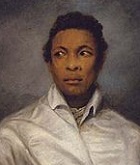
In 1825 after emigrating to England to escape discrimination, New York City-born African-Am. stage actor Ira Aldridge (1807-67) debuts at the Royal Coburg Theatre in London as Oroonoko in the Thomas Southerne adaptation of the Aphra Behn play, going on to play the title role in Shakespeare's "Othello", and tour Europe in 1852, becoming one of 33 English stage actors honored with a bronze plaque at the Shakespeare Memorial Theatre in Stratford-upon-Avon.


In 1825 William Henry Furness (1802-96) of Boston becomes pastor of the First Unitarian Church in Philadelphia (until 1875), which becomes a hot spot for abolitionists. Also in 1825 6'2" blue-eyed abolitionist anti-Mason Charles Grandison Finney (1792-1875), ordained a Presbyterian minister in 1824 begins a 7-year series of "repent-and-be-saved" revivals in Oneida County, N.Y., pioneering citywide campaigns and gaining nat. fame as "America's foremost revivalist", converting 500K+ while preaching against slavery.
On Mar. 3, 1826 ground is broken for the Nashoba community in Tenn., founded by Scottish activist Frances Wright, which reeducates slaves for freedom before colonizing them in Haiti; she also helps launch a women's movement - originally, the Haitian boat people went the other way?
In 1826 popular Unadilla, N.Y.-born Bible-thumping white supremacist writer Josiah Priest (1788-1861) pub. The Wonders of Nature and Providence, Displayed. Compiled from Authentic Sources, Both Ancient and Modern, Giving an Account of Various and Strange Phenomena Existing in Nature, of Travels, Adventures, Singular Providences, &c., attempting to prove the existence of God through Nature, containing the chapter "Northern and Western Indians, Proofs that the Indians of North America were lineally descended from the ancient Hebrews", mentioning that the Hebrew descent of North Am. Indians was proposed for at least 50 years; in 1833 he pub. American Antiquities and Discoveries in the West, which claims that mounds found in Ohio and N.Y. couldn't have been built by the "bloodthirsty savages, bent on the destruction of all but their own race", but by the descendants of the Ten Lost Tribes of Israel, contradicting himself by claiming that Noah visited America on his Ark and viewed them; in 1843 he pub. Slavery, As It Relates to the Negro, later titled "Bible Defence of Slavery; or the Origin, History, and Fortunes of the Negro Race" (1851), which tries to prove from the Bible that God created black people to be slaves to whites, starting with Noah's son Ham, who was cursed from birth to be a slave and was given black skin by God as a badge of inferiority, "a judicial act of God, or in other words a divine judgment"; since Priest knew Oliver Cowdery, this makes him a major source for the Book of Mormon and its nutso history and white supremacy?

On July 4, 1827 slavery is abolished in New York state. In 1827 the Separation of 1827 sees the Am. Quakers (Society of Friends) split into two hostile factions, the liberal Hicksite Party, led by crusty old abolitionist Elias Hicks (1748-1830), and the conservatives; guess which party liberal abolitionists James Mott and Lucretia Mott go with?

In Jan. 1827 the Monticello auction following Thomas Jefferson's death last July 4 sells slave Peter Farley Fossett (1815-1901) along with his mother and seven siblings; Fossett goes on attemp escape 2x before his freedom is purchased by friends and family, moving to Cincinnati, Ohio and becoming pastor of the First Baptist Church of Cumminsville and a member of the Underground Railroad.

On Feb. 7, 1829 the ship Harriet sets out from the U.S. for Liberia with Muslim West African (Guinea) prince Abdul-Rahman (Abdulrahman Ibraham Ibn Sori) (b. 1762), who had been freed after being sold to slave traders in 1778 and enduring decades of slavery in the Am. South, along with 151 other passengers; too bad, he dies on the ship on July 6 - guess he forgot how hard the "from" trip had been?
On Aug. 15-22, 1829 the anti-black 1829 Cincinnati Riots in Ohio drive half the black pop. away.
In 1829 free black activist David Walker (1796-1830) of Boston Mass. pub. the pamphlet Appeal to the Coloured Citizens of the World, espousing black nationalism, terrifying slave owners with its appeal to blacks to empower themselves.

On Jan. 18, 1830 Yale-educated middle-of-the-roader (epileptic) Henry Baldwin (1780-1844) of Penn. (who finds slavery morally repugnant but legal) is appointed as the 21st U.S. Supreme Court justice (until Apr. 21, 1844), giving it eight members again; in 1832 a seizure leaves him a little deranged, and he becomes the first justice to pub. his dissenting opinions, later becoming the lone dissenting vote in the Amistad Case. In 1837 he pub. A General View of the Origin and Nature of the Constitution and Government of the United States, which tries to steer a course between federalism and states rights, and tries to justify the legality of slavery while decrying its morality, causing critics to confirm their opinion of his lunacy.


On Oct. 28, 1830 after saving $350 to purchase his freedom and then being told the price had increased to $1K, black slave Rev. Josiah Henson (1789-1883) escapes with his wife and four children from slaveowner "Mr. Amos R." in Daviess County, Ky., rowing aross the Niagara River from Buffalo to Canada, then to the underground railroad mecca of Kent County, Ontario; in 1833 when Canada officially abolishes slavery he settles S of the Sydenham River near Dresden, Ont., and establishes the 200-acre British-Am. Inst. for escaped slaves in 1841; Harriet Beecher Stowe (1811-96) reads The Life of Josiah Henson, Formerly a Slave, Now an Inhabitant of Canada, Narrated by Himself, pub. by the Anti-Slavery Society of Boston, Mass. in 1849, invites Henson to her home in Andover, Mass., and uses him as the basis of her 1852 world-shaking bestseller Uncle Tom's Cabin, which takes on the horrible wave of hate afflicting black-skin-hating whites that turns them into devils.

In the 1830s white blackface comedian Thomas Dartmouth "Daddy" Rice (1808-60) of New York City becomes popular playing Jim Crow and singing the 1828 song Jump, Jim Crow, by Sigmund Romberg, with lyrics by Rida Johnson Young, with the lyrics "Weel about and turn about and do jis so,/ Eb'ry time I weel about I jump Jim Crow", later giving its name to Southern segregation laws.


On Jan. 1, 1831 Boston, Mass. abolitionists William Lloyd Garrison (1805-79) and Isaac Knapp (1808-58) begin pub. The Liberator (until Dec. 29, 1865), a broadside against slavery as an institution, using Christian principles, with the slogan, "I will be heard", and a cool graphic masthead with "Thou shalt love thy neighbor as thy self"; it never attains a circ. over 3K, but is extremely influential, immediately causing the state of Ga. to offer a $5K reward for Garrison's arrest, plus tons of death threats - that Playboy-under-the-bed feel, so bon ton to pass around?
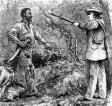
In Aug. 1831 black slave preacher "the Prophet" Nat Turner (1800-31) leads a slave rebellion in Va. with as many as 80 followers, moving for 12 hours from farm to farm in Southampton County and murdering 55 whites, mostly women and children, while the men are attending a religious revival; the militia suppresses the insurrection, and a reign of terror against blacks follows; the incident causes a slavery debate in the Va. House of Delegates next Jan., with an abolition resolution by Thomas Jefferson Randolph narrowly rejected, after which Southern sentiment for abolition evaporates as the news that niggers are indeed savage apes out to murder them freaks the whites out bigtime, and hardens their resolve to keep them down - they don't remember the Wat Tyler Rebellion of 1381?

In 1831 Senegal-born Omar ibn Said (1770-1864) pub. Autobio. of Omar ibn Said, Slave in North Carolina, ed. by John Franklin Jameson, becoming the only Arabic autobio. written by a slave in the U.S.

In 1832 the New England Anti-Slavery Society in Boston, Mass. is founded by William Lloyd Garrison, demanding immediate and complete emancipation. In 1832 Presbyterian Lane Theological Seminary in Walnut Hills, Cincinnati, Ohio is founded, with Lyman Beecher (1775-1863) as pres. #1, who takes the pro-slavery side in divisive debates in 1834, refusing to let African-Am. take classes, resulting in the Lane Rebels, incl. 50 students, a prof., and a trustee being dismissed and heading for Oberlin College; also in 1834 Beecher pub. the anti-Catholic tract "A Plea for the West", after which the Ursiline Sisters convent is burned.
We Americans don't have the amenities at home that you Brits afford us here? On July 26, 1833 while white Americans cower in fear of freeing black slaves for fear of racial amalgamation, the Whig-dominated British House of Commons, enjoying a comfortable remoteness from its black slaves passes the Slavery Abolition Act (introduced by colonial secy. Lord Stanley and supported by Lord Brougham), giving all British slaves their freedom starting next Aug. 1 and compensating slave owners to the tune of Ł20M, which takes 40% of Britain's nat. budget, and the loan isn't paid off until 2014; it is given royal assent on Aug. 28; the British Anti-Slavery Society is disbanded; lifelong English abolitionist leader William Wilberforce (b. 1833) hears the good news before dying on July 29, his last words being: "Thank God that I should have lived to witness a day in which England was willing to give twenty millions sterling for the abolition of slavery"; too bad, the law is initially applied only in the West Indies, and it goes on in Sierra Leone until Jan. 1, 1928; on Dec. 4 William Lloyd Garrison, returning from a trip to England with his batteries recharged helps found the Am. Anti-Slavery Society in Philadelphia, Penn., and becomes its pres. in 1843-65.
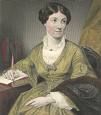
In Aug. 1834 Parliament frees all child slaves under age six in the West Indies, and sets the rest free after six years of "apprenticeship". In 1834 Norbich, er, Norwich, England economics writer Harriet Martineau (1802-76) visits the U.S. (until 1836), returning a fervent abolitionist, and becoming the first to arouse the interest of the British reading public with an article in Westminster Review.
The first gag rules in the land of free speech? In 1836 tired of the flood of antislavery petitions, many from pesky women, the U.S. Congress passes Gag Rules (effective Dec. 4, 1837), the Senate deciding to receive but automatically reject them, and the House deciding to receive but automatically table them; in 1840 the House decides not to receive them at all; after years of efforts by U.S. Rep. (formerly Pres.) J.Q. Adams, Northern Democrats and Northern Whigs end gag rules in 1844. In Nov. 1836 after the Nat.-Republican Party of J.Q. Adams, Henry Clay, and Daniel Webster unites with Anti-Masons, Dems. and others alienated by "King Andrew I" and form the Whig Party, and 28 of the 41 Dems. in Congress who had voted to recharter the nat. bank join, the 1836 U.S. Pres. Election sees Martin Van Buren benefit from the deceptively rosy economy (which waits to fall apart until after he takes office) and beat the entire Whig field, receiving 765K popular votes to their 740K, and 170 electoral votes to 73 for Harrison (who supports the use of federal money for internal improvements and the reopening of the Bank of the U.S.), 26 for White, and 14 for Webster (113 total); the first nat. election in which the issue of slavery is important, with Van Buren claiming that Congress has the right to outlaw it in the District of Columbia, but that he personally opposes the move; the Dem. Party of Van Buren, devoted to a small federal govt. that hates banks and tariffs stays intact until at least Pres. Grover Cleveland's admin., when "Great Commoner" William Jennings Bryan wants it have a more active role, starting it on a path leading to FDR's new Deal?
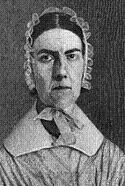
The struggle for emancipation in the U.S. becomes very grim, thumping the Bible to prove its point? In 1836 Charleston, S.C.-born abolitionist Angelina Emily Grimke (Grimké) Weld (1805-79) pub. An Appeal to the Christian Women of the South, distributed by the American Anti-Slavery Society, the first and only appeal written by a Southern woman to other Southern women appealing for the abolition of slavery; "Did not Jesus condemn slavery? Let us examine some of his precepts. "Whatsoever ye would that men should do to you, do ye even so to them." Let every slaveholder apply these queries to his own heart; Am I willing to be a slave - Am I willing to see my wife the slave of another - Am I willing to see my mother a slave, or my father, my sister or my brother? If not, then in holding others as slaves, I am doing what I would not wish to be done to me or any relative I have; and thus have I broken this golden rule which was given me to walk by."



On Nov. 7, 1837 U.S. abolitionist (Presbyterian minister) Rev. Elijah Parish Lovejoy (b. 1802) is murdered by a mob in Alton, Ill. while trying to defend his printing press, which they throw into the Mississippi River, shocking the U.S. with the news that whites have killed one of their own over the slavery issue; Boston-born Wendell Phillips (1811-84), who became an abolitionist two years earlier after witnessing an attack by a mob of wealthy Bostonians on William Lloyd Garrison gives a big speech denouncing the Alton mob in Boston's Faneuil Hall, gaining him nat. publicity; after hearing of Lovejoy's murder, John Brown (1800-59) publicly vows "Here, before God, in the presence of these witnesses, from this time, I consecrate my life to the destruction of slavery."
In Feb. 1838 Bible-thumping Angelina Grimke addresses a legislative committee of the Mass. State Legislature, becoming the first woman in the U.S. to address one, speaking against slavery while defending herself against male supremacists who don't think that women should have a right to petition; she follows with Letters to Catharine Beecher in 1838, while her sister Sarah Grimke pub. Letters on the Province of Woman, Addressed to Mary S. Parker.

On May 13, 1838 Scottish abolitionist Zachary Macaulay (b. 1768) dies in London; a memorial in Westminster Abbey depicts a kneeling slave with the motto "Am I not a Man and a Brother?" On Aug. 1, 1838 all slaves in the British Empire are freed after the period of forced apprenticeship under the 1833 Slavery Abolition Act ends; of 4M African slaves imported to the British West Indies to work sugar plantations, only 400K remain.

On Sept. 3, 1838 literate Am. mulatto slave Frederick Douglass (Frederick Augustus Washington Bailey) (1817-95) makes his celebrated escape to freedom from Baltimore, Md. to Philly.


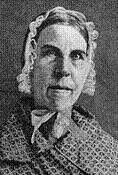
In 1838 Hampton, Conn.-born Theodore Dwight Weld (1803-95) anon. pub. The Bible Against Slavery: An Inquiry into the Patriarchal and Mosaic Systems on the Subject of Human Rights (3rd rev. ed. 1838), claiming that the Bible separates man from animals and things, servants were voluntary, and sold themselves, with runaway servants not to be delivered to their masters, who were not owners; "The spirit of slavery never seeks shelter in the Bible, of its own accord. It grasps the horns of the altar only in desperation - rushing from the terror of the avenger's arm . Like other unclean spirits, it 'hateth the light, neither cometh to the light, lest its deeds should be reproved.' Goaded to phrenzy in its conflicts with conscience and common sense, denied all quarter, and hunted from every covert, it vaults over the sacred inclosure and courses up and down the Bible, 'seeking rest, and finding none.' The law of love, glowing on every page, flashes around it an omnipresent anguish and despair. It shrinks from the hated light, and howls under the consuming touch, as demons quailed before the Son of God, and shrieked, 'Torment us not.' A t last, it slinks away under the types of the Mosaic system, and seeks to burrow out of sight among their shadows. Vain hope! Its asylum is its sepulchre; its city of refuge, the city of destruction. It flies from light into the sun; from heat, into devouring fire; and from the voice of God into the thickest of His thunders." In 1839 and his wife (since 1838) Angelina Emily Grimke (Grimké) Weld (1805-79) and her sister Sarah Moore Grimke (Grimké) (1792-1873) pub. American Slavery As it As: Testimony of a Thousand Witnesses, which makes a fan of Harriet Beecher Stowe, becoming the 2nd most influential anti-slavery book after her "Uncle Tom's Cabin".
On Mar. 5, 1839 Longwood U. in Farmville, Va. (2 mi. from the Israel Hill community of free black people formed about 1800) is founded by Methodist minister Solomon Lea as the Farmville Female Seminary Assoc. (until June 5, 1875); in early Apr. the Union and Confed. armies march past the N end of the campus before the Apr. 9, 1865 Battle of Appomattox Court House; in 1951 a student strike at Robert Russa Moton H.S. at the S end of the campus helps lead to the U.S. Supreme Court case Brown v. Board of Education; it goes coed in June 1976.
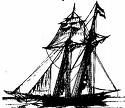


On July 1, 1839 Spanish sloop La Amistad (Sp. "friendship"), carrying 50 African slaves recently sold in Havana, Cuba is taken over by the slaves, who kill the captain and one crewman, and hold two Spaniards captive to act as navigators to sail them back to Africa; a U.S. naval vessel intercepts them, releases the Spaniards and imprisons the Africans, and they are indicted for murder, causing U.S. abolitionists to take up their cause. In 1839 U.S. Rep. (former U.S. pres.) John Quincy Adams introduces a bill to abolish slavery in the U.S., which doesn't get anywhere; next is on Dec. 14, 1863. In 1840 former U.S. pres. (1825-9) John Quincy Adams (1767-1848) argues before the U.S. Supreme Court on behalf of the African slaves illegally abducted by the Spanish in the Amistad Case, using African-born translator James Covey (Kai Nyangua) (1819-), with the soundbyte: "The Africans were in possession, and had the presumptive right of ownership; they were in peace with the United States... They were not pirates; they were on a voyage to their native homes... The ship was theirs, and being in immediate communication with the shore, was in the territory of the State of New York; or, if not, at least half the number were actually on the soil of New York, and entitled to all the provisions of the law of nations, and the protection and comfort which the laws of that State secure to every human being within its limits." On Mar. 9, 1841 after eloquent arguments by former U.S. pres. J.Q. Adams, the U.S. Supreme Court sets the Amistad prisoners free, and private funds are raised to send the 35 survivors back to Africa; Yale-educated middle-of-the-roader (epileptic) Henry Baldwin (1780-1844) of Penn. becomes the lone dissenter, becoming the first justice to pub. his dissenting opinions.

In 1839 Thomas Buchanan (1808-41), white cousin of future U.S. pres. James Buchanan becomes pres. #1 of Liberia, a PC way of dumping black and partly-black slaves back in Africa rather than set them free in America and let them go after our white wimmin? - white massah must get you a good start so you won't want to return?


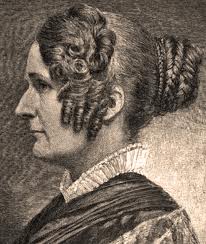
In 1839 Lydia Maria Child (1805-80), Lucretia Mott (1793-1880), and Maria Weston Chapman (1806-85) are elected to the exec. committee of the Anti-Slavery Society, pissing-off some of the men.

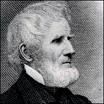



Anti-slavery action heats up in Britain and America, while in the latter it gets women into heat? In June 1840 the World Anti-Slavery Convention in London is held; Lucretia Mott and other women are denied seats, pissing them off and turning them onto women's rights work, causing the U.S. abolitionist movement to split between nonviolent (but wanting it now, not gradually) "moral suasion" William Lloyd Garrison and his Am. Anti-Slavery Society, which links abolition with women's rights, and Theodore Dwight Weld (1803-95) (husband of Emily Grimke), moral reform philanthropists Arthur Tappan (1786-1865) and his brother Lewis Tappan (1788-1873), and the "pragmatic" (gradualist) abolitionists, who form the Am. and Foreign Anti-Slavery Society (AFASS) and enter politics through the anti-slavery Liberty Party (ancestor of the Free-Soil Party and Repub. Party), founded by James Gillespie Birney (1792-1857), their pres. candidate this year and 1844, who also founds the Nat. Anti-Slavery Society; Gerrit Smith (1797-1874) is the vice-pres. candidate; membership in the Am. Anti-Slavery Society (founded 1833) peaks at 200K (mostly women); by 1854 the AFASS carries on the bulk of antislavery agitation in conjunction with numerous state orgs. - ah, the heady feel of freeing one's fellow men, fudge the sneaky feeling of loosing a lower race of savages and undoing everything civilization has built?

Are you scared to take the Clorox 2 challenge? A brave white politician makes slave owners giddy? On Nov. 7, 1841 slave ship Creole is taken over by its 135 slaves en route from Hampton Roads, Va. to New Orleans, La., and after killing the captain they sail to Nassau, where they become free under British law, pissing-off the U.S. govt., secy. of state Daniel Webster demanding their return as property of U.S. citizens, which causes Whig abolitionist Joshua Reed Giddings (1795-1864) to introduce into the U.S. House of Reps a resolution declaring that slavery does not exist under federal but only under state laws; he is censured, resigns and is reelected, going on to lead opposition to the extension of slavery and go Republican; the slaves are never returned.
On Mar. 1, 1842 the U.S. Supreme Court rules 6-3 in Prigg v. Pennsylvania that state liberty laws designed to circumvent the U.S. Fugitive Slave Act of 1793 are unconstitutional, the slave owner's right to his property taking precedence over state legislation; at the same time, it holds that the enforcement of the law is entirely a federal responsibility, and that state officers have no obligation to help them round up Uncle Toms or Little Lizas. In Sept. 1842 the Cherokee Slave Revolt sees black slaves unsuccessfully revolt from their Cherokee masters.


In 1842 English lit. giant Charles Dickens (1812-70) goes on a 5-mo. Reading Tour of the U.S., lecturing on the need for internat. copyright (calling Yankees pirates, which they have long been, starting with Benjamin Franklin), and against slavery, and is grossed-out by the "universal disregard of the spitoon with which every honourable member is accomodated" as he wades through the disgusting carpet of the U.S. Senate; he pigs out in New York City's famed oyster bars, which have red balloons outside their front doors, giving rise to the term "red light district". In 1842 Am. poet Henry Wadsworth Longfellow (1807-82) pub. Poems on Slavery, his first public support of abolition, "so mild that even a Slaveholder might read them without losing his appetite for breakfast".


In Apr. 1843 secret negotiations to annex Texas, spurred by Southern slaveholders skittish about growing British influence result in a treaty completed by secy. of state
John C. Calhoun being sent to the Senate for ratification; Calhoun then sticks his cotton' pickin' foot in his mouth when he sends the British minister
a letter stating that Texas annexation will foil British abolitionists, and solid Whig opposition results in an overwhelming rejection of the treaty.
In 1843 after William Lloyd One-Man Garrison publicly burns a copy of the U.S. Constitution in 1840, his Am. Anti-Slavery Society adopts a resolution declaring that the U.S. Constitution
is a slaveholders' document, a "covenant with Death and an agreement with Hell", and that voting or taking an oath supporting the Constitution would be a sin, adopting the motto
"No union with slaveholders", and advocating peaceful separation of free and slave states; only the 15th Amendment (1870) satisfies them and causes them to finally disband;
meanwhile, the British are light years ahead of the Yankees, and black-as-coal
Samuel Adjai Crowther (1809-91), who was born in Nigeria, sold as a slave in 1821, freed by the British then educated
in Sierra Leone and the Church Missionary College in London is ordained into the Anglican Church, going on to return to Africa as a missionary and teacher, becoming the first bishop
of the Niger in 1864 and translating the Bible into Yoruba; back in the U.S., former slave Isabella changes her name to
Sojourner Truth (1797-1883), and goes on crusade sojourning for the you know what.
In 1843 Moses Grandy (1786-) pub.
Narrative of the Life of Moses Grandy, Late a Slave in the United States of America.




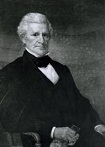
On Apr. 27, 1844 Henry Clay and Martin Van Buren pub. letters in separate Washington, D.C. newspapers opposing Texas annexation because of the danger of war, Clay adding in his Raleigh Letter that it would be "dangerous to the integrity of the Union"; the U.S. Senate rejects the Texas annexation plan zealously pushed by Pres. Tyler, who wants to give slavery more room - I didn't want to do it, I didn't want to do it? The slavery issue colors the election, as one white party goes for white clay, and the other for a pig in a polk on a dark horse? In May 1844 the Whig Convention in Baltimore, Md. unanimously nominates Henry Clay (1777-1852) of Ky. for pres., and Theodore Frelinghuysen (1787-1862) of N.J. for vice-pres.; the first-ever 1844 Whig Platform omits any reference to the hot potato of Texas; later in May the 1844 Dem. Nat. Convention in Baltimore, Md. deadlocks over anti-annexation candidate Martin Van Buren and pro-annexation candidate Lewis Cass of Mich., and on the 9th ballot nominates pro-slavery pro-expansionist (both Tex. and Ore.) James Knox Polk (1795-1849) of Tenn., who becomes the first "dark horse" candidate in U.S. history (a shock of long grizzled hair looks like a mane, and he has probing gray eyes?), and the first to announce that he won't seek reelection; the 1844 Dem. Platform calls for "the reoccupation of Oregon and the reannexation of Texas"; "president without a party" Tyler fails to win renomination by the alienated Whigs or the Dems. Henry Clay suddenly flip-flops on Texas, saying that slavery there is only a "temporary institution", and that if it could be annexed "without dishonor, without war, with the common consent of the Union, and upon just and fair terms" he wouldn't object; Polk's followers cry for "Texas and Democracy" and "Fifty-four Forty or Fight" (annexing Oregon all the way to Alaska), with Polk's Senate spokesman William Allen (1803-79), "the Ohio Foghorn" leading the charge; they also task Clay for being a gambler, dueling fool, and debaucher; "Who is James K. Polk?" is the Whig campaign slogan; in Nov. the 1844 U.S. Pres. Election sees Polk barely edge Clay in the popular vote by 39K (1,339,494 to 1,300,004), but win by 170-105 electoral votes ; the 62K votes (out of 2.5M total) for abolitionist James G. Birney of the Liberty Party (former Northern Whigs) deprives Clay of N.Y. and costs him the election (he would have won by 7 electoral votes); Polk carries neither N.C., his birth state, nor Tenn., the state he served as gov. for two terms; the Liberty Party disbands in 1848 when many of its members join the Barnburners to form the Free-Soil Party.

In 1845 the hot-to-trot state of Tex. has 100K whites and 35K black slaves. In 1845 a Photo of a Clean-Shaven Abraham Lincoln (2nd earliest known photo) shows him holding an un-PC anti-slavery newspaper. In 1845 former slave Frederick Douglass (1817-95) pub. Autobiography of Frederick Douglass, which becomes a bestseller. In 1846 using the profits from his bestselling autobio., Douglass launches the abolitionist newspaper The North Star in Rochester, N.Y. with William Lloyd Garrison and Martin Robinson Delany (until June 1851) - good name?
The massive American gringo land grab permanently opens up the black slavery wound? On Aug. 8, 1846 (noon) Pres. Polk sends Congress a hurried request for $2M to expedite peace negotiations with Mexico; instead of being rubber-stamped by the House, pro-war Penn. Dem. David Wilmot stands up, saying that if free soil should be acquired from Mexico, "God forbid that we should be the means of planting this institution [slavery] upon it", and introducing the Wilmot Proviso to prevent slavery in any territory acquired from Mexico; it passes the House next Feb. 17 but fails in the Senate, is reintroduced next year and rejected again, and later offered unsuccessfully as an amendment to many bills, but the issue is now out of the box, and debate rages on over the extension of slavery into the western territories.


In 1846 Va.-born slave Dred Scott (1795-1858), who was sold in St. Louis to an army surgeon as a body slave then taken to Ft. Armstrong, Ill., followed by Ft. Snelling in Minn. (Wisconsin Territory), then back to St. Louis in 1838, is sold to Eliza Emerson in St. Louis, Mo. after his master's death in 1843, then with help from white friends sues for the freedom of himself and his family in the Missouri courts; a jury decides in his favor, but the state supreme court rules against him; the case is finally resolved in a monkey's barrel of a U.S. Supreme Court decision in 1857; his atty. is Ky.-born Montgomery Blair (1813-83), mayor of St. Louis, Mo. in 1842-3 and judge in 1843-9, who later joins the new Repub. Party.

In 1846 Mass. atty. Lysander Spooner (1808-87) pub. The Unconstitutionality of Slavery, which splits the abolitionist movement over whether the Constitution is a "covenant with Death and an agreement with Hell", or actually doesn't support slavery, influencing Frederick Douglass et al. and leading to the 1848 platform of the Liberty Party; too bad, when the Repub. Party is formed he refuses to support it since it doesn't advocate abolition of slavery but only fights expansion, and when the U.S. Civil War breaks out he supports the right of states to secede as supported by the right of slaves to be free, and advocates compensation for emancipation.
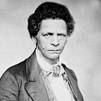
In 1847 the Free and Independent Repub. of Liberia is founded by the Am. Colonization Society to Liberia (founded 1816 with backing by Pres. James Monroe) to repatriate freed U.S. black slaves, with a constitution modeled after the U.S., complete with cities named Monrovia (capital) (modern pop. 600K) (first foreign city to be named after a U.S. pres. until ?) and Buchanan, and a constitution signed by 11 signers, hence the 11 stripes in its flag; next Jan. 3 "Father of Liberia" Joseph Jenkins Roberts (1809-76) of Va. becomes pres. #1 (until ?). (until 1856); James Lawrence Day (1814-54) from Morristown, N.J. becomes the colony's physician (until 1843); abundant timber and diamond wealth make it prosperous for the next cent.; the trouble starts when the Am. immigrants try to force their govt. and way of life on the other 99% and run out of free cookies?
In Apr. 15-16, 1848 the Pearl Incident sees 70 runaway slaves from Washington, D.C., incl. a former slave of Pres. Madison who had worked at the White House stage a publicity stunt to make the U.S. think twice about extending slavery, hiring the schooner Pearl to take them down the Potomac River to Chesapeake Bay, but their plot is discovered, causing a steamboat to set out from Georgetown to catch them, resulting in a dramatic escape to freedom.


In May 1848 after Pres. Polk refuses to run for a 2nd term the Dems. nominate pro-"squatter sovereignty" Mich. Sen. (1845-57) and U.S. war secy. (1831-6) (who supported the forcible removal of Indians beyond the Mississippi and backed Pres. Jackson in the nullification crisis) Lewis Cass (1782-1866) at the 1848 Dem. Nat. Convention in Baltimore, Md.; the Barnburners (N.Y. Dems.) bolt the convention, join up with James G. Birney's Liberty Party (their candidate John P. Hale withdraws), and form the anti-slavery Free-Soil Party, opposing admission of new slave states into the Union, which on Aug. 9 nominates Martin Van Buren for pres. and Charles Francis Adams (son of J.Q. Adams) for vice-pres. at its convention in Buffalo, N.Y.; U.S. Supreme Court judge (1830-61) John McLean (1785-1861) was the original pres. candidate until the abolitionist North Star newspaper revealed in July that he once gave instructions to the jury in the Crosswait trial telling them it was a crime to thwart any attempt by a white person to respossess a runaway slave, pissing-off abolitionist Salmon P. Chase, who got him replaced. In June with slavery now the big nat. issue, and the two blocs balanced at 15 states each, but neither party able to address it because each party has national pretensions and is internally split, the Whigs pass over Henry Clay and nominate Mexican War hero, Louisiana planter and slave owner (father-in-law of Miss. Sen. Jefferson Davis) Gen. Zachary Taylor at their convention in Baltimore, Md., with former New York Rep. Millard Fillmore as vice-pres. In 1848 Ala. Dems. clamor for a federal slave code to protect the property of slaveholders in the new territories acquired from Mexico in the Platform of the Alabama Democracy, authored by former U.S. rep. William Lowndes Yancey (1814-63).

Let's shake, shake your daddy-o? On Jan. 22, 1849 S.C. Sen. John Caldwell Calhoun (1782-1850) issues the written Southern Address at the behest of "a committee of Southern members of Congress for Southern unity in the face of steady Northern Aggressions and encroachments" on the slavery issue, which, after pointing out that "the British West India possessions are ruined, impoverished, miserable, wretched, and destined probably to be abandoned to the black race", predicts that, if emancipation is ever effected, "it will be through the agency of the Federal Government... against the resistance and struggle of the Southern. It can then only be effected by the prostration of the white race... We would, in a word, change conditions with them [blacks], a degradation greater than has ever yet fallen to the lot of a free and enlightened people, and one from which we could not escape... but by fleeing the homes of ourselves and ancestors, and by abandoning our country to our former slaves, to become the permanent abode of disorder, anarchy, poverty, misery, and wretchedness"; 48 (fewer than half) of the Southern members (incl. not more than 3 Whigs) endorse it, but Calhoun gets brownie, er points as a prophet?



On Mar. 29, 1849 Va. slave Henry "Box" Brown (1815-79) pays $86 to have himself mailed in a dry goods container to Philly abolitionist Presbyterian minister James Miller McKim (1810-74), arriving 27 hours later, his first words being "How do you do, gentlemen?", after which he sings a psalm, and becomes a celeb until the 1850 Fugitive Slave Law forces him to flee to Britain, where he tours with an anti-slavery panorama for 10 years then becomes mesmerist Prof. H. Box Brown AKA the African Prince; McKim attends the 1859 execution of John Brown at Harpers Ferry, Va. and helps his wife take his body home. On Dec. 6, 1849 Harriet Tubman (1820-1913) escapes from slavery, reaching Philly 100 mi. away and joining the super-secret Underground Railroad, which smuggles runaway slaves from Ky. and W. Va. N across Ohio to Detroit ("Midnight"), then across the Detroit River to Windsor, Ont., Canada ("Dawn"), then to other communities in Ont. incl. Elgin, Buxton, and Chatham; they allegedly "follow the Drinking Gourd", the pointer stars in the Big Dipper on the way N to the Ohio River; starting next year Tubman makes the first of 19 journes to slave states to help escaping slaves. In 1849 Abraham Lincoln fails to win a 2nd term in Congress, and returns to Springfield, Ill., where he begins speaking out against slavery to revitalize his career.







The final Congressional settlement of the slavery question, doo-dah doo-dah? On Jan. 29, 1850 Ky. Sen. Henry Clay (1777-1852) presents his Compromise of 1850 to the U.S. Senate, giving the three towering intellects of Clay, Calhoun, and Webster their day on the tottering nat. stage before they croak sans solutions; on Mar. 4 ailing Dem. S.C. Sen. John Caldwell Calhoun (1782-1850) has a speech read for him against the compromise and demanding equality and safety for the South, then dies on Mar. 31; on Mar. 7 Whig Mass. Sen. Daniel Webster (1782-1852) pushes for Union over slavery concerns and is pro-compromise; newcomer (since 1849) Whig N.Y. Sen. William Henry Seward Sr. (1801-72) (known for wearing yellow pantaloons and an outsized yellow handkerchief, and pausing theatrically during orations to dip into his snuff box) invokes "a higher law than the Constitution" and is against the compromise, as are Jefferson Davis (1808-89) and Salmon Portland Chase (1808-83), while 5'4" "Little Giant" Stephen Arnold Douglas (1813-61), chmn. of the Committee on Territories is for it, which carries a lot of weight; on Apr. 18 the matter is referred to a Senate committee of 13, with Clay as chmn.; debate drags on as Pres. Taylor dies on July 9 after less than 500 days in office, and is succeeded by fill-more Millard Fillmore. On Sept. 9 "Golden State" California (Calif.) is admitted as the 31st U.S. (free) state (2nd largest in the lower 48) (motto: Gr. "Eureka" = "I've found it", the first state motto not in English or Latin, starting a trend, followed by Minn., Mont., Wash., Alaska); there are now 16 free and 15 slave states, forever ending the old balance. On Sept. 9-20 the Compromise of 1850 passes after being split into five separate bills: 1: admitting Calif. to the Union as a free state; 2: organizing New Mexico as a territory with the slavery issue to be decided by popular sovereignty, and payment of $10M to Texas to satisfy claims to New Mexico; 3: organizing Utah ditto; 4: a stiff new fugitive slave act; 5: an act abolishing the slave trade (but not slavery itself) in the District of Columbia; the issue of popular sovereignty is left for future legislative debates, which is what makes the Southerners accept the whole deal; in June the Nashville Convention in Tenn. is attended by 100+ delegates selected by the legislatures of 9 out of 15 slave states in an effort to establish unity in the face of the debate then going on in Congress; it proposes an extension of the Missouri Compromise line to the Pacific Ocean; when it is ignored, the convention reconvenes in Nov., attended by delegates from only seven states, and rejects the Compromise, asserting the right of secession; meanwhile late in the decade growing tensions cause pro-Southern residents of Calif. to propose splitting Calif. into Northern and Southern sections, but Congress votes it down; meanwhile the U.S. Fugitive Slave Act increases the resolve of abolitionists with criminal penalties for citizens concealing or rescuing a fugitive, as well as the award of a $10 fee to commissioners for accepting a slave owner's claim to an escaped slave, versus only $5 for rejecting it. In 1851 the Mass. Supreme Court (chief justice Lemuel Shaw) refuses to release fugitive slave Thomas Sims and justifies the constitutionality of the 1850 Fugitive Slave Act.

In 1850 Pittsburgh, Penn. black man Martin Robinson Delany (Delaney) (1812-85), whose slave mother in S.C. got him an illegal reading primer and had to flee with him to Penn. is admitted to lily-white Harvard U. as a pre-med student after presenting recommendations from 17 physicians; too bad, the faculty and students had "no objection to the education and elevation of blacks but do decidedly demonstrate against their presence in college with us", and he is expelled within three weeks, making him bitter and causing him to pub. a book in 1852 calling for blacks to exeunt stage left back to Africa. On Aug. 24-26, 1854 the Nat. Emigration Convention of Colored People is held in Cleveland, Ohio, attended by Delany who pub. the manifesto "Political Destiny of the Colored Race on the American Continent"; the convention passes a resolution that "as men and equals, we demand ever political right, privilege and institution to which the whites are eligible in the United States, and we will either attain to these, or accept nothing", becoming the start of U.S. black nationalism. In 1879 he pub. The Origin of Races and Color, with an Archaeological Compendium of Ethiopian and Egyptian Civilization, "On the delicate subject of the integrity of the Races, let it be also understood that we propose, so far as the Pure Races are concerned, to have once and forever settled that they are indestructible, as proven in this treatise. That, as in the substance and science of Chemistry, the two extremes, saccharine and acid, the most intense sweetness and the most intense sourness, are produced by the same material and essential properties, so is it in the substance and science of animal chemistry in the human family in relation to color or complexion of the skin. That the two extremes of color, from the most negative white, incl. every possible variety of tint, up to the blackest are all produced by the same material and essential properties of color"; "We have named these Three Races [black, yellow, white], in the order which they are said to have been created, the Black being first, consequently the oldest of the Human Family. In treating on the Unity of Races as descended from one parentage, we shall make no apology for a liberal use of Creation, as learned from the Bible. In this, we find abundant proof to sustain the position in favor of the Unity of the Human Race."

In 1851 mulatto army scout and explorer Jim Beckwourth (1789-1867) discovers the Beckwourth Pass through the Sierra Nevada mountain range in Calif. 50 mi. N of Lake Tahoe, the lowest pass (5,512 ft.) over the Sierras, and guides the first west-bound wagon trains over it, then gets a group of investors to back him into developing the route, which later becomes the Feather River route of the Western Pacific Railroad, and founds Beckwourth, Calif. 15 mi. W of the pass, where he sets up a trading post, the first stop for emigrants to Calif., once meeting 11-y.-o. Ina Coolbrith (1841-1928), who later (1915) becomes the first poet laureate of Calif.; in 1855 he leaves, travels to San Francisco, becomes famous after a book filled with his tall tales is pub., runs a store in Denver, Colo., marries an Indian named Sue, then returns in 1861.

In Dec. 1851 ex-slave Sojourner Truth (1797-1883) delivers her famous And Ar'n't I a Woman Speech at a women's rights convention in Akron, Ohio.

On Mar. 20, 1852 Harriet Elizabeth Beecher Stowe (1811-96) pub. her compelling, tear-jerking, rabble-rousing, widely-translated anti-slavery novel Uncle Tom's Cabin (pub. starting June 5, 1851 in 10 monthly installments in Nat. Era, then as a book on Mar. 20, 1852), selling 300K copies in its first year then going on to become the first million-selling novel, the #1-selling novel in the world in the 19th cent., and #2 after the Bible. In 1853 Martin Robinson Delany (1812-85) pub. Blake; or The Huts of America, the first novel by an African-Am. pub. in the U.S., a response to "Uncle Tom's Cabin" showing slaves as active not passive, and advocating black separatism; changes "No more hard work for poor old Ned/ He's gone whar de good darkeys go" in Stephen Foster's "Old Uncle Ned" to "Old master's gone to the slaveholders' rest/ He's gone where they all ought to go".

On June 1-5, 1852 the 1852 Dem. Convention meets in Baltimore, Md., and the leading contenders Mich. Sen. Lewis Cass, former U.S. secy. of state James Buchanan of Penn., and Ill. Sen. Stephen A. Douglas get in a no-win situation; finally, on the 49th ballot, dark horse former N.H. gov. and U.S. sen. Franklin Pierce (a brig. gen. in the Mexican War) wins the nomination for pres., which adopts the slogan "We Polked you in '44, we shall Pierce you in '52"; on June 16 the 1852 Whig Convention meets in Baltimore, Md., snubbing Pres. Fillmore (who retires to practice law) for yet another war hero, Gen. Winfield Scott, on the 53rd ballot; this causes anti-slavery Whigs to desert the party and create the Free-Soil Whig Party, which nominates N.H. Sen. (1847-53, 1855-65) John Parker Hale (1806-73); there are now two N.H. candidates vying for the captain's chair against an old fart? On July 5 escaped slave Frederick Douglass delivers the speech What to a Slave is the 4th of July? to the Ladies' Anti-Slavery Society in Rochester, N.Y., dissing the U.S. for celebrating freedom and independence while enslaving 4M blacks. On Nov. 2 the 1852 U.S. Pres. Election is held; the economy being good, and the Dems. and Whigs agreeing not to make the issue of issues (slavery) the issue, the election turns into a unbeauty contest, and Whig candidate Gen. Winfield Scott, who is old, fat, vain, and foolish-looking loses to more photogenic and handsome Franklin Pierce by 51% of the popular vote (254 electoral votes) to 44% (42 electoral votes); the Free-Soil Whigs get only half the votes that the Free-Soil Party did in 1848; lame duck Pres. Fillmore, having broken with Whig Party leaders Thurlow Weed and William H. Seward by associating himself with the pro-Southern branch of the party, finishes the disintegration of the Whig Party, leaving the Dem. Party virtually unopposed in the U.S.




A dark horse pierces through to the canon, er, Buchanan, who sees the first shots of the U.S. Civil War fired? On Mar. 4, 1853 49-y.-o. N.H.-born U.S.-Mexico War brig. gen., atty., former U.S. Rep. and U.S. Sen., and "dark horse" candidate (Doughface Dem.) (Bowdoin grad.) (good orator) (handsomest pres.?) Franklin Pierce (1804-69), AKA "Handsome Frank", "the Fainting General" (from a Mexican War incident where an artillery blast blew his saddle horn into his stomach), "Young Hickory of the Granite Hills" (the Andy Jackson of N.H.) becomes the 14th U.S. pres. (until 1857) in the 19th U.S. Pres. Inauguration (youngest pres. so far) (first pres. to memorize his inaugural address, not to kiss the Bible, and to affirm rather than swear); last of four Whig presidents since 1841, and the first of two Doughface presidents (along with Buchanan); William Rufus de Vane King (1786-1853) becomes the unlucky 13th U.S. vice-pres., but dies on Apr. 18 before he can preside over the U.S. Senate; First Lady is Jane Means Appleton Pierce (1806-63); Pierce goes for the Young America Movement, which seeks to expand the U.S. W and S with slavery intact, resulting in Bleeding Kansas, and making the Civil War a done deal?; on Mar. 7 he appoints former secy. of war (1845-9) William Learned Marcy (1786-1857) as U.S. secy. of state #21 (until Mar. 6, 1857), after which on June 1 he sends a learned circular to U.S. diplomats, recommending that they always do official biz dressed as ordinary U.S. citizens; British-born Jewish atty. Judah Philip Benjamin (1811-84), who married into a prominent New Orleans Creole family in 1833 and became a sugar plantation and slave owner in Belle Chasse, La., and and became the first Jew to be nominated for the U.S. Supreme Court by outgoing pres. Fillmore this year (nominated again next year by Pierce), but declined, instead becomes a U.S. Sen. from La. (first Portuguese Jew), going on to challenge Jefferson Davis to a duel then make up and become friends, and get off an immortal soundbyte to Benjamin Wade of Ohio (who accused him of being an "Israelite in Egyptian clothing"): "It is true that I am a Jew, and when my ancestors were receiving their Ten Commandments from the immediate Deity, amidst the thundering and lightnings of Mt. Sinai, the ancestors of my opponent were herding swine in the forests of Great Britain."
In 1853 the English Duchess of Sutherland calls on U.S. women to support the gradual abolition of slavery, causing former U.S. First Lady Julia Gardiner Tyler to pub. a reply in the Southern Literary Messenger, telling her not to interfere in internal U.S. affairs.
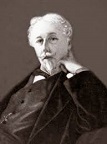
In 1853 French historian Joseph Arthur Gobineau, Count de Gobineau (1816-82) pub. An Essay on the Inequality of the Human Races, about how the Aryan Master Race created all culture, and how miscegenation (racemixing) ruined India, Egypt, Persia, Spain, and even has crept into France, Germany, Austria, Switzerland, everywhere; becomes the seminal doctrine of 19th cent. racism, and makes a disciple of Richard Wagner - let's face it, Lexington Steele is unstoppable?




On Mar. 20, 1854 in reaction to the Kansas-Nebraska Act, the anti-slavery Republican Party is founded in Ripon, Wisc. by Francis Preston Blair Sr. (1791-1876), George Sewall Boutwell (1818-1905), Asahel Nichols Cole (1821-89), George William Curtis (1824-92) et al. in protest to fight against the expansion of slavery in the new territories of the West, becoming free-soil and anti-slavery but not abolitionist, and incorporating what's left of the anti-slavery members of the defunct Whig Party; on July 6 it holds its first official meeting in Jackson, Mich. On May 30, 1854 after a push by Ill. Sen. Stephen Douglas to help the North catch up with Pres. Pierce's deal for a southern-route transcontinental railroad, the Missouri Compromise of 1820 is repealed, and the U.S. Kansas-Nebraska Act is passed, creating the territories of Kansas and Nebraska, while permitting a local option on slavery (popular sovereignty) (Tex. Sen. Sam Houston votes against it); both slave owners and free soilers rush in, riots ensue, and the War for Bleeding Kansas (Border War) begins, trashing the existing political party system, destroying the Whigs and dividing the Dems.
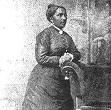
On July 16, 1854 (Sun.) while trying to go to church, 24-y.-o. African-Am. schoolteacher Elizabeth Jennings Graham (1830-1901) is thrown off a bus in Manhattan, N.Y. because of her color, causing her to fight back and sue, winning $225 damages; after another black named Peter Porter is barred from a rail car and sues, they win the right to ride on an equal basis.
On Oct. 4, 1854 successful ($5K a year) 6'4" atty. Abraham Lincoln speaks against 5'4" "Little Giant" Stephen Douglas in Springfield, Ill., and again on Oct. 16 at Peoria, Ill., opposing popular sovereignty when it comes to slavery, because "all this, to my judgment, furnishes no more excuse for permitting slavery to go into our own free territory, than it would for reviving the African slave trade by law".
In 1854 in Boston, Mass. fugitive slave Arthur Burns (1834-62) is arrested, causing a protest meeting in Faneuil Hall led by Theodore Parker and Wendell Phillips, followed by an attempt to storm the courthouse and rescue him, causing a riot in which a deputy is killed; the courts go on and give Burns back to his white cracker, but he is sold to another white massah who frees him, and he attends Oberlin College and becomes a Baptist minister in St. Catherine's in Ontario, Canada. In 1854 in Milwaukee, Wisc. abolitionist editor Sherman M. Booth rouses a mob to rescue a fugitive slave, which gets him arrested and convicted in federal court of violating the Fugitive Slave Act; the Wisc. state supreme court orders him freed on the ground that the act is unconstitutional; the case goes to the U.S. Supreme Court. In 1854 Southerner George Fitzhugh (1806-81) pub. Sociology for the South, or The Failure of a Free Society, which advocates slavery as the alternative to capitalism. In 1857 he follows it with Cannibals All!, or Slaves Without Masters.
In 1854 Lincoln U. in Chester County, Penn. is founded, becoming the first higher ed. institution for youth of African descent, graduating leaders for the new nation of Liberia, then going on to graduate Thurgood Marshall, Langston Hughes, Roscoe Lee Browne, Nnamdi Azikiwe, Kwame Nkrumah, and Melvin B. Tolson.; called Ashmun Inst. until 1866.

In 1855 Penn.-Ohio surveyer, tanner, and sheep-raiser John Brown (1800-59) moves from North Elba, N.Y. to Kansas, and soon becomes a leading figure in the violent conflict between free-state and pro-slavery settlers in Bleeding Kansas. Meanwhile in 1855 the secret Knights of the Golden Circle is organized in the Am. South to keep the nigger down, er, preserve and extend the sacred institution of black slavery, going on to spread to Northern and border states (ends 1864). In 1855 N.C.-born Hinton Rowan Helper (1829-1909) pub. The Land of Gold, about a Southern slaveholder who moves to Calif. and finds life in a free state to be superior. In 1857 he follows it with The Impending Crisis in the South: How to Meet It, which claims that the institution of slavery is economically unsound and contributes to the moral and intellectual degeneration of slaveholders; it sells 100K copies the first year, and in 1860 the Repubs. distribute millions of copies of a digested pamphlet version, while Southern state legislators forbid its sale or possession, and men are hanged or mobbed for owning a copy; more influential than "Uncle Tom's Cabin" in hastening the U.S. Civil War? - having the darkies do the labor doesn't free whities for intellectual pursuits?




If only they had limited the fighting to this? On May 19-20, 1856 Dem. Mass. Sen. Charles Sumner (1811-74) delivers a fervent abolitionist speech in the Senate titled The Crime Against Kansas, railing against the Kansas-Nebraska Act and its authors Sen. Stephen A. Douglas of Ill. and Dem. S.C. Sen. Andrew Pickens Butler (1796-1857), comparing Butler to Don Quixote and his mistress slavery to ugly Dulcinea, and getting personal (something about expectoration while speaking); on May 22 Dem. S.C. Rep. Preston Smith "Bully" Brooks (1819-57) (Butler's nephew) assaults Sumner in the Senate chamber with a light gutta-percha walking stick, beating him unconscious and permanently enfeebling him; Brooks gains fame throughout the South for his macho deed, and even though he resigns he is promptly reelected to the House, but dies next Jan. 27; Sumner is unable to resume his Senate seat for three years.
On May 24-25, 1856 (night) after Lawrence, Kan. is sacked by pro-slavery forces, John Brown and his abolitionist free-staters (who are also pissed-off at the caning of Charles Sumner by Preston Brooks) kill five Kansas slavers in the Massacre of Pottawatomie Creek in Franklin County, Bleeding Kan.



On May 29, 1856 the Ill. Repub. Party meets in Bloomington, Ill. (incorporated 1850), 58 mi. NE of Springfield, Ill. (in the corn belt on the edge of the coal fields), and Abraham Lincoln joins, delivers his famous Speech Against Slavery, gets 100+ votes for the vice-pres. nomination, and gives 50 speeches for the Fremont ticket. On June 2-5 the 1856 Dem. Nat. Convention in Cincinnati, Ohio (first nat. party nominating convention held outside the original 13 states) passes over bleeding boobs Pierce and Douglas for U.S. minister to Great Britain (Polk's secy. of state), angel-hair-eyes-skin bachelor James Buchanan of Penn., who has the angelic virtue of having been abroad when the Kan.-Neb. Act was passed, and therefore never "uttered a word which would pain the most sensitive Southern heart" (no wife to open her mouth and get him in trouble either?); the Dem. platform is in favor of the Kan.-Neb. Act as well as popular sovereignty; the Know-Nothing Party, which hopes to divert attention from the slavery issue by inciting xenophobia, changes its name to the Am. Party, then its Northern members split and join the Repubs., leaving the Southern rump to nominate former lame mallard U.S. pres. Millard Fillmore, who emerges from retirement determined to unite North and South without a pot to piss in? On June 17 the 1856 Repub. Nat. Convention in Philadelphia, Penn., presided over by Henry Smith Lane (1811-81) of Ind. (who becomes a celeb for his oratory, and later helps get Abraham Lincoln nominated in 1860) nominates popular young explorer John Charles Fremont (1813-90), "the Pathfinder" for pres., whose wife Jessie Benton Fremont (1824-1902), daughter of Manifest Destiny proponent Sen. Thomas Hart Benton gets actively involved, making it the first major political campaign in which women have an active role; their campaign slogan is "Free Soil, Free Speech, Free Men, Fremont", and campaign posts feature Col. Fremont Planting the American Standard on the Rocky Mountains, showing an eerie preview of the WWII Iwo Jima flag-raising, but with him holding the pole alone with one hand while waving his hat with the other, while a bearded white guy and bearded Mexican in a wide-brimmed hat stand behind him and wave and cheer, and an Am. eagle hovers.
On Nov. 4, 1856 after the heated U.S. pres. campaign sees the Repubs. campaigning against the "Slave Power", causing some Southern states to go nonlinear over the "Black Republican" disunionists, promising secession if Fremont is elected (they'll get their chance again in 1860), the 1856 U.S. Pres. Election is won by James Buchanan with 45% of the popular vote (174 electoral votes) (every southern state except Md., plus Penn., N.J., Ind., Ill., Calif.), vs. Fremont's 30% and 114 electoral votes (all of them in the North, where he sweeps the northernmost states); Fillmore carries only Md., with 8 electoral votes, and retires from politics for a 2nd time, continuing to press for some kind of non-bloody nat. compromise all the way through the Civil War while refusing to support Pres. Lincoln, finally finding his level as pres. of the Buffalo Historical Society.

In 1856 Horace Greeley (1811-72) pub. A History of the Struggle for Slavery Extension or Restriction.

In 1856 William Andrew Smith (1802-70) pub. Lectures on the Philosophy and Practice of Slavery as Exhibited in the Institution of Domestic Slavery in the United States.
In 1856 Wilberforce U. in Wilberforce, Ohio is founded by the African Methodist Episcopal Church (AME), becoming the first college owned and operated by African-Ams.; alumni incl. Leontyne Price and Ossian Sweet.





The worst guy they could have made president just now, a loose cannon on deck? On Mar. 4, 1857 Penn.-born 65-y.-o. confirmed bachelor and elder statesman (Dickinson College grad.) James Bachelor, er, James Buchanan (1791-1868), AKA "Old Buck", "Old Fogey", "Old Public Functionary", "Ten-Cent Jimmie" (for his 1856 claim that 10 cents a day is enough for a working man to live on), "the Sage of Wheatland" (his estate near Mercersburg, Penn.) becomes the 15th U.S. pres. (until 1861) in the 20th U.S. Pres. Inauguration (first bachelor pres. until ?) (last U.S. secy. of state to become pres. until ?) (2nd and last Doughface pres.); Ky.-born John Cabell Breckinridge (1821-75) becomes the 14th U.S. vice-pres. (youngest until ?); the inaugural parade is delayed because outgoing pres. Pierce is late; Buchanan uses his charming niece Harriet Lane (1830-1903) as White House hostess (First Lady?); Buchanan chats at the inauguration with U.S. chief justice (since 1836) Roger Brooke Taney (1777-1864), and urges the public to accept the upcoming (Mar. 6) Dred Scott decision, "whatever this may be" (the outcome had been leaked to him). On Mar. 4 former U.S. secy. of war Jefferson Davis becomes U.S. sen. from Miss. (until 1861). On Mar. 4 after the pro-slavery Kan. legislature calls for election of delegates to a constitutional convention just before Buchanan's inauguration, but the governor vetoes the measure, causing the legislature to override his veto, the gov. resigns, and Pres. Buchanan replaces him with Penn.-born Miss. politician and Polk treasury sec. (1845-9) Robert John Walker (1801-69), who arrives in May and tries to organize free-state delegates for the constitutional convention in Lecompton.




The pro-slavery powers pull their final rabbit out of their black hat, and it's dressed in a black robe, with a white lining? Talk about bad timing? On Mar. 6, 1857 (two days after Pres. Buchanan's inauguration) the U.S. Supreme Court led by Roman Catholic chief justice (1836-64) Roger Brooke Taney (1777-1864) (pr. TAH-nee) rules 7-2 in Dred Scott v. Sandford (their worst decision?) (dissent by John McLean and Benjamin R. Curtis) that blacks "had for more than a century been regarded as... so far inferior, that they had no rights which the white man was bound to respect", and therefore are not human beings but only one-fourth human, and property of their white masters, and cannot become citizens, even if taken by their masters into free states (incl. any of them new free or popular sovereignty states that them !*?!* nigger-loving abolitionists are trying to railroad in?); the defunct Missouri Compromise is nullified ex post facto, and popular sovereignty is ruled defunct, since Congress does not have the power to ban slavery in the territories; the decision "seemed a mortal blow to the newly created Republican Party" (Encyclopedia Britannica), putting it in a war with the court; speaking of blow, after the decision, Dred Scott and his family are sold to Peter Blow, the son of Scott's first owner (Joe Blow?), who gives them their freedom papers on May 26; all but one of the justices who join Marylander Taney are Southerners; - Roger B. Taney's portrait looks like one of those orangutan judges in the movie "Planet of the Apes", and Dred Scott's portrait looks like Levar Burton in "Roots"?
On Aug. 24, 1857 the Ohio Life Insurance and Trust Co. fails; after a decade of prosperity fueled by Calif. gold, the reduction in demand for U.S. grain caused by the end of the Crimean War combined with overspeculation in U.S. railroads, and the Dem. Tariff of 1857 of Mar. 3 (which sets rates at their lowest level since 1816), the Panic of 1857 hits the U.S. and Europe; the depression that follows (ends 1859) intensifies sectional differences as the South prospers with cotton while blocking tariff protection and free public lands wanted by the North; the South also gets an idea that King Cotton is Dick Almighty and that their slave labor system is superior to the up-and-down Northern free labor system. On Dec. 21 Kansas delegates vote in the Lecompton Convention whether to accept a new pro-slavery constitution "with slavery" or "with no slavery", providing that either way the 200 slaves already in the state "in no measure be interfered with"; 6,226 vote for slavery, 569 for no slavery; anti-slavery Gov. Robert J. Walker counters with an alternate election in the legislature to be held in Jan.
On Jan. 4, 1858 Gov. Robert J. Walker has the Kansas Legislature vote the Lecomption Constitution up or down: 10,226 vote against it, 138 for it with slavery, 24 for it without slavery; Pres. Buchanan breaks with Walker and supports it, then Sen. Douglas breaks with Buchanan, dividing the Dem. Party; in Mar. the U.S. Senate accepts it, but the House balks, adding an amendment requiring a carefully supervised popular vote in Kansas first; on Aug. 2 Kansas voters reject Lecompton by 11,300 to 1,788, and Kansas becomes a free state. On May 11 "North Star State", "Gopher State", "Land of 10,000 Lakes" Minnesota (Minn.) is admitted as the 32nd U.S. state (free) (motto: "L'Etoile du Nord", "The North Star"), becoming the 2nd (last) state that has land on both sides of the Mississippi River (after La.); there are now 17 free and 15 slave states.
On Apr. 14, 1858 after Calif. Bill 339 is introduced restricting immigration and residents of blacks in Calif and making it illegal to bring a slave into Calif. for the purpose of freeing him/her, the black community of San Francisco, Calif. holds a meeting in which Jeremiah Nagle, a landowner in the British colony of Vancouver Island and captain of the steamship Commodore which was making regular voyages between San Francisco and Victoria tells them about gold having been discovered in the Fraser River, and signs-up 35 blacks to go with him; by summer hundreds more follow.


On June 16, 1858 Abraham Lincoln, Repub. nominee for U.S. Senate from Ill. gives his House Divided Speech on the slavery issue in Springfield, Ill., uttering the immortal soundbyte "A house divided against itself cannot stand" - you're working on my nerves asking me all these questions? On Aug. 21, 1858 the seven Lincoln-Douglas Debates in Ill. between beardless Abraham Lincoln (1809-65) and Stephen Arnold Douglas (1813-61) begin in Ottawa, followed by Freeport on Aug. 27, Jonesboro on Sept. 15, Charleston on Sept. 18, Galesburg on Oct. 7, Quincy on Oct. 13, and Alton on Oct. 15. On Aug. 27, 1858 the Second Lincoln-Douglas Debate is held in Freeport, Ill.; Douglas disrupts the Dem. Party by his pro stand on the Dred Scott decision, which becomes known as the Freeport Doctrine, uttering the soundbyte that the signers of the Declaration of Independence "had no reference to negroes at all when they declared all men to be created equal"; Lincoln admits that there is "a physical difference between the white and black races" that would "forever forbid the two races living together on terms of social and political equality"; slavery, however, is monkey doo and should be contained so that "the public mind shall rest in the belief that it is in the course of ultimate extinction", and tries to prove that the Constitution doesn't protect slavery; as to popular sovereignty, "No man can logically say he don't care whether a wrong is voted up or down"; Douglas wins the debates, but the publicity plus a book with the text edited by him makes Lincoln a household name. On Nov. 2, 1858 the 1858 U.S. nat. election sees the Buchanan admin. lose control of the U.S. House, giving the Repubs. control for the 1st time (116 vs. 83) as the Dems. become divided over the slavery issue and the Am. Party collapses (5); Lincoln loses the Ill. U.S. Senate election in the legislature to Douglas by 54-1 despite receiving more total votes to elect the state reps involved; meanwhile 19 former Whigs form the Opposition Party in the U.S. House, which ends up allying with the Repubs. against the Dems. - there must be something we can do?

On Feb. 14, 1859 (Valentine's Day) "Beaver State" Oregon (Ore.) is admitted as the 33rd U.S. state (free), bringing the total to 18 free and 15 slave states until the start of the U.S. Civil War in 1861. In the fall Clotilde, the last slave ship to enter the U.S. arrives in Mobile Bay, Ala., and is burned to avoid federal authorities; 24-y.-o. lucky-unlucky passenger Cudjo Lewis (1835-1935) becomes the last full-blooded black African slave to come to the U.S.
On Mar. 7, 1859 the U.S. Supreme (Taney) Court rules unanimously in Ableman v. Booth that state courts cannot interfere with federal laws or issue rulings on federal law contradicting decisions of the federal courts, and reaffirms the constitutionality of the U.S. Fugitive Slave Act, ruling that U.S. marshals may not be interfered with by state officials when doing their duty; the Wisc. legislature responds with states' rights resolutions harking back to the Va. and Ky. Resolutions of Jefferson and Madison of 1798 - states' rights aren't only for Southerners?

On Apr. 4, 1859 Mount Vernon, Ohio-born blackface performer Daniel Decatur "Dan" Emmett (1815-1904), and Bryant's Minstrels debut (I Wish I Was in) Dixie (Land) at Mechanics' Hall in New York City; Dixie was a kind-hearted N.Y. slaveholder in the late 1700s?; it becomes a giant hit in the South, adopted as their anthem despite Emmett being a Yankee, claiming the title comes from the French word "Dix" (ten) inscribed on the back of $10 bills issued before the war by the Citizens' Bank of La.; later Confederate Gen. Albert Pike changes the lyrics to: "Southrons, hear your country call you/ Up, lest worse than death befall you/ To arms, to arms, to arms, in Dixie(land)"/ "Advance the flag of Dixie", after which T.M. Cooley counters with a pro-Union set of lyrics, and Emmett to write the Union Army's fife and drum manual; Pres. Lincoln comments after the U.S. Civil War ends in 1865: "I have always thought that 'Dixie' was one of the best tunes I ever heard. I had heard our adversaries had attempted to appropriate it. I insisted yesterday that we had fairly captured it"; Dixie goes on to become a synonym for the Am. South; "I wish I was in de land ob cotton,/ Old times dar am not forgotten;/ Look away, look away, look away, Dixie land!"

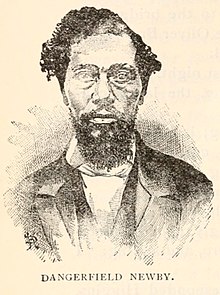

Happy Halloween, Crackers? A Bible fanatic waves a magic wand at what he would like to change, and poof! becomes the spark himself? On Oct. 16 (Sun.) (night) abolitionist Moses wannabe (not Madonna?) John Brown (b. 1800) leads 22 young (all under the age of 30, three under the age of 21) (five colored) on a raid of the federal arsenal at Harpers Ferry, (West) Va. at the confluence of the Shenandoah and Potomac Rivers, in a crazy plot to capture arms and give them to imaginary slaves that will flock to them and begin the big insurrection; they first take the rifle factory, then capture Col. Washington (George Washington's great-grand-nephew), along with a sword given to the latter by Frederick II the Great, freeing and arming Washington's docile slaves; next they take the Maryland Bridge, guarded by Patrick Higgins, who fires an alarm shot; they then screw up and kill baggage master and free negro Shepherd Heyward when he refuses to halt (it was too dark to tell his color); then they take the arsenal itself, but soon the Jefferson Guard (the Charlestown militia) cut off their retreat and kill many of them; Brown sends emissaries to offer a truce, but they are captured and killed and mutilated; the next morning Col. Robert E. Lee and J.E.B. Stuart lead U.S. Marines to surround the arsenal, where only five raiders remain alive in the brick engine house; after Stuart parleys with Brown, who refuses unconditional surrender, he leaves and waves his hat, and a 15-min. assault results in two Marines dead and Brown captured; Culpeper County, Va.-born "huge mulatto" Dangerfield F. Newby (b. 1820) is KIA, and his body mutilated by a white crowd and later dined on by hogs, causing Hog Alley to be named; Brown is tried on Oct. 31 on three counts, conspiracy with negroes, treason against the Commonwealth of Va. (third person in the U.S. charged with treason after Benedict Arnold and Thomas Dorr) and murder, then hanged in Charlestown on Dec. 2 despite an Oct. 30 essay by Henry David Thoreau titled A Plea for Captain John Brown, his last prophetic words predicting the U.S. Civil War less than two years later written from his cell being "I John Brown am now quite certain that the crimes of this guilty land will never be purged away but with Blood. I had as now think vainly flattered myself that without very much bloodshed it might be done"; his son Owen and six others escape, but those captured with him suffer his fate; the Am. South overracts, alarmed at the specter of armed black insurrections aided by Northern whites under every tree; new U.S. rep. (R-Ohio) (1859-69) James Mitchell Ashley (1824-96) accompanies John Brown's widow to the execution; white-haired 65-y.-o. Va. planter and War of 1812 vet Edmund Ruffin (1794-1865) is parading with the teenage cadets at the Va. Military Inst. when Brown is hanged, later firing the first shot on Ft. Sumter; volunteer John Wilkes Booth is also present at the hanging in the uniform of a Va. regiment; Emerson calls his Messianic hanging "as glorious as the cross", knowing that now God is behind a bloody end to the horrible crime of racial slavery; the Doughfaces (Northerners with Southern sympathies) begin to split, torn between the desire to support popular sovereignty to protect against federal power and the desire to call on the federal govt. to protect slavery in the territories until it prepares a constitution and applies for statehood.


The Book That Shook the World? Big year for Bible skeptics, secularists, atheistic scientists, anybody against the ancien regime, as Jehovah, the Source of Life Breathed Into Mud is challenged by Godless Evolution, Mud Coming to Life by Itself After It Bubbles Long Enough? The biggest V for the Devil since Eden? The new 95 Theses, but Darwin is smart enough not to publish it on Halloween? On Nov. 24, 1859 (Thur.) English naturalist Charles Robert Darwin (1809-82) pub. On the Origin of Species By Means of Natural Selection, Or, The Preservation of Favoured Races in the Struggle for Life; the 1st ed. sells out in 1 day; the 1872 6th ed. shortens the title to "The Origin of Species"; the decider, which causes evolutionary "survival of the fittest" theory to triumph among the intelligentsia; English Anglican minister and Cambridge U. prof. of modern history Charles Kingsley (1819-75), who received an advance copy on Nov. 18 writes that he had "long since, from watching the crossing of domesticated animals and plants, learnt to disbelieve the dogma of the permanence of the species", which Darwin adds to the next ed. of his book in a modified form: "He had gradually learned to see that it is just as noble a conception of the Deity to believe that He created a few original forms capable of self-development into other and needful forms, as to believe that He required a fresh act of creation to supply the voids caused by the action of His laws"; Darwin pub. it after spending eight years dissecting barnacles in his basement, then inexplicably switching to the Galapagos finch?; catches on first in Germany among atheists?; "If it could be demonstrated that any complex organ existed, which could not possibly have been formed by numerous, successive, slight modifications, my theory would absolutely break down"; Louis Agassiz of the U.S. opposes Darwin, preferring a theory of "Epochs of Creation", based on the absence of missing links between layers of well-formed fossil ecosystems; the phrase "I'll be a monkey's uncle" is coined by Darwin skeptics; "There is a grandeur in this view of life that, whilst this planet has gone cycling on according to the fixed law of gravity, from so simple a beginning endless forms most beautiful and most wonderful have been, and are being, evolved"; what was that about "my theory would absolutely break down" if anything is found that can't be explained by "numerous, successive, slight modifications"?; in practice Darwinism becomes a religion which denies that there is intelligent design in Nature, and therefore tries to deconstruct any evidence of it they find as they go along, yet clings to the notion of common descent, almost as if there was some original, er, accident, and ends up turning into a narrow naturalistic dogma by the end of the 20th cent., taking over U.S. and other Western educational systems with a chilling priesthood? In 1860 after failing to fit it into his Theory of Evolution, Darwin writes the immortal soundbyte: "The sight of a feather in a peacock's tail makes me sick." On Feb. 1, 1871 he writes a Letter to Sir Joseph Dalton Hooker, with the soundbyte: "It is often said that all the conditions for the first production of a living organism are now present, which could ever have been present. But if (and oh! what a big if!) we could conceive in some warm little pond, with all sorts of ammonia and phosphoric salts, light, heat, electricity, &c., present, that a protein compound was chemically formed ready to undergo still more complex changes, at the present day such matter would be instantly absorbed, which would not have been the case before living creatures were found." In 1871 he pub. The Descent of Man; "The Simidae then branched off into two great stems, the New World and the Old World monkeys; and from the latter at a remote period, Man, the wonder and glory of the universe, proceeded"; "We civilized men... do our utmost to check the process of elimination; we build asylums for the imbecile, the maimed, and the sick; we institute poor laws; and our medical men exert their utmost skill to save the life of everyone to the last moment... Thus the weak members of civilized societies propagate their kind. No one who has attended to the breeding of domestic animals will doubt that this must be highly injurious to the race of man. It is surprising how soon a want of care, or care wrongly directed, leads to the degeneration of a domestic race; but excepting in the case of man himself, hardly anyone is so ignorant as to allow his worst animals to breed"; "This is the book that contains the foundation in natural history for our view" (Marx to Engels); this book is later used by Eugenicists to justify euthanasia of misfits.











In 1860 the Eighth (8th) (1860) U.S. Census reports the total pop. as 31,443,321 in a land area of 2,969,640 sq. mi. (10.6 per sq. mi.); black: 4,441,790; free blacks: 488K; the 23 Northern states have a combined pop. of 21M vs. 9M for the Confederate states (5M white, 4M slaves); blacks are over 50% of the pop. of S.C. and Miss., and over 40% of the pop. of Ala., Fla., Ga., La. and Va. (excluding W. Va.); the slave pop. was 500K at the end of the Am. Rev. in 1781; the over-65 pop. is 2.7% of the total (849K); one of every eight people in the U.S. is foreign-born; there are 1.6M Irish, 1.3M Germans (one-third Catholic), 588K British (mostly English), 72.6K Scandinavians, and 35.5K Chinese immigrants in the U.S.; pop. of Washington, D.C.: 75,080, incl. 61K in the city and 8.7K in the village of Georgetown. As of this year no U.S. Republican owns any slaves. On Feb. 27, 1860 beardless Abraham Lincoln gives a speech at the Cooper Union in Manhattan, N.Y., followed by a speech on Mar. 6 in New Haven, Conn., establishing him as a viable candidate for the Repub. pres. nomination; in New York he leans on Pres. George Washington for support of his views on the spread of slavery. On Apr. 23 the 1860 Dem. Nat. Convention opens in Charleston, S.C., then splits on May 23 into Northern and Southern sections after the Northern delegates refuse to agree to a pro-slavery platform, causing the delegates of eight Southern states, led by William Lowndes Yancey (1814-63) of Ala. to walk out; on June 18 the Northern (rump) section holds its convention in Baltimore, Md., and splits again, the Northerners on June 23 nominating Ill. Sen. Stephen Arnold Douglas (1813-61) for pres. and Ga. gov. (1853-7) Herschel Vespasian Johnson (1812-80) for vice-pres.; the 1860 Dem. Party Platform of June 18 defers to the U.S. Supreme Court for guidance on the slavery issue; New York City banking millionaire ("King of Fifth Avenue") August Belmont Sr. (1813-90) (a French-born Prussian Jew who immigrated to New York City in 1837 as the first U.S. rep. of the Rothschild banking house in Frankfurt) supports Douglas and becomes chmn. of the Dem. Nat. Committee, going on to help the Union finance the war with England and France; on June 23 the pro-slavery Southern section of the Dem. Nat. Convention nominates Ky.-born vice-pres. John Cabell Breckinridge (1821-75) (whose portrait bears a striking resemblance to Hollywood actor Kyle MacLachlan (1959-)?) for pres., and N.C.-born Joseph "Joe" Lane (1801-81) for vice-pres.; on May 9 the Constitutional Union Party, made up of former Whigs trying to ignore the slavery issue and concentrate on preserving the Union nominates Nashville-born Tenn. Sen. (former House Speaker) John Bell (1796-1869) for pres. and Boston-born Edward Everett (1794-1865) for vice-pres. Another Faustian bargain, or God's hand? On May 18 (19 mo. after John Brown's Harper Ferry raid) despite candidates like William H. Seward, Salmon P. Chase, and Edward Bates being better known, prepared, and financed, perceived moderate (lesser of evils?) Abraham Lincoln of Ill., after announcing that "no such good luck" was in store for him this time (with the power to carry Ill. and Ind.) outmaneuvers them to win the pres. nomination at the 1860 Repub. Nat. Convention in Chicago, Ill. on the 3rd ballot after the favorite Sen. William H. Seward of N.Y. is perceived as too radical on slavery for Northern tastes and too friendly towards immigrants to please the Know-Nothings now in the party; the 1860 Repub. Platform incl. no extension of slavery, protective tariffs, internal improvements, and free land for Western settlers really pisses the Southerners off, but the Repubs. have written them off anyway; Lincoln's campaign slogan is "Vote yourself a farm"; Hannibal Hamlin is nominated for vice-pres. Another Faustian bargain, or God's hand? On May 18 (19 mo. after John Brown's Harper Ferry raid) despite candidates like William H. Seward, Salmon P. Chase, and Edward Bates being better known, prepared, and financed, perceived moderate (lesser of evils?) Abraham Lincoln of Ill., after announcing that "no such good luck" was in store for him this time (with the power to carry Ill. and Ind.) outmaneuvers them to win the pres. nomination at the 1860 Repub. Nat. Convention in Chicago, Ill. on the 3rd ballot after the favorite Sen. William H. Seward of N.Y. is perceived as too radical on slavery for Northern tastes and too friendly towards immigrants to please the Know-Nothings now in the party; the 1860 Repub. Platform incl. no extension of slavery, protective tariffs, internal improvements, and free land for Western settlers really pisses the Southerners off, but the Repubs. have written them off anyway; Lincoln's campaign slogan is "Vote yourself a farm"; Hannibal Hamlin is nominated for vice-pres. The die is cast for war Between white and white in America? On Nov. 6 the fateful 1860 U.S. Pres. Election sees beardless Abraham "Honest Abe" Lincoln (1809-65) of the Repub. Party elected pres. of the high-tension U.S., with 1,864,735 votes (40%) (180 electoral votes, a majority), incl. a majority of the votes in the North (only 26,388 votes in the South), compared to 2,821,157 for the combined opposition; Northern Dem. Stephen Douglas gets 1,375,157 votes (29%) (a lousy 12 electoral votes, 9 from Mo. and 9 from N.J.), Southern Dem. John C. Breckinridge gets 847,953 votes (18%) (72 electoral votes, incl. every state in the Deep South plus N.C., Del., Md.); Constitutional Union Party (Whig) John Bell brings up the rear with 589,581 votes (13%), but comes in 3rd in electoral balloting with 39 electoral votes, from Tenn., Va., Ky.); the first (only) time that a third party elects a U.S. pres.; the American people actually end up voting overwhelmingly for pro-Union (all except Breckinridge) and anti-slavery-expansion (Lincoln) candidates, but the stampede for secession is already on (something about not letting the door hit your ass on the way out?); Lincoln gets just 179 votes (25%) in Los Angeles, Calif., and during the war there is talk of pro-Confederacy Southern Calif. splitting off to form its own state, causing Camp Drum (San Pedro) in San Pedro (closed Nov. 7, 1871) to be built next year by the U.S. govt., which stations troops in Catalina Island to prevent Confederate privateers from seizing it; rumors that he's a secret Roman Catholic circulate, based on his past defense of a priest in a slander lawsuit and denunciation of the Know-Nothing Party; Lincoln starts growing a beard after the election after 11-y.-o. Grace Greenwood Bedell (1848-1936) writes him a letter suggesting it, making him the first U.S. pres. to wear one (Grant, Hayes, Garfield, Harrison), and the first photo showing him bearded is taken on Nov. 25 in Chicago by Samuel G. Alschuler - the Emperor Hadrian of presidents? A lame attempt at a last minute compromise proves a critical failure? On Nov. 14 Alexander Stephens addresses the Georgia Legislature on secession; Congress meets, and on Dec. 18 the 11th-hour Crittenden Compromise is offered by Ky. Dem. Sen. (since 1855) (former U.S. atty. gen. in 1841 and 1850-3) John Jordan Crittenden (1786-1863), a member of the Senate Committee of Thirteen appointed to review compromise plans; it proposes a line at 36 deg. 30 min., S of which slavery will be permanently protected in all present and future territories, and offers compensation to the owners of fugitive slaves, causing pres.-elect Lincoln in Springfield, Ill. to advise Repub. senators: "Entertain no proposition for a compromise in regard to the extension of slavery"; Repub. opposition kills it in the House in Jan. and the Senate in Mar. This would be a good time for one hell of a speech? On Dec. 3 lame duck Pres. James Buchanan gives his Fourth Annual Message to Congress, arguing that secession is illegal, but that he lacks authority to coerce a state; however, the pres. can enforce the laws upon individual citizens, since the U.S. officially doesn't recognize secessions; by the end of Dec. two of his three Southern cabinet members depart, and he frantically waffles to the end hoping for a rabbit to come out of a hole, and finally coming to believe he'd be the last U.S. pres. - if he only weren't such a wuss, everybody's thinking? On Dec. 6 the S.C. legislature sets a special election to choose delegates to a convention for Dec. 20. Oh what I wouldn't give to have these two weeks back? On Dec. 20 S.C. unanimously votes an Ordinance of Secession, dissolving "the union between the State of South Carolina and the other States united with her under the compact entitled 'The Constitution of the United States of America'", and seceding from the Union (#1); before Lincoln's inauguration six more Southern slave states secede, with eight more of the 15 slave states on the fence.
In 1860 Wheaton College is founded in Wheaton, Ill. by Wesleyan Methodist abolitionists, going coed and becoming a stop on the Underground Railroad.
Beginning in the 1860s immigrant parties of whites who run into Indians in the West are routinely killed, mutilated, raped, and butchered; early in this decade the Buffalo Soldiers (black troopers of the 9th and 10th cavalry regiments and the 24th and 25th infantry regiments) are formed to fight in the Final Indian Wars (1860-90); the name is a mark of respect from the Indians; in the east blacks offering themselves for military service are turned into cooks, carpenters, and laborers at first, but by war's end almost 200K serve under the U.S. flag - blacks helping whites kill reds and browns, doo-dah?


On Dec. 26, 1860 Maj. Robert Anderson (1805-71) (a pro-slavery Unionist from Ky.) moves his 80-man garrison from Ft. Moultrie to the more defensible but uncompleted Ft. Sumter in seceded Charleston, S.C. harbor, saying to the South, in effect, "up yours"; this is one of only four U.S. military posts in seceded states, and the most important; S.C. politely requests the Union to transfer the fort, but Pres. Buchanan refuses.
In 1860 the Free Methodist Church of North Am. is founded by lay members excluded from the Genesee Conference of the Methodist Episcopal Church who want to restore the historic Wesleyan faith sans slavery, secret societies, and rented pew seats.
In 1861 the slave biz in the Am. South is worth $3.5B, the biggest financial asset in the U.S., greater than factories, railroads, etc.; the Civil War causes women to enter the nursing prof.; so many POWs are taken in the Civil War that they resort to a parole system. The U.S. Civil war causes the pop. of Washington, D.C. to zoom from 60K to 120K, incl. thousands of freed slaves, causing Congress to launch a major building program after the war.
On Jan. 9, 1861 (Wed.) (dawn) the Star of the West, is fired on as it approaches within 1.75 mi. of Ft. Sumter by S.C. Citadel cadet George E. Haynsworth, becoming the first shot of the U.S. Civil War, after which the artillery bombardment causes them to turn around and head back to New York City, arriving on Jan. 12; the news is purposely delayed in an attempt to avert war fever, and Pres. Buchanan takes no further action to save the fort - I'm pretending mine's a meatball cheeseburger?




This noise is unacceptable, or, Ay, Oy, let's go? The War Across Five Aprils starts when something small gets blown out of proportion in a high-strung environment? The first 100 days of the U.S. Civil War are a mixture of cocksureness and uncertainty? On Apr. 6, 1861 after rejecting Gen. Winfield Scott's recommendation to give up pesky undermanned (less than 100 men) Ft. Sumter because it would take 20K troops and a whole fleet to reinforce it, and would start a bloody war that would destroy the U.S. after driving four more states out of the Union, and rejecting secy. of state Seward's plan to evacuate it while he leaks news of it to the press along with assertions to the Confeds. that he will soon be in charge of foreign policy, and all but two cabinet members recommending surrender on Mar. 16, Pres. Lincoln informs S.C. Gov. Francis Wilkinson Pickens (1805-69) that a naval expedition is being to sent to reprovision the hungry garrison, with Lincoln uttering the soundbye that if the rebels fire on ships carrying food to hungry men, they will take all the blame for the war, forcing the Confeds. to fire the first shot and become the aggressors to have their bloody war, leaving the Union the moral high ground; on Apr. 11 after being sanctioned by Gov. Pickens, the Confederates under La. Creole Gen. Pierre Gustave Toutant Beauregard (1818-93) (former supt. of West Point, who had been Robert Anderson's student there) demand surrender, and then fire at 4:30 a.m. on Apr. 12 (Fri.) (not Friday the 13th?) from Ft. Johnson on James Island, followed by crossfire from Sullivan's Island (long-time final destination for African slaves surviving the Middle Passage) and Morris Island; white-haired Va. planter and pro-slavery fire-eating agitator Edmund Ruffin (1794-1865) dresses in a Palmetto Guard uniform and is given the honor of firing the first shell; artillery Capt. (West Point grad.) Abner Doubleday (1819-93) (alleged inventor of baseball) fires the first Union shot, and is later promoted to gen. (batter up?); on Apr. 13 after 30 hours, with his ammo exhausted, Maj. Robert Anderson agrees to surrender, lowering its flag on Apr. 14 (Sun.); 3K+ shells hit Ft. Sumter, and there are no fatalities until two Union soldiers are killed in an explosion during a final 100-gun salute to the colors; the first Union soldier killed is Pvt. Theodore Winthrop (b. 1828), whose ms. for a novel is pub. and becomes a bestseller; the 2nd is Union pvt. Daniel Hough; on May 15 big hero Anderson is promoted to brig. gen., participating in the largest public gathering in North Am. to date, a patriotic rally in New York City, after which he goes on a recruiting tour then becomes cmdr. of border state Ky. until retirement on Oct. 6, being replaced by William Tecumseh Sherman; after the Confeds take Ft. Sumter they pad it with bales of cotton; the U.S. (Am.) Civil War begins (ends May 9, 1865), which the Confeds. prefer to call the War Between the States, the War of Northern Aggression, or something even more unbiased; it ends up causing 10.5K battles in 33 U.S. states, of which 384 are considered major; at the start, Southerners owe Northerners $300M; Southerners who sympathize with the Union cause become known as "Scalawags" (useless farm animals); in Apr. the 10-y.-o. New York Times begins pub. Sunday eds. to capitalize on interest in the Civil War; Lincoln can see rebel flags flying over Alexandria, Va. across the Potomac from Washington, D.C.; British public opinion on the war is divided, with the aristocracy pro-South, and the working class pro-North despite the loss of Southern cotton throwing thousands of cotton factory workers out of work - regular or quilted brand?
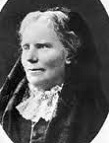




Women get the dirty jobs in the war? On June 9, 1861 the U.S. Sanitary Commission is created by secy. of war Simon Cameron as an outgrowth of the Ladies Central Relief, founded Apr. 25 by Dr. Elizabeth Blackwell (1821-1910) (first female M.D. in the U.S., 1849); the first dir. is New York Central Park designer Frederick Law Olmsted; meanwhile former schoolteacher Clarissa "Clara" Harlowe Barton (1821-1912), quits her job at the U.S. Patent Office to distribute food and supplies sent by families in Mass. to troops stationed in Washington, D.C., and after seeing that wounded soldiers from the First Battle of Bull Run brought to the Potomac docks are dying for want of prompt medical attention, she gains permission to pass through the battle lines and nurse them, battling the traditional ho image and going on to become known as "the Angel of the Battlefield", raising thousands of dollars to buy food and medicine for Union troops, and creating facilities for recovering their lost baggage; meanwhile Dorothea Dix (1802-87) (don't be a dix teaser?) is appointed Union Army supt. of 3K women war nurses, incl. novelist Louisa May Alcott; black women, incl. Harriet Tubman (Araminta Ross) (1822-1913) and Susie King Taylor (1848-1912) serve as war nurses in the Sea Islands; on the Confed. side "Capt." Sally Louisa Tompkins (1833-1916) of Richmond, Va. (only commissioned woman in the Confed. Army) gains fame for saving 1,260 out of 1,333 wounded men in a private hospital with only six other nurses; not that all woman want to smell rank body fluids; over 400 women disguise themselves as men to fight in the war, and dozens work as spies, while thousands travel with the army cooking, writing letters, and hooking; by the end of the war many Southern women get over their lifetime coddling and become self-reliant after being forced to manage their plantations without men, and go on to face life as widows, spinsters, and orphans (and lesbians?), who prefer to work outside the home - like Scarlett O'Hara?
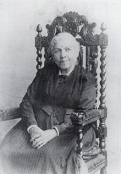
In 1861 Harriet Ann Jacobs (1813-97) pub. Incidents in the Life of a Slave Girl: Written by Herself (with help from Lydia Maria Child); pub. under the alias Linda Brent; first full-length slave narrative written by a woman and pub. in the U.S., written after her escape from slavery in Edonton, N.C. to Idlewild on the Hudson River in N.Y., home of writer-publisher Nathaniel Parker Wills; portions are pub. in The New-York Tribune; the descriptions of sexual exploitation by her lusty white massah insures good sales, er, cause pub. to be ceased, and rediscovered in the late 20th cent.
In early Mar. 1862 Pres. Lincoln proposes that federal compensation be offered to any state which begins gradual emancipation, claiming that the cost in the border states would be no more than the cost of 87 days of the war; border state opposition kills it; on Mar. 6, 1862 Pres. Lincoln proposes a revised plan of compensated emancipation for slave owners in the District of Columbia and border states, which is passed on Apr. 3, and signed by Lincoln on Apr. 16 under the name U.S. District of Columbia Compensated Emancipation Act, ending slavery in the District of Columbia, compensating the owners, and setting aside $100K to pay passage for those wanting to emigrate to Haiti or Liberia - no doubt hoping they all will, and there's more money available for that too?
Lincoln wants to free the slaves - as long as they leave America? On Aug. 14, 1862 Pres. Lincoln delivers his Suffers from Your Presence Speech to a group of prominent free blacks: "Your race suffers greatly, many of them, by living among us, while ours suffers from your presence. If this is admitted, it affords a reason why we should be separated"; the Lincoln admin. sends inquiries to South Am. and African govts., but only Panama and the Caribbean island of Ile a Vache (Fr. "cow island") off SW Haiti are found acceptable as places for freed slave colonies - who must of course be put far enough away to be kept from "our white wimmin"?
On Sept. 22, 1862 after informing his cabinet in July of his purpose, then submitting it in draft form (handwritten on four sheets of paper) on Aug. 22, and haunting the War Dept. waiting for news of a Union V to make it not look like a desperation move, Pres. Lincoln issues a preliminary Emancipation Proclamation, permanently freeing all slaves living in rebel territory as of Jan. 1, 1863 (where he had no power to free them?), while leaving those in border states in slavery, albeit with an understanding that one day, one day; the Russians, who freed their serfs in 1861 are favorably impressed at being copied by the backward Amerikanskies; now the Union stands for the principle that all men shall be free, giving it a religious dimension, the original playing of the race card, get me a hanky I'm about to faint; Frederick Douglass predicts that it "will be worthless, miserable mockery unless the nation shall so far conquer its prejudice as to welcome into the army full-grown black men to help fight the battles of the Republic"; it takes until 2008 for the U.S. to elect its first pres. with a noticeable amount of African blood.

In 1862 Roxbury, Mass.-born Unitarian minister Edward Everett Hale (1822-1909) (great-nephew of Nathan Hale) pub. The Man Without a Country, inspired by a Northerner whose Southern sympathies got him exiled to Canada; it strengthens the Union cause in the North.
On Jan. 1, 1863 (Thur.) Pres. Lincoln cites his war powers and signs the (second) Emancipation Proclamation, freeing slaves, but only those in states in "rebellion", i.e., the Confederacy, and (after being persuaded by Andrew Johnson) exempting Tenn. and the occupied parts of Va. and La., thus freeing no slaves behind the Union lines of the time (of course the Confed. states ignore it); meanwhile, 800K in Union states (Del., Md., Ky., Mo.) remain slaves, kissing massah's big black boots; the act urges slaves to abstain from violence except in self-defense, and proclaims that free blacks can now serve in the U.S. armed forces; still, it is a political success, and Henry Adams writes from the London embassy that it has caused "an almost convulsive reaction in our favour".




On May 13, 1863 black S.C.-born pilot Robert Smalls (1839-1915) hijacks the fully-armed Confed. gunboat Planter and sails his family through Charleston Harbor to join the Union fleet, giving them stolen Union maps and plans, winning a $1.5K reward from Congress and proving that blacks don't want to stay slaves and will fight for it, convincing Congress to allow blacks to serve in the Union Army and assisting the 5K-man 1st South Carolina Volunteers; after becoming a naval hero and becoming the first Capt. of a U.S. navy vessel, Smalls becomes a Repub. congressman and author of the S.C. constitution, and big black hero, causing the whites to later attempt to cover him up in the history books; in 1863 Ft. Robert Smalls is built by free blacks at the mouth of Becks Run in Arlington Heights near Pittsburgh, Penn.; in 2004 USS Robert Smalls is launched, becoming the first U.S. Army ship named after an African-Am.; the Mass. 54th Regiment under Harvard grad. Col. Robert Gould Shaw (1837-63), son of a prominent abolitionist becomes the first Union all-Negro army unit, followed by regiments in R.I. and other states; the stress must have gotten to him, because Lincoln comes down with varioloid, a mild form of smallpox. On July 18, 1863 the all-black 54th Mass. Volunteers (Colored Infantry) under Col. Robert Gould Shaw (b. 1837) charge the massive earthworks of Ft. Wagner outside Charleston, S.C., losing almost half the regiment, incl. Shaw, whose body is stripped by the Confederates and thrown into a ditch filled with his slain men; Sgt. William Harvey Carney (1840-1908) becomes the first African-Am. to receive the Medal of Honor 36 years later for retrieving the colors from the regiment's slain flag-bearer and carrying them safely to the rear despite being shot in the head, chest, arm and leg (the first of 23 blacks to win the MOH); "Through the cannon smoke of the dark night the manhood of the colored race shines before many eyes that would not see" (Atlantic Monthly); Union Adm. Samuel Francis Dupont (1803-65) leads a Union naval attack on the city, which is repulsed with great losses, and when he is ordered to attack again he balks on grounds of insufficient forces, causing him to be relieved of command and retired from active duty; since white is right, in 1882 the U.S. Congress commemorates his name, and Du Pont Circle in Washington, D.C. is named after him, with a statue of him erected there.








On Dec. 14, 1863 abolitionist U.S. rep. (R-Ohio) (1859-69) James Mitchell Ashley (1824-96) introduces a U.S. Constitutional amendment to abolish slavery, becoming the first since J.Q. Adams in 1839; a similar proposal is soon made by U.S. Rep. (R-Iowa) (1861-8) James Falconer "Jefferson Jim" Wilson (1928-95). On Jan. 11, 1864 U.S. Sen. (D-Mo.) (a War Dem.) John Brooks Henderson (1826-1913) introduces a joint resolution for an amendment to abolish slavery. On Feb. 8, 1864 U.S. Sen. (R-Mass.) (1851-74) Charles Sumner (1811-74) (known for his big beating in 1856) introduces another version, with a guarantee of equality, causing a combined amendment to be submitted by the Senate Judiciary Committee to the Senate on Feb. 10, 1864; on Apr. 8, 1864 the Senate passes it by a 38-6 vote, but on June 15, 1864 the House rejects it by 93-65 (for-against). The Confederacy is done for, stick it with a fork? On Jan., 1865 31 after abolitionist Ohio Repub. Rep. (1859-9) James Mitchell Ashley (1824-96) (House floor mgr.) (known for traveling with John Brown's widow to see his execution, writing a bill to abolish slavery in the District of Columbia, and introducing the first bill for a constitutional amendment to abolish slavery on Dec. 14, 1863) moves for a reconsideration on Jan. 6, causing a month-long House debate with crowded galleries, giving Ashley time to swing some lame duck Dems., and Pres. Lincoln sends a last minute trick message to the House claiming that he has "no knowledge" of Southern peace reps. in Washington, D.C. even though he sent Repub. leader Francis Preston Blair Sr. (1791-1876) to Richmond, Va. to persuade Jefferson Davis to send commissioners incl. vice-pres. Alexander Stephens to discuss peace terms, and had them held up at Gen. Grant's HQ in Va. on Jan. 29 to help the amendment pass, and Radical Repub. leader Thaddeus Stevens (1792-1868) on Jan. 13 cops-out and claims it's only to create "equality before the law" rather than racial equality, weathering sarcastic questions from Copperhead Dem. N.Y. rep. (1863-5) (Tammany Hall sachem) Fernando Wood (1812-81) and Ohio rep. (1857-85) (pro-slavery leader) "Gentleman" George Hunt Pendleton (1825-89), the Thirteenth (13th) Amendment to the U.S. Constitution, abolishing slavery and involuntary servitude except as punishment for a crime, originally introduced by U.S. Sen. (R-Ill.). (1855-73) Lyman Trumbull (1813-96) (chmn. of the Senate Judiciary Committee) is approved by the 38th Congress by 119-56-8 to a great cheer incl. blacks in the gallery, and sent to the states for ratification on Feb. 1, and after Ga. becomes state #27 of 36 to ratify it on Dec. 6, on Dec. 18 it is officially adopted by U.S. secy. of state William Seward; Stevens later utters the soundbyte: "The greatest measure of the nineteenth century was passed by corruption, aided and abetted by the purest man in America"; Lincoln could have waited until Mar. to call a special session of the Congress, with enough votes to pass it assured, but claims that prompt bipartisan approval would show nat. unity; he really thinks it can't be passed if the war ends first?; in 1864 the Cooperheads pub. the pamphlet Abraham Africanus I: His Secret Life, Revealed under the Mesmeric Influence, claiming that Lincoln signed a contract with the Devil to become pres. for life and "subvert the liberties of the American people and debach their civic aspirations", which doesn't keep the amendment from passing; Fla. ratifies it on Dec. 28, N.J. in 1866, Tex. in 1870, Del. in 1901, and Ky. in 1976; Mo. and Tenn. abolish slavery by state action in Jan.; too bad, the Southern states soon exploit the loophole that slavery is permissible as punishment for crimes, soon getting freed slaves sentenced to "time at hard labor" sans prisons, creating the Convict Lease Labor Racket, which lasts until WWII although in 1928 Ala. becomes the last state to do it officially; it takes until Feb. 7, 2013 for Miss. to finally ratify it after it's ratified in 1995 but the notification isn't sent to Congress until the Oct. 8, 2012 Steven Spielberg film Lincoln alerts U. of Miss. profs. Ranjan Batra and Ken Sullivan to kick the Miss. secy. of state in the pants.
On Feb. 3, 1865 the Hampton Roads Conference aboard the River Queen near Ft. Monroe in Hampton, Va., the first of the war between the Union and Confederacy is a bust after Pres. Lincoln and William Seward demand reunion and Confed. vice-pres. Alexander Stephens wants to stay independent, the emancipation issue dealing it a double-whammy; a harebrained scheme by Francis Preston Blair to get them to kiss and make up in order to attack Emperor Maximilian in Mexico is dropped - why, I can't keep my mammie?


On Feb. 27, 1865 after recruiting thousands of blacks for the military in R.I., Conn., and Cleveland, and visiting Lincoln on Feb. 8, impressing him with his intelligence, causing him to reconsider an appeal made to him in 1863 by Frederick Douglass (1818-95), former African nationalist (now that the Civil War is on, I'll give it another chance?) Martin Robinson Delany (1812-85) is commissioned as a maj. in the 52nd U.S. Colored Troops, becoming the first black line field officer in the U.S. Army; in Feb. the first occupation troops to arrive in Charleston, S.C., the "holy of holies" of the Confederacy are guess, black units, incl. the Third and Fourth S.C. Regiments, partially manned by former slaves of that very city where the secession convention had been held in 1861 and the Dem. Party had been disrupted by a Southern walkout in 1860. During the Civil War the U.S. Colored Troops enlist a total of 178K black Americans, about 10% of the Union army total; 29.5K serve in the U.S. Navy, about 25% of the total; Company E of the Fourth U.S. Colored Troops gains fame for defending Washington, D.C.


On Mar. 3, 1865 Congress sets up within the U.S. War Dept. the Bureau of Refugees, Freedmen, and Abandoned Lands (Freedman's Bureau) to provide 400K freed slaves with "provisions, clothing and fuel", with Gen. Oliver Otis Howard (1830-1909) as dir.; Pres. Johnson cancels Sherman's Field Order 15, and sends troops to restore the land given to blacks to their former white owners; the bureau takes over abandoned and confiscated land, and Howard gets Gen. Sherman to promise that every freedman will get "forty acres and a mule", offering it for rental in 40-acre tracts to "loyal refugees and freedmen", who can buy the land at a fair price within three years; too bad, the amount of land available is too limited for everybody to get theirs, being limited to a 30-mi.-wide coastal strip from Charleston S to St. John's River in Fla., and Howard receives orders to evict blacks from all other plots except on the Sea Islands; on July 23 black Maj. Martin Robinson Delany is appointed asst. commissioner and gives lectures to white officers, pissing them off with his uppityness, getting him removed on Aug. 7, while white Maj. Gen. Robert Kingston Scott (1826-1900) (new gov. of S.C.) replaces gen. Rufus Saxton as head of the Freedman's Bureau, becoming known for corruption - all I got is this t-shirt?
The greatest speech in U.S. history? On Mar. 4, 1865 U.S. pres. #16 (since Mar. 4, 1861) Abraham Lincoln of the Union Party is inaugurated at the U.S. Patent Office (now a military hospital) in Washington, D.C. for a 2nd term in the 22nd U.S. Pres. Inauguration; first U.S. pres. to be elected for a 2nd term and not finish it (McKinley, Nixon); four cos. of African-Am. troops from the lodges of the African-Am. Masons and African-Am. Odd Fellows march in the procession to the U.S. Capitol, becoming the first time that African-Ams. march in the inauguration parade; Raleigh, N.C.-born Andrew Johnson (1808-75) becomes the 16th U.S. vice-pres. (he never went to school and was taught to read to the other tailors by his boss while sewing, and to write and do math by his wife Eliza, and is drunk as a skunk during his inauguration); Hannibal Hamlin becomes a collector in the port of Boston, Mass.; on Mar. 4 Lincoln's Second Inaugural Address, delivered to a biracial audience (the blacks considering him as their savior) is only 701 words, lasts 7 min., and is Biblical in tone, complete with a dramatic moment when the clouds part and bathe him in brilliant sunlight (stolen by the 1981 British film "Chariots of Fire"?), beginning with the soundbyte: "Fondly do we hope, fervently do we pray that this mighty scourge of war may speedily pass away", remarking on how both sides pray to the same God and read the same Bible, and how one people can force another people to sweat to give them free bread, considering the war as God's retribution on all whites for the sin of slavery (which started in Jamestown in 1619, 246 years earlier), and concluding: "With malice toward none, with charity for all, with firmness in the right, as God gives us to see the right, let us strive on to finish the work we are in, to bind up the nation's wounds... to do all that shall achieve a just and lasting peace, among ourselves, and with all nations"; John Wilkes Booth attends Lincoln's inauguration and inaugural ball, where Frederick Douglass is barred by guards until Lincoln orders him to pass, then calls him his friend and asks for his valued opinion on the speech, which Douglass calls a sacred effort.


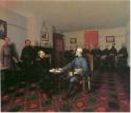
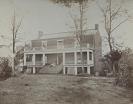
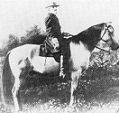

The Yankees make a McLean sweep of Lee's Army of Northern Virginia, which is too chivalrous and gentlemanly to Vietnamize of America? On Apr. 9, 1865 (Palm Sun.) (dawn) with the bulk of Gen. Sherman's forces moving N towards Va. since Feb., while Gen. Philip H. Sheridan's cavalry traps him, Gen. Lee stages a last-ditch attempt to break-out to the S, which fails after Union superiority is too great, and he is caged by an iron circle; Gen. Lee then holds a morning conference with his cmdrs., where artillery Gen. E. Porter Alexander (1839-) suggests a guerrilla war, but Lee rejects it with the soundbyte "It is our duty to live"; at 1:30 p.m. disobeying orders from Jefferson Davis to not surrender, Confed. Gen. Robert Edward Lee (1807-70), dressed in his best dress uniform complete with jewelled ceremonial sword (a proverbial Easter Bunny who's lost a shoe?) (thinking he will become a POW) picks the time and place then unconditionally surrenders to mud-splattered Union Gen. Ulysses Simpson "Unconditional Surrender" Grant (1822-85) (who arrives half an hour after Lee, sans sword) in the parlor of the 2-story brick home of retired (since 1854) wholesale grocer Wilmer McLean (1814-82) in nearby Appomattox Courthouse Village, Va., near Lynchburg, Va. (his goal, where he could have gained food and supplies and joined Gen. Johnston's army by rail), four years to the day after Confed. pres. Jefferson Finis Davis (1808-89) and his cabinet decided to attack Ft. Sumter; "After four years of arduous service marked by unsurpassed courage and fortitude, the Army of North Virginia has been compelled to yield to overwhelming numbers and resources" (Lee); at Pres. Lincoln's orders, Grant grants the Army of Northern Va. a complete amnesty on the condition of signing a parole promising to never take up arms against the Union again; Lee has 26,765 men left at the surrender; there are 175K Confed. troops still at arms; at Lee's request (to save face), Grant permits the remaining rebel officers to keep their sidearms, and the soldiers to keep their private horses and mules for the "spring planting", and orders food and fodder to be supplied to them; Gen. Grant orders all Union celebrations to halt; Grant's adjutant is Seneca Iroquois Indian Col. Ely Samuel Parker (1828-95) (writer of the final draft of the Confed. surrender terms), whom Lee at first mistakes for a negro, saying "I'm glad to see one real American here", to which Parker replies "We're all Americans, sir"; Parker is later promoted to brig. gen. retroactive to the surrender, and becomes head of the Federal Commission on Indian Affairs in 1869-71; Lee's iron-grey (black mane and tail) 16-hand "Confed. grey" horse (purchased for $200 for $200) Traveller (1857-70) carries him that day; Grant's horse is named Cincinnatus; Pres. Lincoln asks that Dixie be played when he receives news of Lee's surrender on Apr. 9; the war began in Wilmer McClean's house along Bull Run near Manassas Junction, and it ends in his new living room (making it a McClean sweep?); the U.S. Civil War (begun 1861) ends, with total casualties of 620K-700K killed (6X the number per capita killed in WWII) out a total of 2.5M-2.75M Union and 750K-1.25M Confed. soldiers (overwhelmingly white, except for 38K black army troops and 2.8K black sailors), leaving the Southern economy and landscape pretty much kaput, and 3.5M black U.S. slaves (worth $4B) to be set free with nowhere to go; battle deaths are 111K Union and 94K Confed., with disease killing 250K Union and 164K Confed. troops, for a total of 360K Union and 258K Confed. deaths; 112 every thousand Union and 150 every thousand Confed. troops in battle were wounded; on Apr. 20 Mathew Brady takes his famous Photo of Robert E. Lee after he heads straight back to Richmond, in his back porch, wearing his Confed. uniform for the last time; Lincoln's son Robert Todd Lincoln (1843-1926), who graduated from Harvard in July 1864 and used his daddy to get him a job on Gen. Grant's staff as a capt. early this year is present at Appomattox, and later sits at his dying daddy's bedside, and is later nearby at two more U.S. pres. assassinations (Garfield, McKinley); Confed. Gen. Jubal A. Early, after being relieved of command in early Mar. after a defeat in Penn. by Union Gen. Custer, flees to Texas, Mexico, Cuba, then Toronto, Canada until 1869, when he returns to Lynchburg, Va. to practice law; Civil War monuments are later erected, from Gettysburg, Penn. (northernmost) to Vicksburg, Miss. (southernmost).

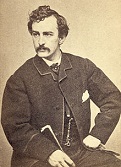









Drinkin' with Lincoln for the last time, or, It's a nice day for a White Wedding? On Apr. 14, 1865 (Good Friday) after having a dream about being in a ship racing to an unknown shore and waking at 7 a.m., U.S. pres. (since 1861) Abraham Lincoln (b. 1809) spends the afternoon discussing postwar policy with his cabinet, saying that he wants "no persecution, no bloody work" or radical restructuring of Southern socioeconomic life, and signs a law establishing the U.S. Bureau of Secret Service as a branch of the Treasury Dept.; at 3:00 p.m. he takes a walk with his wife, talking about travel plans incl. the Rocky Mts., Calif., and Jerusalem before returning to Springfield, Ill. to practice law; in the evening, after liquoring up at Taltavul's Saloon next door, leaving his bodyguard John Frederick Parker (1830-90) and valet Charles Forbes to have a few more, happy Lincoln goes to Ford's Theater (between E and F Sts. on 10th St., across E Street from the modern-day FBI HQ) at about 8:15 p.m. to attend a performance of Tom Taylor's 1858 Our American Cousin, starring English-born co-producer Laura Keene (Mary Frances Moss) (1826-73); vice-pres. Andrew Johnson was offered tickets but declined; at 10:14 p.m. during Act 3 (waiting for the play's biggest laugh line), while sitting in an above-stage booth with his wife Mary Todd Lincoln and Maj. Henry Reed Rathbone (1837-1911) and his fiance Clara Harris (1845-83) (daughter of U.S. Sen. Ira Harris of N.Y., a friend of Lincoln) (who accepted the invitation after the Grants declined at 11 a.m.), Lincoln is shot in the back of the head by the left ear with a .44 Derringer pistol by "the youngest tragedian in the world" John Wilkes Booth (1838-65) (who learned that afternoon that Lincoln would be attending), who then fights off Basil, er, Henry Rathbone with a large dagger, severely wounding him in his left arm, after which he escapes by leaping onto the stage, catching his spur on the Treasury flag decorating the box and breaking his left fibula just above the ankle, then theatrically shouting "Sic Semper Tyrannis" (Thus Ever to Tyrants), followed by "The South is avenged", exeunting out the back door after Rathbone shouts "Stop that man"; he timed his shot to come during the laughter after the line "Don't know the manners of good society, eh? Well, I guess I know enough to turn you inside out, old gal, you sockdologizing old man trap" by actor Harry Hawk (who was onstage alone); his older brother Edwin Thomas Booth (1833-93) had just saved Lincoln's son Robert Todd Lincoln at a train platform in Jersey City, N.J. a few weeks earlier, which saves his career and allows him to rise to the top later; Laura Keene IDs Booth and holds the dying Lincoln's head in her lap until he is taken to a house across the street; Lincoln's last words are "She won't think anything about it", in reply to his wife, who asked him "What will Miss Harris think of my hanging onto you so?"; Lincoln was mouthing some words about loving Jesus as he was shot, and planned on joining a Christian church on Easter Sunday?; Booth rides his horse over a bridge (the only one not closed?), talks his way past guards, then rides out of Washington (still decorated in honor of the war victory) before word of the shooting gets around, disappearing into the woods of Md., then leading the feds for 12 days on the greatest manhunt so far in U.S. history; at the same time Booth's accomplice Lewis Thornton Powell (AKA Paine) (1844-65) targets U.S. secy. of state William H. Seward, who is recovering from a fractured arm and jaw sustained nine days earlier when he was accidentally thrown from his carriage, talking his way past his servant William Bell by claiming to be delivering medicine, then attacking him in his bedroom and trying to shoot him, only to have the pistol misfire, then stabbing him repeatedly but not fatally in the neck before his frail daughter Fanny (d. 1866) squawks, bringing Seward's sons and house staff, who stop him after he stabs four others, incl. son Frederick William Seward (1830-1915) (asst. secy. of state, who is serving as acting secy.), whom he hits on the head with his pistol (either that, or Freddy was the first to confront him before he got to his daddy); vice-pres. Andrew Johnson gets lucky when his chosen assassin, German-born George Andreas Atzerodt (1835-65) chickens out of stabbing him in his sleeping quarters in Kirkwood House and ends up drunk in the barroom instead, but he goofs up and arouses suspicion, then leaves a gun, Bowie knife, and map of Va. in his hotel room, along with a bank book owned by John Wilkes Booth, and is arrested in bed on Apr. 20 in Germantown, Md.; meanwhile Lincoln is carried across 10th St. to the William Petersen Boarding House by three doctors and some soldiers, and placed diagonally on a bed on the 1st floor (since he was so tall), and dies the next morning (Apr. 15) at 7:22 a.m. after 23-y.-o. Army asst. surgeon Charles Augustus Leale (1841-1932) (first doctor to reach Lincoln after the shooting, who goes on to hold his hand to the end) assesses the wound as mortal, and U.S. Army surgeon gen. Joseph K. Barnes (1817-83) sticks things in his brain looking for the bullet, probably inducing his death (the Derringer ball stopped behind his left eye, and his frontal lobes weren't affected by the bullet?); Barnes continues his brilliant career by presiding over the death of U.S. Pres. James Garfield in 1881; Lincoln becomes the 2nd straight victim of the Zero-Year Presidential Curse (after W.H. Harrison); during the night war secy. Edwin M. Stanton unofficially runs the federal govt. from the rear parlor of the boarding house, and after the bad news utters the soundbyte "Now he belongs to the ages" (or was that angels?) (or was he referring to Charles Darwin (1809-82), and said apes?); between 1860 and his death approx. 450 songs and instrumental pieces were written about him, followed by 75 more funeral marches and 25 memorial pieces after death; Uncle Sam soon gains a beard in tribute to Abe; his death was the result of a conspiracy of world bankers or the Vatican?; he was actually suffering from the genetic syndrome called MEN 2B, had cancer, and would only have lived another year anyway? In 1876 Black abolitionist leader Frederick Douglass utters the soundbyte that Abraham Lincoln "was pre-eminently the white man's president, entirely devoted to the welfare of white men".


On Apr. 15, 1865 (Sat. before Easter) poor white redneck Raleigh, N.C.-born vice-pres. (former mayor of Greenville, Tenn., who was illiterate until age 21, and started out in 1834 by helping pass a new Tenn. constitution denying free blacks the right to vote, then became gov. of Tenn. in 1853, signing a law requiring blacks freed from slavery to be deported straight to Africa, but doesn't own slaves any more, and supported John C. Breckinridge in the 1860 election, and only met with Lincoln twice) (a drunken buffoon who had been widely written off until now, and was selected by Lincoln to reconcile the South with the North, although he is a Dem. not a Repub., and a total white supremacist who thinks of blacks as savages that should go back to the plantation and stay out of politics), Andrew Johnson (1808-75) of the Union Party (2nd and last pres. of this party) (the last Jacksonian pres. of the common people, white people that is, with a record 29 pres. vetoes vs. Jackson's record 12; Johnson's vetoes are overturned a record 15x) AKA "the Tennessee Tailor", "Sir Veto", "King Andy", "Andy the Sot", "Old Andy", "the Father of the Homestead Act" becomes the 17th U.S. pres. (until 1869) in the 23rd U.S. Pres. Inauguration (the 2nd Andrew after #7 Jackson) (3rd U.S. pres. not to have a vice-pres. after Tyler and Fillmore); his inauguration is interrupted by a talking parrot?; First Lady is Eliza McCardle Johnson (1810-76); during his first 6 weeks in office he makes speeches filled with vengeful statements against the Southern planter aristocracy and showing disdain for blacks; during his first 8 mos. in office, while Congress is in recess, Johnson oversees Reconstruction of eight Confed. states (Tenn., Ark., and La. had already been reconstructed by Lincoln), hoping for an egalitarian white South of yeoman farmers, but sees that tabled as traditional Southern leaders are returned to office by Southern voters, who petition for and get wholesale pardons; Repub. Party founder Francis Preston Blair Sr. gets pissed at Repub. Reconstruction measures and flops back to his, er, Jackson's Dem. Party, as does Montgomery Blair.
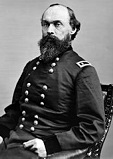
On June 19, 1865 the last 250K Southern slaves in Tex. learn that they had been freed 2.5 years earlier by the 1863 Emancipation Proclamation from Maj. Gen. Gordon Granger (1822-76) when his 2K Union troops land by ship in Galveston, Tex.; the day becomes the Juneteenth holiday with U.S. blacks, which Pres. Biden makes a nat. holiday on June 17, 2021.
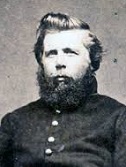
On Dec. 1, 1865 Shaw U. (originally Raleigh Inst. until 1875) is founded in Raleigh, N.C. by Baptist minister Henry Martin Tupper (1831-93) of the Am. Baptist Home Mission Society, becoming the first historically black college established in the U.S. after the U.S. Civil War.

On Dec. 24, 1865 the "social club" Ku Klux Klan (KKK) (Gr. "kuklos" = circle) is formed in Pulaski, Tenn. by disgruntled Johnny Rebs (incl. many Freemasons) remembering Calhoun's 1849 speech about what the Yankees would do to their white race if they won the war, and pissed-off at the Carpetbaggers, Yankee opportunists who flood into the South carrying all their belongings in a you know what to lord it over the former masters in cahoots with freed blacks and turncoat white "scalawags"; its motto is "Non silba sed anthar" (Not for one's self but for others); Confed. Gen. Nathan Bedford Forrest (1821-77) becomes the first Grand (Imperial) Wizard in 1867 and takes it down a dark path, their elaborate rituals and white sheets disguising their faces soon becoming the uniform of white supremacist terrorists to keep the blacks down, augmented by the superstitiousness of the blacks, who think that they're ghosts; a majority of Southern whites join by the end of the decade, working to return local and state govt. to white Dem. Party control; it is forced to officially disband in 1872, and then goes underground, becoming the Southerners' private thang, making it no fun to be a black living in the South - we're just ice cream men, in charge of what color cone can dip into what color ice cream without getting whacked off? After the U.S. Civil War ends, more than half of the blacks who used the Underground Railroad to escape to Canada return within five years; too bad, white legislators in Fla., Ga., La., Miss., S.C., and Tex. enact "black code", AKA Jim Crow laws to keep emancipated slaves from taking any work other than field jobs in an effort to restore slavery, going on to systematically build a legal structure turning them into virtual slaves again, forcing them into segregated areas, weeding out the independent and strong with trumped up petty offenses that land them in long hard labor prison terms, and taking care of those who mess with "our white wimmin'" with the KKK; by the end of the year. over 2K blacks are murdered in the South; meanwhile the war kills rice cultivation in the Carolinas and Ga., causing the slack to be taken up along the Mississippi River in La., Ark. and Tex.; the Sacramento Valley of Calif. increases wheat production; ruined Southern planters are maddened by a good market for cotton but no capital or credit. Speaking of slaves and free labor, the end of the U.S. Civil War and its emancipation turns into a joke for many black men, who are put in jail on trumped-up vagrancy charges and then hired out in return for their room and board in de facto lifetime slavery, which is covered-up by the media and the state govts. until the 1950s.
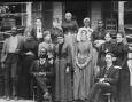
In 1865 the Schofield Normal and Industrial School for freed blacks opens in the Sea Islands of S.C. under educator Martha Schofield (1839-1916); only 10% of Southern blacks are literate.
In Jan. 1866 the Repub. Congress convenes, and goes nonlinear at Pres. Johnson's brand of non-vengeful Reconstruction, believing him to have given away the fruits of victory; they repudiate his program and substitute their own, founded on the enfranchisement of the freed slaves; Johnson, who, although born poor had been a slaveowner opposes black suffrage, driving moderate and conservative Repubs. into the Radical camp. On Feb. 2 a black delegation led by Frederick Douglass meets with Pres. Johnson to discuss black suffrage, but Johnson continues his opposition; on Apr. 9 Congress overrides Johnson's veto and passes the U.S. Civil Rights Act of 1866, conferring citizenship and equal rights on blacks, and imposing criminal penalties on violators; on July 9 S.C. becomes the 28th state to approve the Fourteenth (14th) (XIV) Amendment to the U.S. Constitution, guaranteeing due process and equal protection to all citizens, and granting United States citizenship to blacks; the term "United States" starts being used as a singular instead of a plural noun.
On May 1-3, 1866 the Memphis Riots of 1866 start when white policeman shoot it out with black soldiers recently mustered out of the Untion Army, after which white mobs rampage black neighbhoords, killing 46 blacks and 2 whites and injuring 75 blacks, causing $100K property damage until federal troops restore the peace, after which the black pop. falls 25% by 1870.
On July 30, 1866 the New Orleans Riot of 1866 in La. sees blacks massacred by mobs of whites aided by local police after they parade outside the Mechanics Inst., where a reconvened La. Constitutional Convention is taking place, killing 44 blacks and injuring 106, along with three white Radical Repubs. and one white protester; "Who can doubt that the President is the author of these tragedies?", cries his opponent Charles Sumner.
On Oct. 1, 1866 the Naval Hospital in Washington, D.C. opens, becoming the first U.S. Veterans Hospital; the first patient admitted is "ordinary seaman, colored" Benjamin Drummond.

In 1866 part-black-but-passes Mary Ellen Pleasant (1814-1904), who claims to be the child of a voodoo priestess and John Hampden Pleasants (1797-1846), youngest son of Va. gov. #22 James Pleasants Jr. becomes the "Calif. Mother of Civil Rights" when she fights for equal rights for blacks on San Francisco trams.

On Jan. 8, 1867 after overriding Pres. Johnson's veto, Congress grants black citizens of the District of Columbia the right to vote; on Mar. 2 Congress, to impose its will in the face of Southern feet-dragging over ratification of the Fourteenth Amendment passes the U.S. First Reconstruction Act, calling for the enfranchisement of former slaves in the Confederacy; this year and next the Radical Repubs. use the new phenomenon of concentrated federal power to try to gain more equality for blacks in the South. On Mar. 2 Howard U. in Washington, D.C. is chartered by the U.S. Congress for freed slaves and their descendants, managed by the U.S. Dept. of Interior under the dir. of white Union Gen. Oliver Otis Howard (1830-1909), AKA "the Christian General", who was a math prof. at West Point in 1857-61, lost his right arm in the Peninsular Campaign, fought at First Bull Run, Chancellorsville, and Gettysburg, commanded Sherman's right wing in the March to the Sea, and became the first commissioner of the Freedman's Bureau (1865-74); on Sept. 25 Congress charters it; he becomes its first pres. in 1869 (until 1874). On Dec. 3 Pres. Johnson delivers his 1867 State of the Union Message, attempting to explain why it's a mistake to give blacks the vote, with the soundbytes: "The morality is always false which excuses a wrong because it proposes to accomplish a desirable end. We are not permitted to do evil that good may come. But in this case the end itself is evil, as well as the means. The subjugation of the States to Negro domination would be worse than the military despotism under which they are now suffering", and "It is not proposed merely that they shall govern themselves, but that they shall rule the white race, make and administer State laws, elect Presidents and members of Congress, and shape to a greater or less extent the future destiny of the whole country. Would such a trust and power be safe in such hands?"

On June 16, 1868 the Atlanta Constitution newspaper is founded in Atlanta, Ga. (until ?), killing off the Daily Intelligencer in 1871; in 1876 Eatonton, Ga.-born Joel Chandler Harris (1845-1908) begins running his Uncle Remus stories in it, featuring Br'er Rabbit and the Tar-Baby; in 1982 it combines with the Atlanta Journal (founded Feb. 24, 1883) to become the Atlanta Journal-Constitution. In 1880 Harris pub. Uncle Remus: His Songs and Sayings. In 1883 he pub. Nights with Uncle Remus. In 1892 he pub. Uncle Remus and His Friends. In 1906 he pub. Uncle Remus and Br'er Rabbit. On July 3, 1908 Harris (b. 1845) dies in Atlanta, Ga.; his ocher-colored Queen Anne home Wren's Nest in Atlanta, Ga. is left to the Joel Chandler Harris Assoc., with its bylaws stipulating that it must be run by "100 white ladies", who turn it into a museum in 1913, which bars blacks from entry; in 1967 black Rev. Clyde Williams sues, a federal judge orders it integrated in 1968, and the bylaws are changed in 1973.
On Sept. 28, 1868 the Opelousas Massacre in St. Landry Paris, La. sees whites riot and kill 200-300 blacks to discourage them from joining the Repub. Party and voting.

In 1868 former Union army Capt. (who resigned his commission after an incompetent white was placed over him as Maj. in his black regiment) Oscar James Dunn (1820-71) (born a slave) is elected lt. gov. of La., becoming the first black to hold an important public executive office in these here United States; Union Reconstructionists get the new Grant Parish created in C La. as a Repub. enclave with a majority of freed slaves, and found the town of Colfax (named after the vice-pres.); too bad that the whites still own the plantations and most of the wealth, and the surrounding parishes are lily-white, mainly ex-Confed. soldiers?



On Mar. 4, 1869 46-y.-o. Ohio-born West Point grad. Gen. Ulysses Simpson Grant (1822-85) AKA "Unconditional Surrender Grant", "the American Caesar", "the Hero of Appomattox", "Useless Grant", "Uncle Sam Grant", "the Galena Tanner" (his daddy's occupation in Point Pleasant, Ohio, and almost his) (a good artist known for modesty who smokes 20 cigars a day and hates hunting and the mistreatment of animals, the sight of blood making him ill, and is a speed junkie, horses that is) becomes the 18th U.S. pres. (until Mar. 4, 1877) in the 24th U.S. Pres. Inauguration (youngest pres. until JFK); U.S. House Speaker (since 1863) Schuyler Colfax Jr. (1823-85) of Ind. becomes the 17th U.S. vice-pres.; Grant becomes the last of 12 U.S. presidents to have owned slaves, and the 4th and last of these not to own any while in office; ex-pres. Johnson refuses to attend Grant's inauguration, and later returns to the U.S. Senate (the first/only pres. to do so); Grant likes to have breakfast in the Willard Hotel, causing favor-seekers to hang around; Julia Dent Grant (1826-1902) becomes the first First Lady to issue press releases; too bad, Grant gets into nepotism, appointing his wife's relatives and old army chums.
In 1869 the Radical state govt. of S.C. sets up a land commission to distribute coastal lands to 5K+ black families.

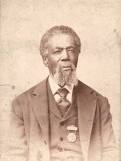

The last of three amendments to the formerly white-men-only U.S. Constitution is complete? On Feb. 3, 1870 the Fifteenth (15th) (XV) Amendment to the U.S. Constitution is ratified by the states, extending suffrage to male African-Ams. (blacks) (Negroes) (jungle bunnies, porch monkeys, Ubangi night-fighters?); the Am. Anti-Slavery Society is finally disbanded; #13=set them free, #14=guarantees due process to keep them from slavery disguised as law enforcement, #15=gives them the vote if they can dodge the ropes on the way to the voting station and can pass literacy tests, pay poll taxes, and pass the grandfather clause (prove that their fathers had the right to vote)? - amendment number what guarantees justice to somebody in court other than the police? On Feb. 23 Repub. Hiram Rhodes Revels (1827-1901) of Miss. becomes the first black U.S. Sen., serving only one year (until Mar. 4, 1871) - after running out of bananas and chandeliers? On Mar. 30 Texas is readmitted to the Union. On Mar. 31 Thomas Peterson Mundy (1824-1904) becomes the first black to vote in the U.S. following ratification of the 15th Amendment, casting a ballot in a municipal election in perky Perth Amboy, N.J. Frankly my dear, I don't give a damn? On July 11 Jaw-Jaw (Ga.) becomes the last Confederate state to be readmitted to the Union; on ? three white "scalawag" Repubs. are murdered by the KKK in Ga.; on ? an armed mob of KKK klansmen assault a Repub. political rally in Ala., killing four blacks and wounding 54. On Dec. 12 Joseph Hayne Rainey (1832-87) of S.C. becomes the first black lawmaker sworn into the U.S. House of Reps., and goes on to be reelected 4x, serving until 1879. On Dec. 16 the Colored Methodist Episcopal Church is founded in Jackson, Tenn.
The three U.S. Enforcement Acts are passed in 1870-1 in response to the Fourteenth Amendment, banning the use of terror, force, or bribery to prevent someone from voting because of their race, protecting the right of blacks to vote, hold office, sit on juries, and receive equal protection of laws, allowing the federal govt. to intervene when states fail to protect these rights.

In 1870 Philly-born Richard Theodore Greener (1844-1922) becomes the first African-Am. to graduate from Harvard U.; he goes on to become dean of Howard U. Law School in 1878-80.
In Feb. 1871 500 masked KKK klansmen assault the Union County Jail in S.C., take out 10 black militiamen accused of the murder of white wagoner George Muttison Stevens last Dec. 31 over some whiskey, then lynch six, shoot two, and "lose" the rest; on Apr. 28 Henry Cannon and Taylor Palmer are executed for it.
On Apr. 20, 1871 the U.S. Second Enforcement (Civil Rights) (Ku Klux Klan) Act of 1871 is passed, outlawing many activities of the KKK, incl. the wearing of disguises; in Oct. Pres. Grant suspends habeus corpus in nine counties in upcountry S.C., and pursues mass prosecutions, bringing a halt to KKK actions; Section 1983 permits citizens to sue public officials for violating their rights, which the courts proceed to gut in favor of absolute prosecutorial immunity; a Congressional committee gathers 12 vols. of testimony on KKK activity; the new U.S. Justice Dept. carries out further prosecution, substantially reducing Klan activity; too bad, it doesn't stop state officials until the Feb. 20, 1961 U.S. Supreme Court case Monroe v. Pape.
In 1871 Alcorn State U. is founded near Lorman, Claiborne County, Miss. (80 mi. SW of Jackson, Miss.) by the Miss. legislature, becoming the first black land grant college in the U.S.; sports teams are nicknamed the Braves; alumni incl. civil rights hero Medgar Evers.

In 1871 Italian Jewish criminologist Cesare Lombroso (1835-1909) pub. Sociological Theories of Deviance, which claims that criminals are born not made, their physiognomy giving them away, esp. large jaws, low sloping foreheads, handle-shaped ears, hawk noses, big lips, hard shifty eyes, scanty beard or baldness; females are naturally passive, hence lack the intelligence and initiative to become criminal; blacks were the first humans, who evolved to yellow then us whites; "Only we white people have reached the ultimate symmetry of bodily form."




Shifting alliances in post Civil-War American politics? In May 1872 New York Tribune (a Repub. newspaper) ed. and reform champion Horace Greeley (1811-72) (who calls Grant's admin. corrupt, and he's on the money) is nominated for pres. by the new Liberal Repub. Party in Cincinnati, Ohio, along with Ky.-born Mo. Sen. (1863-7) and Mo. Gov. (1871-3) Benjamin Gratz Brown (1826-85) for vice-pres.; despite his lifelong hostility to them, Greeley gains the support of the Northern Dems. after reversing his long career of speaking out on behalf of blacks and criticizing their role in Reconstruction, and becomes estranged from the working class he was champion of; the Repubs. renominate Grant for pres., and Radical Mass. Sen. Henry "Natick Cobbler" Wilson (1812-75) for vice-pres.; the Bourbon Dems., a breakaway reactionary-conservative wing named for their old-fashioned views, who support Grover Cleveland and later oppose William Jennings Bryan nominate New York atty. Charles O'Conor (1804-74), who declines to run, even though he gets 21,559 votes in 23 states, becoming the first Roman Catholic to run for U.S. pres.
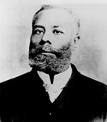
In 1872 African-Canadian inventor Elijah J. McCoy (1843-1929) receives U.S. Patent #129,843 on July 23 for an automatic lubricator for steam engines, which comes to be known as the "Real McCoy".
On Apr. 13, 1873 (Easter Sun.) the Battle of Colfax, La. (Colfax Massacre) (Colfax Riot) in Grant Parish, La. 100 mi. S of Shreveport, between an ersatz white La. militia and blacks trying to benefit from Reconstruction and protect their right, er, hope to vote ends in tragedy for the blacks as 150 are killed vs. only three whites; it is later called the last battle of the U.S. Civil War, ending carpetbagger rule in the South; for the previous three weeks the blacks had taken control of Colfax, getting their own candidate (a white man) elected as sheriff, and taking over the courthouse to protect him, causing whites to raise a militia and attack them with guns and cannons in the bloodiest act of carnage in Reconstruction, followed by the survivors being hanged or shot; meanwhile the U.S. govt. looks the other way, and in on Mar. 27, 1876 the convictions of eight ringleaders under the 1870 U.S. Enforcement Act are overturned by the 5-4 U.S. Supreme (Waite) Court decision in U.S. v. Cruikshank, which rules that the First Amendment right to assembly was not intended to limit the power of state govts. with respect to their own citizens, and that the Second Amendment only restricts the powers of the federal govt., with the soundbyte: "The right to bear arms is not granted by the Constitution; neither is it in any manner dependent upon that instrument for its existence. The Second Amendment means no more than that it shall not be infringed by Congress, and has no other effect than to restrict the powers of the National Government"; a marble obelisk is later erected in the cemetery for "the Heroes... Who Fell in the Colfax Riot Fighting for White Supremacy".

In 1874 half-black half-white former slave Blanche Kelso Bruce (1841-89) is elected as Repub. U.S. Sen. from Miss., taking office on Mar. 4, 1875 (until Mar. 4, 1881), becoming the first African-Am. to serve a full term.
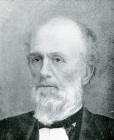
In 1874 Calais, Maine-born journalist (former Radical Repub.) James Shepherd Pike (1811-82) The Prostrate State: South Carolina Under Negro Government, which turns on Reconstruction, claiming to be an eye-witness, painting it as causing corruption, incompetence, bribery and other financial wrongdoing under the control of "a mass of black barbarism", calling for whites to be restored to political power, backing the Liberal Repub. U.S. pres. candidate Horace Greeley over Ulysses Grant, becoming a hit that helps hasten the end of Reconstruction and is used by historians until the 20th cent.; Pike supported the Union during the U.S. Civil War but didn't want black slaves freed but rather "the Gulf States... surrendered to the blacks" to ensure segregation and get them out of whites' hair.
On Mar. 1, 1875 Pres. Grant signs the 1875 U.S. Civil Rights (Enforcement) (Force) Act, promising, er, guaranteeing, er, equal rights to African-Ams. in public accommodations and jury duty; on Oct. 15, 1883 the U.S. Supreme (Waite) Court rules 8-1 to invalidate it, and no more civil rights laws are passed for over 50 years (1957), giving white supremacists a free ride.
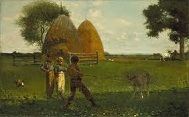
In 1875 Am. artist Winslow Homer (1836-1910) paints Weaning the Calf, which portrays an Am. black as self-reliant and independent.

At the start of 1876 Radical Reconstructionist regimes survive only in La., S.C., and Fla. (plus a Repub. gov. in N.C., who is replaced at the end of the year), and collapse after the nat. elections in Nov.; "The uneducated negro was too weak, no matter what his numbers, to cope with the whites" (Gov. of S.C.). On Feb. 2, 1876 the Nat. League of Prof. Base Ball Clubs (NL) is formed in New York City after the Nat. Assoc. of Prof. Baseball Players is dissolved; on Apr. 22 the Red Stockings play in the first NL baseball game, beating the Philadelphia Athletics 6-5 before a crowd of 3K - now fat whites can enjoy their leisure time watching a lucky few workout for them while they swig Budweiser and reminisce about the Wild West? Adrian Constantine "Cap" Anson (1852-1922) is signed by the Chicago White Stockings (later Chicago Cubs), going on to play a record 27 consecutive seasons (until 1879) and become a legend, winning five NL pennants, introducing spring training, and achieving a record 3K career hits, while stinking himself up with white racism, refusing to take the field with blacks, and causing the segregation of baseball until the 1940s; the name "Cap" comes when he is named capt.-mgr. of the club in 1879.






America is made safe for generations of John Waynes? On Mar. 2, 1877 after the U.S. Electoral Commission votes 8-7 on straight party lines to award the disputed electoral votes and the U.S. Pres. Election to Repub. candidate "Rutherfraud" Hayes, he sails in by 185 to 184 (1st time since 1824 that the winner of the popular vote loses the election); on Feb. 26 after Dem. leaders challenge the Commission, promising a filibuster, loser Samuel J. Tilden agrees to the wormy Compromise of 1877 ("the betrayal of the Negro") in a smoke-filled room in the new (1871) 5-story Wormley's Hotel at 1500 H St., N.W. in Washington, D.C., owned by freeborn black man James Wormley (1819-84), in which the Dems. agree to accept Hayes in return for a Southern cabinet member and removal of federal troops from Southern states, ending Reconstruction and giving white supremacists a stranglehold on Southern (cracker?) politics, after which Southern Black Codes soon effectively disenfranchise black voters for the next 90 years - and keep them away from our white wimmin? On Mar. 5 Ohio-born Harvard Law School grad. (wounded 4x in the Civil War) Rutherford Birchard Hayes (1822-93), AKA "Rutherfraud", "His Fraudulency", "the Usurper", "Old Eight-to-Seven" (the commission straight-party vote), "President De Facto", "the Great Unknown", "the Dark Horse President", "Granny Hayes", "Queen Victoria in Riding Breeches" (doesn't smoke, drink, or gamble), becomes the 19th U.S. pres. (until Mar. 4, 1881) in the 26th U.S. Pres. Inauguration, becoming first U.S. pres. to take his oath of office in the White House (to keep it a secret until the hysteria dies down); first pres. to have a telephone in the White House, and first to travel to the west coast; he promises to serve only one term, becoming known for the soundbyte: "He serves his party best who serves his country best"; his Temperance-pushing wife "Lemonade" Lucy Ware Webb Hayes (1831-89) becomes the first First Lady to graduate from a college (Wesleyan); in her White House "the water flowed like wine"; he tries to let the white upper class run the South again in the belief that they will protect blacks from violence, only to be bitterly disappointed, keeping the South a Crackerland for the next cent., spending his retirement working for civil rights for blacks and educational reform a la Jimmy Carter; U.S. Rep. (R-N.Y.) (1861-3, 1869-77) William Almon Wheeler (1819-87) becomes the 19th U.S. vice-pres.; almost-3-term Grant retires to take a trip around the world and work on his memoirs; on Mar. 10 U.S. Sen. (R-Ohio) (since 1861) John Sherman (1823-1900), younger brother of Gen. William Tecumseh Sherman becomes U.S. treasury secy. #32 (until Mar. 3, 1881).

On June 15, 1877 Thomasville, Ga.-born Henry Ossian Flipper (1856-1940) becomes the first African-Am. graduate of West Point - the future's so bright he has to wear er, shades? On Sept. 15, 1881 2nd. Lt. Henry Ossian Flipper (1856-1940), the first former slave and black man to graduate from West Point (1878) is court-martialed on trumped-up charges of embezzlement, found not guilty, then dismissed from the U.S. Army for conduct unbecoming an officer, picking himself back up and going on to a distinguished career - keep to your place and go to Tuskegee?

On Nov. 13, 1878 Natchez, Miss.-born coloratura soprano Marie Selika Williams (1849-1937) becomes the first African-Am. artist to perform in the White House (Green Room) for Pres. Rutherford B. Hayes and First Lady Lucy Webb Hayes.
On Jan. 19, 1880 (early a.m.) African-Am. man Arthur Jordan is lynched by the KKK in Warrenton, Va. for eloping with white woman Elvira (Lucille) Corder, daughter of his farmer boss Nathan Corder.
On Mar. 1, 1880 the U.S. Supreme (Waite) Court rules 7-2 in Strauder v. W. Va. that people can't be excluded from juries solely because of their race as a violation of the Equal Protection Clause, becoming the first time the court reverses a state criminal conviction for violating a constitutional provision concerning criminal procedure.

On June 2-8, 1880 the 1880 Repub. Nat. Convention sees former U.S. pres. Ulysses S. Grant lead on the 1st ballot over James G. Blaine of Maine, the Half-Breed Candidate, until on the 36th ballot Blaine and former Ohio Sen. John Sherman (brother of Gen. William Tecumseh Sherman) (who failed in his bid for the nomination, then becomes his campaign mgr.) throw their support to dark horse Civil War Maj. Gen. and Ohio rep. (who had just been elected to the U.S. Senate) James A. Garfield, who agrees to appease the Repub. Stalwarts (Old Guard) by backing New York boss Roscoe Conkling follower (former New York City port collector) Chester A. Arthur; speaking of half-breed, half-white half-black former U.S. Miss. Sen. Blanche Kelso Bruce (1841-98) wins eight votes for vice-pres., becoming the first African-Am. to win any votes at a major party's pres. convention; on June 22-24 the 1880 Dem. Nat. Convention nominates incorruptible Gettysburg hero Gen. Winfield Scott Hancock (1824-86) for pres. and former Indiana rep. (1853-61) William Hayden English (1822-96) for vice-pres.; the boring campaign is mainly a referendum on the Repubs.' relaxation of Reconstruction, plus the Repubs. back higher tariffs while the Dems. back lower tariffs.






For 6-1/2 mo. the U.S. finally has a Christian preacher in the White House? On Mar. 4, 1881 (Fri.) Ohio log cabin-born Erie Canal boatman, traveling preacher (first preacher until ?), classics prof. and youngest-ever Union maj.-gen. James Abram Garfield (1831-81), AKA "Canal Boy", "Boatman Jim", "the Preacher President", "the Plow Boy of Ohio" becomes the 20th U.S. pres. (until Sept. 19, 1881) in the 27th U.S. Pres. Inauguration at the U.S. Capitol in Washington, D.C. (last log cabin pres.) (first lefty) (Truman, Ford, Reagan, Bush Sr., Clinton, Obama) (first member of Congress to move directly to the presidency) (Harding, Kennedy, Obama); he entertains guests by writing Greek with one hand and Latin with the other; Fairfield, Vt.-born bewhiskered (full sideburns) Chester Alan Arthur (1829-86), AKA "Elegant Arthur", "Prince Arthur", "the Dude President" (for his fashionable Gilded Age clothes) "Our Chet", "the Gentleman Boss" becomes the 20th U.S. vice-pres. (until Sept. 19); James G. Blaine of Maine is appointed U.S. secy. of state (until Dec.); a birther controvery begins when he lies that he was born in 1830, and moved around a lot as a child, and his enemies decide he might not have been born in the U.S. as required, demanding that he provide proof of his birthplace, which he never Barack, er, does; Pres. Lincoln's atty. son Robert Todd Lincoln (1843-1926) is appointed U.S. secy. of war (until Mar. 4, 1885); Garfield names his dog Veto as a warning to Congress; Blanche Kelso Bruce (1841-98) is appointed register of the U.S. treasury (until June 5), becoming the first African-Am. whose signature appears on U.S. currency, getting reappointed on Dec. 3, 1897-Mar. 17, 1898- it's a filthy, filthy job?

On July 4, 1881 African-Am. former slave Booker Taliaferro (pr. like toliver) Washington (1856-1915) founds Tuskegee U. (originally Tuskegee Normal School for Colored Teachers, and Tuskegee Normal and Industrial Inst.) in Tuskegee, Ala. to teach vocational skills to blacks, beginning with 30 students after former slave Lewis Adams gets white politician W.F. Foster to talk the state of Ala. into it in return for getting the black vote for his election to the state legislature; the state agrees to pay teachers' salaries but not for land or bldgs., so Booker has the students build them as part of their course; he brings in scientist George Washington Carver to teach, along with other top U.S. blacks - and together they become the fathers of a new black country? On Sept. 18, 1895 he gives his Atlanta Compromise Address at the Cotton States Exposition, calling for black acquiesence in disfranchisement and social segregation if whites will encourage black progress in economic and educational opportunity - we'll be good niggers, boss?
On Apr. 11, 1881 Spelman College (originally Atlanta Baptist Female Seminary) is founded in Atlanta, Ga. for African-Am. women, going on to become the #1 historically black college in the U.S.
On Oct. 24, 1882 black man Charles Thurber is lynched in Grand Forks, N.D. for allegedly raping two white women.
Thank you, Waite Court? In 1882-1968 there are at least 4,743 lynchings in the U.S., 3,446 of them blacks; in 1889-1918 at least 3,224 people are lynched in the U.S., 2,552 of them blacks.
In 1883 in Five Civil Rights Cases Testing the Civil Rights Act of 1875, the U.S. Supreme (Waite) Court by an 8-1 vote overturns the act, declaring that freed slaves are just individuals on their own now in a white world and entitled to no sacred cow protections against individual discrimination or private violations of their civil rights, disclaiming federal responsibility for the protection of individual civil rights other than "prohibition against state laws and state proceedings affecting those rights and privileges", declaring a policy that is continued until after WWII; the lone dissenter is Southerner and former slave owner John Marshall Harlan, who was gung-ho for slavery and vehemently against black civil rights until he witnessed the excesses of the KKK in Frankfort, Ky., and considers it a matter of honor to pay for abuse of white power.

On July 14, 1885 former slave Sarah E. Goode (1850-) patents the hideaway bed, which doubles as a desk or shelf, becoming the first African-Am. woman to receive a U.S. patent - is she related to Johnny B. Goode?

On Feb. 18, 1885 Mark Twain (1835-1910) pub. Adventures of Huckleberry Finn, a sequel to "The Adventures of Tom Sawyer" (1875); it is pub. in Britain in 1884, then banned from the public library in puritanical Concord, Mass., making it more popular; "Something that everybody wants to have read and nobody wants to read" (Twain); escaped slave "Miss Watson's Jim", Huck's father Pap, Judge Thatcher, and Widow Douglas, who adopts him; at the end Tom's okay and Huck doesn't want to be adopted; Jim is partly inspired by Twain's black friend John Lewis? In 1894 he pub. Pudd'nhead Wilson, a mystery novel about a black slave giving birth to her white massuh's baby and switching him at birth with the master's baby by his white wife, causing the white baby to be raised as black and the mulatto baby to be raised as white; one of the first crime novels to use fingerprints to solve the crime.
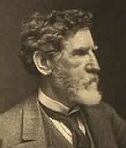
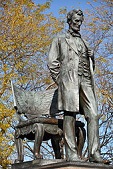
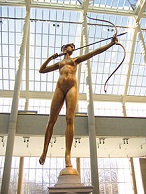
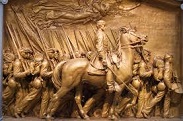

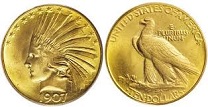
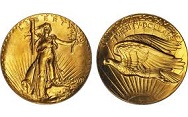
In 1887 Dublin, Ireland-born Am. sculptor Augustus Saint-Gaudens (1848-1907) sculpts a 12-ft. (3.7m) bronze statue of Abraham Lincoln: The Man (Standing Lincoln) for Lincoln Park in Chicago, Ill.; 10K attend the unveiling incl. Lincoln's grandson Abraham Lincoln II, with the New York Evening Post calling it "the most important achievement American sculpture has yet produced"; Stanford White designs a semicircular platform (exedra) for it. In 1892-3 he sculpts Diana (of the Tower), which ends up on top of the Madison Square Garden in 1893-1925, followed in 1932 by the Philadelphia Museum of Art. On May 31, 1897 he unveils the bronze relief Robert Gould Shaw Memorial (begun 1884) at 24 Beacon St. in Boston Common in Mass., depicting Union Col. Robert Gould Shaw (1837-63) leading the 54th Regiment Mass. Volunteer Infantry (first all-black regiment in New England) down Beacon St. on May 28, 1863 before being KIA in Morris Island, S.C. on July 18, 1863. In 1907 the U.S. Mint discontinues the Coronet design (begun 1838 for the eagle and 1949 for the double eagle) and begins issuing $10 Indian Head Eagle coins and $20 Standing Liberty Double Eagle coins (until 1933), all designed by Dublin, Ireland-born Am. sculptor Augustus Saint-Gaudens (1848-1907), who works from a studio in Cornish, N.H.; Pres. Roosevelt forbids the motto "In God We Trust", considering it in bad taste; Pres. Taft restores it in 1908.

In 1888 the Jaybird-Woodpecker War (ends 1889) rocks Ft. Bend, County, Tex. when Dem. blacks led by Bob Chapel are taken on by white Dems. opposed to Reconstruction; Chapel likes to sing about both jaybirds and woodpeckers, but the whites pick jaybirds, while the blacks settle for woodpeckers and get backing from the Repub. Reconstruction govt. On Aug. 16, 1889 the Battle of Richmond in Richmond, Tex. between the two sides in the Jaybird-Woodpecker War (begun 1888) causes Tex. gov. (1887-91) Lawrence Sullivan "Sul" Ross (1838-98) (former Texas Ranger and Confed. col.) to declare martial law and negotiate a settlement giving the white Jaybird faction control of the govt. for decades to come - you build a better mousetrap you get a smarter mouse?

In 1889 Aunt Jemima self-rising pancake flour makes its commercial debut, making Nancy Green (1834-1923) into the advertising world's first living trademark - you want to do what to it, Howard?

On June 29, 1890 U.S. Sen. (R-Mass.) (1893-1924) Henry Cabot Lodge Sr. (1850-1924) sponsors the U.S. Federal Elections (Force) Bill, providing for federal protection of blacks trying to vote in federal elections; too bad, the Repubs. cop out and withdraw support in order to put money first and get the Sherman Silver Purchase Act and McKinley Tariff Act passed - is that the good side or the dark side of the Force?
In 1891 Lexington, Miss.-born teacher Minnie M. (Geddings) Cox (1869-1933) is appointed postmaster of Indianola, Miss. by Pres. Harrison, becoming the first African-Am. U.S. postmaster; in 1897 she loses her job under Pres. Cleveland, then regains it in 1897 under Pres. McKinley, continuing to serve under Pres. Theodore Roosevelt; too bad, local white citizens begin agitating to oust her, led by white supremacist politician James K. Vardaman, and vote for her to resign on Jan. 1, 1903, causing Pres. Roosevelt to close the Indianola post office until she resumes her duty, sparking a nat. uproar; when her term expires in 1904, she opens a bank and insurance co. in Indianola.

In 1891 Isaac Burns Murphy (1861-96) (black) becomes the first jockey to win the Kentucky Derby 3x (1884, 1890).

In 1891 Philly-born writer Ignatius Loyola Donnelly (1831-1901) pub. Doctor Huguet: A Novel under the alias Edmund Boisgilbert, about a liberal white intellectual who is transformed into a poor black man and forced to see what it's like.




On June 7-10, 1892 after rejecting James G. Blaine, the 1892 Repub. Nat. Convention in Minneapolis, Minn. grudgingly renominates unpopular Pres. Benjamin Harrison (whose wife Caroline dies in the White House this year after becoming the first First Lady to give a public speech), and nominates Ohio-born New York newspaper publisher and U.S. ambassador (to France and Britain) Whitelaw Reid (1837-1912) for vice-pres. after Levi Parsons Morton pisses-off Harrison for failing to support a bill to enforce voting rights for blacks in the South against a Dem. filibuster, after which he becomes gov. of N.Y. (1895-6); on June 21-23 the 1892 Dem. Nat. Convention in Chicago, Ill. renominates former pres. Grover Cleveland on the first ballot for a record 3rd time (1st time that a former U.S. pres. is renominated by a major party), with former Ill. Rep. Adlai Ewing Stevenson (1835-1914) for vice-pres.; on July 4 the Am. West-based free-silver People's (Populist) Party (founded 1891; dissolved 1908) holds its first nat. convention in Omaha, Neb., and nominates Gen. James Baird Weaver (1833-1912) of Iowa for pres. and James Gaven Field (1826-1902) of Va. for vice-pres., and on July 4 ratifies the Omaha Platform, "a second declaration of independence", attempting to return to placing people above corporate and financial interests, advocating a graduated income tax, secret ballot, direct election of U.S. senators, and an 8-hour workday - return?

In 1892 Frances Ellen Watkins Harper (1825-1911) pub. Iola Leroy, or Shadows Uplifted, becoming the 2nd novel by a black woman pub. in the U.S.
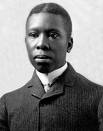
In 1893 Dayton, Ohio-born Paul Laurence Dunbar (1872-1926), who wrote his first poem at age 6 and gave his first recital at age 12 pub. his debut vol. of poetry Oak and Ivy (Lyrics of a Lowly Life), which he self-pub. while working as an elevator boy at the Callahan Bldg. in Dayton, Ohio; Teddy Roosevelt later presents him with a ceremonial sword. In 1898 he pub. his first novel The Uncalled. In 1900 he pub. The Strength of Gideon. In 1902 he pub. The Sport of the Gods. His birthplace Dunbar House at 219 N. Paul Laurence Dunbar St. in Dayton, Ohio becomes a shrine (don't miss the ceremonial sword presented to him by Teddy Roosevelt?).

On Feb. 9, 1893 Harry Lawrence Freeman (1869-1954) debuts his opera Epthalia at the Deutsches Theater in Denver, Colo., becoming the first opera written by an African-Am. to be successfully produced.

On July 10, 1893 African-Am. surgeon Daniel Hale Williams (1856-1931), 1891 founder of Provident Hospital in Chicago, Ill., the first interracial hospital and training school for black nurses and interns performs the second successful pericardial sac repair operation.

On Feb. 20, 1895 Am. abolitionist leader Frederick Douglass (Frederick Augustus Washington Bailey) (b. 1817) dies in Washington, D.C. in his 20-room Cedar Hill Mansion at 1411 W. St. S.E. in the black Anacostia neighborhood of Washington, D.C., where he lived since 1877, which becomes the Frederick Douglass Nat. Historic Site in 1988; perched on a hilltop, it features a sweeping view of the Washington, D.C. skyline incl. the U.S. Capitol; "It is easier to build strong children than to repair broken men."

On Dec. 17, 1895 the Anti-Saloon League of Am. (founded as a state-level org. in Oberlin, Ohio in 1893) is formed in Washington, D.C. by atty.-turned-minister Howard Hyde Russell (1855-1946), author of "A Lawyer's Examination of the Bible" (1893), quickly growing to the most powerful Prohibition lobby in the U.S., passing the Woman's Christian Temperance Union (WCTU) and the Prohibition Party and going on to get the 18th Amendment to the U.S. Constitution passed in 1920; too bad, it gets in bed with the Ku Klux Klan (KKK), stinking it up.

In 1895 Mass.-born W.E.B. (William Edward Burghardt) Du Bois (1868-1963) becomes the first African-Am. to receive a Ph.D., from Harvard U. (history).

On May 18, 1896 after passing-for-white passenger Homer Plessy (1863-1925) (African-Am. great-grandmother) of New Orleans, La. is set up by the New Orleans Committee of Citizens and refuses to leave a railroad car reserved for (pure) whites only and is jailed under a La. law, allowing the committee to fight it in court, the U.S. Supreme (Fuller) Court rules 7-1 in Plessy v. Ferguson that no person is denied any of his rights under the 14th Amendment (due process) if the states provide "separate but equal" (white and black) public facilities (overturned in 1956); justice David Josiah Brewer doesn't participate in the decision; John Marshall Harlan dissents, claiming that segregating the races on public transports denies blacks equal protection of the laws; the decision shuts blacks out for the next 75 years, and stiffens black determination, with the committee uttering the soundbyte: "We, as freemen still believe that we were right and our cause is sacred" - what about that skunky African armpit odor, and what if a black buck is left alone with an unattended prime white female - case closed until the Jews come to the rescue?

In 1896 after Southern farmers complain about depleted infertile soil from generations of cotton monoculture, freed slave ("magician in the lab") George Washington Carver (1864-1943) becomes dir. of agricultural research at Tuskegee Inst. in Ala., pioneering Chemurgy, the science of using agricultural products for commercial uses, going on to develop 100+ products from the sweet potato and 300+ products from the peanut, freeing the Am. South from the bondage of the cotton crop while confounding theories of black racial inferiority.




In July 1896 after black women's clubs are refused permission to exhibit at the 1893 Chicago World's fair, the Nat. Assoc. of Colored Women (NACW) (changed in 1904 to Nat. Assoc. of Colored Women's Clubs) in Washington, D.C. is founded by Harriet Tubman (1820-1913), Frances Ellen Watkins Harper (1825-1911), Josephine St. Pierre Ruffin (1842-1924), Mary Church Terrell (1863-1954) (pres. #1) et al. from 100+ black women's clubs, going on to campaign for women's suffrage and against Jim Crow laws and lynching, reaching 300K members by 1918.
On Feb. 17, 1897 the U.S. Nat. Congress of Mothers is founded in Washington, D.C.; in 1908 it is renamed the Nat. Congress of Mothers and Parent-Teachers Assocs., followed in 1925 by the Nat. Congress of Parents and Teachers or Parent Teachers Assoc. (PTA); on May 7, 1926 PTA Pres. Mrs. A.H. Reeve founds the Nat. Congress of Colored Parents and Teachers, which merges with the Nat. PTA in 1970; in 1899 the Nat. PTA publicly complains about "the incompetency of parents", causing the scientific parenting racket to be born as experts rush to the fore?
On Apr. 25, 1898 the U.S. Supreme (Fuller) Court unanimously decides in Williams v. Mississippi that Southern blacks can be tried by all-white juries even when all blacks are kept from serving on juries by state literacy tests, poll taxes, and other subterfuges; an ostensibly fair law like literacy tests and poll taxes to prove people literate and solvent, they can only be voided if its application has been proven to be discriminatory; it is superseded by the 1965 U.S. Voting Rights Act - legal viagra for white Jim Crow supremacists?
On May 11, 1898 the torpedo boat USS Winslow attacks Cardenas Harbor, and is disabled by Spanish gunboats, resulting in the death of black cabin cook Elijah B. Tunnell, who becomes the first U.S. casualty of the Spanish-Am. War, and ensign Worth Bagley (b. 1874), who becomes the first and only U.S. naval officer to die in the war, plus three others.
On Nov. 10, 1898 the Wilmington Massacre (Insurrection) (Race Riot) of 1898 in Wilmington, N.C. sees an attempted coup d'etat as a group of 2K armed whites of the Southern Dem. Party led by Col. Alfred Moore Waddell, pissed-off at the Fusionist biracial Repub. govt. march on city hall and overthrow the elected local govt., running the officials (esp. the blacks) out of town, destroying the city's only black newspaper The Daily Record and killing 60-300+, causing the Cape Fear River to runs red with blood; next year Dems. in N.C. begin passing a bunch of Jim Crow laws incl. a poll tax and literary test; the first attempted coup in the U.S. (until ?).
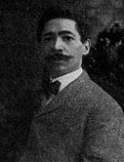

In 1898 Washington, D.C.-born composer Will Marion (Mercer) Cook (1869-1944) (student of Antonin Dvorak) and Dayton, Ohio-born playwright Paul Laurence Dunbar (1872-1906) debut their musical sketch comedy Clorindy; or, The Origin of the Cakewalk at Casino Theatre's Roof Garden in New York City, becoming the first all-black show on Broadway; it features the song Darktown is Out Tonight; in 1912 Cook pub. A Collection of Negro Songs; in 1918 his New York Syncopated Orchestra tours the U.S., traveling to England in 1919 and giving a command performance for George V; members incl. jazz clarinetist Sidney Bechet.
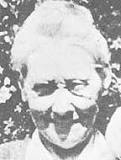

In Oct. 1899 Edinburgh, Scotland-born Helen Bannerman (Helen Brodie Cowan Watson) (1862-1946) pub. her first book The Story of Little Black Sambo, about Tamil children in SE India, where she lives with her husband; Sambo, son of Black Jumbo and Black Mumbo outwits hungry tigers by giving them his new red coat, blue trousers, purple shoes, and umbrella and letting them chase each other around a tree until they turn into ghee, then recovers his things and runs home, eating 169 pancakes for supper made by Black Mumbo from the ghee; the book is widely pirated; too bad, the word "sambo" becomes a racial slur, and in 1932 Langston Hughes calls it a typical "pickaninny" storybook that harms black children, causing the book to be increasingly banned; she follows with "The Story of Little Black Mingo" (1901), "The Story of Little Black Quibba" (1902), "Little Black Quasha" (1908), "The Story of Little Black Bobtail" (1909), and "Sambo and the Twins" (1936); in 1965 her daughter Day (1896-) pub. "Little White Squibba", a rewrite with a white girl as heroine.

In 1899 Cleveland, Ohio-born Charles Waddell Chesnutt (1858-1932) (son of freed slaves who passes for white, although the one Drop Theory forever labels him as black) pub. The Conjure Woman, and Other Conjure Tales. In 1900 he pub. The House Behind the Cedars. In 1901 he pub. The Marrow of Tradition, about the Wilmington Race Riot; pisses-off his mainly white readers with its preaching about racism, not knowing that he doesn't consider himself white? In 1905 he pub. The Colonel's Dream.


On Sept. 2, 1901 vice-pres. Teddy Roosevelt gives his Big Stick Speech at the Minn. State Fair containing the immortal soundbyte "I have always been fond of the West African proverb, 'Speak softly and carry a big stick'."


On Sept. 14, 1901 New York City-born former North Dakota cowboy ("the Rough Rider") ("Hero of San Juan Hill") ("the Cyclone Assemblyman") ("the Lion") ("Old Four Eyes") ("Theodore the Meddler") ("the Big Stick") Theodore "Teddy" Roosevelt (1858-1919) (a Progressive Repub. into conservation of the wilderness) (a J.P. Morgan man, compared to McKinley, who was a John D. Rockefeller man) (the Morgans are allied with Britain and France, while the Rockefellers back Germany, helping lead to WWI?) becomes the 26th U.S. pres. (until Mar. 4, 1909) in the 34th U.S. Pres. Inauguration at the Ansley Wilcox House in Buffalo, N.Y. following the death of Pres. William McKinley earlier that day, going on to become the first modern pres., using the media to build an image and advance his agenda, the first imperial president, the youngest U.S. pres. at 42 years, 10 mo., 18 days, and the first in the 20th cent. to become pres. after being vice-pres. less than a year (Truman, Ford); first U.S. pres. to fly in an airplane, own an automobile, and dive in a submarine; he is sworn-in sans Bible, and attends in borrowed formal wear; his pet horse is named Bleistein; First Lady is Teddy's 2nd wife Edith Kermit Carow Roosevelt (1861-1948), who becomes the first to employ a full-time secy., leading to the creation of an official staff, while her formal dinners and ceremonial processesions elevate the position of First Lady; Abraham Lincoln's son Robert Todd Lincoln witnesses McKinley's shooting, and was also present for the deaths of Garfield and his daddy, making him the "presidential angel of death" (Sarah Vowell); on Oct. 29 Czolgosz is electrocuted despite evidence of mental illness; on Oct. 28 Booker Taliaferro Washington (1856-1915) visits Pres. Roosevelt, becoming the first African-Am. to dine with a U.S. pres. at the White House, pissing-off the white establishment and sparking race riots that kill 34; on Oct. 12 Teddy officially names the Executive Mansion the White House.

In 1901 African-Am. Harvard Phi Beta Kappa grad William Monroe Trotter (1872-1934) and Amherst U. grad George Forbes found the Boston Guardian in the same bldg. that once housed William Lloyd Garrison's "Liberator", going on to support the anti-Booker T. Washington Niagara Movement; Trotter later forms the Nat. Equal Rights League, which leads to the 1909 formation of the NAACP.
On Aug. 12, 1902 (Sun.) the West Side Riot between whites and blacks in the bordello-filled Tenderloin District in West Side, Manhattan, N.Y. starts when black man Arthur Harris kills white policeman Robert J. Thorpe with a razor for trying to arrest his black babe May Eao, after which Thorpe's friends begin taking revenge on random blacks, being joined by the Hell's Kitchen Gang of white hoodlums, who shout "Kill the niggers", after which police chief Devery orders his white pigs to "take no prisoners" and club the black rioters into submission, injuring 60 and stopping it fast, with only 35 arrests.

In 1902 New Orleans, La.-born Jelly Roll Morton (Ferdinand Joseph LaMothe) (1890-1941) claims to invent Jazz, but not the term.


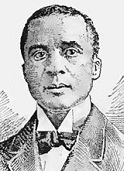
On Feb. 18, 1903 Will Marion Cook (1869-1944), Paul Laurence Dunbar (1872-1906), and Jesse Allison Shipp Sr. (1864-1934) debut In Dahomey: A Musical Comedy in New York Theater in New York City for 53 perf., becoming the first full-length musical written and played by blacks to be performed at a major Broadway house; two Boston con men devise a plan to colonize you know what; ends with a spectacular cakewalk.

On Nov. 2, 1903 Maggie Lena Walker (1867-1934) opens the St. Luke Penny Savings Bank in Richmond, Va., becoming the first black woman bank pres., which later becomes the Consolidated Bank and Trust Co., the oldest black-owned bank in the U.S.

In 1903 W.E.B. Du Bois (1868-1963) pub. The Souls of Black Folk, which criticizes Booker T. Washington (1856-1915) for pushing industrial over higher ed. and for not openly striving to achieve civil rights; "For the problem of the Twentieth Century is the problem of the color-line."

In 1903 Bert Williams (1875-1922) and George Walker debut their musical In Dahomey in New York City, becoming the first musical written and performed by blacks in a white New York City theater.
On July 12, 1904 the Amalgamated Meat Cutters Strike by 18K union members of the Armour Co. in Chicago, Ill. begins; on Aug. 19 after Jonathan Ogden Armour tries to break the strike by hiring African-Am. scabs, pissing them off, 4K union members and their families riot; too bad, on Sept. 6 the strike collapses, after which Jane Addams personally gives head, er, meets with the head of Armour Co. to help them secure a contract.

In 1904 Mary McLeod Bethune (1875-1955) founds Bethune-Cookman U. (originally Daytona Educational and Industrial Training School until 1941) in Daytona Beach, Fla., becoming the first black college founded by a black woman, with standards comparable to white schools; in 1923 it merges with the Cookman Inst. of Jacksonville, Fla.; in 1924 it affiliates with the Methodist Church.
On Aug. 13, 1906 (night) the Brownsville Affair sees up to 20 unidentified men shoot up Brownsville, Tex., killing a bartender and severely injuring a policeman, causing Pres. Theodore Roosevelt to come down on nearby Ft. Brown where black Buffalo soldiers of the 25th Infantry are posted, discharging 167 "without honor" sans trial on Nov. 6 (after the nat. elections), pissing-off the NAACP and other African-Am. orgs., who turn on the Repub. Party; in 1972 Repub. Pres. Richard Nixon pardons the men and awards them honorable discharges sans back pay; in 1973 Congress grants a tax-free $25K pension to the last survivor Dorsie Willis.
On Sept. 22-24, 1906 after newspaper stories about the rapes of four white women by black men in separate incidents, the Atlanta Race Riot of 1906 in Ga. sees 25+ blacks and 2+ whites killed.
On Dec. 4, 1906 Alpha Phi Alpha is founded at Cornell U., becoming the first intercollegiate fraternity for African-Ams.


In 1906 39-y.-o. black St. Louis laundry worker and former La. cotton-picker Sara Breedlove Walker of Denver, Colo. changes her name to Madame (Madam) C.J. Walker (1867-1919) and barnstorms the U.S. selling and teaching her Walker System of Beauty and Hair Care for Black Women, moving to Indianapolis, Ind. in 1910 and eventually becoming the first black female millionaire in the U.S., and owner of the nation's biggest black business, later turned into the Madame Walker Urban Life Center at 617 Indiana Ave., Indianapolis; after her death her daughter A'Lelia Walker (1885-1931) continues the biz, running a salon in New York City that becomes a gathering place for the Harlem Renaissance.
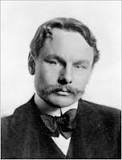
In 1906 Forest Hills is built, becoming the first large development in Queens, N.Y.; after it becomes a favorite with Jews, in 1908 800-home Forest Hills Gardens is built by architect Grosvenor Atterbury (1869-1956), with each house sold with restrictive covenants excluding Jews, blacks, and working class people (until the 1970s); modeled after a traditional Jew-free English village with mainly Tudor and Georgian style homes in a parklike setting, the houses are all built from 170 standardized prefab concrete panels with hollow insulation chambers.

In 1907 Hollansburg, Ohio-born U. of Wisc. economist John Rogers Commons (1862-1945) pub. Races and Immigrants in America, which lays out arguments for white superiority, ramping up the eugenics movement; "In the entire circuit of the globe those races which have developed under a tropical sun are found to be indolent and fickle. From the standpoint of survival of the fittest, such vices are virtues, for severe and continuous exertion under tropical conditions bring prostration and predisposition to disease. Therefore, if such races are to adopt that industrious life which is a second nature to races of the temperate zones, it is only through some form of compulsion. The negro could not possibly have found a place in American industry had he come as a free man..."; "Other races of immigrants, by contact with our institutions, have been civilized — the negro has only been domesticated"; "The Chinese and Japanese are perhaps the most industrious of all races, while the Chinese are the most docile. The Japanese excel in imitativeness, but are not as reliable as the Chinese. Neither race, so far as their immigrant representatives are concerned, possesses the originality and ingenuity which characterize the competent American and British mechanic."
On Jan. 15, 1908 Alpha Kappa Alpha is founded at Howard U., becoming the first black Greek sorority.
On Aug. 14-15, 1908 the Springfield Race Riot of 1908 in Ill. starts after two African-Ams. are arrested for violent crimes against whites, and a white lynch mob discovers that the sheriff transferred them out of the city, after which the Ill. gov. sends in thousands of militia, resulting in seven killed (5 white, 2 black), and $200K in property damage incl. 40 homes and 24 businesses along with 107 indictments against rioters; the biracial deaths cause a biracial group to meet next year to form the NAACP.

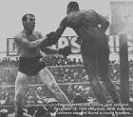

On Dec. 26, 1908 30-y.-o. 196-lb. Tex.-born black boxer Arthur John "Jack" Johnson (1878-1946) KOS 27-y.-o. 176-lb. white boxer Tommy Burns in round 14 in Sydney, Australia to become world heavyweight boxing champ #6 and first black champ (until 1915); the referee is Hugh McIntosh; the white-is-wrong news causes a frantic search for a Great White Hope as Johnson, sporting a trademark screw-you white smile easily beats several white contenders, and flaunts it by hiring a white chauffeur and white butler, marrying two white women and cheating on them with dozens of white hos.

Should be called the No White Women for Black Man Act? On June 25, 1910 the U.S. Congress passes the U.S. Mann (White-Slave Traffic) Act, named after U.S. Rep. James Robert Mann (1846-1922), prohibiting the interstate transportation of women for immoral purposes (white slavery); meant to prosecute pimps, it is so vaguely written that just about anybody crossing a state line accompanying a female can be slammed into a federal prison to protect the country from them, and it is soon being used to prosecute women rather than men, unless they're a black man hooking up with white women; prostitution has never been banned in the U.S., and is done for the first time in Mass. in 1917, after which when women get the vote they get federal laws passed; the law causes red-light districts in Tex. to be closed, starting with Dallas, Austin, and Amarillo in 1914, followed by El Paso and Houston in 1917, causing gambling venues to go underground; San Antonio, Tex. and Galveston, Tex. keep their vice districts open through WWI.
The first Bout of the Century? On July 4, 1910 in Reno, Nev. 20K mostly white spectators listen to a brass band playing "All Coons Look Alike to Me," then watch black boxing champ Arthur John "Jack" Johnson (1878-1946) easily defeat 6'2-1/2" prime specimen and Great White Hope (former champ in 1899-1905) James Jackson "Jim" Jeffries (1875-1953), "the Boilermaker" (who had been talked into coming out of retirement) in round 15; race riots and atrocities against blacks ensue in the South, and the U.S. govt. sets out to "get the nigger" for having sex with our white wimmin, making use of the new U.S. Mann Act; one bright side is a number of blacks winning bets on Johnson made with whites - get him or his johnson, I don't care? On May 13, 1913 black world heavyweight boxing champ Arthur John "Jack" Johnson (1878-1946) is railroaded through an all-white federal jury in Chicago, Ill. on trumped-up U.S. Mann (White Slave Traffic) Act charges; he supposedly paid white ho and longtime lover Belle Schreiber to come meet him while he travelled from Atlantic City to Philadelphia, thus transporting a woman across state lines for an immoral purpose; he is sentenced to one year in priz, causing him to flee to Canada then Europe, returning in 1920 to serve his sentence in Leavenworth, Kan.

In 1908 after the 1906 Atlanta Race Riot gets him involved, Lansing, Mich.-born muckraking journalist Ray Stannard Baker (1870-1946) (co-founder of The American Mag.) pub. Following the Color Line: An Account of Negro Citizenship in the American Democracy, becoming the first prominent journalist to examine the U.S. racial divide.





On Feb. 12, 1909 (100th anniv. of Abraham Lincoln's birthday) after news of the 1908 Springfield Race Riot is spread by the Socialist press, Jewish physician Henry Moskowitz (1875-1936) and white Unitarian activist Mary White Ovington (1865-1951) meet, and call for a nat. conference, which meets on May 31-June 1 at the Henry St. Settlement House in New York City, headed by W.E.B. (William Edward Burghardt) Du Bois (1868-1963) and Ida B. Wells-Barnett (1862-1931), forming the 40-person Nat. Negro Committee, renamed next May 30 to the Nat. Assoc. for the Advancement of Colored People (NAACP) (niggers aren't always colored people?) and incorporated in 1911; New York Evening Post owner Oswald Garrison Villard (1872-1949) donates space for announcing the 1910 meeting; Lincoln's white supremacist views are conveniently ignored? - the rest of the cent. in the U.S. is about Jews and some whites working to advance mainly powerless blacks in society, using the media to build blacks into superstars while pushing any and everything that weakens the total lock whites enjoy up till this year, culminating in the media-staged 2008-9 election and coronation, er, inauguration of half-and-half Barack Obama?
On Dec. 4, 1909 the 2-cent weekly African-Am. newspaper New York Amsterdam News is founded in Harlem, N.Y. by James H. Anderson, growing with the black influx and pub. columns by black writers incl. W.E.B. Du Bois, Roy Wilkins, and Adam Clayton Powell Jr., becoming the first to pub. the writings of Malcolm X.
Beginning in about 1910 the Great Migration of Southern Blacks (ends 1970) begins as they move en masse to Northern cities incl. New York City, Detroit, and Chicago looking for economic opportunity, 500K by 1920 and 1.5M-2M by 1930; 200+ towns and counties in Indiana become all-white Sundown Towns (until 1940); the black pop. of Goshen, Ind. drops from 21 this year to 2 in 1910; on Mar. 17, 2015 the city council passes a resolution apologizing for its past.
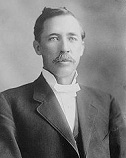
On Jan. 9, 1911 Marion, Ky.-born banker-atty. Lee Cruce (1863-1933) becomes Okla. gov. #2 (until Jan. 11, 1915), going on to establish the Okla. Dept. of Highways and the Okla. State Capitol while enforcing prohibition of alcohol and gambling, using the state militia to stop horceracing, fighting to abolish capital punishment and commuting 22 death sentences and allowing only one execution, and vetoing a bill to reapportion the state into eight congressional districts to maximize Dem. voting strength, which backfires, causing him to escape impeachment by the Okla. House of Reps by one vote; too bad, he doesn't interfere with lynchings of non-whites, writing to the NAACP to protest the appointment of a black to supervise Indian schools in Okla., with the soundbyte: "If your organization would interest itself to the extent of seeing that such outrages as this are not perpetrated against our people, there would be fewer lynchings in the South than at this time."
On May 16, 1912 after a "race rider clause" is defeated that would have hamstrung Congress in attempting to override state laws preventing blacks from voting in senatorial elections, the XVII (17th) Amendment (Direct Election of Senators) to the U.S. Constitution is sent by the 62nd Congress to the states for ratification; on Apr. 8, 1913 Conn. becomes the 36th state to ratify it, and it is certified by U.S. secy. of state William Jennings Bryan on May 31.

On Oct. 11, 1912 Alice Guy's A Fool and His Money (Solax) debuts, starring James Russell as Sam Jones, becoming the first film with an all-African-Am. cast.


In 1913 the Apollo Theater at 253 W. 125th St. in Harlem, N.Y. opens for African-Am. performers. In 1913 the Neo-Gothic Episcopal Church of the Intercession in New York City at 155th St. and Broadway on Sugar Hill between Harlem and Washington Heights, designed by Bertram Grosvenor Goodhue (1869-1924) is built, becoming the unofficial HQ for visiting African prelates incl. Archbishop Desmond Tutu of South Africa.


On June 29, 1914 the NAACP establishes the Spingarn Medal for outstanding achievement by a black American in honor of, er, white Jewish NAACP leader Joel Elias Spingarn (1875-1939), with the first medal going to marine biologist Ernest Everett Just (1883-1941).
On Aug. 4, 1914 - Nov. 11, 1918 the horrific World War I causes 15M deaths and 39M military casualties, and destroys the Old Order of white formerly Christian Europe.
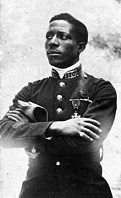
On Oct. 19, 1914 Columbus, Ga.-born Eugene Jacques (James) Bullard (8195-1961) enlists with the 1st Foreign Regiment of the French Foreign Legion, starting out as a machine-gunner on the Somme River front in Picardy, then Artois and Champagne, getting seriously wounded at the Battle of Verdun in Mar. 1916, after which on Oct. 2, 1916 he volunteers for the French Air Service as a gunner, becoming the first African-Am. military pilot and getting promoted to cpl. on June 28, 1917, assigned to Escadrille N.93, whose insignia is a flying duck, flying with his poet monkey Jimmy; too bad, when the U.S. enters the war, the U.S. Army Air Service refuses to accept him, and after he strikes a French officer in a fight he is transferred to the 170th Battalion in Jan. 1918 for the rest of the war, after which he owns the L'Escadrille Nightclub in Paris in the early 1920s, becoming known as "Le Grand Duc" and making friends with Louis Armstrong, Josephine Baker, Langston Hughes et al.; after the May 1940 German invasion of France, he joins the 51st Infantry, and is wounded in Orleans, returning to the U.S. in July via Spain, after which he ends up working as an elevator operator at Rockefeller Center in New York City, dying in poverty.
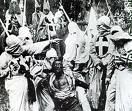

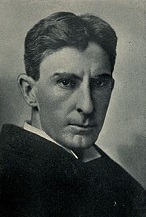











On Feb. 8, 1915 D.W. Griffith's The Birth of a Nation (The Klansman), based on the 1905 novel "The Clansman" by Shelby, N.C.-born white supremacist Thomas Frederick Dixon Jr. (1864-1946) debuts in Los Angeles, Calif., becoming the first movie sequel (to "The Avenging Conscience", 1914) and the highest-grossing film of the silent film era, grossing $10M on a $110K budget; first film produced with its own score, by composer Joseph Carl Breil; by technically brilliant but incurably white supremacist Ky.-born dir. D.W. Griffith (1875-1948) and cinematographer G.W. Bitzer (1872-1944); stars Griffith's Ala.-born favorite Henry Brazeale Walthall (1878-1936) as Confed. veteran Col. Ben Cameron (known as "the little colonel" because of his shrimpy height), who rounds-up the KKK, making him a major star; also stars Lillian Gish (who steals the role from Blanche Sweet) as Elsie Stoneman, causing Sweet to leave for Paramount; also stars London-born former opera singer-dir. George William "Donald" Crisp (1882-1974) (Griffith's asst. since 1912) as Gen. Ulysses S. Grant, who goes on to serve in WWI and WWII and become a Hollywood dir. and power broker as chmn. of the Bank of Am. in the 1930s and 1940s, approving loans while getting rich from real estate, allowing him to become a top char. actor without worrying about money, appearing in 400 films; the film incenses Am. banana-eating, er, blacks, but amoral Russian-born capitalistic Jew Louis Burt Mayer (1884-1957) turns $50K into $500K by investing in it; William Beaudine (1892-1970) is asst. dir.; future dir. Raoul Walsh (1887-1980) plays John Wilkes Booth; Griffith's fellow Kentuckian Nellie Conley (Madame Sul-Te-Wan) (1873-1959) plays several minor roles in the film, becoming Hollywood's first important black performer; too bad, Griffith fires her for "inciting blacks to protest the film's showing in the Los Angeles area", but she successfully sues to be rehired; slender handsome Winfield, Kan.-born Eugene William Pallette (1889-1954) plays a Union soldier, going on to act in several silent films then balloon up to 300 lbs., signing with Hal Roach Studios in 1927 and becoming even more popular; Pres. Wilson, known for resegregating the military and firing all black postal workers calls the film "Like writing history with lightning, and it's all true", stoking a revival of the Ku Klux Klan that Dixon disassociates himself from because he is pro-Jewish and pro-Roman Catholic; Dixon uses his profits to buy an orange grove in Hollywood that he uses to found its first movie studio.
On June 21, 1915 the U.S. Supreme Court rules 8-0-1 in Guinn v. U.S. that white grandfather clauses to lit. tests in the state constitutions of Okla., Md., Ala., Ga., La., N.C., and Va. violate the 15th Amendment and are therefore unconstitutional, which doesn't stop state legislatures from passing new laws attempting to restrict blacks from voting.
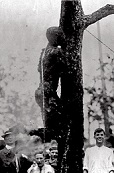
On May 15, 1916 after being convicted of raping married white Lucy Fryer, black teenie farmhand Jessee Washington is dragged out of the county court in Waco, Tex. by a white mob and lynched in front of the courthouse in front of a cheering crowd of 10K, then castrated, his fingers cut off, and roasted alive over a fire for 2 hours, after which his torso is dragged through town and parts of his body sold as souvenirs, becoming known as the Waco Horror, gaining mucho negative publicity that helps turn the public against the practice; on May 15, 2016 Waco's mayor publicly apologizes to his descendants and the entire African-Am. community, and a historical marker is installed.




On May 18, 1917 the U.S. Selective Service Act, written by West Point grad. Hugh Samuel Johnson (1882-1942) (who becomes a brig. gen. in 1918) is signed, providing for the conscription of men between the ages of 21-30; Gen. Enoch Herbert Crowder (1859-1932), provost marshal of the U.S. Army herds and crowds them in; on June 5 10M men begin registering; on June 2 Harry "Hawk" Gowdy becomes the first ML baseball player to enlist in the U.S. Armed Forces in WWI, becoming a sgt.; one-third of the eligible pop. are foreign-born or the son of a foreign-born parent, and one-eighth are African-Am.; Jews end up comprising 6% of the U.S. armed forces even though they are only 2% of the pop.; meanwhile U.S. gen. Tasker Howard Bliss (1853-1930) becomes U.S. Army chief of staff, readying the troops with how hard it is to blissfully task, er, fight WWI; on July 1 the Nat. Civil Liberties Bureau is created by Harvard-educated pacifist (spent 1 year in jail as a conscientious objector) (later pro-Soviet U.S. Communist) Roger Nash Baldwin (1884-1981), which in 1920 changes its name to the Am. Civil Liberties Union (ACLU), going on to gain fame in the Scopes Monkey Trial, the Sacco and Vanzetti case et al.; in 1936 Baldwin states that "Communism is the goal" for the U.S., but after the Nazi-Soviet treaty of 1939 wakes him up he attempts to purge Communists from the board (1940-67), changing the goal to freedom from religion, the secularization of public institutions, esp. schools, etc., causing Christian evangelists late in the cent. to begin calling it the Anti-Christian Litigation Union.
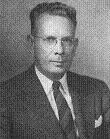
On May 22, 1917 (9:00 a.m.) after being accused of raping, murdering, and beheading 16-y.-o. white girl Antoinette Rappel in the woods near Memphis, Tenn. then allegedly confessing,, 51-y.-o. African-Am. woodcutter Ell Persons is abducted from a train en route to court before trial and burned alive with gasoline by a 5K-person lynch mob in broad daylight who don't bother to wear masks, spurring the creation of the Memphis chapter of the NAACP after no one is charged, becoming one of the first in the South and the largest in the South by 1919; Richmond, Va.-born white supremacist atty. David John Mays (1896-1971) is a key organizer, which doesn't stop him from winning the 1953 Pulitzer Prize for Biography.

On May 28, 1917 the staff of the first Am. Expeditionary Force (AEF), led by Mo.-born French-speaking Mexican expedition veteran Gen. John Joseph "Black Jack" Pershing (1860-1948) (his nickname comes from commanding the 10th Calvary Regiment of African-Am. Buffalo soldiers in 1895, after which he was originally called Nigger Jack) departs from New York City for Liverpool on board British steamship Baltic; on June 26 it begins landing 14K "Doughboys" (from their round dough-like uniform buttons) in St. Nazaire, France (Pershing himself lands in Boulogne on June 13 after reaching Liverpool on June 8, and makes a triumphal entry into Paris on June 14), becoming the first official U.S. force to fight on the European continent; on July 2 Pershing requests 1M U.S. troops, upping the request to 3M on July 11; it takes a year to build up enough troops for combat (1M by next July).

On Aug. 10, 1917 the U.S. First Army is formed, taking up positions in the Toul sector at the E end of the Western Front; after concern that some states might get jealous of others, the 42nd "Rainbow" Div. is formed in Aug. with recruits from surplus units of many different states under Maj. Douglas MacArthur (1880-1964), who utters the soundbyte: "Fine, that will stretch over the whole country like a rainbow"; too bad, African-Ams. are excluded on the excuse that black isn't a color in the rainbow, and limited to non-combat grunt jobs; the 41st Infantry "Sunset" Div. is formed, with the Indian-massacring 1st Colo. Infantry Battalion changing its name to 157th Infantry and joining it; by the end of the war 2M U.S. servicemen land in France, and soon learn about the "French kiss" from the local girls - beats cows and sheep hands down?
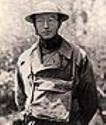



On Sept. 25, 1918 (11:30 p.m.) the Battle of the Argonne Forest (Allied Meuse-Argonne Offensive) in NE France (ends Oct. 10) by 37 U.S. and French divs. against 36 German divs. starts out fast with 4K guns firing 800K mustard gas and phosgene shells in six hours, incapacitating 10K German troops and killing 178, followed at 5:30 a.m. by 700 tanks leading the infantry, pushing the Germans back 3 mi.; future U.S. pres. Harry S. Truman is an artillery battery cmdr.; by the morning of Sept. 27 23K German POWs are taken; on Sept. 27 the BEF supported by 1K+ aircraft attacks the Hindenburg Line near Cambrai, taking 10K POWs and 200 heavy guns, taking Montfaucon, with a total advance of 6 mi.; too bad, it bogs down on Oct. 5 after advancing only 8 mi. and overrunning a 30-mi. sector of the Hindenburg Line; on Oct. 5 Black Check Cock homing pigeon Cher Ami (Fr. "good friend") helps save the surrounded Lost Battalion of the multiethnic (42 different languages) U.S. 77th Div., led by Maj. Charles White Whittlesey (1884-1921) (whose portrait bears a striking resemblance to Beatle John Lennon?) 1/2-mi. ahead of the front line at Charlevaux Mill, which loses 360 of 554; the pigeon carries a message telling the Yanks to quit shelling their own men, receiving a Croix de Guerre after receiving a wooden leg (only bird to get the medal); Whittlesey receives a Medal of Honor; in early Oct. the African-Am. U.S. 369th Infantry Regiment (15th New York Nat. Guard Regiment) AKA the Harlem Hell Fighters and the Black Rattlers, whose Pvt. Henry Lincoln Johnson (1897-1929) becomes the first U.S. soldier to be awarded the Croix de Guerre, and which never retreats or loses a foot during the war, fighting the longest of any U.S. regiment has a Lost Black Battalion at Sechault, France (W of the Argonne Forest) a few days before the white 77th Div., holding out against impossible odds before being rescued; both receive big publicity, the racist kind, one being described as "ridiculous Sambos", the other as "sinister agents of Yiddish Bolshevism", and Pvt. Abraham Krotoshinsky (1893-1953), who receives a Distinguished Service Cross is described as a "little stoop-shouldered Polish Jew"; Mobile, Ala.-born Lt. James Reese Europe (1881-1919) ("the Martin Luther King of music - Eubie Blake) of the Harlem Hell Fighters heads the most famous jazz band in the U.S. Army.

In 1918 African-Am. white-looking (blonde-blue) Atlanta, Ga.-born Walter Francis White (1893-1955) moves to New York City to work for the NAACP, going on to travel 12K mi. next year giving speeches exposing lynchings and other injustices while risking being lynched himself. In 1924 he pub. his first novel The Fire in the Flint. In 1926 he pub. his last novel Flight.
On July 19-24, 1919 after two black men "jostle" white Elsie Stephnick on 15th St., NW and New York Ave., the 1919 Washington Race Riot in Washington, D.C. kills six and injures 100.
On July 27, 1919 increase of the black pop. from 44K in 1910 to more than 100K triggers the huge Chicago Race Riots in "Shy Town" Chicago, Ill. which last all summer; Pres. Wilson calls the white race the "aggressor", but calls out federal troops to put down the riots on July 30 - after all, whites are still the crackers?
On Sept. 28, 1919 after being accused of raping 19-y.-o. Agnes Loeback, Southern-born meatpacker William "Will" Brown (b. 1879) is lynched in a riot in Omaha, Neb. with unbelievable cruelty in a circus atmosphere.
Say it ain't so Joe, or, The Black Sharecropper scandal stinks up America's sport of court-rigging? On Sept. 30-Oct. 1, 1919 a race riot in Elaine, Ark. begins after 100 black sharecroppers meet at the Hoop Spur Church to discuss a lawsuit to obtain better prices from white planters, after which white pigs arrive, and a fight breaks out; a white mob of 500-1K assembles, killing 100-237 blacks and five whites over three days; 79 blacks are later tried and convicted, and 12 are sentenced to death, the rest getting terms up to 21 years; their appeals reach the U.S. Supreme Court, causing an expansion of federal oversight of state treatment of defendants' rights; the bloodiest racial conflict in U.S. history until ?
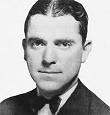
In 1919 white entertainer George White (18910-1968) begins producing George White's Scandals on Broadway, (until 1939), with scores by George Gershwin, Richard A. Whiting et al., introducing African-Am. dances incl. the Charleston and Black Bottom to white audiences, along with songs such as Lucky Day (1926), and Life is Just a Bowl of Cherries (1931) (both written by Ray Henderson, Buddy G. DeSylva, and Lew Brown).

On Feb. 14, 1920 the Negro Nat. League is formed for African-Am. baseball players by Calvert, Tex.-born pitcher Andrew Rube Foster (1879-1930), reaching 24 teams before closing in 1931.

In 1920 Ga.-born Roland Hayes (1887-1977) makes his London debut at Aeolian Hall, followed by a tour of Europe, becoming the first African-Am. male concert artist to receive internat. and U.S. acclaim.






In the 1920s (1918-29?) the Harlem Renaissance (New Negro Movement) of African-Am. writers in Harlem, Manhattan, N.Y. begins, led by Alain LeRoy Locke (1886-1954) (the Dean) (first African-Am. Rhodes scholar, 1907), James Mercer Langston Hughes (1902-67), Arna Wendell "Arna" Bontemps (1902-73), Countee Cullen (1903-46), Jessie Redmon Fauset (1882-1961), Alice Ruth Moore Dunbar Nelson (1875-1935) et al. In 1928 Countee Cullen marries the daughter of W.E.B. Du Bois.
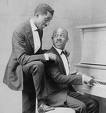
On May 23, 1921 Baltimore, Md.-born pianist-composer James Hubert "Eubie" Blake (1887-1983) and Indianapolis, Ind.-born jazz composer-playwright Noble Sissle (1889-1975) debut their jazz musical Shuffle Along on Broadway at Daly's 63rd St. Theatre, dir. by Walter Brooks, running for 484 perf. (until July 15, 1922), becoming the first major Broadway production in over a decade written, produced, and performed entirely by African-Ams., and the first black love story, with blacks not restricted to balcony seats; makes stars of Josephine Baker, Adelaide Hall (as Jazz Jasmine), Florence Mills (as Ruth Little), Fredi Washington, Roger Matthews (as Harry Walton), and Paul Robeson, causing "curtain time traffic jams" on 63rd St; about corrupt politicians Sam and Steve, who run for mayor in Jimtown and agree to appoint the loser as chief of police, until virtuous Harry Walton wins the next election and runs them out of town; makes the observation that the lighter an African-Am. woman's skin is, the more desirable she is; features I'm Just Wild About Harry (adopted by Harry Truman for his pres. campaign theme), Love Will Find a Way. (In) Honeysuckle Time, Shuffle Along Overture, If You Haven't Been Vamped by a Brownskin, You Haven't Been Vamped at All, I'm Simply Full of Jazz, and Bandana Days; after leaving New York City it becomes the first black musical to play in white theaters across the U.S., while opening up Broadway to black actors, although only plots portraying blacks as half-civilized become acceptable.

On May 31-June 1, 1921 the 16-hour Tulsa Race Riot breaks out in "Black Wall Street" (Greenwood neighborhood) of Tulsa, Okla., with a mob of 10K whites aided by police and the Nat. Guard burning down 35 city blocks (1,256 homes), causing $1.8M in property damage, leaving 10K homeless, and killing 200-300 (official totals 23 blacks, 16 whites); some whites drop dynamite from a plane onto the black ghetto?; after white Tulsa businessman Cyrus Stevens Avery (1871-1963) begins a push to build Route 66 (Nov. 11, 1926), and makes sure it goes through the town, and white country groups such as Bob Wills and the Texas Playboys set up shop, the town becomes a white haven, dubbed "America's most beautiful city" by Time mag. in the 1950s.

In 1921 a muckraking campaign by the New York World causes the Ku Klux Klan to be investigated by the U.S. Congress; when no charges are brought against them, membership soars; the KKK in Denver, Colo., headed by physician John Galen Locke gets Denver mayor Benjamin F. Stapleton elected in 1923-31 and 1935-47, along with police chief William "Coca-Cola" Candish (Koka-Kola Kandish), and terrorizes Jews, Catholics, blacks, and gays, selling Cyana (Catholics, you are not Americans) cigars, and boycotting Jewish fashion store owner Meyer Neusteter. In 1923 the Ku Klux Klan (KKK) holds a tri-state conclave in Kokomo, Ind., with an attendance of 200K; martial law is established in Okla. to protect people and property from the KKK. In Feb. 1924 a clique led by Texas dentist Hiram Walker buys out Ku Klux Klan (KKK) owner William J. Simmons for $146.5K; the annual Klonvocation is attended by 1K delegates in Kansas City, Mo.; the Klux Klan (KKK) reaches its peak of strength in the U.S. with a membership of 3M-4M, only to find itself all dressed up with nowhere to go as it has no actual program other than keeping niggers in their place and away from their white women while they dip their white wicks in black women every chance they get? In 1924 after a campaign against Roman Catholics and the foreign-born, the KKK takes over both chambers in the Ind. Statehouse, plus the gov.'s office and most seats in Congress.

In 1921 Eubie Blake (1883-1983) and Noble Sissle (1889-1975) debut their musical Shuffle Along at the Cort Theater in New York City; it runs for 504 perf., becoming the first hit musical on Broadway by and about African-Ams., incl. the first black love story, introducing black actors Josephine Baker, Florence Mills, and Paul Robeson; blacks are not restricted to balcony seats; songs incl. I'm Just Wild About Harry, Love Will Find a Way.

In 1922 New Orleans, La.-born Louis "Satchmo" Armstrong (1901-71) launches his career with Joe "King" Oliver's Creole Jazz Band in New Orleans. In 1923 after moving to Chicago in 1922 he records his first solo. In 1924 he moves to New York City at the invitation of Fletcher Henderson to play with his orchestra, moving the focus of Am. jazz from Chicago to the Big Apple. In 1926 he popularizes scat (wordless) singing, and switches from the cornet to the trumpet.

In 1923 Ma Rainey (1886-1939) of Columbus, Ga. signs with Paramount Records, recording 100 songs by 1928 incl. "C.C. Rider", "Jelly Bean Blues", "Ma Rainey's Black Bottom", and "Bo Weavil Blues", becoming known as "the Mother of the Blues".

In 1923 Jean Eugene Toomer (1894-1967) pub. the novel Cane, a Harlem Renaissance hit about African-Ams.; also Blood Burning Moon, about mistreatment of blacks in the U.S. South.
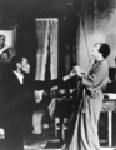
On May 15, 1924 Eugene O'Neill (1888-1953) debuts his play All God's Chillun Got Wings at the Greenwich Village Theatre in New York; about miscegeneration; stars Paul Robeson as Jim Harris, the black husband of abusive white woman Ella Downey (Mary Blair) of Lower New York City, who ruins his career as an atty. after she is called a "nigger-lover"; after Robeson kisses Blair's hand on stage, it causes a nat. uproar, causing it to shut down after the Oct. 24 performance.
In 1924 the Racial Integrity Act is passed in Va., prohibiting interracial marriage; overturned in 1967; too bad, the act classifies most Indian aborigines in Va. as black.

In 1924 naughty St. Louis, Mo.-born black singer ("the Bronze Venus") ("the Bronze Pearl") ("the Creole Goddess") Josephine Baker (1906-75) (white father, black washerwoman mother) becomes a star in Paris with such acts as the seminude "Danse Sauvage", and the "Banana Dance", costumed in a girdle of rhinestone-studded bananas; in 1974 she makes a 50th anniv. comeback with an entrance on a motorcyle.

In 1924 Fredericksville, N.J.-born Jessie Redmon Fauset (1882-1961) (first black woman Phi Beta Kappa) pub. the novel There is Confusion. In 1928 she pub. Plum Bun. In 1931 she pub. The Chinaberry Tree: A Novel of American Life. In 1933 she pub. Comedy, American Style.

In 1924 Charleston, S.C.-born DuBose Heyward (1885-1940) (descendant of DOI signer Thomas Heyward Jr.) pub. the bestseller Porgy, set in Catfish Row in the Am. South.
On Aug. 8, 1925 the first Nat. Congress of the Klu Klux Klan (KKK) opens; 25K-50K of 3M members march in Washington, D.C. demanding immigration restrictions based on race and national origin.
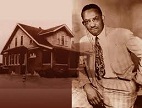
On Sept. 25, 1925 Bartow, Fla.-born black physician Ossian Sweet (1895-1960) moves his family into an all-white neighborhood in Detroit, Mich., causing an angry mob to surround their house the first night, and when the police refuse to respond and another mob surrounds them the 2nd night, firing at his house, he fires back, whereupon the pigs show up and arrest him, causing the NAACP to have to clear him at a cost of $22K; too bad, his wife and brother-in-law die of TB contracted in priz.

In 1925 Notasulga, Ala.-born Zora Neale Hurston (1891-1960) pub. Color Struck. In 1928 she pub. How It Feels to Be Colored Me. In 1931 she pub. Hoodoo in America. In 1933 she pub. The Gilded Six-Bits. In 1934 she pub. Jonah's Gourd Vine. In 1935 she pub. Mules and Men. In 1936 she pub. Mules and Men. In 1937 she pub. Their Eyes Were Watching God; also Janie Crawford in Eatonville, Fla. (first all-black community in the U.S.); also Mules and Men. In 1939 she pub. Moses, Man of the Mountain. In 1948 she pub. Seraph on the Suwanee (last novel).

In 1925 Asa Philip Randolph (1889-1979) secretly organizes the Brotherhood of Sleeping Car Porters and Maids to work for better working conditions for U.S. blacks.

In 1925 Joplin, Mo.-born gay black poet-novelist-playwright James Mercer Langston Hughes (1902-67), a leader of the Harlem Renaissance and pioneer of jazz poetry pub. I, Too, Am America, which contains the soundbyte: "I am the darker brother, but I too am American". In 1926 he pub. his first poetry book The Weary Blues, which incl. The Negro Speaks of Rivers; "My soul has grown deep like the rivers". In 1926 he pub. The Negro Artist and the Racial Mountain in "The Nation"; "The younger Negro artists who create now intend to express our individual dark-skinned selves without fear or shame. If white people are pleased we are glad. If they are not, it doesn't matter. We know we are beautiful." In 1927 he pub. Fine Clothes to the Jew. In 1931 he pub. Langston Hughes (1902-67), The Negro Mother, and Other Dramatic Recitations; incl. The Negro Mother; also Dear Lovely Death; "Dear lovely Death,/ Change is thy other name." In 1932 he pub. The Dream Keeper and Other Poems; also Scottsboro Limited: Four Poems and a Play in Verse; illustrations by Prentiss Taylor; incl. Scottsboro; "8 BLACK BOYS IN A Southern Jail./ WORLD, TURN PALE!" In 1935 he pub. Let America Be America Again; "O, yes,/ I say it plain/ America never was America to me,/ And yet I swear this oath - / America will be!" In 1940 he pub. The Big Sea: An Autobiography, which contains the famous soundbyte about the 1920s Harlem Renaissance: "White people began to come to Harlem in droves... It was the period when the Negro was in vogue." In 1942 he pub. Shakespeare in Harlem. In 1943 he pub. Freedom's Plow; "When a man starts out with nothing,/ When a man starts out with his hands/ Empty, but clean,/ When a man starts to build a world,/ He starts first with himself/ And the faith that is in his heart -/ The strength there,/ The will there to build." In 1961 he pub. Ask Your Momma: 12 Moods for Jazz; inspired by the white youth riot at the 1960 Newport Jazz Festival; his masterpiece? On May 22, 1967 he dies in New York City. In 1967 he posth. pub. The Panther and the Lash: Poems of Our Times, which incl. Words on Fire.

In 1925 Princeton, N.J.-born big black buck Paul Robeson (1898-1976) makes his debut as a bass-baritone in the Greenwich Village Theatre singing the first concert consisting solely of Negro spirituals. On Dec. 27, 1927 Jerome Kern (1885-1945) and Oscar Hammerstein II (1895-1960) debut their operetta Show Boat at the Ziegfeld Theater in New York City, produced by Florenz Ziegfeld, based on the 1926 Edna Ferber novel, starring Charles Winninger as Cap'n Andy Hawks, Helen Morgan as Julie LaVerne, Jules Bledsoe/Paul Robeson as Joe the Stevedore, and Tess Gardella (Aunt Jemima) as Queenie; it features the songs Old Man River, Can't Help Lovin' Dat Man, Queenie's Ballyhoo; revolutionizes musicals, giving them social relevance; "Tote that barge and lift that bale". On Aug. 23, 1950 black Communist singer-actor Paul Robeson meets with U.S. officials to get his revoked passport reinstated, but doesn't succeed until 1958. On May 18, 1952 highly-educated Am. black singer-actor-activist Paul Robeson (1898-1976), who has been pro-Soviet Union since the 1930s and under investigation by the FBI since 1941 and was denied a passport in 1950 by the U.S. State Dept. for criticizing the treatment of blacks in the U.S. (claiming it should be kept a "family affair") holds a protest concert at the Internat. Peace Arch on the border between Wash. state and B.C. Canada, performing on the back of a flat bed truck before 20K-40K on the Canadian side; he holds more concerts next year, and finally gets his passport back in 1958; W.E.B. Du Bois (1868-1963), Howard Fast (1914-2003), Albert E. Kahn, and Richard Morford get similar treatment.


In Feb. 1926 (2nd week) African-Am. historian Carter Godwin Woodson (1875-1950) founds Negro History Week to coincide with the birthdays of Frederick Douglass and Abraham Lincoln, which on Feb. 1, 1976 becomes U.S. Black History Month; in Dec. 2005 actor Morgan Freeman (1937-) calls it "ridiculous", saying, "You're going to relegate my history to a month? I don't want a black history month. Black history is American history."
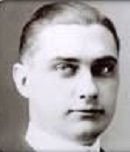
In 1926 the Scholastic Achievement Test (SAT), based on the U.S. Army Alpha IQ Test, designed by Princeton psychologist Carl Campbell Brigham (1890-1943) (author of a 1923 book concluding that the Nordic race is intellectually superior to the Alpine and Mediterranean races, and that miscegenation between whites and Negroes is a horrible menace, but later allegedly flip-flops) is founded to test U.S. students for aptitude for college; in 1947 the Educational Testing Service (ETS) is chartered, and the test becomes the usual requirement for college scholarship applicants.

In 1926 Guyana-born Eric Derwent Walrond (1898-1966) pub. Tropic Death, a collection of short stories that makes him a Harlem Renaissance star; "A ram-shackle body, dark in the ungentle spots exposing it, jogged, reeled and fell at the tip of a white bludgeon." In 1927 he pub. City Love.

On Oct. 26, 1927 Richard Fleischer's The Jazz Singer, based on the play "Day of Atonement" by Samson Raphaelson is the first talking picture (talkie), produced by Warner Brothers in the Vitaphone sound-on-disc process, starring Al Jolson (1886-1950) in black face, inaugurating the era of the Hollywood "talkie" at Warner's Theater on Broadway, and making $3M in profit on a $500K investment, after which the Hollywood Big Five Studios try to block the growth of talkies, causing Warner Bros. to churn out 12 of them in 1928 alone; the Jazz Singer's name is Jack Robin, and the first words ever spoken onscreen are "Wait a minute, wait a minute, you ain't heard nothing yet" (reel #2); the part was turned down by George Jessel (star of the stage production) and Eddie Cantor, relegating Jessel's movie career to the dumps; adding sound to movies revolutionizes the industry, and puts Am. Federation of Musicians members out of work, helped by a rush to hire English actors for their clearer diction; features the song Blue Skies; "No closer approach to resurrection has ever been made by science" (Prof. M. Pupin); "Men and women whose names were known throughout the land disappeared as though they had been lost at sea" (Jack Warner); "They made me sound as if I'd been castrated" (Tallulah Bankhead); "Talkies didn't do more to the industry than turn it upside down, shake the entire bag of tricks from its pocket, and advance Warner Brothers from last place to first in the league" (Variety).

In 1927 Edward Franklin Frazier (1894-1962) pub. The Pathology of Race Prejudice, in which he equates it to insanity, getting him removed from Atlanta U. in Ga., after which he moves to the U. of Chicago.

In 1928 Jamaican-born poet Claude McKay (1889-1948) pub. Home to Harlem, which becomes a bestseller. In 1930 he pub. Banjo. In 1932 he pub. Gingertown (short stories). In 1933 he pub. Banana Bottom.


On Apr. 19, 1930 the comic strip Joe Palooka, by Hammond Edward "Ham" Fisher (1900-55) debuts, about a "big, good-natured prize fighter who didn't like to fight, a defender of little guys, a gentle knight", with excitable Irish mgr. Knobby Walsh, becoming the most successful sports comic strip; a blonde with a cowlick, he changes his face to fit each reigning world heavyweight boxing champ until black fighter Joe Louis, deciding to keep him white, esp. since he goes out with white babe Ann Howe, whom he marries on June 24, 1949.

On July 4, 1930 traveling salesman (a New Zealander of half-Indian descent, who claims to be born in Mecca?) Wallace Dodd Fard (1893-?) forms the Lost-Found Nation of Islam in the Wilderness of North America in Detroit, Mich., with the goal of resurrecting the spiritual, mental, social, and economic condition of Am. blacks, claiming that they were history ignoramuses about their true African history, which was Muslim, and that they are the lost ancient tribe of Shabazz that goes back 66T years, and that a renegade black scientist named Yakub on the island of Patmos created the pesky white race 6K years ago as a test for the black master race, who are a divine race created by Allah; he mysteriously disappears during the summer, and Elijah Muhammad (1897-1975) becomes the new leader on Nov. 22, moving to Chicago, Ill. in 1932 and establishing Temple Number Two as the Nation of Islam HQ - shine yo' shoes, bazz?
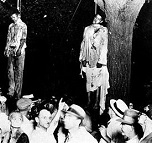
On Aug. 7, 1930 two black men, Abram "Abe" Smith (19) and Thomas "Tommy" Shipp (19) are lynched in Marion, Ind. for the Aug. 6 murder of white man Claude Deeter (b. 1907) and the rape of his white companion Mary Bell; a third black man, James Cameron (1914-2006) escapes after Bell tells the crowd he's innocent of the murder and she wasn't raped, and after serving four years for accessory to murder later founds the America's Black Holocaust Museum (ABHM) in Milwaukee, Wisc. in 1988; a famous photo is taken of the lynched men hanging from a tree while a white crowd mills around; on Oct. 19, 2003 a Reconciliation Day is proclaimed, attended by 400.

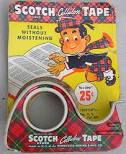
On Sept. 8, 1930 3M Co. of the U.S. ships its first sample of Scotch Cellophone Tape, invented by African-Am. physician Charles Richard Drew (1904-50) to a Chicago firm that wraps bakery goods; to cut costs stingy 3M applies adhesive only to the edges of the tape, causing a St. Paul, Minn. auto dealer to attribute it to stingy Scotch bosses; in 1944 kilt-wearing Scotty McTape first appears, followed by the plaid design in 1945. In 1940 he invents the Blood Bank to provide blood for Britain; too bad, he is prohibted by segregation laws from donating his own blood; after having an auto accident in 1950 he bleeds to death, causing a false rumor that he had been refused treatment by a hospital because he was black.

In Nov. 1930 white activist Jesse Daniel Ames (1883-1972) of Tex. founds the Assoc. of Southern Women for the Prevention of Lynching (until 1942), telling white men that they don't need to have their "virtue" protected by brutal murder, and that it isn't chivalrous of them, getting 40K women to sign a pledge against lynching, causing a public outcry leading to a decrease in lynchings.

In 1930 exiled Russian Communist leader Leon Trotsky (1879-1940) pub. The History of the Russian Revolution, which coins the word "racist" - you mean nobody even thought of it until now?

In the 1930s African-Am. lesbian blues singer Gladys Bentley (1907-60) headlines the Ubangi Club in Harlem, N.Y., wearing a tuxedo and top hat while flirting with the women in the audience.
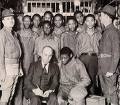
In Mar. 1931 the Scottsboro Boys, nine black youths ages 13-20 are arrested in a freight train in Scottsboro, Ala., and charged with raping two young white women who had shared the same boxcar, after which the white supremacist system railroads the banana-eating ape nigger bucks to death sentences even though the sacred cow white women are found to be hos, doctors testify that no rape occurred, and one of them later recants; after the Communist Party's Internat. Labor Defense takes charge defending them and brings in non-Communist Romanian-born Jewish-Am. atty. Samuel Simon Leibowitz (1893-1978), he faces death threats and has to be guarded by the Nat. Guard at the trial, and is stunned by a guilty verdict in 1933, calling it "the act of spitting on the tomb of Abraham Lincoln", vowing to defend them "until Hell freezes over", getting the U.S. Supreme Court to overturn their convictions twice, which dooms them more back in racist Ala., and all they get is new trials, at which they are reconvicted, one of them three more times in a row; in 1948 Haywood Patterson escapes, three more are paroled in 1943, 1946 and 1950, and the rest get reduced but long sentences; on Oct. 25, 1976, last known survivor Clarence Norris is pardoned; on Nov. 22, 2013 Ala. grants three of them a posth. pardon - lock up them white women lovers until their juices dry up?
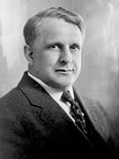

In 1931 the U.S. Davis-Bacon Act, sponsored by U.S. Sen. James John "Puddler Jim" Davis (1873-1947) (R-Penn.) (former U.S. labor secy.) and U.S. Rep. Robert Low Bacon (1884-1938) (R-N.Y.) requires workers on federal construction contracts to receive prevailing local wages and benefits, encouraging local workers to be hired by employers instead of shipping in black, er, lower-paid workers from the South; it is not a Jim Crow law per se, but just started as one and they got lucky?

In 1931 Roark Bradford (1896-1948) pub. John Henry, about a super-powerful black man who dies during a contest between his sledge hammer and a steam-driven one; dramatized in 1940 with music by Jacques Wolfe - I can't decide if this is racist or just flattering?



In 1931 New York City-born Harlem Renaissance leader Countee Cullen (1903-46) pub. his first novel One Way to Heaven. In 1940 he pub. The Lost Zoo. In 1946 he and Alexandria, La.-born Arna Wendell Bontemps (1902-73) pub. St. Louis Woman. In 1947 On These I Stand is pub. posth. Meanwhile in 1931 Bontemps pub. God Sends Sunday. In 1932 he and Joplin, Mo.-born James Mercer Langston Hughes (1902-67) pub. Popo and Fifina, Children of Haiti. In 1934 Bontemps pub. You Can't Pet a Possum. In 1936 he pub. Black Thunder. In 1937 he pub. Sad-Faced Boy. In 1939 he pub. Drums at Dusk. In 1943 he and Jack Conroy (1898-1990) pub. The Fast Sooner Hound. In 1945 he pub. We Have Tomorrow. In 1946 he and Conroy pub. Slappy Hooper, the Wonderful Sign Painter. In 1951 they pub. Sam Patch, the High, Wide and Handsome Jumper. In 1955 he pub. Lonesome Boy. In 1970 he pub. Mr. Kelso's Lion. Meanwhile in 1930 Hughes pub. his first novel Not Without Laughter In 1934 he pub. the short story collection The Ways of White Folks. In 1935 he pub. Mulatto. In 1940 he pub. Simple Speaks His Mind. In 1942 he pub. Laughing to Keep from Crying. In 1953 Sen. Joseph McCarthy convinces the U.S. State Dept. to purge books by Langston Hughes (1902-67), Dashiell Hammett (1894-1961), and Jean-Paul Sartre (1905-80) in U.S.-run libraries abroad, pressuring Ike to go along with the practice in a press conference, although he later blows up in private with White House press secy. James Hagerty, comparing McCarthy to Hitler; at a commencement at Dartmouth College, Ike utters the soundbyte: "Don't join the book burners. Don't be afraid to go in your library and read every book" - he's already censored the bad books for you? In 1957 he pub. Simple Stakes a Claim. In 1957 he pub. Tambourines to Glory; Essie Belle Johnson and Laura Reed open a storefront church in Harlem. In 1959 he pub. Selected Poems, withholding his Communist-leaning poems after a brush with Joseph McCarthy in 1953? In 1961 he pub. The Best of Simple. In 1965 he pub. Simple's Uncle Sam.

In 1931 Am. physical anthropologist Earnest Albert Hooton (1887-1954) pub. Up from the Ape, about the physical differences of the negro from other races, incl. ratio of arm length to leg length in the fetus, distinguishing True Negro, African Negro, Oceanic Negro et al.; he later writes: "The negro race is phylogenetically a closer approach to primitive man than the white race", using physical anthropology to establish racial stereotypes incl. the athleticism and criminality of blacks, using mathematically rigorous race typology criteria; never fear, in 1943 he pub. an article calling for the systematic immigration of males of different races into Germany to breed the "aggressive ideology" out of them.





The Babelympics? On July 30-Aug. 14, 1932 the Olympic Flame is inaugurated in the X (10th) Summer Olympic Games in Los Angeles, Calif., held smack dab in the middle of the Great Depression, causing less than half of the 1928 participatants to attend, even being stood up by Pres. Herbert Hoover, becoming the first Olympic Games not attended by the sitting head of the govt. of the host country, which doesn't stop them from making $1M profit; 1,332 athletes from 37 nations participate in 116 events in 14 sports; the first Olympic Village is built in the Baldwin Hills (men only); the first use of a victory podium; Jim Thorpe is a press reporter at the Games; Paavo Nurmi is banned for being a pro; the U.S. wins bronze in field hockey because there are only two other nations competing (India gold, Japan silver); Thomas Edward "Eddie" Tolan (1908-67), "the Midnight Express" of the U.S. wins gold in the 100m and 200m, becoming the first African-Am. world's fastest human; Stanislawa Walasiewicz (1911-80) of Poland wins gold in the women's 100m, and after her death it's discovered that she's intersex; Baron Takeichi Nishi (1902-45) of Japan wins a gold in the equestrian show jumping individual event on Uranus; "unnatural" (not delicate or feminine) Tex.-born Mildred "Babe" Didrikson (1911-56) ("the female Babe Ruth") sets four world records in one afternoon during the Olympic trials, then sets world records in the javelin throw (143' 4") and 80m hurdles (11.7 sec.) for two golds, then wins a silver in the high jump (nobody's perfect?); she earns All-Am. honors in basketball 1930-2, appears in vaudeville, then takes up golf; actress-swimmer Eleanor Holm (1913-2004) wins gold in the 100m backstroke, setting a world record in that plus the 200m backstroke, then despite having not lost a race in seven years and being the first female swimmer chosen for three U.S. Olympic teams, she is unceremoniously thrown off the team in 1936 by Avery Brundage after being caught drinking, shooting craps, and singing in cabarets past the 9 p.m. curfew on the boat trip to Germany, although if a man did it no action would have been taken?; the publicity makes her a star with the press, and she meets Adolf Hitler and Hermann Goering, who gives her a silver swastika, which she has later copied in gold with a diamond Star of David inside it after she marries Jewish hubby Billy Rose in 1939; they divorce in 1954.


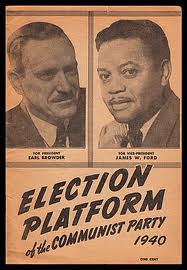

First Hoover, then Landon, Wilkie, and Dewey? On Nov. 8, 1932 after a campaign in which Hoover predicts that if his opponent is elected, "grass [would] grow in the streets of a hundred cities, a thousand towns", and Roosevelt counters that his economic reconstruction program is "from the bottom up and not from the top down, that puts the faith once more in the forgotten man at the bottom of the economic pyramid", the 1932 U.S. Pres. Election sees Franklin Delano Roosevelt (1882-1945) win by a landslide, 52.5% of the electorate voting for pres., and FDR receiving 22.8M popular (57.4%) and 472 electoral votes vs. Hoover's 15.8M popular (39.7%) and paltry 59 electoral votes; the Dems. win control of both houses of Congress, giving FDR a blank check to engage in "bold, persistent experimentation"; the first pres. whose mother votes in the election; Hoover utters the soundbyte "I knew from the bitter experience of all public men from Washington on down, that democracies are fickle and heartless, for democracy is a harsh employer"; the 4 mo. until FDR takes over leaves lame duck Hoover swinging in the wind as FDR refuses to let him take joint action in both of their names and risks things getting worse in the short run for long range credit, causing the Dems. to block Hoover's legislative efforts to alleviate the nation's misery, since by now Hoover's name is mud, with newspapers are already known as "Hoover blankets" and empty pockets turned inside out as "Hoover flags"; William Zebulon Foster (1886-1961) (white) and James W. Ford (1893-1957) (black) become the pres. and vice-pres. candidates for the Communist Party USA, with the slogan "Equal rights for negroes everywhere"; Ford becomes the first U.S. black U.S. pres. candidate. In 1933 after Charles S. Johnson (1893-1956) of Fisk U. suggests it, FDR organizes the Black Cabinet, a cluster of black advisors; he never names a black to his real cabinet.
In 1932 the Tuskegee Study of Untreated Syphilis in the Negro Male (AKA the Tuskegee Syphilis Study) begins in Tuskegee, Ala. (until 1972), taking 399 mostly illiterate African-Am. sharecroppers and studying the course of their untreated syphilis without their consent, continuing even after the advent of penicillin in 1947; the U.S. govt. later pays the survivors $10M, and Pres. Clinton apologizes on May 16, 1997.


In 1933 Am. cartoonist Elmer Simms Campbell (1906-71) begins pub. his "Harem Girls" and other cartoons in Esquire mag., becoming the first African-Am. cartoonist to pub. in nat. distribution slick mags., going on to pub. work in almost every issue unti 1958, plus many other mags. and newspapers; his little joke is that he turns white men on with cartoons of gorgeous white women, but he's black?
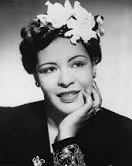

In 1933 Record producer John Hammond discovers black jazz vocalist Billie "Lady Day" Holiday (Eleanora Fagan Gough) (1915-59). In 1936 William "Count" Basie (1904-84) and his Barons of Rhythm move from Kansas City, Mo. to Chicago, Ill., where he becomes known for his "jumping" beat; members incl. Lester Young (sax), Herschel Evans (sax), Freddie Green (guitar), Jo Jones (drums), Walter Page (bass), Earle Warren (sax), Buck Clayton (trumpet), Harry Edison (trumpet), Benny Morton (trombone), Dickie Wells (trombone); next year they move to New York City and sign up singer Billie Holiday, and in 1938 get in a battle of the bands with Chick Webb's band and his lead singer Ella Fitzgerald. In 1938 Artie Shaw signs Billie Holiday, becoming the first white bandleader to hire a full-time black female singer; too bad, after recording Any Old Time she quits after racist treatment from Southern audiences. In 1939 she releases Strange Fruit, a ballad about lynching in the South, first sung at Manhattan's Cafe Society, which Time mag. calls "NAACP propaganda".
I can't forget that scent, but I can't live without it? On Jan. 26, 1934 the Apollo Theater at 253 W. 125th St. in Harlem, N.Y. (founded in 1913) reopens in the segregated U.S., featuring black performers and becoming the Northern stop for the "chitlin' circuit"; the quality is so high that whites begin sneaking in, incl. Milton Berle, who brings a stenographer to steal jokes; Ella Fitzgerald wins an amateur talent contest here this year, and Sara Vaughan in 1942.
On Mar. 19-21, 1935 the Harlem Riot of 1935 (first race riot in Harlem) begins after 16-y.-o. Puerto Rican Lino Rivera is caught shoplifting a 10 cent penknife at the Kress Five & Ten Store across from the Apollo Theater, leading to false rumors that he had been beaten or killed, causing the Young Communist League and the militant Young Liberators to stage a demonstration outside the store that evening, leading to a riot, killing three, wounding hundreds, destroying 200 stores, and causing $2M in damage; after this, race riots in Harlem become common, starting with next year after Joe Louis loses to Max Schmeling.
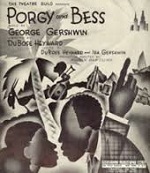
On Sept. 30, 1935 George Gershwin (1898-1937), Ira Gershwin (1896-1983), DuBose Heyward (1885-1940), and Dorothy Heyward (1890-1961) debut their jazz opera Porgy and Bess at the Colonial Theatre in Boston, moving on Oct. 10 to the Alvin Theater in New York (124 perf.); based on the 1925 Heyward novel, set in Catfish Row (real-life Cabbage Row) in Charleston, S.C., with an all-black cast, incl. Anne Wiggins Brown (192-2009) as Bess, Jack Carr as her possessive lover Crown, John Williams "Bubbles" Sublett (1902-86) as drug dealer Sportin' Life, and baritone Robert Todd Duncan (1903-98) as Porgy, who goes on to lead a successful protest against the Nat. Theatre of Washington, D.C. for audience segregation; choral dir. by Eva Jessye (1895-1992); too bad, the 1935 album features mostly white opera singers; features the songs It Ain't Necessarily So, Summertime, I Got Plenty O' Nuttin'.

In 1935 Mary McLeod Bethune (1875-1955), a friend of Eleanor Roosevelt founds the Nat. Council of Negro Women (NCNW) in the U.S., uniting the Nat. Assoc. of Colored Women (of which she was pres. in 1924-8) with other major black women's orgs.; in 1936 she joins the advisory committee of the New Deal's Nat. Youth Admin. (until 1943), and becomes dir. of its Negro Affairs Div. in 1939, becoming the first black woman to head a U.S. federal agency, helping organize the Federal Council of Negro Affairs (AKA Black Cabinet, Black Brain Trust), which holds govt.-sponsored Nat. Negro Conferences in 1937 and 1939.

In 1935 John Henry Lewis (1914-74) becomes the first African-Am. to win the world light heavyweight boxing title (until 1939).


On June 19, 1936 German boxer Max Schmeling (1905-2005) KOs African-Am. "Brown Bomber" ("Big Black Threat?") Joseph "Joe" Louis Barrow (1914-81) in round 12 to regain the world heavyweight boxing title; millions of good white Aryans feel vindicated, but the blacks want a rematch; Schmeling's wife listens to the broadcast with Nazi propaganda leader Josef Goebbels, who comments "The white man prevailed over the black, and the white man was German"; Goebbels is so gobble-gobble excited he doesn't go to bed till 5 a.m.?

















The greatest chance to stop WWII with the fellowship of sports is in the hands of a black, two Jews, and a mental cripple at the Big 1936 Aryan Olympics? On Aug. 1-16, 1936 Nazi Germany, led by Adolf Hitler (1889-1945) hosts the XI (11th) (1936) Summer Olympic Games in Berlin, after the first-ever torch relay from Olympia, Greece, devised by Nazi filmmaker Leni Riefenstahl, who films the dramatic lighting of the flame in Olympic Stadium, the final torchbearer being graceful certified blonde-blue Aryan runner Fritz Schilgen (1906-2005), who does not compete (2nd time the Olympic flame is used); 3,963 athletes (incl. 331 women) from 49 nations participate in 129 events in 19 sports; the first televised Olympics, beamed to TV sets in Berlin and Potsdam, and later used by aliens from outer space as a signal that earthlings are ready for Carl Sagan's Contact?; basketball and handball debut as outdoor sports (handball doesn't appear again until 1972); French and Canadian athletes give an Olympic salute at the opening ceremony which looks dangerously close to the Nazi salute?; the U.S. almost boycotts the Olympics until a backroom power play, with U.S. asst. Navy Secy. (since Apr. 1, 1929) Ernest Lee Jahncke (1877-1960) being expelled from the IOC, and pro-Nazi USOC pres. #5 (since 1928) Avery Brundage (1887-1975) put in his place, maneuvering the USOC into a close vote to send a team, which most Jewish athletes boycott, while blacks welcome the propaganda chance (showing the cracks in the U.S. Jewish-black alliance, or is it something about every Jew and Aryan being shorter down there and the black bucks hoping to get lucky with the German girls, er, forget it?) (Brundage utters the soundbyte this year: "I am fed up to the ears with women as track and field competitors... her charms sink to something less than zero. As swimmers and divers, girls are as beautiful and adroit as they are ineffective and unpleasing on the track") (after the Olympics, his construction co. gets a contract to build the German Embassy in the U.S., and after he dies he is revealed to have been the a-hole who got American Injun Jim Thorpe's medals taken away for playing semi-pro ball); Hitler orders the Berlin police to arrest all gypsies before the games and keep them in a special camp, but exempts foreign visitors from Nazi anti-gay laws?; signs warning shoppers about Jewish-owned shops are taken down, but Hitler initially has signs mounted over toilets reading "Dogs and Jews not allowed", then backs down and removes them after Belgian IOC pres. (since 1925) Count Henri de Baillet-Latour (1876-1942) (who went on record as saying that women shouldn't take part in the Olympics) faces him down; only pure Aryan athletes are permitted by Hitler to compete for Germany; most athletes (incl. from the U.S., incl. Jesse Owens) wear track shoes made by ardent Nazi brothers Adolf "Adi" Dassler (1900-78) and Rudolf Dassler (1898-1974) of Herzogenaurach, Bavaria (12 mi. from Nuremberg); too bad, after the war, Adi rats Rudolf out as a member of the SS, causing them to split, after which in 1948 Rudolf founds Puma nearby across the Aurach River, and Adi renames his co. Adidas (run like a Nazi?); (the solution to world peace was on their feet all the time?); the well-heeled lily-white Aryan German athletes, while winning the most medals as a group and proving Aryan superiority to the Aryans are upstaged in the non-German world by black U.S. athlete (former Ohio State U. star) (son of a sharecropper and grandson of slaves) Jesse Owens (1913-80), "the Ebony Express", who becomes the 1st U.S. and 2nd athlete ever to win three individual Olympic golds, in the 100m (10.3 sec.) (Aug. 3), long jump (26 ft. 5-5/16 in.) (Aug. 4), and 200m (20.7 sec.) (Aug. 5); after Avery Brundage kisses Nazi butt by pulling Jews Martin Irving "Marty" Glickman (1917-2001) and Sam Stoller (1915-85) (the only two Jews on the U.S. Olympic team) out of the 4x100m relay, they put in Owens and yet-another-black-athlete Ralph Harold Metcalfe Sr. (1910-78) (world's fastest human from 1932-4, who placed 2nd to Owens in the 200m), and on Aug. 9 the U.S. team wins by 15 yards, setting a record of 39.8 sec., which lasts 20 years (until 1956); Hitler allegedly snubs "black nigger ape" Owens, but actually doesn't, as he decided to skip all medal presentations after the first day, when he did snub two U.S. blacks, high jumpers Cornelius Cooper "Corny" Johnson (1913-46), (who won the first U.S. gold) and David Donald "Dave" Albritton (1913-94); not that Owens is in love with the white racist U.S. so much either, saying "Hitler didn't snub me, it was FDR who snubbed me. The President didn't even send me a telegram"; black athlete Archibald Franklin "Archie" Archie Williams (1915-93) wins another gold for the U.S. in the 400m; blonde model Aryan German long jumper Carl Ludwig "Luz" "Lutz" Long (1913-43) does an un-PC thing by giving Owens advice that keeps him from elimination in the preliminary, then when Owens wins the gold, running out to congratulate him, clutching his right hand with his left and hoisting their arms into the air while facing toward Hitler, becoming Owen's defining moment of the Olympics, saying "It took a lot of courage to befriend me in front of Hitler... You can melt down all the medals and cups I have and they wouldn't be a plating on the 24 carat friendship that I felt for Luz Long at that moment"; Owens was not given segregated facilities in Germany like back in the good ole USA, and was idolized by German fans?; (if Luz Long coulda taken over Germany and Jesse Owens the U.S. right then, send me the screenplay?); too bad, fellow black athlete ("world's fastest human") Eulace Peacock (1914-96), who beat Owens 5x in a row in the 100m the year before is injured and doesn't compete (just what the Yanks need, to field a strutting black peacock in front of Herr Hitler?); on Aug. 8 the Washington U. crew team, representing the U.S. comes behind to pass Germany and edge Italy by 0.6 sec. to win the rowing gold in front of Hitler; the first basketball gold goes to the U.S., who beats Canada 19-8 in a mud court in the rain, where dribbling is impossible, and spectators have to stand; honorary-Aryan India wins the gold in field hockey, continuing their streak (1928-56); Konrad Frey (1909-74) and Karl Alfred Markus Schwarzmann (1912-2000) of Germany each win three golds in gymnastics, and Frey wins six medals and Schwarzmann wins five medals total, beating Owens' four (which are all gold); Estonia competes for the 1st time (next 1992), and godlike Aryan-looking Kristjan Palusalu (Trossmann) (1908-87) (who is later treated like merde during WWII by the Soviets, who force him to fight Finland, after which he defects to their side) wins two golds in men's heavyweight wrestling; Germany wins individual and team gold in all three equestrian events; Italy wins the gold in soccer, which is touted as a big V by Benito Mussolini; Japan wins a gold and bronze in the marathon using Korean runners under Japanese names; Danish journalist Inga Arvad (Petersen) (1913-73) accompanies Hitler at the Olympics and interviews him 2x, then has a bedroom affair with JFK in 1941-2, which the FBI tapes, holding it against him for life; in 1945 she marries Am. cowboy star Tim McCoy (1891-1978).


On Nov. 2, 1936 the world's first regular television (TV) broadcasting service is opened by the BBC at Alexandra Palace in London, with a startling high definition of 240 lines as a result of work done by Italian-born Guglielmo Marconi (1874-1937) and Romanian-born >Isaac Jacob Schoenberg (1903-90); Buck and Bubbles perform live, becoming the first African-Am. TV artists.
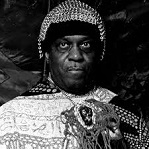
In 1936/7 (1952?) Birmingham, Ala.-born jazz musician Herman Poole Blount (1914-93) allegedly is contacted by ETs, who teleport him to Saturn, with the soundbyte: "My whole body changed into something else. I could see through myself. And I went up... I wasn't in human form... I landed on a planet that I identified as Saturn... They teleported me and I was down on stage with them. They wanted to talk with me. They had one little antenna on each ear. A little antenna over each eye. They talked to me. They told me to stop [attending college] because there was going to be great trouble in schools... The world was going into complete chaos... I would speak [through music], and the world would listen. That's what they told me." He then changes him name to Le Sony'r Ra, later Sun Ra, claiming to be an ET from Saturn on a mission to Earth to preach peace, pioneering the Afrofuturism movement, incl. the novels of Samuel R. Delany and Octavia Butler, the art works of Jean-Michel Basquiat, and the photography of Renee Cox.

In 1937 FDR appoints Knoxville, Tenn.-born Harvard Law School grad William Henry Hastie Jr. (1904-76) (teacher of Thurgood Marshall) to the U.S. District Court in the U.S. Virgin Islands (until 1939), making him the first African-Am. U.S. federal judge; in 1946 Pres. Truman appoints him gov. of the U.S. Virgin Islands (until 1949), another first; in 1962 JFK passes him over for very white Byron White for being too conservative.

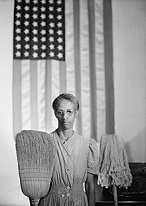

In 1937 Fort Scott, Kan.-born Gordon Roger Alexander Buchanan Parks (1912-2006) takes up photography after buying his first camera in a Seattle, Wash. pawnshop, moving to Chicago, Ill. in 1940 and joining the U.S. Farm Security Admin. in 1941, where he pub. the photo American Gothic, Washington, D.C., a black comment on Grant Wood's "American Gothic"; he goes on to become a filmmaker, the first African-Am. to produce and direct major motion pictures, incl. Shaft (1971), founding the Blaxploitation Genre.
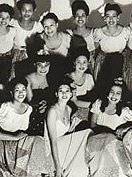
In 1937 the all-teenie swing-jazz band Internat. Sweethearts of Rhythm is formed at Piney Woods Country Life School in Miss., going on to relocate to Arlington, Va. and recruit adult Asian, Black, Caucasian, Indian, Latina, and Puerto Rican members, becoming the first integrated all-women's band in the U.S., going on to play at the Apollo Theatre in Harlem, N.Y., the Regal Theatre in Chicago, Ill., the Cotton Club in Cincinnati, Ohio et al. before touring U.S. troops in Europe in 1945, becoming the first black women to travel with the USO.
On Mar. 28, 1938 the U.S. Supreme (Hughes) Court rules 6-3 in New Negro Alliance v. Sanitary Grocery Co. that blacks have the right to organize a boycott to protest discriminatory hiring practices.

On June 22, 1938 two years after losing to him, and one year after winning the heavyweight boxing title, black U.S. boxer Joe Louis (1914-81) stuns white German boxer Max Schmeling (1905-2005) with a round 1 KO (2 min. 4 sec.) at Yankee Stadium, scoring an ideological as well as physical V for the U.S. over Nazi Germany while half of the pop. of the U.S. tunes in - tune in and find why life in Berlin can be a drag?

On June 30, 1938 African-Am. anti-Semitic Islam convert Sufi Abdul Hamid (Eugene Brown) (b. 1903), known as the Black Hitler for boycotting and picketing mainly Jewish white-owned businesses in Harlem, N.Y. to pressure them into hiring his black union members, and who likes to wear a mustache, Nazi-style military shirt, gold-lined cape, purple turban, and a dagger in his belt dies when his plane runs out of fuel and crashes.

On Nov. 3, 1938 Crystal Bird Fauset (nee Crystal Dreda Bird) (1894-1965) becomes the first African-Am. woman to be elected to a state legislature (Penn.).


On Dec. 12, 1938 the U.S. Supreme Court rules 6-2 in Missouri ex rel. Gaines v. Canada that rejection of African-Am. applicant Lloyd Gaines by the all-white U. of Mo. Law School violates equal protection under the law as mandated by the 14th Amendment because there is no black law school in Mo.; white racist justice (1914-41) James Clark McReynolds (1862-1946) stinks himself up in court by swiveling his chair and facing the wall while black atty. ("the Man Who Broke Jim Crow") Charles Hamilton Houston (1895-1950) is arguing his case, and becomes one of the two dissenters, along with Pierce Butler; too bad, Lloyd Gaines disppears and never attends the U. of Mo.
In 1938 future secy.-gen. #1 of the Arab League (1945-52) Abdul Rahman Hassan Azzam Pasha (1893-1976) pub. The Hero or Heroes; or, The Most Prominent Attribute of the Prophet Muhammad, which touts Muhammad for combining thought with action and claims that Islam is incompatible with fanatical attachment to "tribe, nation, color, language or culture"; after reading it, Malcolm X decides to ditch the black racist Nation of Islam and convert to traditional Sunni Islam.

On Jan. 7, 1939 African-Am. singer Marian Anderson (1897-1993) becomes the first African-Am. to sing at the Met as Ulrica in Verdi's "Un ballo in maschera"; in Feb. she is banned from singing at Constitution Hall in Washington, D.C. because of her skin color by the lily-white Daughters of the Am. Rev. (DAR); a protest group led by First Lady Eleanor Roosevelt (who resigns) arranges for a separate concert at the Lincoln Memorial on Apr. 9 (Easter Sun.) for an audience of 75K - singing the death knell to a pure white world?

In Mar. 1939 blonde Tenn.-born Jewish-Am. singer Dinah (Frances Rose) Shore (1916-94) debuts on CBS Radio with Ben Bernie's Orchestra, then moves to NBC Radio next year on "The Chamber Music Society of Lower Basin Street", singing Dixieland and blues songs, featuring her starting a fire by rubbing two notes together, after which Eddie Cantor signs her for his radio show in 1940, and she gets her own radio show in 1943, branching into acting and USO work during WWII; too bad, something about her odd facial features, incl. big lips and Southern drawl causes racist rumors that she's hiding African blood, although it might actually be ignorance of her Russian Jewish descent combined with the Old South slave name Dinah making people think her mammie's black?; when she goes out with the much younger horndog Burt Reynolds from Jawjah in the 1970s, that cinches it? :)



On Sept. 1, 1939 - Sept. 2, 1945 the horrific $3.5T World War II resulted in 24M military and 49M civilian deaths, and featured the low point of the Jewish Holocaust (Shoah) by the German Nazis, I guess it was the Jews' fault for not ransoming themselves to go to Israel before they could round them up for the camps. The whole experience turned Jews from lovers into fighters, ramping up the Zionist movement with full world sympathy and support by new world superpower U.S., which had its own guilt trip because on Nov. 24, 1942 Budapest-born Am. Zionist leader Rabbi Stephen Samuel Wise (1874-1949) announced in a press conference in Washington, D.C. that he was authorized by the U.S. State Dept. to confirm that the Nazis had murdered 2M Jews as part of a plan to exterminate all Jews in Europe; too bad, the nat. newspapers didn't consider it front page news, and the U.S. govt. did nada. After the war ended and Americans toured the concentration camps in horror, Polish-born Jewish scholar Raphael Lemkin (1900-59), who single-handedly led an unsuccessful campaign to get the League of Nations to give internat. protections against genocide starting in 1933 finally got what he wanted after his own people got it, namely the Dec. 9, 1948 U.N. Convention on the Prevention and Punishment of the Crime of Genocide (Gen. Assembly Resolution 260), which didn't come in force until Jan. 12, 1951, and which the U.S. still didn't ratify until 1988.


On Oct. 25, 1940 black officer Benjamin Oliver Davis Sr. (1877-1970) becomes a brig. gen. in the U.S. Army, becoming the first African-Am. U.S. army gen.; his son Capt. Benjamin Oliver Davis Jr. (1912-2002) goes on to become one of the first black officers in the Tuskegee Airmen in Mar. 1942.

On Nov. 12, 1940 the U.S. Supreme Court rules in Hansberry v. Lee that a racially-restrictive real estate covenant in the Washington Park subdiv. of Chicago, Ill. covering Carl Augustus Hansberry (1895-1946), father of writer Lorraine Vivian Hansberry (1930-65) is invalid, allowing them to move in even though they are treated as pariahs, causing Lorraine to write "A Raisin in the Sun" (1959); on May 3, 1948 they rule in Shelley v. Kraemer (after attys. Thurgood Marshall and Loren Miller argue before the court) that such covenants can only be enforced by state actions, which are barred by the Equal Protection Clause of the 14th Amendment. On Mar. 11, 1959 Hansberry debuts her play A Raisin in the Sun at the Ethel Barrymore Theater in New York City, becoming the first Broadway play written by a black playwright.

In 1940 the Rapp-Coudbert Committee in N.Y. is established (until 1942) to rapp-out coudbert, er, root-out Communist influence in the public education system, ending with the dismissal of 60+ instructors and administrators at CCNY incl. historian Jack Donald Foner (1910-99), who doesn't work in academia again until 1969, his crime being devoting too much attention to African-Am. history; in 1979 the N.Y. State Board of Higher Ed. apologizes to the victims.

In 1940 African-Am. chemist Percy Lavon Julian (1899-1975) of Glidden Co. begins manufacturing human sex hormones (progesterone, estrogen, testosterone) from soybeans, followed by cortisone in 1949, dramatically increasing the supply and reducing the cost; too bad, white racists dynamite his home in Oak Park, Ill. on June 12, 1951.


On Mar. 1, 1940 Miss.-born Richard Wright (1908-60) pub. Native Son, about black Bigger Thomas, who kills his white sweetheart, becoming the first Book-of-the-Month Club selection by an African-Am. (next is Toni Morrison's "Song of Solomon" in 1977). In 1955 James Baldwin (1924-87), who got fed up and moved to Paris in 1948 pub. Notes of a Native Son, which disses Richard Wright's "Native Son" for portraying Bigger Thomas as an angry black man and stigmatizing all black men. Baldwin's first novel (1953) Go Tell It On the Mountain, written in Paris is about a day in the life of congregation members of Harlem's storefront Temple of Fire.

On Dec. 7, 1941 during the Japanese attack at Pearl Harbor in Hawaii, Doris "Dorie" Miller (1919-43) of the battleship USS West Virginia becomes a hero after he takes the place of a dead machine-gun operator and shoots down four Japanese airplanes sans training, receiving a Navy Cross; he is then promoted, er, assigned to the aircraft carrier Liscome Bay as a steward until a Jap sub sinks it on Nov. 24, 1943.
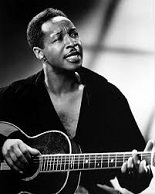
In 1941 Greenville, S.C.-born blues singer Joshua Daniel "Josh" White (1914-69), known for his civil rights songs becomes the first black singer to give a command White House performance to his good friend FDR, going on to become the first black star in Hollywood films and on Broadway, first to have a million-selling record ("One Meatball", 1944), and first to make a solo concert tour of the U.S. (1945).
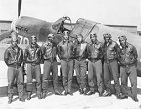
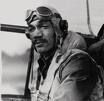
In 1942 after WWI Army testing reports that claim that blacks aren't mentally or physically up to it are questioned, the Tuskegee Inst. in Ala. begins training nig, er, ape, black pilots for WWII, resulting in the all-black (segregated) squadrons of the 450 Tuskegee Airmen, who train at Moton Field in Ala. (built 1940-2); Lt. Col. Lee Andrew Archer (1919-2010) becomes their only confirmed ace, with 4-1/2 kills; the local white pop. claims that they're ruining the neighborhood and lowering property values, petitioning Washington, D.C. in vain; the first class graduates on Mar. 6, 1942; in July 1942 enough graduate to comprise the 99th Fighter Squadron of red-tailed P-51s; they become the first squadron never to lose a bomber they're escorting.

On Jan. 10, 1943 the America First Party is founded by anti-Semitic white supremacist Christian preacher Gerald L.K. Smith (1898-1976), who runs in the 1944 U.S. Pres. Election and gets 1,781 votes (1,530 in Mich., 281 in Tex.); in 1948 he gets 48 votes, and in 1956 he is down to 8 write-in votes from Calif.; in the 1950s and 1960s he is the leader of the hardcore white supremacist anti-Semitic movement in the U.S.
On Aug. 1, 1943 a race riot in Harlem, N.Y. starts after a black soldier is shot by police and rumors spread that he is killed, causing rioting and looting, resulting in 500 arrests and 500 injured.
On Apr. 3, 1944 the U.S. Supreme (Stone) Court rules 7-1 in Smith v. Allwright that states may not have whites-only primaries, but most open them to voters of all races; Justice Owen J. Roberts is the lone dissenter, siding with the state of Tex., which claims that the Dem. Party is a private org. that can set its own membership rules; the case inspires Fifth Ward resident Barbara Jordan to go into politics.
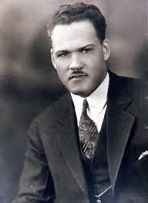

On Apr. 25, 1944 the United Negro College Fund (UNCF) is founded in Washington, D.C. by Tuskegee U. pres. (1935-53) Frederick Douglass Patterson (1901-88), Mary McLeod Bethune (1875-1955) et al.; by 2005 it supports 65K students in 900 educational institutions with $113M in grants and scholarships.


Simmering white racism literally explodes in Port Chicago? On July 17, 1944 (10:19 p.m.) the Port Chicago Disaster in Port Chicago, Calif. 30 mi. NE of San Francisco sees the ammo ship SS E.A. Bryan, loaded with 4.6K tons of cluster bombs, depth charges and 40mm shells blow up, taking the Quinalt Victory with it; 320 are killed and 390 are injured, mostly black sailors; a Navy court rules that it is the fault of "rough handling" of ammo crates by the black sailors who are forced to do the loading without training, and not the fault of their white crackers, er, officers, who taunt them to do it faster (so they can get back to the officer's club?); 3 wks. later, after being made to clean up the pier and collect body parts, the black sailors are ordered back to work, while the white officers get 30-day vacations, and 258 of 328 refuse, causing the Navy to lock them up in a barge in San Pablo Bay outfitted to hold only 75, and white Rear Adm. Carleton H. Wright (1892-1970) to threaten them with mutiny charges if they don't go to work, causing most to back down, but 50 cool dudes still refuse, and are put on the largest mass-mutiny trial in U.S. Navy history, and after a 1-mo. trial and 80-min. deliberation by white officers all are found guilty and sentenced to 15 years (the other 208 are given 90 days and bad conduct discharges); after appeals by NAACP chief counsel Thurgood Marshall (1908-93) and Eleanor Roosevelt they are released in 1946; the exposure embarrasses the Navy into initiating desegregation, bringing in white sailors to load ammo for the first time.

On Nov. 7, 1944 after a 4-hour tour of New York City in an open car during a chilly Oct. rain supposedly proves that his health is holding, Franklin Delano Roosevelt wins the 1944 U.S. Pres. Election, (his 4th straight), carrying 36 states; of the 56.0% of the electorate who vote for pres., FDR gets 25.6M (53.4%) popular and 432 electoral votes to Dewey's 22.0M (45.9%) popular and 99 electoral votes; the Dems. continue their lock on both houses of Congress; Dem. Rev. Adam Clayton Powell Jr. (1908-72) (former pastor of Abyssinian Baptist Church in Harlem, N.Y.) is elected to the House of Reps. (22nd congressional district, incl. Harlem), becoming the first black congressman from N.Y. and the first from a Northern state (other than Ill.) in the post-Reconstruction Era; knowing this is his big chance, he takes on the white establishment, dining in the whites-only House restaurant, challenging the use of the word "nigger" in sessions of Congress, and working his way into position to pass a slew of legislation desegregating U.S. society, making lynching a federal crime et al.

In 1944 Swedish sociologist Karl Gunnar Myrdal (1898-1987) pub. the bestseller (100K copies) An American Dilemma: The Negro Problem and Modern Democracy, detailing obstacles faced by blacks in U.S. society, influencing the 1954 Brown v. Board of Education decision; "White prejudice and discrimination keep the Negro low in standards of living, health, education, manners and morals. This, in its turn, gives support to white prejudice. White prejudice and Negro standards thus mutually 'cause' each other"; "Education has in America's whole history been the major hope for improving the individual and society"; "Education means an assimilation of white American culture. It decreases the dissimilarity of the Negroes from other Americans"; "The big majority of Americans, who are comparatively well off, have developed an ability to have enclaves of people living in the greatest misery without almost noticing them."

In 1944 cool brave white "tortured Southern liberal" Lillian Smith (1897-1966) pub. the bestseller Strange Fruit, about an interracial relationship ending in a lynching of the black buck, calling down segregation; banned in Detroit and Boston (making it more popular?), it sells 3M copies and makes her an anti-segregationist spokesperson.
On Sept. 18, 1945 1K white children walk out of schools in Gary, Ind. to protest integration - Hitler or no Hitler, it's still our show?

In 1945 Jefferson City, Mo.-born Chester Bomar Himes (1909-84) pub. If He Hollers Let Him Go, about a black WWII LA shipyard worker struggling against racism. In 1947 he pub.The Lonely Crusade; black man becomes union organizer in WWII. In 1952 he pub. Cast the First Stone. In 1954 he pub. The Third Generation; early 20th cent. African-Am. society. In 1955 he pub. The End of a Primitive; a black writer and a white party girl hook up and slide toward addiction. In 1965 he pub. Cotton Comes to Harlem; Ed "Coffin" Jones and "Gravedigger" Johnson take on scheming

Blacks have double johnsons? On Nov. 1, 1945 Arkansas City, Ark.-born John Harold Johnson (1918-2005) of Chicago, Ill. pub. the first issue of Ebony mag., with a first press run of 25K, countering the stereotypical portrayal of blacks in white-owned media; by 1997 it has a monthly circ. of 1.9M; he receives the Pres. Medal of Freedom in 1996. On Nov. 1, 1951 Johnson begins pub. the weekly Jet mag.; he goes on to become the first African-Am. to be listed on Forbes 400 in 1982.
On Feb. 25-26, 1946 (night) a race riot in Columbia, Tenn. starts after a fist fight between a black veteran and a white shopkeeper, killing two and wounding 10.
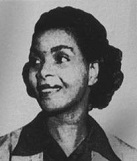

On June 3, 1946 the U.S. Supreme Court rules 6-1 in Morgan v. Virginia to strike down Va.'s segregation of interstate bus passengers, based on the case of Irene Amos Morgan (Irene Morgan Kirkaldy) (1917-2007); ACLU atty. Thurgood Marshall skips relying upon the Equal Protection Clause of the 14th Amendment and uses the Interstate Commerce Clause to win, which causes the court to reverse a string of decisions dating back to 1878; the case did not comment on a state's right to segregate whites from blacks; next Apr. 9-23 16 Congress of Racial Equality (CORE) activists go on the Journey of Reconciliation, riding on interstate Greyhound and Trailways buses through Va. to N.C., where police arrest Bayard Rustin (1912-87), who is convicted of violating N.C. segregation laws and given 22 days on a chain gang; in all, 24 tests result in 12 arrests and mob violence, inspiring the 1961 Freedom Rides.


On Nov. 12, 1946 Walt Disney's Song of the South (RKO Radio Pictures) (dir. by Harve Foster and Wilfred Jackson) debuts, based on the Joel Chandler Harris Uncle Remus stories, becoming Disney's first film with some live action, starring James Baskett (1904-48) as Uncle Remus, who is awarded an honorary Oscar; also stars child actor Bobby Driscoll (1937-68) as Johnny; the first African-Am. best actor Oscar winner is Sidney Poitier in 1963; incl. the (racially degrading?) hit song Zip-a-Dee-Doo-Dah; too bad, it later draws the ire of the PC police.

In 1946 Ada Lois Sipuel Fisher (1924-95) applies to the U. of Okla. Law School, and is denied because of race, causing the NAACP led by Thurgood Marshall to take her case to the U.S. Supreme Court, which rules unanimously on Jan. 12, 1948 in Sipuel v. Board of Regents of Univ. of Okla. that Okla. must provide instruction for blacks equal to that of whites, serving as a precursor of Brown v. Board of Education; after Okla. creates the Langston U. Law School in Tulsa, another lawsuit proves that it is not equal but inferior, causing Sipuel to be admitted to the U. of Okla. Law School on June 18, 1949; too bad, she has to sit in a special chair marked "Colored" that is chained off from the rest of the class, and ditto in the lunchroom, which doesn't stop white students from crawling under the chain to eat with her and hundreds of people from donating funds to pay her way; she graduates in 1951 and begins practicing law in Chickasha, Okla. in 1952; in 1992 Okla. Gov. David Walters appoints her to the U. of Okla. board of regents.
In 1946 Malcolm Little (later Malcolm X) (1925-65), son of a Christian preacher is arrested for robbery, and spends 6 years in prison, where he is introduced to Islam, joining the Nation of Islam in 1947.


In 1946 Augusta, Ga.-born Frank Garvin Yerby (1916-91) pub. The Foxes of Harrow, which becomes the first bestelling novel by an African-Am., and first book by an African-Am. purchased by Hollywood. In 1946 Old Saybrook, Conn.-born Ann Petry (1908-97) pub. The Street, which becomes the first million-selling novel by a black woman writer.




The Great American Color Line is broken with a baseball bat? On Apr. 10, 1947 black Montreal Royals infielder Jack Roosevelt "Jackie" Robinson (1919-72) receives a call from Brooklyn Dodgers. pres. Wesley Branch Rickey (1881-1965) in his room at the McAlpin Hotel across the street from Macy's on 34th St. in Manhattan, offering him a ML min. $5K contract; on Apr. 15 he steps on Ebbetts Field as #42 of the blue-white uniformed Brooklyn Dodgers, breaking ML baseball's color line; known for a weak throwing arm and a shaky ankle, he goes 0 for 3 amid taunts and threats by fans and players, incl. Phillies mgr. Ben Chapman (1908-93); the St. Louis Cardinals almost boycott him; his debut bat is not saved; he goes on to win the Rookie of the Year award, pump his team up to eventually win a WS, and become the first black All-American - soon black men will be batting at white women's home plates, eh kukies? Lawrence Eugene "Larry" Doby (1923-2003) joins the Cleveland Indians on July 5, becoming the 2nd black player in the ML and the 1st in the AL; he has a .301 avg. in 1948, helping Cleveland win the pennant, and makes the All-Star team six years in a row. On July 3, 1962 Jackie Robinson (1919-72) becomes the first African-Am. to be inducted into the Nat. Baseball Hall of Fame.

In 1947 West Chester, Penn.-born activist Bayard Rustin (1912-87) organizes the first Freedom Ride (Journey of Reconciliation) to challenge racial segregation on interstate busing, getting put on a chain gang for it, and going on to mentor and back up Martin Luther King Jr. in the Southern Christian Leadership Conference while riding on the er, back of the civil rights bus because of his homosexuality.









A big day for Bible thumpers and Millennium Feverists? "Thus says the Lord God: O my people, I will open your graves and have you rise from them, and bring you back to the land of Israel." (Ezekiel 37:12) On May 14, 1948 (midnight) the Jewish Nat. Council in Tel Aviv, Palestine proclaims the formation of the new Jewish State of Israel, with an Unwritten Israeli Constitution and a unicameral Knesset (Heb. "assembly"); "We offer peace and amity to all the neighboring states and their peoples, and invite them to cooperate with the independent Jewish nation for the common good of all. The State of Israel is ready to contribute its full share to the peaceful progress and development of the Middle East" (Proclamation of the State of Israel); the U.S. recognizes it 11 min. later, but Pres. Truman refuses to call it a Jewish state; on May 15 the British Palestine Mandate ends and the British withdraw, leading to the 1948 Arab-Israeli War with Arab states as Lebanese, Syrian, Iraqi, Egyptian, and Transjordanian troops, supported by Saudi and Yemenite troops attack, screaming "Allahu Akbar", "Jihad", and "Idbah al-Yahud" (slaughter the Jews), showing that it isn't a nationalist but a religious struggle, and sorry, but Islam will never accept the Jewish state of Israel; on May 15 Egyptian Arab League secy.-gen. #1 (1945-52) Abdul Rahman Hassan Azzam Pasha (1893-1976) utters the soundbyte "This will be a war of extermination and a momentous massacre"; on May 14 David Ben-Gurion (1886-1973) becomes PM #1 of Israel (until Jan. 24, 1954); on May 17 the Soviet Union recognizes Israel; Jordanian King Abdullah Ibn Hussein's British-trained Arab League under British Lt. Gen. Sir John Bagot Glubb (1897-1986) (AKA Glubb Pasha) seizes control of Judea and Samaria, along with the Jewish Quarter in the Old City of Jerusalem on May 28 and annexes them, cutting off access by Jews to the Western Wall until 1967, going on to destroy or desecrate 50+ synagogues in the Jewish Quarter; only Great Britain and Pakistan recognize the annexation; Egypt occupies (but doesn't annex) Gaza; U.S. aircraft manufacturer Adolf "Al" Schwimmer (1917-2011) violates U.S. laws to smuggle surplus aircraft and found the Israeli air force, is convicted in 1950 of violating the U.S. Neutrality Act, and becomes pres. of Israel Aircraft Industries until 1978, finally receiving a pardon by Pres. Bill Clinton in 2000; in June the U.N. Truce Supervision Org. (UNTSO) (the first U.N. peacekeeping force) is established, with HQ in Jerusalem to oversee the truce; Golda Meir (1898-1978) becomes the Israel ambassador to the U.N; Ha Tikva(h) becomes the Israeli nat. anthem; the knee-jerk reaction of Arabs is to expel all Jews from Arab cities from Casablanca to Baghdad; the Christian pop. of Jordanian Jerusalem falls from 25K to 11K by 1967 as restrictive laws are placed on them. On May 20 Swedish diplomat Count Folke Bernadotte (1895-1948) is appointed as the first U.N. mediator in Palestine. On June 28 Count Folke Bernadotte makes the first formal peace proposal to the Arabs and Israelis, proposing that Palestinian and Transjordan form a "union, comprising two members, one Arab and one Jewish"; after that is rejected, he makes a 2nd proposal on Sept. 16 for two independent states; too bad, on Sept. 17 (Fri.) he is assassinated in Jerusalem by the Zionist Lehi terrorist group (AKA the Stern Gang), who wrongly believed that the Israeli govt. was about to accept the proposal; on Sept. 18 the U.N. Security Council condemns the killing as "a cowardly act which appears to have been committed by a criminal group of terrorists", after which the Lehi group is disarmed and its members arrested, but nobody is ever charged with the killing, causing Sweden to have frosty relations with Israel, even though it recognizes Israel in 1950; in Sept. the Israeli govt. also dissolves the Irgun Zionist terrorist org. (founded 1931), whose members go on to found the right-wing Herut (Heb. "freedom") Party, predecessor of the Likud Party; Bernadotte is succeeded as U.N. mediator #2 by African-Am. U.S. diplomat Ralph Johnson Bunche (1904-71). On Dec. 29, 1950 Bunche becomes the first African-Am. to win the Nobel Peace Prize for working out an armistice agreement between the Arab nations and Israel in 1949 - panties in a bunch jokes here?

On Aug. 11, 1948 the sitcom The Laytons debuts on DuMont Network for 10 episodes (until Oct. 13, 1948), starring Amanda E. Randolph (1896-1967), who becomes the first African-Am. performer to star in a regular role in a U.S. network TV series.
On Dec. 9, 1948 the state of Ga. celebrates the centenary of the birth of "Uncle Remus" author Joel Chandler Harris (1848-1908), and the U.S. govt. issues a postage stamp in his honor. In 1948 John E. Rudder of Paducah, Ky. becomes the first black U.S. Marine Corps officer to be commissioned.
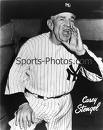
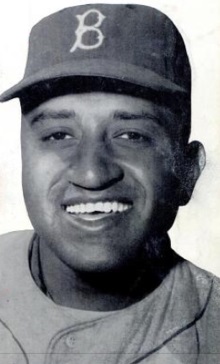

In late Feb. 1949 Louis Armstrong (1901-71), who left New Orleans in 1922 returns for the biggest Mardi Gras ever, achieving his lifelong ambition of being made King Zulu (in black face, throwing coconuts), and receiving nat. publicity, although he is disturbed by the appearance of segregation and has to stay in a Jim Crow hotel, causing him to vow never to return, saying "Honestly, they treat me better all over the world than they do in my hometown." On July 12, 1949 Lawrence Eugene "Larry" Doby (1923-2003), Jack Roosevelt "Jackie" Robinson (1919-72), Roy "Campy" Campanella (1921-93), and Donald "Don" "Newk" Newcombe (1926-) become the first African-Ams. to play in an Am. All-Star baseball game. On Oct. 5-9, 1949 the New York Yankees (AL) defeat the Brooklyn Dodgers (NL) 4-1 to win the Forth-Sixth (46th) World Series; on Oct. 9 (Game 5) the lights are turned on in Ebbets Field, becoming the first WS game finished under artificial lights; under new mgr. (1949-60) "the Old Perfessor" Charles Dillon "Casey" Stengel (1890-1975) the Yankees win the next four series for a fivepeat (last in 1953); after winning rookie of the year, Donald "Don" "Newk" Newcombe (1926-) of the Brooklyn Dodgers becomes the first African-Am. pitcher to start a WS game.

In 1949 Topeka, Kan.-born Chicago, Ill.-raised Gwendolyn Elizabeth Brooks (1917-2000) pub. Annie Allen, which incl. "Notes from the Childhood and the Girlhood", "The Anniad", "Appendix to the Anniad", and "The Womanhood", going on to become the first African-Am. to receive a Pulitzer Prize (Poetry) in 1985. In 1960 she pub. The Bean Eaters; incl. We Real Cool; "We real cool. We/ Left school. We/ Lurk Late. We/ Strike straight. We/ Sing sin. We/ Thin gin. We/ Jazz June. We/ Die soon." In 1968 she pub. In the Mecca; a tenement mother's search for a lost child, with paeons for Medgar Evers and Malcolm X. In 1969 she pub. Riot, about the 1968 Chicago riots and the assassination of MLK Jr.; first in a series on black pride using ordinary language (1969-75), pub. by Dudley Randall's Broadside Press. In 1970 she pub. Family Pictures, which incl. The Life of Lincoln West. In 1971 she pub. Aloneness. In 1972 she pub. the autobio. Report from Part One; "I — who have 'gone the gamut' from an almost angry rejection of my dark skin by some of my brainwashed brothers and sisters to a surprised queenhood in the new Black sun — am qualified to enter at least the kindergarten of new consciousness now. New consciousness and trudge-toward-progress. I have hopes for myself... I know now that I am essentially an essential African, in occupancy here because of an indeed 'peculiar' institution... I know that Black fellow-feeling must be the Black man's encyclopedic Primer. I know that the Black-and-white integration concept, which in the mind of some beaming early saint was a dainty spinning dream, has wound down to farce... I know that the Black emphasis must be not against white but FOR Black... In the Conference-That-Counts, whose date may be 1980 or 2080 (woe betide the Fabric of Man if it is 2080), there will be no looking up nor looking down." In 1975 she pub. Beckonings. In 1985-6 she becomes U.S. poet laureate #30 (first black woman).
On June 5, 1950 the U.S. Supreme (Vinson) Court rules 8-0 in Henderson v. U.S. to abolish segregation in railroad dining cars, along with any undue or unreasonable prejudice or disadvantage based on race; Justice William O. Douglas doesn't vote.
On June 5, 1950 the U.S. Supreme (Vinson) Court rules unanimously in Sweatt v. Painter to reverse the "separate but equal" doctrine of racial segregation for law schools.



On June 11, 1950 The Hazel Scott Show debuts on the DuMont TV Network, starring Trinidad-born jazz singer Hazel Scott (1920-81), who becomes the first African-Am. woman with her own TV show; too bad, she mouths off, dissing McCarthyism and racial segregation, and the show is cancelled after the Sept. 29 show. On Dec. 4, 1950 the U. of Tenn. defies court rulings and rejects five African-Am. applicants. In 1950 Althea Gibson (1927-2003) becomes the first African-Am. to compete in the Forest Hill, N.Y. tennis championships, and the first to compete at Wimbledon next year; in 1957 she becomes the first African-Am. tennis player to win the Wimbledon singles title, defeating fellow Am. Darlene Hard 6-3, 6-2 on July 16; in 1957 she also wins the U.S. Open women's singles title. In 1950 Alice Childress (1920-94) debuts her play Florence in New York City, becoming the first African-Am. woman to have a play produced professionally; old black Miss Whitney has a premonition that her daughter Florence will become a success after meeting a racist white actress in a railway station.


On July 18, 1950 UNESCO releases The Race Question, written by English-born Jewish-Am. anthropologist Ashley Montagu (1905-99), black Am. sociologist Edward Franklin Frazier (1894-1962) et al., questioning the validity of race as a biological concept and suggesting the substitution of "ethnic group".
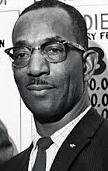
In 1950 the Am. Bowling Congress (ABC) opens membership to blacks after pressure from Cleveland, Ohio-born Nat. Negro Bowling Assoc. (NNBA) pioneer J. Elmer Reed (1903-83), who becomes a member of the ABC board of dirs.; in 1951 the Women's Internat. Bowling Congress (WIBC) does ditto; in Mar. 1978 Reed becomes the first African-Am. bowler to be inducted into the ABC Hall of Fame.
On May 23, 1951 after student strikes at the all-black Robert Russa Moton H.S. (founded 1939) in Farmville, Va. near Longwood U., which was deliberately underfunded by the lily white school board, who forced them into "tar-paper shacks", the NAACP files the lawsuit Davis v. County School Board of Prince Edward County; after the state courts reject the lawsuit, they appeal to the U.S. Supreme Court, and it is incorporated into Brown v. Board of Education, causing the h.s. to become known as "the student birthplace of the Am. Civil Rights Movement".
On May 24, 1951 racial segregation in restaurants in Washington, D.C. is ruled illegal.
On July 14, 1951 the George Washington Carver Nat. Monument in Diamond, Mo. is dedicated, becoming the first to honor an African-Am.

On Oct. 4, 1951 African-Am. cancer patient Henrietta Lacks (b. 1920) dies of cervical cancer, and her cancer cells are discovered to be virtually immortal, causing them to be used in medical research under the name HeLa, incl. by Jonas Salk to develop his polio vaccine; too bad, she never consents, and her family isn't told for 20 years.

On Oct. 20, 1951 the Johnny Bright Incident in Stillwater, Okla. sees African-Am. Drake U. football player John D. "Johnny" Bright (1930-83) violently assaulted on the field after a play by white Okla. State U. player Wilbanks Smith, breaking his jaw; Drake loses 27-14; Smith is never disciplined.

In 1951 Vanndale, Ark.-born white John Hopkins U. historian Comer Vann Woodward (1908-99), a disciple of Charles Austin Beard who hated racism but loved the South pub. Origins of the New South, 1877-1913, which disputes the Lost Cause Theory and the New South Creed, painting a sordid story; "The durability of Origins of the New South is not a result of its ennobling and uplifting message. It is the story of the decay and decline of the aristocracy, the suffering and betrayal of the poor whites, and the rise and transformation of a middle class. It is not a happy story. The Redeemers are revealed to be as venal as the carpetbaggers. The declining aristocracy are ineffectual and money hungry, and in the last analysis they subordinated the values of their political and social heritage in order to maintain control over the black population. The poor whites suffered from strange malignancies of racism and conspiracy-mindedness, and the rising middle class was timid and self-interested even in its reform movement. The most sympathetic characters in the whole sordid affair are simply those who are too powerless to be blamed for their actions." (Sheldon Hackney) In 1951 he also pub. Reunion and Reaction: The Compromise of 1877 and the End of Reconstruction (rev. ed. 1991). In Feb. 1955 he pub. The Strange Career of Jim Crow (2nd ed. Aug. 1965; 3rd ed. 1974), a classic study of segregation in the U.S. based on his Richards Lectures at the U. of Va. soon after the spring 1954 U.S. Supreme Court Brown v. Board of Education decision, about how the 1890s saw Southerners "capitulate to racism" to enact Jim Crow laws; "The historical Bible of the civil rights movement." (Martin Luther King Jr.) In 1955 he also pub. The Burden of Southern History (essays); 3rd ed. 1993; incl. "The Irony of Southern History". In 1961 he pub. The Age of Reinterpretation. In 1981 he pub. Mary Chestnut's Civil War (Pulitzer Prize), about a Southern aristocrat watching the Confederacy go down. No suprise, he ends up turning against affirmative action, black power, feminism, multiculturalism, and political correctness, sliding from left to right and fighting a 1969 proposal at the Am. Historical Assoc. by New Left historians to politicize it.

In 1952 Oklahoma City, Okla.-born Ralph Waldo Ellison (1914-94) pub. his first novel Invisible Man; "I am an invisible man. No, I am not a spook like those who haunted Edgar Allan Poe; nor am I one of your Hollywood-movie ectoplasms. I am a man of substance, of flesh and bone, fiber and liquids - and I might even be said to possess a mind. I am invisible, understand, simply because other people refuse to see me... I can hear you say, 'What a horrible, irresponsible bastard!" And you're right... But to whom can I be responsible, when you refuse to see me?" In 1960 he pub. The Man with Nine Lives (The Sound of a Scythe).

On Mar. 25, 1953 the 27th Academy Awards awards the best picture Oscar for 1954 to Columbia's (Horizon-American Corp.) On the Waterfront, along with best actor to Marlon Brando, best supporting actress to Eva Marie Saint, and best dir. to Elia Kazan, which he claims vindicates him for his 1952 rat-finking to HUAC; best actress goes to Grace Kelly for The Country Girl, and best supporting actor to Edmond O'Brien for The Barefoot Contessa; Dorothy Jean Dandridge (1922-65) becomes the first black nominated for a best actress Oscar for Carmen Jones, and during the awards ceremony Brando kisses her, shocking many attendees.

In 1953 a lawsuit to end discrimination in public accommodations in Washington, D.C. is won by a committee led by African-Am. leader (1896 co-founder of the Nat. Assoc. of Colored Women) Mary Church Terrell (1863-1954).
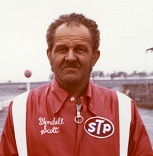
In 1953 Danville, Va.-born Wendell Oliver Scott (1921-90) becomes the first African-Am. driver to compete in NASCAR races; after debuting in the Grand Nat. Series in Spartanburg, S.C. on Mar. 4, 1961, he wins his first race on Dec. 1, 1963 at Speedway Park in Jacksonville, Fla., becoming the first African-Am. winner.
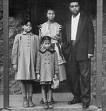
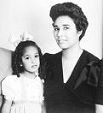



Let's skip the genealogies and go straight to the war? The greatest moment in Supreme Court history since the Dredd Scott decision of 1857, and the beginning of the Second Reconstruction of the Am. South (first in 1867)? On May 17, 1954 the U.S. Supreme (Warren) Court rules unanimously in Bolling v. Sharpe to desegregate the public schools of Washington, D.C.; meanwhile on May 17 after hearing arguments by NAACP counsel Thurgood Marshall (1908-93), the U.S. Supreme (Earl Warren) Court (which incl. three Southerners) rules unanimously 9-0 in Brown v. Board of Education of Topeka that "separate but equal" public schools are inherently unequal and therefore unconstitutional, citing the 14th Amendment to reverse the 1896 Plessy v. Ferguson decision, and ending "the long habit of deception and evasion" (Ralph Ellison); assoc. justice Robert Jackson leaves the hospital (heart attack) to be present; chief justice Earl Warren (in office for 6 mo.) begins at 12:52 p.m. and meanders until 1:20 without indicating the decision made (no advance copies given to the press), then says: "To separate [black kids] from others of similar age and qualifications solely because of their race generates a feeling of inferiority as to their status in the community that may affect their hearts and minds in a way never to be done... We conclude that in the field of public education the doctrine of 'separate but equal' has no place. Separate educational facilities are inherently unequal"; the term "integration" is never used; the Court then says it will withhold compliance instructions until its fall term, when all sides are to prepare arguments on whether the federal district courts or a special master (sorry, crackers?) should be in charge; 17 states and the District of Columbia require school segregation by law, and four other states permit it, affecting 12M school children; Ga. and S.C. go especially bonkers; 1924 Dem. vice-pres. candidate John William Davis (1873-1955), known for arguing the most (140) cases before the U.S. Supreme Court loses his last one trying to defend S.C.'s public school segregation laws; a Gallup poll following the decision finds that over half the country approves; Pres. Eisenhower repents his decision to appoint Warren to the court, saying it's "the biggest damnfool mistake I ever made", and adds "The fellow who tries to tell me that you can do these things by force is just plain nuts", but obeys the court and immediately desegregates all District of Columbia schools on Sept. 7, and goes further, ending segregation on all Navy bases; in Jan. 1953 he had already appointed Bostonian Lois H. Lippman (-1999) as the first black member of the White House secretarial staff, along with E. Frederic Morrow (1906-94) as his admin. asst., becoming the first black to hold an executive position at the White House; the whole thing was started in 1950 by black Topeka, Kan. schoolteacher Lucinda Wilson "Cindy" Todd (1903-96), who was angry because her daughter Nancy Jane Todd (b. 1941) couldn't play in a school concert, and by Oliver L. Brown, who wanted his 9-y.-o. daughter Linda Brown (b. 1943) to attend white Sumner Elementary School in Topeka; the nine justices are Warren, Douglas, Black, Frankfurter, Jackson, Clark, Minton, Burton, and Reed; by 1964 less than 10% of Southern black students attend white schools; Cleveland, Miss. starts a court battle that lasts until May 16, 2016.

In 1954 the album Odetta and Larry is released, launching the career of African-Am. singer Odetta Holmes (1930-2008), who goes on to become known as "the Voice of the Civil Rights Movement".

In 1954 after becoming an assoc. ed. of Ebony mag. in 1954 (senior ed. in 1958), Clarksdale, Miss.-born African-Am. social historian of U.S. race relations Lerone Bennett Jr. (1928-2018) pub. Thomas Jefferson's Negro Grandchildren; TJ's 38-year bed bunny slave Sally Hemings, with whom he fathered six children, four of whom survived into adulthood; denied by historians until a 1998 DNA study exposes his dirty bed linen. In 1962 he pub. Before the Mayflower: A History of Black America, 1619-1962. In 1964 he pub. What Manner of Man: A Biography of Martin Luther King; 3rd ed. 1968. In 1965 he pub. Confrontation: Black and White. In 1967 he pub. Black Power U.S.A.: The Human Side of Reconstruction, 1867-1877. In Jan. 1968 he pub. Was Abe Lincoln a White Supremacist?; in Ebony mag., which debunks the "mythology of the Great Emancipator", claiming that Lincoln wanted to keep the races separated "preferably with the Atlantic Ocean or some other large, deep body of water between them", and favored their deportation to South Am. or Africa, and wanted to "win the war without touching slavery", freeing slaves only in areas where he had no power; "The man's character, his way with words and his assassination, together with the psychological needs of a racist society, have obscured his contradictions under a mountain of myths." On May 31, 1968 he pub. Pioneers in Protest. In 1972 he pub. The Challenge of Blackness. On Feb. 1, 1975 he pub. The Shaping of Black America. In 1979 he pub. Wade in the Water: Great Moments in Black History. On Feb. 1, 2000 he pub. Forced into Glory: Abraham Lincoln's White Dream, which claims that the Great Emancipator was a white racist; "[The] basic idea of the book is simple: Everything you think you know about Lincoln and race is wrong. Every schoolchild, for example, knows the story of 'the great emancipator' who freed Negroes with a stroke of the pen out of the goodness of his heart. The real Lincoln... was a conservative politician who said repeatedly that he believed in white supremacy. Not only that: He opposed the basic principle of the Emancipation Proclamation until his death and was literally forced - Count Adam Gurowski said he was literally whipped - 'into the glory of having issued the Emancipation Proclamation,' which Lincoln drafted in such a way that it did not in and of itself free a single slave"; dissed by most historians.

In Feb. 1955 Am. soprano Mary Violet Leontyne Price (1927-) sings in a performance of Giacomo Puccini's "Tosca" on NBC-TV, becoming the first appearance by an African-Am. in a televised opera in the U.S., pissing-off several Southern affiliates, who cancel out; she goes on to become the first black female superstar at the Metropolitan Opera in New York City in 1961.

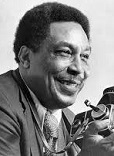
This is what it sounds like when the doves cry, Or, The 1954 Brown v. Board of Ed. Supreme Court Decision inflames racial hatred throughout the Southy South South Johnny Reb KKK South, and the good die young? On Aug. 28, 1955 two white men take visiting 14-y.-o. black Chicagoan Emmett Louis "Bobo" Till (b. 1941) from his uncle's Mississippi Delta home in the town of Money after being angered over his whistling at white woman Carolyn Bryant at her hubby Roy's store; in Aug. his mutilated body is found in the Tallahatchie River; his mother Mamie Till Mobley holds an open coffin funeral in Chicago which is viewed by 50K visitors, galvanizing opposition to segregation and Jim Crow; he is buried in Burr Oak Cemetery in Alsip, Ill.; Roy Bryant and his half-brother J.W. Milam are acquitted by an all-white jury, and later admit their guilt to Look mag., but can't be retried; a U.S. atty. charges them with kidnapping but a grand jury refuses to indict, causing the FBI to reluctantly close their file, but in June 2005 federal authorities unearth his casket in an effort to prosecute somebody, anybody before they all kick off scot-free; in 2017 Bryant admits that her story was false; Memphis, Tenn.-born Ernest Columbus Withers Sr. (1922-2007), one of the first African-Am. police officers in Memphis, Tenn., who turned photojournalist covers the murder trial, bringing nat. attention to Southern racial violence, going on to travel with MLK Jr. and cover the Montgomery Bus Boycott, the Sanitation Workers Strike, Negro League baseall, and Memphis blues and soul musicians; he was an FBI informant?
On Nov. 7, 1955 after African-Am. WAC Pvt. Sarah Keys is ordered to yield her seat to a white Marine in Roanoke Rapids, N.C. on Aug. 1, 1952, and arrested when she refuses, going to the Interstate Commerce Commission, they rule in Keys v Carolina Coach Co. to prohibit segregation in interstate buses; too bad, white supremacist commission chmn. J. Monroe Johnson blocks its implementation until the Freedom Riders case causes U.S. atty. gen. Robert F. Kennedy to send them a petition on May 29, 1961 to get with the program.

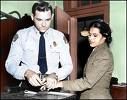


"Somewhere in the universe a gear in the machinery had shifted" (Eldridge Cleaver) as Rosa Parks and Martin Luther King Jr. arise to take on whitey in the Deep South, using whitey's network TV to get worldwide pressure on local conditions? On Dec. 1, 1955 (Thur.) (less than 100 days after the Emmett Tills affair) black seamstress (member of the NAACP since 1943) Rosa Louise McCauley Parks (1913-2005), who lives in the Cleveland Courts housing project parks her rosy butt and refuses to move to da back o' da bus in Montgomery, Ala. when it fills up and the bus driver James F. Blake (1912-2002) orders her to stand and let a white man sit; she is arrested at the next stop, charged with the misdemeanor of disobeying a bus driver's instructions, found guilty, and fined $14; NAACP pres. Edgar Nixon and employer Clifford Durr bail her out; her friends and neighbors distribute pamphlets calling for a 1-day boycott of all city transportation, which is a huge success as the 25K blacks in the city account for 75% of the bus passengers; black leaders step in and demand that blacks be treated equal with whites, and black bus drivers be hired; when they refuse, the Montgomery Bus Boycott, led by unknown 26-y.-o. Harvard-educated Dexter Avenue Baptist Church pastor Dr. Martin Luther King Jr. (1929-68) begins on Dec. 5, and lasts 381 days, almost bankrupting the city bus co. (ends Dec. 1956); Montgomery Mayor W.A. Gayle and the city commission ceremoniously join the local White Citizens' Council, and Gayle declares "We have pussyfooted around long enough... There seems to be a belief on the part of the Negroes that they have the white people hemmed in a corner and they are not going to give an inch until they can force the white people of the community to submit to their demands"; white families begin giving their cooks and handymen rides or pay their taxi fares, causing Gayle to accuse them of "fighting to destroy our social fabric just as much as the Negro radicals who are leading them"; in 1992 Parks says she didn't do it just because "my feet were hurting and I didn't know why I refused to stand up when they told me... the real reason of my not standing up was I felt that I had a right to be treated as any other passenger. We had endured that kind of treatment for too long". On Feb. 20, 1956 Rosa Parks along with 100 Montgomery, Ala. blacks are indicted for violating a local anti-boycott statute and booked at the police station, resulting in a famous booking photo which people mistake for the Dec. 1, 1955 bus arrest. On June 13, 1956 the U.S. District Court in Ala. rules in Browder v. Gayle that public bus segregation is unconstitutional. Alabama's stupidity causes segregation to be dealt a major blow? On Nov. 13, 1956 the U.S. Supreme Court upholds the Ala. District Court, ruling that segregation of buses and all public transportation is illegal, bringing the Montgomery Bus Boycott to a victorious end on Dec. 21 when the city of Montgomery actually obeys the law; Martin Luther King Jr. (1929-68), who had been arrested again in Nov. for running a business enterprise without a franchise (organizing a 200-vehicle carpool) is freed, saying, "We have been going to the back of the bus for so long that there is danger that we will instinctively go straight back there again and perpetuate segregation"; "I would be terribly disappointed if any of you go back to the buses bragging, 'We, the Negroes, won a victory over the white people'. If you do, our struggle will be lost all over the South. Go back with humility and meekness"; he then rides the bus himself, paying 15 cents, up 5 cents from the year before, and takes a front seat, at the end commenting, "It was a great ride"; on Dec. 21 a UPI photographer takes a staged picture of Rosa Parks and UPI reporter Nicholas C. Chriss (1928-90) sitting at the front of the bus in downtown Montgomery; the photo is later used as a poster, and people mistakenly believe the reporter is an Alabama segregationist because of the way he looks away from her, and mistakenly believe it was taken during the original incident, which was on an overcrowded bus; MLK Jr. and others take similar staged photos.

In 1955 baritone Robert McFerrin Sr. (1921-2006) becomes the first African-Am. male to be a principal artist with the Metropolitan Opera in New York City; he dubs Sidney Poitier's voice in the 1959 film version of "Porgy and Bess".
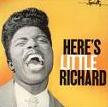
In 1955 pompadour-wearing Macon, Ga.-born Little Richard (Richard Wayne Penniman) (1932-) hits the U.S. charts with Tutti-Frutti (#17 in the U.S.) ("Awop-bop-aloop-bop, alop-bam-boom"), Long Tall Sally (#6 in the U.S.), and Slippin' and Slidin' (#33 in the U.S.), later claiming to invent rock and roll; he at least helped get white kids into it.
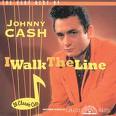
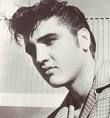
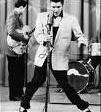
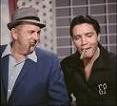


In 1955 after walking into Sun Records a year earlier and being told that his gospel songs were unmarketable, white baritone singer John R. "Johnny" Cash (1932-2003) (later known as "the Man in Black") released his first Sun recordings Hey Porter, and Cry! Cry! Cry! In Jan. 1956 Rockabilly (hillbilly rock) (a term clung to by whites to differentiate themselves from blacks) was launched with the release of three new versions of old songs by white rockers Elvis Presley ("Heartbreak Hotel"), Johnny Cash ("Folsom Prison Blues"), and Carl Perkins ("Blue Suede Shoes"), starting on Dec. 15, 1955 with Folsom Prison Blues (#32 in the U.S.), by Johnny Cash, followed on Jan. 1, 1956 by Blue Suede Shoes (#2 in the U.S.) by Carl Lee Perkins (1932-98), followed on Jan. 27, 1956 by Heartbreak Hotel by Elvis Aaron Presley (1935-77) on RCA Victor, becoming his first #1 and first milliion-seller, the best-selling single of 1958. On Mar. 23, 1956 after his records began to sell, and his new agent (since Aug. 18, 1955), super-smart Cuban cigar-chomping Dutch-born (pretends to be U.S.-born) impresario Col. Tom Parker (Andreas Cornelis van Kuijk) (1909-97) bought his contract from Sun Records for $35K, and signed him with Stephen H. Sholes (1911-68) of RCA Records, Elvis released his debut studio album Elvis Presley, which contained his cover of Blue Suede Shoes, which he recorded as a favor to his friend Carl Perkins, who got into an automobile accident on Mar. 22, causing sales of his version to rise again, while Elvis' stalled at #20 on the US. charts (the Billboard Hot 100 chart wasn't started until Aug. 4, 1958, the first #1 being Ricky Nelson's "Poor Little Fool"). On May 12, 1956 Elvis released I Want You, I Need You, I Love You, which made it to #3. On July 13, 1956 Elvis released his version of Big Mama Thornton's Hound Dog, which he performed on June 5 on The Milton Berle Show (his 2nd appearance), doing his N-word-like sexual hip gyrations, which were seen by 40M, pissing-off the conservatives, who began a campaign to ban him before he corrupted and dragged their white women rown to the level of the N-word men with "nigger music", imagine them white mens' nightmares about black men with giant penii seducing them with hot jungle music, thump thump. He then sang it again on July 1 on The Steve Allen Show in a tuxedo while serenading a Basset Hound wearing a top hat, after which Allen (who hated rock and roll) presented him with a large roll of toilet paper with "signatures of eight thousand fans". He performed it again on Sept. 9 on The Ed Sullivan Show, hosted by Charles Laughton and seen by 60M viewers, then did it again on Oct. 28. The song sold 4M copies, spending 11 weeks at #1. It was the B-side of the single Don't Be Cruel, and both sides topped the charts independently, with Hound Dog topping not only the pop charts, but the country and R&B charts, becoming the first record in history to do it. On Oct. 6, 1956 Elvis released Love Me Tender, based on the 1861 U.S. Civil War song "Aura Lee", which went to #1. On Mar. 22, 1957 he released All Shook Up, which went to #1 in the U.S., and became his first #1 hit in the U.K., after which he went on to rack up 20 #1 hits on the British charts, compared to 17 by the Beatles. On Sept. 24, 1957 he released another #1 hit, Jailhouse Rock. Elvis "the Pelvis" Presley then toured the American South and West, wearing drape suits, mascara, and tight pants, dying his blonde hair jet black and slicking it down with pomade, and bucking his hips against his guitar, wowing girl teens in pedal pushers who carve his name on their forearms with pen knives, as well as older women (who are more direct). When asked in Amarillo, Tex. if he wanted to get married, he replied, "Why buy a cow when you can get the milk through the fence?" Col. Tom Parker squeezed huge percentages out of Elvis' earnings, reaching 50% by the end of Elvis' life (even though without him he might never have reached superstar status, so don't knock it?) By the time he croaked in his bathroom on Aug. 16, 1977, a bloated drug-addicted sexual athlete, his career scored 18 U.S. #1 hits, compared to 20 for the Beatles. End of story - the King Is Dead, Long Live the King, what's the latest Elvis sighting?

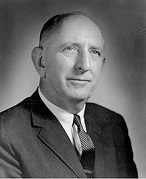
On Mar. 12, 1956 101 members of Congress, 99 Southern Dems. and two Repubs., incl. all but three senators of the former Confederate states, led by U.S. Sen. (D-S.C.) (1956-2003) James Strom Thurmond Sr. (1902-2003) and U.S. Sen. (D-Ga.) (1933-71) Richard Brevard Russell Jr. (1897-1971) pub. the Southern Manifesto on Integration, objecting to the Brown v. Board of Ed. decision by the U.S. Supreme Court; "We regard the decision of the Supreme Court in the school cases as clear abuse of judicial power... The very Congress which proposed the [14th] amendment subsequently provided for segregated schools in the District of Columbia", promising to use all lawful means to bring about a reversal of this decision which is contrary to the Constitution and to prevent the use of force in its implementation"; Southern Dem. Sens. Albert Gore Sr., Estes Kefauver, and Lyndon B. Johnson refuse to sign, pissing them off.
In Mar. 1956 Martin Luther King Jr. becomes the first of 115 black leaders to be put on trial for conspiring to hinder a company in its conduct of business under an 1921 Ala. state anti-labor law enjoining restraint of trade; the grand jury indicment reads: "In this state we are committed to segregation by custom and law; we intend to maintain it"; he is found guilty by a judge and ordered to pay $1K in fines and court costs, which only fuels the bus boycotters, who hold a rally on the courthouse lawn.
On Apr. 23, 1956 the U.S. Supreme (Warren) Court rules in South Carolina Electric & Gas Co. v. Flemming that Columbia, S.C. African-Am. domestic worker Sarah Mae Flemming (1933-93) has no right to sue a bus co. for kicking her off the bus for trying to sit in the whites-only section and punching her in the stomach when she tried to exit the front door in 1955, causing the NAACP to work to set up another bus co. for a final V in the U.S. Supreme Court.
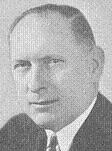

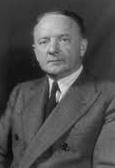
On Sept. 22, 1956 after the Gray Commission (1954), chaired by Va. State Sen. Garland Gray recommends it and atty. David John Mays (1896-1971) et al. draft it, the legislature of Va. passes the Stanley Plan, signed on Sept. 29 by Va. Gov. #57 (1954-8) Thomas Bahnson Stanley (1890-1970) (founder of Stanley Furniture in Stanleyville, Va.), which becomes a key element of the Massive Resistance Strategy of U.S. Sen. (D-Va.) (1933-65) Harry Flood Byrd Sr. (1887-1966) (brother of aviator Richard Byrd) to prevent public school desegregation, which the U.S. Supreme Court rules unconstitutional, causing entire school systems to be shut down in 1958-9 until the U.S. Supreme Court rules that unconstitutional too in 1964.

Davy, Davy Crockett, King of the What? In Sept. 1956 Washington, D.C. white racist bookseller John Kasper (1929-98) stirs up 1K white citizens of Clinton, Tenn. (pop. 4K) to stop 12 black students from enrolling in the high school, then to attack the 8-man police dept., shouting "Let's get the nigger lovers!", causing 100 state troopers, 633 Nat. Guardsmen and seven M-41 tanks to be called in; meanwhile, in Mansfield, Tex. (pop. 1,450), three blacks trying to enroll in a h.s. with 300 whites are scared out by 400 white men waving placards reading "Dead Coons Are the Best Coons" and "$2 A Dozen For Nigger Ears"; "If God wanted us to go to school together He wouldn't have made them black and us white."

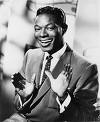
On Nov. 5, 1956 after a kidnap attempt in Birmingham, Ala. by three members of the North Ala. White Citizens Council, led by Asa Earl "Forrest" Carter (1925-79), after which he never again performs in the South, and a bum trip at the Tropicana in Cuba, where he is barred from staying at the Hotel Nacional de Cuba because of his color, Nat King Cole (1919-65) debuts The Nat King Cole Show on NBC-TV for 47 episodes, becoming the first U.S. TV network variety show hosted by an African-Am., airing its last episode on Dec. 17, 1957 after no nat. sponsor is found, causing Cole to utter the soundbyte: "Madison Avenue is afraid of the dark." Carter goes on to pub. the 1973 novel The Rebel Outlaw: Josie Wales (Gone to Texas), filmed in 1976 by Clint Eastwood, and the 1976 autobio. novel The Education of Little Tree, in which he claims to have Cherokee grandparents, selling millions of copies despite his KKK background.
In Jan. 1957 the Eisenhower admin. introduces the 1957 U.S. Civil Rights Act, which passes the House but is opposed by Southerners in the Senate, causing majority leader Lyndon Baines Johnson to talk them into a restricted version, which the House rejects, causing a 2nd compromise, after which S.C. Dem. Sen. Strom Thurmond filibusters it for 24 hours 18 min., but fails, and Ike signs it on Sept. 9; the final bill is called a sham by civil rights leaders since it has few if any teeth, and only 20% of blacks are registered to vote, but it's the first civil rights legislation enacted by Congress since Reconstruction 80 years earlier.
On May 17, 1957 (3rd anniv. of Brown v. Board of Education) the 3-hour Prayer Pilgrimage for Freedom at the Lincoln Memorial in Washington, D.C. is attended by 25K, and features Martin Luther King Jr. delivering his Give Us the Ballot Speech, establishing King as the "No. 1 leader of 16 million Negroes." (James L. Hicks)




The Apollo Theater Be Damned, Let's Little Rock Around the Clock? On Aug. 29, 1957 Ark. gov. (1955-67) Orval Eugene Faubus (1910-94) (originally elected as a Southern liberal) asks a state court to block mayor Woodrow Wilson Mann (1916-2002) and his model 7-year school integration program in Little Rock, Ark. on the grounds that it would lead to bloodshed; the local judge grants it, but U.S. District Court judge Ronald Norwood Davies (1904-96) overrules him, and nine black pupils called the Little Rock Nine attempt to enroll with 2K whites at Central High School while the 175-man police force makes plans to control demonstrations, but fathead Faubus wants to run for a 3rd term against popular white racists Jim Johnson and Bruce Bennett, so on the evening of Sept. 2 he has Nat. Guardsmen set up a perimeter around the school, and the next day they turn the blacks away, claiming that "Gov. Faubus has placed this school off-limits to Negroes"; after Faubus claims that the city's stores are running out of knives sold "mostly to Negro youths", and the FBI compiles a 500-page report showing otherwise, he is ordered to appear in U.S. court on Sept. 20; on Sept. 14 he meets with Pres. Eisenhower in the summer White House in Newport, R.I., but doesn't change his mind; on Sept. 20 he is a no-show in court, having his lawyers tell the judge that "the governor of the state of Arkansas cannot and will not concede that the United States in this court or anywhere else can question his discretion and judgment"; his lawyers then leave with permission, and the judge hears witnesses and orders Faubus and the Nat. Guard to stop interfering with the school, which Faubus agrees to, but that night he gets his prof. strikebreaker friend James "Jimmy the Flash" Karam to round up a gang of bullies, and on Sept. 21 at 8:45 a.m. when the class bell rings, they cry "Here come the niggers!" and chase and beat four black reporters, during which time the black students arrive and made it into the school, but now the mob of almost 1K white racist men begins attacking reporters, police and state troopers, causing Mayor Mann to order the black students withdrawn from the school at 11:50 a.m., and Gov. Faubus tells a press conference in Sea Island, Ga. (where he is conveniently attending a Southern Gov.'s Conference), "The trouble in Little Rock vindicates my good judgment"; on Sept. 22 Pres. Eisenhower orders the military in, and the 327th Battle Group of the 101st Airborne Div. from Ft. Campbell, Ky., under Gen. Maxwell Taylor is flown to Little Rock; under army guard the black children are admitted to the school at 8:45 a.m., and when the crowd doesn't disperse soldiers with bayonets fixed throat-high clear them out; Missouri Pacific switchman C.E. Blake (1912-) seizes a soldier's rifle barrel and topples him, but another soldier rifle-butts him in the head; meanwhile on Sept. 2 in Birmingham, Ala. a black handyman named Judge Edward Aaron (1923-) is captured by the KKK and castrated with a razor blade because "We just wanted some nigger at random"; the finance minister of Ghana is thrown out of a Howard Johnson restaurant near Dover, Del. by a waitress, who says "Colored people are not allowed to eat in here", embarrassing the State Dept.; Gov. Faubus appears on ABC-TV claiming U.S. govt. atrocities, "bludgeoning innocent bystanders, with bayonets in the backs of schoolgirls", concluding "In the name of God...what is happening in America?"; eight arrests are made, four for loitering; the Army wins the day, and keeps the peace until Nov., when they withdraw all but a token force from the school, and the black kids attend unescorted; the total bill for this federal operation is $4,051,000; Southern political leaders lock ranks behind Faubus, accusing Ike of being another Hitler and/or comparing him to the Soviets in Hungary as rank and file Southerners experience flashbacks to Reconstruction (90% of non-Southerners and only 30% of Southerners support Ike's actions); Faubus wins reelection in a landslide, continuing in office until retirement in 1967; Arkansas Gazette reporter Harry Scott Ashmore (1916-98) wins a Pulitzer Prize for his unbiased coverage of Central High despite a statewide boycott and being called "Public Enemy No. 1" by Little Rock's Capital Citizens Council - the blacks see how the avg. white racist gets away with anything, and how the feds only put up a symbolic show, and go into despair?
In 1957 Washington, D.C. becomes the first major U.S. city with a majority African-Am. pop.
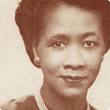
In 1957 Dorothy Irene Height (1912-2010) becomes pres. of the Nat. Council of Negro Women (until 1997), organizing "Wednesdays in Mississippi" to bring together black and white women from the South and North.
In 1957 the Southern Christian Leadership Conference (SCLC) is organized by Dr. Martin Luther King Jr. after the Montgomery Bus Boycott; after King's 1968 death it fades due to lack of strong leadership?
On June 30, 1958 the U.S. Supreme (Warren) Court rules unanimously in NAACP v. Ala. that a state can't subpoena an org.'s membership lists because "Immunity from state scrutiny of petitioner's membership lists is here so related to the right of petitioner's members to pursue their lawful private interests privately and to associate freely with others in doing so as to come within the protection of the Fourteenth Amendment", adding that freedom to associate with organizations dedicated to the "advancement of beliefs and ideas" is an inseparable part of the Due Process Clause of the Fourteenth Amendment.
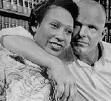
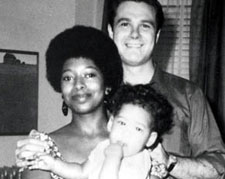
Virginia is for lovers, call 1-800-law-help? In June 1958 Central Point (near Richmond), Va. white man Richard Perry Loving (1933-75) and black-Amerindian Va. woman Mildred Delores "Bean" Jeter (1939-2008), who met seven years earlier and fell in love, resulting in her becoming pregnant, drive 80 mi. to Washington, D.C. and get married, only to be arrested in bed and charged with illegal cohabitation under the 1924 Va. Racial Integrity Act, convicted, then given a 1-year 1959 jail sentence, which they avoid by agreeing to leave the state for 25 years, but get around the stupid redneck wording of the agreement ("both accused leave Caroline County and the State of Virginia at once, and do not return together or at the same time to said county and state for a period of 25 years") by riding back in separate cars (should have said don't return separately or together, or reside together at the same time in said county or state, but the racially superior whiteys popped a head gasket?); they then write to U.S. atty.-gen. Robert F. Kennedy, who refers them to the ACLU, and anti-miscegenation (mixed-race marriage) laws are put on their hit list, with Jewish atty. Bernard S. Cohen filing a motion to vacate the sentence, only to see the courts show themselves up as frauds run by puppetmasters by failing to even respond, which just makes him madder, and after the U.S. Civil Rights Act of 1964 is passed, he gets it taken up by the U.S. Supreme Court as a test case, and they strike down anti-miscegenation laws as unconstitutional on June 12, 1967 (6/6+6/7), causing it to be known as Loving Day; too bad, a drunk driver hits their car in 1975, killing Richard and costing Mildred her right eye. 6/6+6/67 and 6/7+6/7 are Thoroughly Good Black-White Love Days at the U.S. Zoo? Open season for black bucks to go after white wimmen? On June 12, 1967 ("Loving Day") the U.S. Supreme (Warren) Case rules unanimously in Loving v. Virginia; to strike down the 1924 Va. Racial Integrity Act, along with all 16 state laws against "miscegenation" (interracial marriage) (mistaken generation?), legalizing the June 1958 marriage of Mildred Delores "Bean" Loving (nee Jeter) (1939-2008) (black-Am. Indian) and Richard Perry Loving (1933-75) (white) in Washington, D.C.; no surprise, after a decade of civil rights action and ongoing black race riots it causes little public criticism by whites, although S.C. doesn't officially repeal its anti-miscegenation law until 1999; meanwhile on Mar. 17 African-Am. aspiring novelist Alice Walker (1944-) marries Jewish civil rights atty. Melvyn Roseman "Mel" Leventhal, and relocates with him from New York City to Jackson, Miss. to stick it in their faces as the state's first legally married interracial couple; on Nov. 17 1969 (17 mo. after MLK Jr. is shot) they have biracial daughter Rebecca Leventhal Walker (1969-); they divorce in 1976, after which Alice becomes estranged with her daughter, becomes lovers with singer Tracy Chapman, and becomes a supporter of the Palestinian cause.

In summer 1958 Bloomington, Ill.-born corncob pipe-smoking Brown U. philosophy dropout and WWII U.S. Navy fighter pilot ("the American Fuehrer") George Lincoln Rockwell (1918-67) (coiner of the term "White Power") founds the Am. Nazi Party (originally the World Union of Free Enterprise Nat. Socialists until 1960) in Arlington, Va., advocating total racial segregation and blaming the Jews for attempting to push racemixing on the white people of the world, praising Adolf Hitler as "the White savior of the twentieth century" and "the greatest mind in two thousand years", ironically agreeing with the Nation of Islam in its views of the need for racial separation; their first public act is to picket the White House across the Potomac River from their HQ to protest Jewish control of the Eisenhower admin., with signs reading "Save Ike from the Kikes"; he goes on to pub. the autobio. "This Time the World". In Apr. 1966 African-Am. "Roots" novelist Alex Haley interviews Rockwell in Playboy mag.; Rockwell: "There are always exceptions - but everybody knows that they prove the rule. Evolution shows that in the long run, if the superior mixes with the inferior, the product is halfway between, and inferior to what you started with in the original superior group - in other words, mongrelized."; Haley: "The words superior and inferior have no meaning to geneticists, Commander - and neither does mongrelization. Every authority in the field has attested that the world's racial groups are genetically indistinguishable from one another. All men, in other words including hybrids - are created equal"; Rockwell: " You're bringing tears to my eyes. Don't you know that all this equality garbage was started by a Jew anthropologist named Franz Boas from Columbia University? Boas was followed by another Jew from Columbia named Gene Weltfish. And our present Jew expert preaching equality is another Jew named Ashley Montagu. Any anthropologist who dares to preach the facts known by any farmer in the barnyard that breeds differ in quality are simply not allowed to survive in the universities or in publishing, because he can't earn a living. You never hear from that side"; Rockwell goes on to cite the 1916 study on negro psychology by George Oscar Ferguson that claimed to find a higher "intellectual efficiency" in proportion to the percentage of white blood in mixed-races, uttering the soundbyte: "No, we have machines to do their work now. I would simply revoke their citizenship and then offer them the alternatives of either returning to Africa with our generous help and assistance in establishing a modern industrial nation, or being relocated on reservations like the Indians were when they became a problem to the survival of the white people. This will apply to you, too, by the way. Nothing personal, you understand; I like you, personally; but I can't make any exceptions." Too bad, on Aug. 25, 1967 Rockwell is shot and killed by disgruntled party member John Patler.


In 1958 MLK Jr.'s wife Coretta Scott King (1927-2006) makes her first public speaking appearance at a Woman's Day celebration in Denver, Colo., meeting black teenie Wilma J. Webb (1944-), organist for the New Hope Baptist Church, who becomes a state lawmaker and wife of Denver's first African-Am. mayor (1991-2003) Wellington Webb, and leads the state fight to have MLK Jr.'s birthday become a nat. holiday.

On Apr. 17, 1959 Douglas Sirk's Imitation of Life debuts, starring blonde white Lana Turner as Lora Meredith, whose black housekeeper Annie Johnson (Juanita Moore) looks after her daughter Susie (Terry Burnham/Sandra Dee), while her own daughter Sarah Jane (Karin Dicker/Susan Kohner) passes for white, and is beaten by beau Frankie (Troy Donahue) when he finds out, all the rejection finally getting to Annie, who dies of a broken heart, after which her wayward daughter begs forgiveness at her funeral, woo woo woo; the film signals the end of white supremacy in America in a sea of white guilt?
On Sept. 9, 1959 the African-Am. Students Foundation airlifts 81 students from Kenya on an airplane chartered by Jackie Robinson, Harry Belafonte, and Sidney Poitier to study in Hawaii; U.S. pres. Barack Obama later falsely claims that his father Barack Obama Sr. was one of them.

On Dec. 10, 1959 the TV special Tonight with Belafonte airs, starring Harlem-born "King of Calypso" Harold George "Harry" Belafonte (Belafonete) Jr. (1927-), winning him an Emmy, the first awarded to an African-Am.



In 1959 the Boston Red Sox sign African-Am. player Pumpsie Green (1933-), becoming the last ML baseball team to break the color line; they had earlier passed up a chance at Jackie Robinson and Willie Mays, but racist owner Thomas Austin "Tom" Yawkey (1903-76) and mgr. Pinky Higgins (1909-69) held out as long as they could?
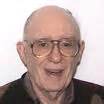
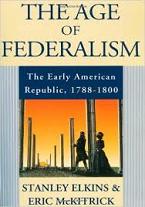
In 1959 Boston, Mass.-born U. of Chicago (later Smith College) Jewish-Am. historian Stanley M. Elkins (1925-2013) pub. his Columbia U. dissertation Slavery: A Problem in American Institutional and Intellectual Life, which uses recent research by Bruno Bettelheim on Nazi concentration camp inmates to compare them to Southern slaves, who, he claims suffered from a "Sambo" complex that kept them unable to effectively resist, claiming it might persist to the present, which is later used by Daniel Patrick Moynihan as a justification for affirmative action programs; too bad, ultimately the African-Am. and Jewish communities consider the comparison offensive. In 1993 he and Battle Creek, Mich.-born Columbia U. historian Eric Louis McKitrick (1919-2002) pub. The Age of Federalism: The Early Republic, 1788-1800 (Bancroft Prize), which becomes a hit. In 1960 McKitrick pub. Andrew Johnson and Reconstruction, which reverses the picture of a brave hero fighting the Carpetbaggers and portrays him as a small-minded stubborn vindictive man who held back racial progress, followed by Slavery Defended: The Views of the Old South (1963), and Andrew Johnson: A Profile (1969).

Blacks start the decade out fast with their first sit-in? On Feb. 1, 1960 the Greensboro Four, black N.C. A&T students Joseph McNeil, David Richmond, Franklin McCain, and Jibreel Khazan (Ezell Blair Jr.) begin a sit-in at an F.W. Woolworth lunch counter on South Elm St. in Greensboro, N.C. after being refused service, returning each day with more and more black friends until they get served coffee, while white racist youths harass them; the sit-in spreads to Woolsworths in 15 cities, then spreads to Walgreen's, S.H. Kress, W.T. Grant, and Liggett stores, then to every segregated facility in society, incl. libraries, parks, theaters, bingo halls, etc.; on May 10 Woolworth desegregates lunch counters in six Nashville stores, the first action in any Southern state except Tex.; on June 23 Hot Shoppes in Va. desegregate, followed by all stores in Knoxville on July 18; on July 25 the original store in Greensboro gives in, but the opposition stiffens and on Oct. 19 Atlanta police arrest 51 demonstrators led by Dr. Martin Luther King Jr. (1929-68), who refuse bail and are jailed. On Feb. 8 Carl Wesley Matthews is denied lunch counter service at a Kress dept. store in Winston-Salem, N.C., causing him to begin a protest that is joined on Feb. 23 by black students from Winston-Salem Teachers College and white students from Wake Forest U., along with more from Atkins High School; on May 23 after 107 days the city caves and signs a desegregation agreement with local businesses, and on May 25 Matthews becomes the first black to be served at a desegregated lunch counter in the U.S. South. On June 25 the first black customer is served at the Woolworth's counter in Greensboro, N.C. - you got everything you need, right, chicken breasts, parsley, onions, and garlic?
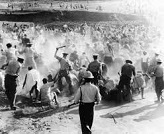
On Mar. 21, 1960 the Sharpeville Massacre sees South African police kill 69 and injure 180 of 5K-7K blacks in Sharpeville protesting the apartheid pass laws, causing an internat. protest; on Mar. 30 the govt. declares a state of emergency (until Aug. 31); on Apr. 1 the U.N. Security Council passes Resolution 134, calling for South Africa to abandon apartheid, making it an internat. pariah; meanwhile the South African govt. bans the PAC and ANC, causing them to go from passive to active resistance; in 1966 the U.N. establishes Mar. 21 as the Internat. Day for the Elimination of Racial Discrimination.
On Apr. 10, 1960 the U.S. Senate passes the 1960 U.S. Civil Rights Act, which protects black voters' rights by establishing federal inspection of local voter registration polls, introducing penalties for obstructing somebody's attempt to register to vote or vote, and establishing the U.S. Commission on Civil Rights; Pres. Eisenhower signs it on May 6; too bad, black voters only increase 3% at the next election as the repression continues at the state level with literacy tests, poll taxes, and gerrymandering.
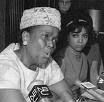
On Apr. 15, 1960 the Student Nonviolent Coordinating Committee (SNCC) (pr. like "snick") is formed after student meetings at Shaw U. in Raleigh, N.C. by black student Ella Josephine Baker (1903-86) et al., going on to play a major role in sit-ins, freedom rides, the 1963 Great March on Washington, Miss. Freedom Summer et al.





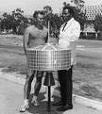

On Aug. 25-Sept. 11, 1960 the XVII (17th) Summer Olympic Games are held in Rome, Italy; the Sports Palace is built for them; 5,338 athletes from 83 nations compete in 150 events in 17 sports; the last appearance for South Africa until 1992; Soviets win 15 of 16 medals in women's gymnastics; the Japanese men's gymnastics team wins the first of five successive golds (until 1976); future King Constantine II of Greece wins a gold in Dragon Class sailing; former polio patient "La Gazella" Wilma Rudolph (1940-94) becomes the first black Am. to win three gold medals in a single Olympiad (100m, 200m, 4 x 100m relay); barefoot Ethiopian Abebe Bikila (1932-73) wins the marathon, becoming the first black African to win a gold; dominating Herbert James "Herb" Elliott (1938-) of Australia wins the 1500m in 3 min. 35.6 sec.; the 100m men's freestyle swimming race is marred by officials who reverse the automatic timers and award the win to John Devitt (1937-) of Australia over Lance Larson (1940-) of the U.S.; Armin Hary (1937-) of West Germany (known for rumors of accepting cash under the table to wear Adidas and/or Puma shoes) wins the gold in the 100m with a time of 10.2 sec., becoming the first non-U.S. winner since Percy Williams of Canada in 1928; Rafer Lewis Johnson (1935-) of the U.S. defeats friend-rival "Iron Man of Asia" C.K. Yang (Yang Chuan-kwan) (1933-2007) of Taiwan in the decathlon; on Aug. 26 Danish cyclist Knud Enemark Jensen collapses then dies in the hospital (2nd Olympic athlete death since 1912), and amphetamines are found in his blood; on Sept. 5 Cassius Marcellus Clay Jr. (1942-) (later Muhammad Ali) wins a gold medal in light-heavyweight boxing, and returns to the U.S. to find he's still treated like an N-word, later throwing it in the Ohio River after being refused service at a Louisville diner while wearing it around his neck; Pakistan becomes the first team to defeat India in men's field hockey since 1928 (six golds), winning its first gold - IOC, a family company?
On Oct. 19, 1960 after first meeting JFK in June, Martin Luther King Jr. is arrested at a sit-in in Atlanta, Ga. for trespassing, and after refusing to post bail he remains in jail as the KKK marches through the streets and JFK and Nixon hold their final TV debate; on Oct. 22 after authorities produce a 5-mo.-o. traffic ticket from a neighboring county, the charges are dropped and all demonstrators released except him, after which they charge him with violating probation on a 5-mo.-old traffic ticket from a neighboring county and send him to Reidsville State Prison in maximum security for 4 mo. hard labor, causing JFK to ignore objections from RFK and his own campaign mgr. and get an aide to call King's pregant wife Coretta to assure her, after which RFK calls the judge, and he is released on Oct. 27 on a $2K bond, causing King to issue the soundbyte that he is "deeply indebted to Senator Kennedy", causing the JFK campaign to use the episode for traction among black voters, winning 78% of their vote.
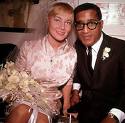
On Nov. 13, 1960 Harlem, N.Y.-born black entertainer Samuel George "Sammy" Davis Jr. (1925-90) (who lost his left eye in an automobile accident on Nov. 19, 1954 in San Bernardino, Calif. during a trip from Las Vegas to Los Angeles, and converted to Judaism after Eddie Cantor introduced him to it in the hospital) shocks white racists sheetless by marrying blonde Swedish actress May Britt (Maybritt Wilkens) (1933-) (star of The Young Lions" with Marlon Brando and "Murder Inc." with Peter Falk), who retires to manufacture mulattoes after converting to Judaism to get married to him; after having one daughter they divorce in 1968 after she catches him hooking up with dancer Lola Falana, and she returns to acting - welcome to the 1960s?

On Nov. 14, 1960 New Orleans, La., the Crescent City integrates two all-white schools as 6-y.-o. black student Ruby Bridges (1954-) enters Franz Elementary (in a racially-mixed neighborhood) flanked by four federal marshals before a phalanx of angry white racists.
On Nov. 14, 1960 after the 1957 U.S. Civil Rights Act allows blacks to register in Tuskegee, Ala., reaching the point of outnumbering white voters, causing the legislature to enact Local Law 140 creating a 28-sided city boundary that excludes almost all the blacks, the U.S. Supreme (Warren) Court rules unanimously in Gomillion v. Lightfoot that an electoral district cannot be gerrymandered to disenfranchise blacks because of the 15th Amendment.
On Dec. 5, 1960 the U.S. Supreme (Warren) Court rules 7-2 in Boynton v. Virginia that segregation in public transit is illegal because it violates the U.S. Interstate Commerce Act, leading to the creation of the Freedom Riders next year to test it; Justice Hugo Black writes the majority opinion.








Feces and urine are the same color for all races, but? On May 4 1961 13 black and white Freedom Riders, incl. Rev. William Sloane Coffin Jr. (1924-2006) (white), Stokely Standiford Churchill Carmichael (1941-98) (black), atty. Mark Lane (1927-) (white), atty. Percy Ellis Sutton (1920-2009) (black), and Thomas Emmet "Tom" Hayden (1939-) (white), organized and led by James L. "Jim" Farmer (1920-99) (black) leave Washington, D.C. in a bus headed for New Orleans, La. to challenge racial segregation in interstate buses and bus terminals, outraging white racists with black-white pairs sitting side by side and sharing restrooms; the bus (along with the offending seats and potties) is bombed and burned in Montgomery, Ala. on May 20 by a white mob, who beat the riders with iron pipes as the police do nothing, prompting U.S. atty.-gen. Robert Kennedy to send U.S. marshals; Appleton, Wisc.-born aspiring minister James Zwerg (1939-) is the first off the bus, and is nearly beaten to death until a black worker intervenes to save him, ending up in the hospital with him, after which Zwerg gives a famous speech from his hospital bed: "Segregation must be stopped. It must be broken down. Those of us on the Freedom Ride will continue.... We're dedicated to this, we'll take hitting, we'll take beating. We're willing to accept death. But we're going to keep coming until we can ride from anywhere in the South to any place else in the South without anybody making any comments, just as American citizens"; on May 21 white demonstrators armed with rocks and Molotov cocktails surround the First Baptist Church (Colored) in Montgomery, Ala. (a few blocks away from the state capitol where Jefferson Davis had been elected provisional pres. of the Confederacy) as it holds a rally for the visiting Freedom Riders attended by more than 1K blacks, incl. Martin Luther King Jr. (1929-68), but the Nat. Guard arrives to save the day; the Freedom Riders are arrested in Jackson, Miss. on May 24 for disturbing the peace after leaving their bus. On May 14 a Freedom Riders bus is bombed near Anniston, Ala., and they are beaten by an angry mob. In June the U.S. Supreme Court voids the sentences of six Freedom Riders convicted in La. of trying to desegregate a bus terminal.



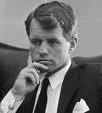





Knocking on Heaven's Door, or Dirty Deeds Done Dirt Cheap, or King Arthur and the Days of Camelot come to the White House, only to be defeated by the mean Dragon of the MIC? On Jan. 20, 1961 (Sun.) 43-y.-o. charisma-maximus Mass.-born Harvard-educated WWII Navy PT-boat hero (first to be knocked-off by the Military-Industrial Complex?) John Fitzgerald "Jack" Kennedy (1917-63) becomes the 35th U.S. pres. (until Nov. 22, 1963) in the 51st U.S. Pres. Inauguration (youngest pres. until?) (first Boy Scout pres.) (first Gemini pres.) (first pres. with an air-conditioned limo) (continues the tradition of all Mass.-born presidents being born in Norfolk County, incl. John Adams and John Quincy Adams); "from a medical standpoint, he was a mess", having been hospitalized more than three dozen times and given last rites 3x; Lyndon Baines Johnson (1908-73) becomes the 37th U.S. vice-pres.; JFK makes wearing hats uncool for decades to come?; the inaug. theme is "World Peace Through New Frontiers"; JFK's Inauguration Address, mainly written by his "intellectual blood bank" advisor Theodore Chaikin "Ted" Sorensen (1928-) (a Nebraskan with a Danish father and Russian Jewish mother), incl. the soundbytes: "The world is very different now, for man holds in his mortal hands the power to abolish all forms of human poverty and all forms of human life. And yet the same revolutionary beliefs for which our forebears fought are still at issue around the globe: the belief that the rights of man come not from the generosity of the state, but from the hand of God. We dare not forget today that we are the heirs of that first revolution. Let the word go forth from this time and place, to friend and foe alike, that the torch has been passed to a new generation of Americans, born in this century, tempered by war, disciplined by a hard and bitter peace, proud of our ancient heritage, and unwilling to witness or permit the slow undoing of those human rights to which this nation has always been committed, and to which we are committed today at home and around the world. Let every nation know, whether it wishes us well or ill, that we shall pay any price, bear any burden, meet any hardship, support any friend, oppose any foe, in order to assure the survival and the success of liberty"; "Can we forge against these enemies a grand and global alliance, North and South, East and West, that can assure a more fruitful life for all minkind? Will you join in that historic effort? In the long history of the world, only a few generations have been granted the role of defending freedom in its hour of maximum danger. I do not shrink from this responsibility, I welcome it. I do not believe that any of us would exchange places with any other people or any other generation. The energy, the faith, the devotion which we bring to this endeavor will light our country and all who serve it, and the glow from that fire can truly light the world. And so, my fellow Americans, ask not what your country can do for you, ask what you can do for you country"; he adds "I now invite all nations, incl. the Soviet Union to join with us in developing a weather prediction program, in a new communications satellite program), and in preparation for probing the distant planets of Mars and Venus, probes which may someday unlock the secrets of the Universe"; on Jan. 21 JFK's brother Robert Francis "Bobby" Kennedy (1925-68) becomes U.S. atty.-gen., with JFK explaining that it's "to give him... experience before he goes out to practice law" (which is OK despite nepotism because the Nixon Doctrine says that if the president does it it isn't illegal?); Yale U. grad Burke Marshall (1922-2003) is appointed by RFK as asst. atty.-gen. in charge of the U.S. Justice Dept.'s Civil Rights Div. (until Dec. 1964), initially chosen because he's not a known civil rights leader and turning JFK off, who says "I have nothing in common with that man", but who later distinguishes himself by using the U.S. govt. power to regulate interstate commerce as the tool to force black civil rights on states rather than the more obvious 14th Amendment.

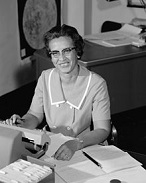
On Jan. 31, 1961 37 lb. Ham the Chimp (1956-83) becomes the first animal put by the U.S. into orbit aboard Mercury-Redstone 2 to test the Project Mercury capsule; African-Am. mathematician Katherine Coleman Goble Johnson (1918-) works as a computor for NASA calculating trajectories, going on to work for the Apollo and Space Shuttle programs, receiving a Pres. Medal of Freedom in 2015.

In Feb. 1961 Texarkana, Tex.-born rich LBJ backer Hobart T. Taylor Jr. (1920-81) is invited to the White House by LBJ to review an early draft of the Mar. 6 Executive Order 10925 by Abe Fortas and labor secy. Abe Fortas, coining the term "affirmative action" (originally positive action) with help by George Bunn, blatantly contradicting the U.S. Constitution and Bill of Rights for leftist social-racial justice and launching an endless political-judicial war ( ends ?); on Apr. 6 Taylor is named special counsel to the President's Committee on Equal Employment Opportunity (PCEEO) after conservative Texan opposition to appointing him chmn., with John G. Field named instead; on Sept. 10, 1962 Taylor is promoted to exec vice-chmn. (until 1965), becoming the first non-white ti direct the staff of a U.S. pres. committee.

On May 21, 1961 race riots cause Ala. Dem. gov. (1959-63) John Malcolm Patterson (1921-) to declare martial law.

In Sept. 1961 Tony Richardson's A Taste of Honey, based on the play by Shelagh Delaney stars what-a-name Rita Tushingham (1942-), as white working class girl Jo, whose slutty alcoholic mother Helen (Dora Bryan) kicks her out, after which she falls in instant love with black sailor Peter Smith (Robert Stephens), gets pregnant, and turns to white homo Geoffrey (Murray Melvin) (who moves in with her, but of course doesn't want her tushy, not because, er, forget it?) for help in becoming a woman; makes a star out of Tushingham, who becomes the icon for white women who like black men - milk, honey, and chocolate on my hammy tushy?

On Nov. 28, 1961 running back Ernie Davis (1939-63) of Syracuse U. becomes the first African-Am. to win the Heisman Trophy, getting drafted by the Washington Redskins, traded to the Cleveland Browns, then developing leukemia in 1962 before playing a single pro game.
On Dec. 11, 1961 the U.S. Supreme (Warren) Court rules unanimously in Garner v. La. that states cannot use disturbing the peace laws to oppress peaceful sit-in protesters at dining establishments; JFK's Justice Dept. defends the demonstrators, along with the NAACP.
The JFK admin. drags its feet on civil rights for blacks? In 1961 the U.S. Dept. of Justice targets 100 counties for black voter registration, but by JFK's death only increases it from 5% to 8.3% of eligible voters while blacks employed by the federal govt. only rise 0.5%; the number of school districts desegregated rises from 17 to 166, with Miss., Ala., and S.C. still at zero, and Ga. and La. at 1, causing Martin Luther King Jr. to remark that at this rate it will take until the year 2054 - that's right, we'll leave it to our grandchildren?

On June 1, 1961 Newark, N.J.-born African-Am. poet Amiri Baraka (Leroi Jones) (1934-) pub. his debut poetry book Preface to a Twenty Volume Suicide Note, incl. Preface to a Twenty Volume Suicide Note. In 1966 he pub. Home: Social Essays, incl. "Cuba Libre", and "The Legacy of Malcolm X and the Coming of the Black Nation". In 1969 he pub. Black Magic: Collected Poetry 1961-1967. In 1970 he pub. It's Nation Time. In 1971 he pub. Raise Race, Rays, Raize: Essays Since 1965. In 1975 he pub. Hard Facts. In 1979 he pub. Poetry for the Advanced.



On Apr. 16, 1962 after JFK passes over the first African-Am. federal judge (1937-9) William Henry Hastie Jr. (1904-76) (teacher at Howard U. of Thurgood Marshall) for being too conservative, claiming that he will appoint him later, Ft. Collins, Colo.-born U. of Colo. football star and deputy U.S. atty.-gen. Byron Raymond "Whizzer" White (1917-2002) becomes the 94th U.S. Supreme Court justice (until June 28, 1993) to fill the vacancy left by Ike's appointee Charles Evans Whittaker (1957-1962), becoming the first U.S. Supreme Court law clerk to make it (for Fred M. Vinson); on Sept. 28 U.S. labor secy. #9 (since Jan. 21, 1961) Arthur Joseph Goldberg (1908-90) becomes the 95th justice (until July 26, 1965), replacing retiring Jewish justice Felix Frankfurter (d. 1965), becoming the 2nd Jewish justice.



On Sept. 13, 1962 Miss. Gov. (1960-4) Ross Barnett (1898-1987) defies the U.S. govt., saying he will not allow uppity black student (Air Force vet) James Meredith (1933-) to enter the U. of Miss.; on Sept. 20 he is blocked from enrolling; on Sept. 24 the U.S. Circuit Court of Appeals orders Meredith admitted, which is upheld by the U.S. Supreme Court; on Sept. 29 Pres. Kennedy mobilizes the Miss. Nat. Guard and issues a televised appeal for peace; on Sept. 30 he is allowed to register on his 4th try despite rioting on campus; on Oct. 1 a racist riot is put down by 3K soldiers and Nat. Guardsmen, allowing Meredith to enter Ole Miss as a senior under escort of federal marshals, who guard him for the next 10 mo., while the U.S. Justice Dept. led by U.S. asst. atty. gen. (1960-7) John Michael Doar (1921-) begins criminal action against Barnett for defying the court's orders; meanwhile Southern School News reports that up to this year Miss., Ala., and S.C. are the only Southern states that have not taken action to implement Brown v. Board of Education, but that virtually no Northern school districts have taken any action either; meanwhile Barnett has the Ross Barnet Reservoir built on the Pearl River, bounded on the W by the Natchez Trace. On June 6, 1963 a 2nd black student enters the U. of Miss. with no interference or incidents. On Aug. 18, 1963 James Meredith becomes the first black to graduate from the U. of Miss.
On Nov. 20, 1962 Pres. Kennedy bans religious or racial discrimination in federally-funded housing.

In 1962 John Melville Burgess (1909-2003) is consecrated by the Protestant Episcopal Church as suffragan bishop of Mass., becoming the first African-Am. to preside as bishop over an Episcopal diocese in the U.S.

In 1962 Michael Harrington (1928-89) pub. The Other America: Poverty in the United States, which claims that there are 40M-50M "invisible poor", "internal aliens" in the midst of the "affluent society" (oh my!), inspiring JFK to create a poverty program, and when he is killed too soon to do it, it inspires LBJ's War on Poverty; don't tell people but he's a dem. socialist.


In 1962 Rex Ingram (1895-1969), who starred as the giant genie in "The Thief of Baghdad" (1940) and was railroaded in 1949 on the U.S. Mann Act, setting his career back, becomes the first African-Am. actor to be hired for a contract role on a soap opera, "The Brighter Day".

On Jan. 3, 1963 white-passing La.-born Dem. Augustus Freeman "Gus" Hawkins (1907-2007) becomes the first African-Am. Calif. U.S. Rep. (until Jan. 3, 1975).

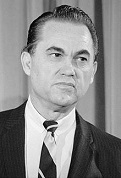

On Jan. 14, 1963 white supremacist Southern Dixiecrat George Corley Wallace Jr. (1919-98) becomes gov. #45 of Ala. (until Jan. 16, 1967), saying in his inaugural address "In the name of the greatest people that have ever trod on this Earth, I draw the line in the dust and toss the gauntlet before the feet of tyranny. And I say segregation now, segregation tomorrow, segregation forever!"; meanwhile on Jan. 16 new S.C. Dem. Gov. (1963-5) Donald Stuart Russell (1906-98) holds the first integrated state function in S.C. since Reconstruction, his inaugural barbecue - after all, they love ribs?

On Jan. 28, 1963 black student Harvey Bernard Gantt (1943-) enters Clemson U. in S.C., which becomes the last state to hold out against racial integration.

On Mar. 28, 1963 William Jaird Levitt (1907-94) (founder of Levittown on Long Island) refuses to sell houses in his Belair at Bowie project in Bowie, Md. to blacks, causing demonstrations by civil rights groups and becoming the first test of the Kennedy admin.'s anti-discrimination housing order; he finally backs down, complaining that it will put him at a competitive disadvantage.
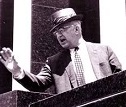
On Apr. 2, 1963 Martin Luther King Jr. begins his first nonviolent protest campaign in Birmingham, Ala., which he calls "the most segregated city in the United States", with sit-ins and marches, causing over 400 arrests for B.S. charges like loitering; after 17 of 21 white churches refuse to admit black Christians sent by King, he organizes a protest march on Good Friday (Apr. 12), which Dem. police commissioner Theophilus Eugene "Bull" Connor (1897-1973) (born in Dallas County, Ala.) obtains an injunction against, but they march anyway, and his happy pigs use dogs and cattle prods on them, arresting several, incl. King, prompting him to write Letter from a Birmingham Jail; "I am in Birmingham because that's where injustice is... Injustice anywhere is a threat to justice everywhere"; "An unjust law is a code that a majority inflicts on a minority that is not binding on itself. This is difference made legal. On the other hand, a just law is a code that a majority compels a minority to follow, and that it is willing to follow itself. This is sameness made legal"; JFK later utters the soundbyte: "The Civil Rights movement should thank God for Bull Connor. He's helped it as much as Abraham Lincoln." On Apr. 12 police use cattle prods and dogs on peaceful civil rights demonstrators in Birmingham, Ala., causing bad press nationwide - du, du hasst, du hasst mich? On Apr. 15 after anti-segregation leaders in Birmingham, Ala. are arrested, police club several black protesters while holding back a crowd of 2K.


On Apr. 23, 1963 after being refused by Continental Airlines in 1957 and going all the way to the U.S. Supreme Court, who unanimously decides that states can make interstate airlines stop racial discrimination in hiring practices, Marlon D. Green (1929-2009) becomes the first African-Am. pilot hired by a major U.S. passenger airline, working for Continental Airlines in 1965-78; meanwhile David Harris (1935-) becomes the first African-Am. pilot in the U.S. at Am. Airlines in 1964-94.
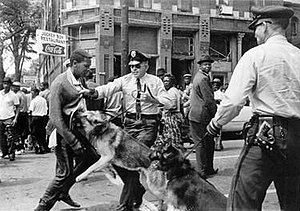
Birmingham gives George Wallace and Martin Luther King Jr. national prominence? On May 2 500 black protesters in Birmingham, Ala. are arrested and driven to jail in school buses, causing a protest on May 3, on which police commissioner Bull Connor unleashes vicious clothes-ripping police dogs and high powered (700 psi) fire hoses (after all, blacks are too dirty to touch, and are fit only for dogfood?) on 2.5K blacks in downtown protesting for their right to be treated equally in white-owned businesses, causing U.S. atty.-gen. Robert Kennedy to finally "get it" and back the civil rights program implicitly, saying "I can well understand why the Negroes of Birmingham are tired of being asked to be patient"; a New York Times photo on May 4 of a police dog attacking peaceful black teenager Walter Gadsden taken by Detroit, Mich.-born photojournalist Bill Hudson (1932-2010 causes Pres. Kennedy to fume at a meeting of the liberal Ams. for Dem. Action, saying "There's no federal law we could pass to do anything about that picture... What law can you pass to do anything about police power in the community of Birmingham? There is nothing we can do"; on May 4 highway patrolmen arrest 10 Freedom Walkers on the Ala. as they cross from Tenn.; by May 7 2,543 demonstrators have been arrested in Birmingham, causing Ala. gov. George Wallace to say he is "beginning to tire of agitators, integrationists and others who seek to destroy law and order in Alabama"; a truce lasts until May 11. On May 5 U.S. asst. atty.-gen. (since 1961) Burke Marshall (1922-2003), head of the Justice Dept.'s Civil Rights Div. (since 196t1) arrives in Birmingham, Ala. to effect a truce; on May 6 several hundred blacks stage a peaceful demonstration, and on May 7 another march results in 1K arrests; on May 8 the police use an armored car and water hoses to drive hundreds of protesters off the streets; on May 6 Adam Clayton Powell Jr. says that Washington, D.C. will experience a massive race riot if the social factors producing racial tension aren't removed; on May 8 JFK says that the ideal solution in Birmingham would be one made by its own people; on May 9 a truce is declared, until MLK Jr. is returned to jail, after which he is freed on bail and warns that unless a settlement is reached by 11 a.m. demonstrations will resume, after which on May 9 after meetings in the home of a black insurance exec an agreement is reached, incl. pledges by white businessmen and civil leaders (not by city officials) to desegregate facilities in large downtown stores in 90 days and to hire black clerks and salesmen in 60 days, plus release demonstrators without bail in return for ending the protests, after which Malcolm X utters the soundbyte that Birmingham will look like a picnic compared to racial violence elsewhere unless whites give in to black demands for equality. On May 11 (night) white supremacists bomb a black-owned motel and the home of MLK Jr.'s younger brother in Birmingham, Ala., triggering the May 12 Mother's Day Race Riot by 2.5K pissed-off blacks, 50 of whom are injured after attacking police and burning six stores, overwhelming the pigs despite clubbing all the blacks they can catch, and causing Bull Connor to request reinforcements from Ala. gov. George Wallace, who responds with 700 pistol-wielding crackers, causing Pres. Kennedy to send 3K troops to an air base near the city and take preliminary steps to federalize the Ala. Nat. Guard, saying "This government will do whatever must be done to preserve order, to protect the lives of its citizens, and to uphold the law of the land", pissing-off Ala. gov. George Wallace, who questions his right to send troops, causing Kennedy to back down on May 14 with a telegram to him saying "I trust that we can count on your constructive cooperation", leaving their use up to Wallace; meanwhile Ala.'s congressional delegation petitions JFK to withdraw the troops, and Wallace sues, losing in the U.S. Supreme Court on May 28; Kennedy's chief of staff Ken O'Donnell predicts a "long, hot summer". Alabama fights the feds in a losing fight? On May 21 the U.S. Supreme Court rules in Smith v. City of Birmingham, Ala. to overturn convictions of 28 black and three white students for sit-in demonstrations, saying that since the cities had official policies of segregation, a store owner's refusal to serve blacks is the state's fault and therefore unconstitutional; on May 21 1.1K black students in Birmingham, Ala. who had been arrested in anti-segregation demonstrations are expelled or suspended from school, causing black leaders to call on the city's other 21,877 black students to start a boycott, but MLK Jr. calls it off after a judge orders the students reinstated on May 23; on May 22 a federal judge orders the U. of Ala. to admit two black students on June 10, causing Ala. gov. George C. Wallace to declare that he will defy the court, pledging to "stand in the schoolhouse door", while univ. officials indicate willingness to admit them, but at a later date - next millennium? On May 28 the Dow Jones Industrial Avg. goes public, with an IPO of 110K shares, helped by the Kennedy tax cuts and the leadership of the U.S. in all the major smokestack industries; too bad, the Vietnam War, white urban flight from Detroit, Cleveland, Newark, N.J., and Gary, Ind. caused by race riots, and rise of Japanese industry cause the 1970s to become a Dow nightmare. On May 28 the U.S. Supreme Court unanimously bans "indefinite delay" in school desegregation, ordering Memphis, Tenn. to desegregate its parks and playgrounds immediately; this doesn't stop federal judge Seybourn Harris Lynne (1907-2000) from refusing to order total desegregation of Birmingham, Ala. schools, saying on May 29 that the school board's "good faith" has not been tested yet. On May 30 JFK attends a luncheon with nine Dem. govs. (only one from a Southern state), and calls for equal opportunities regardless of race; meanwhile the Ala. State Senate approves a resolution endorsing gov. George Wallace's promised defiance of a federal court order to integrate the sacred lily-white U. of Ala. on Jee-yun 10, with an amendment against mob violence, although the state will not guarantee the black students' safety on campus.
On May 31, 1963 the Danville Christian Progressive Assoc. (DCPA) is formed by blacks in Danville, Va. (Jefferson Davis' last Confed. capital), declaring a boycott of white merchants and marching to city hall to protest segregation and job discrimination, causing police to attack them with clubs and fire hoses, injuring 40, after which Martin Luther King Jr. visits the High Street Baptist Church and calls it the worst police brutality he has seen in the South; by Sept. 1 after the Student Nonviolent Coordinating Committee (SNCC) sends organizers to protest at the Howard Johnson Hotel, and a grand jury indicts 13 for violating the 1830 John Brown Law, 600+ protesters are arrested without changing anything.

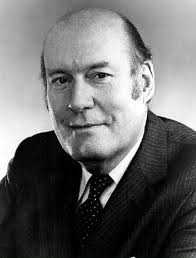
On June 3, 1963 it is revealed that the Chinese Commies are using the racial troubles in Birmingham, Ala. to recruit non-whites to its brand of Communism and woo them away from the Soviet "peaceful coexistence" policy; meanwhile Ala. gov. George C. Wallace appears on a TV program at the RCA Bldg. in the Rockefeller Center in New York City under heavy police security; on June 4 it is revealed that African students in Moscow are complaining of racial discrimination also. On June 3 the U.S. Supreme Court rules in Goss v. Board of Education that a desegregation plan in Tenn. allowing students to transfer from a school where their race is in the minority is unconstitutional, causing William O. Douglas to berate his colleague Hugo L. Black in the courtroom, startling onlookers. On June 4 the Congress of Racial Equality (CORE) calls for a time limit to end racial discrimination. On June 5 Southern Dems. lead a vote in the U.S. House to block establishment of new executive depts. under the 1949 Reorg. Act in order to stop the JFK admin. from setting up a Dept. of Urban Affairs; this doesn't stop JFK from ordering a review of federal construction programs and directing laby secy. William Willard Wirtz to require that young workers be admitted to apprenticeship programs without racial discrimination; he also urges a war on hunger. On June 6 JFK addresses San Diego State College in Calif., slamming "the de facto segregation of the North as well as the proclaimed segregation of the South"; meanwhile union spokesmen in New York City pledges to end discrimination in building trades unions, and on June 8 the U.S. Army begins an effort to hire more black and Puerto Ricans in the New York City area. On June 8 a race riot in Lexington, N.C. between 500 whites and 100 blacks sees one white man killed and 10 white men and seven black teenagers arrested. On June 9 JFK addresses the U.S. Conference of Mayors in Honolulu, Hawaii, uttering the soundbye that in this "moment of moral and constitutional crisis", "the time for token moves and idle talk is over", calling for elimination of local segregation ordinances and replacement with equal opportunity ordinances and other positive actions. On June 11 after deploying 825 law enforcement officers, and ignoring pleas from JFK and 46 Philly attys. not to interfere, Ala. gov. George C. Wallace makes his famous Stand in the Schoolhouse Door at Foster Auditorium of the U. of Ala. in Tuscaloosa against federal troops to block school integration by the federal govt.; after turning the Justice Dept. man Nicholas deBelleville "Nick" Katzenbach (1922-2012) (deputy U.S. atty. gen.) back 4x, Wallace is escorted by Nat. Guard Gen. Henry V. Graham Vivian Malone Jones (1942-2005) and James A. "Jimmy" Hood (1943-) are peacefully admitted, embarrassing racists with their dignity, even though at the time Wallace gets the TV cameras to make it look like he had caused them to back down, declaring "I stood eyeball to eyeball with them and they turned back"; that evening JFK delivers his Civil Rights Address on nat. TV, calling segregation morally wrong, saying that black discontent has produced a "moral crisis", adding that it's "time to act", promising to send sweeping legislation to Congress to speed up school desegregation, with the soundbyte: "Next week I shall ask the Congress of the United States to act, to make a commitment it has not fully made in this century to the proposition that race has no place in American life or law"; meanwhile MLK Jr. assails JFK's civil rights record, and the Am. Jewish Congress calls the policy of gradualism in achieving racial equality a "folly and a failure"; in 1996 Wallace apologizes to Jones and Hood and gives them an award - don't shoot until you see the whites of their eyeballs? On June 11 as the action blazes in Ala., troops are withdrawn from the peaceful integrated U. of Miss. campus. On June 11 MLK Jr. is arrested in Fla. for trying to integrate restaurants.

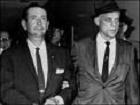

On June 12, 1963 black Miss. NAACP leader (a Freemason) Medgar Evers (b. 1925) is fatally shot in the back in front of his Jackson, Miss. home by white KKK sniper Byron De La Beckwith (1920-2001), who scoffs at the law for years before being convicted of murder on Feb. 5, 1994 by last-laughing prosecutor Bobby DeLaughter (1954-) and receiving a life sentence; meanwhile the killing causes mass protests by blacks, and 158 arrests - I love my job, I love my pay, I love it more and more each day?
On July 12, 1963 the 5th U.S. Circuit Court of Appeals rules that the city of Birmingham, Ala. must immediately begin integrating its schools based on a lawsuit filed in 1957 by barber James Armstrong Sr., whose children had been denied admission to all-white Graymont Elementary School.
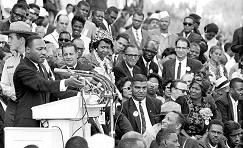



On Aug. 28, 1963 the Great March on Washington for Jobs and Freedom in Washington, D.C. organized by Bayard Rustin (1912-87) sees Martin Luther King Jr. (1929-68) deliver his I Have a Dream Speech from the steps of the Lincoln Memorial to 200K while NBC-TV preempts daytime programming to provide live coverage; MLK Jr. calls the U.S. Constitution and Declaration of Independence "a promissory note to which every American was to fall heir"; "I have a dream that my four little children will one day live in a nation where they will not be judged by the color of their skin, but by the content of their character"; ends with "Free at last!"; white actors Marlon Brando, James Garner, and Burt Lancaster attend, along with black actors Sidney Poitier and Harry Belafonte; longtime civil rights leader ("Godmother of the Civil Rights Movement") Dorothy Irene Height (1912-2010) stands on the platform with King during the speech, later saying she is disappointed that he didn't mention women's rights; folk trio Peter, Paul and Mary sing If I Had a Hammer, and Mary has an "apotheosis"; good friend Sammy Davis Jr. stands in front of the podium.
On Sept. 2, 1963 Ala. Gov. George Wallace prevents the integration of Tuskegee High School by ordering it encircled by state troopers; the feds win on Sept. 10 when Pres. Kennedy federalizes the Ala. Nat. Guard, and 20 black students enter the school.
On Sept. 10, 1963 after JFK federalizes the Ala. Nat. Guard to end a standoff with gov. George Wallace, 20 black students enter public schools in Birmingham, Tuskegee, and Mobile.
The deadliest act of the U.S. civil rights era? On Sept. 15, 1963 (Sun.) (10:22 a.m.) the Ku Klux Klan (KKK) bombs the Sixteenth Street Baptist Church in Birmingham, Ala., killing four young black girls (Addie Mae Collins, 14, Carole Robertson, 14, Cynthia Wesley, 14 and Denise McNair, 11) as they prepare their Sunday school lesson "The love that forgives", and injuring 22; U.S. secy. of state Condoleezza Rice, daughter of Rev. John Rice had played with them; MLK Jr. calls it "one of the most vicious and tragic crimes ever perpetrated against humanity"; later on the same day James Ware (16) and his brother Virgil (14) are shot at while bicycling home, and Virgil dies; in 1977 Robert Edward "Dynamite Bob" Chambliss (1904-85) is convicted of the bombing; Thomas Edwin Blanton Jr. (1938-) is convicted in 2001; Bobby Frank Cherry (1930-2004) is convicted in May 2002; Herman Frank Cash (1918-94) is a suspect.
On Sept. 22, 1963 armed mounted police ride into a memorial service at the Little Union Baptist Church in Shreveport, La. (where MLK Jr. delivered a sermin in 1962) for the four little girls killed in Birmingham, Ala., beating Shreveport NAACP pres. Rev. Henry Blake.


On Oct. 2-6, 1963 the Los Angeles Dodgers (NL) defeat the New York Yankees (AL) 4-0 in the Sixtieth (60th) World Series, becoming the first team to never trail an inning (2nd time 1966 Orioles, 3rd time 1989 A's, 4th time 2004 Red Sox); the Yankees are the first team to win more than 100 games in the regular season and win no games in the World Series (2nd time is the Cardinals in 2004); the first time that the Yankees are swept in a WS in four games (in 1922 they are swept with one tie); Elston Gene Howard (1929-80), the first black player in New York Yankees history (1955) becomes the first African-Am. AL MVP; Dodgers pitcher (#32) (since 1955) ("Great Jewish Hope") (lefty) Sandy Koufax (Sanford Braun) (1935-) is named NL MVP, and wins the Cy Young Award, and again in 1965 and 1966, becoming the first 3-time winner, winning the pitcher's triple crown each time; in 1965 he pitches a perfect game, and becomes the first ML pitcher to pitch four no-hitters; too bad, arthritis ends his career, and he makes his last appearance on Oct. 2, 1966.

On Nov. 2, 1963 a Cuban plot to assassinate JFK in Chicago, Ill. is aborted after the Secret Service receives a teletype from the FBI, according to Secret Service agent Abraham Wendell Bolden Sr. (first African-Am. SS agent, personally brought into the White House detail by JFK in 1961, calling him the "Jackie Robinson of the Secret Service"), after which he is framed, er, found guilty of accepting a bribe and spends six years in prison to shut him up. On Nov. 22, 1963 U.S. Pres. John Fitzgerald Kennedy (b. 1917) is assassinated in Dealey Plaza in Dallas, Tex., after which no thinking person ever really trusts the U.S. govt. again (until ?).

On Dec. 4, 1963 Malcolm X (1925-65) gives his Chickens Come Home to Roost Speech, where he philosophizes that the white violence against blacks that JFK failed to stop came back to haunt him. In 1965 he and Alex Haley (1921-92) pub. Autobiography of Malcolm X, which calls Elijah Muhammad "a religious faker" and exposes his sexual adventures.
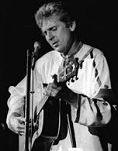
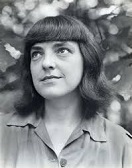
In 1963 Pete Seeger et al. organize a concert at Carnegie Hall in New York City featuring the Freedom Singers to benefit the Highlander Folk School in New Market, Tenn., dir. by folk singer Guy Hughes Carawan Jr. (1927-2015), bringing the anthem We Shall Overcome, written in 1947 by white Spadra, Ark.-born Highlander student Zilphia Horton (Zilphia Mae Johnson) (1910-56) to public attention.

On Jan. 8, 1964 (Wed.) (6:00 p.m. CST) LBJ's First State of the Union Address in Congress in Washington, D.C. (first to be shown on prime time TV), contains the soundbyte "This administration today, here and now, declares unconditional war on poverty in America", launching his War on Poverty; on Mar. 16 LBJ submits his $1B War on Poverty Program to Congress (ends 1968), designed by Keynesian economist Walter Wolfgang Heller (1915-87) (not to be confused with "Catch-22" author Joseph Heller), who suggested it to him the day after JFK's assassination; he signs it on Aug. 20, but when LBJ escalates the Vietnam War without raising taxes, threatening an inflationary spiral, Heller resigns; poverty in the U.S. was plummeting until LBJ declared war on it, dropping further from 22% to 12.6% by 1970, then increasing as people on welfare lose the incentive to work?; "Wars on nations change maps; war on poverty maps change" (Muhammad Ali) - war on spare change maps national poverty?

On Jan. 21, 1964 JFK's deputy asst. secy. of state and U.N. delegate Carl Thomas Rowan (1925-2000) is appointed dir. of the U.S. Info. Agency (USIA) by LBJ, becoming the first African-Am. dir.; he resigns next year after he and Johnson are accused of adding a pro-admin. bias to Voice of Am. broadcasts.

On Jan. 23, 1964 (2 years after its passage by the U.S. Senate and 13 years after its proposal) poll taxes for U.S. federal elections are finally ended by the 24th (XXIV) Amendment to the U.S. Constitution, authored by U.S. Sen. (D-Fla.) (1946-71) Spessard Lindsey Holland (1892-1971); blacks now don't have to pay whites to vote, if they can still make it in one piece to the polling place? - oh oh, I think I slipped in the bathtub?

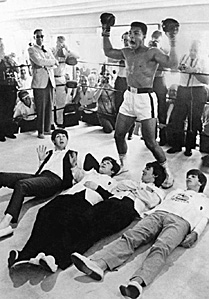

World blacks get an incorruptible black-is-beautiful hero after he defeats a scary black monster and makes it look easy? On Feb. 18, 1964 after Sonny Liston says that he doesn't want to meet the "bums", the Beatles visit with Cassius Clay in Fla. while in training for his match with Liston; too bad, the cocky Beatles get out-cocked by cock of the walk Clay, after which John Lennon utters the soundbyte "That man made a fool of us." On Feb. 25, 1964 bigmouth underdog Cassius Marcellus Clay Jr. (1942-) shakes up the world when he KOs unbeatable WBA world heavyweight boxing champ (since 1962) Charles L. "Sonny" Liston (1928-71) in Miami Beach, Fla. in round 7 after Liston refuses to come out of his corner, claiming a left shoulder injury, leading to rumors of a fix, becoming world heavyweight boxing champ #22 (until 1967); in round 5 Clay had to fight blind after he got a caustic substance in his eyes from Liston's face; after winning, Clay gives his I Shook Up the World Speech to the press, with the immortal soundbyte "I am the greatest" (inspired by wrestler Gorgeous George), also "He wanted to go to heaven, so I took him in seven"; Clay's connections with the Nation of Islam and Malcolm X are covered up by the press until he wins and asks the press to forget his "slave name" and call him Cassius X; on Mar. 6 Nation of Islam leader Elijah Muhammad gives him the new name Muhammad Ali, and suspends Malcolm X from the org., causing him to announce on Mar. 8 that he is forming his own black nationalist party, formally quitting on Mar. 12; Clay officially becomes Black Muslim Muhammad Ali next Feb. 5.
On Feb. 26, 1964 the Stay Out for Freedom protest seeks 20K of the 100K students of the public school system in Boston, Mass. boycott classes to protest segregation, while 10K flock to 34 temporary Freedom Schools.
On Mar. 9, 1964 the U.S. Supreme Court in New York Times Co. v. Sullivan unanimously reverses a $500K judgment in favor of Montgomery, Ala. city commissioner L.B. Sullivan, who sued the paper for claiming that Martin Luther King Jr.'s arrest for perjury was part of a campaign to destroy his integration and black voting efforts, and lucked out when the "truth defense" was ruined by factual errors in the article; instead, the court comes up with the new "actual malice" test, that the publisher must have had "actual malice", i.e., knowledge that the info. was false in advance of pub., or have pub. it with reckless disregard of its truth or falsity, with malicious intent being irrelevant, forcing the person alleging defamation to have to prove untruth to recover damages, rather than the defendant prove truth, and in addition have to prove the publisher's mental state prior to pub. - so always say "I'm really exposing this guy" rather than "I'm really smearing this guy" when on the phone?

On Apr. 12, 1964 Omaha, Neb.-born former Nation of Islam leader Malcolm X (1925-65) delivers his Ballot or Bullet Speech in Detroit, Mich., with the message that either one or the other will come next in the U.S. civil rights struggle, containing the soundbyte: "Why does it look like it might be the year of the ballot or the bullet? Because Negroes have listened to the trickery, and the lies, and the false promises of the white man now for too long. And they're fed up. They've become disenchanted. They've become disillusioned. They've become dissatisfied, and all of this has built up frustrations in the black community that makes the black community throughout America today more explosive than all of the atomic bombs the Russians can ever invent. Whenever you got a racial powder keg sitting in your lap, you're in more trouble than if you had an atomic powder keg sitting in your lap. When a racial powder keg goes off, it doesn't care who it knocks out of the way. Understand this, it's dangerous" - he didn't mention that the bullets might be fired at him?
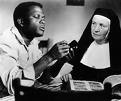

On Apr. 13, 1964 the 36th Academy Awards awards the best picture Oscar for 1963 to United Artists' (Lopert Pictures, Woodfall Productions) Tom Jones, along with best dir. to Tony Richardson; Sidney Poitier (1927-) becomes the first black to win a best actor Oscar for Lilies of the Field; best actress goes to Patricia Neal for Hud, best supporting actor to Melvyn Douglas for Hud, and best supporting actress to Margaret Rutherford for The V.I.P.'s.
On Apr. 22, 1964 Pres. Johnson opens the 1964-1965 New York World's Fair in Queens (ends Oct. 17, then reopens from Apr. 21-Oct. 17, 1965), while Congress of Racial Equality (CORE) protesters try to drown him out; being within 10 years of the 1962 Seattle World's Fair, some countries bug out, saving up for Expo 67 in Montreal, and the Bureau of Internat. Expositions refuses to sanction it, further diminishing the power of N.Y. planning czar Robert Moses; it features the futuristic 140-ft.-high 120-ft.-diam. 350 ton Unisphere, and a house made of formica; the Ma Bell pavilion features a picture phone; the IBM pavilion hosts a multimedia show of how a computer works, and coins the term "word processing"; the It's A Small World (After All) exhibit by Disney is a hit, along with an audio-animatronic Abraham Lincoln in the Ill. Pavilion, both moved later to Disneyland; the strawberry and whipped cream "Bel-Gem" Belgian waffle is a hit; sci-fi writer Isaac Asimov (1920-92) pub. an article on the 2014 World's Fair, with the soundbytes: "Robots will neither be common nor very good in 2014, but they will be in existence", "Communications will become sight-sound and you will see as well as hear the person you telephone. The screen can be used not only to see the people you call but also for studying documents and photographs and reading passages from books"; "In 2014, there is every likelihood that the world population will be 6,500,000,000 and the population of the United States will be 350,000,000"; "A larger portion [of the U.S.] than today will be deprived and although they may be better off, materially, than today, they will be further behind when compared with the advanced portions of the world. They will have moved backward, relatively"; "General Electric at the 2014 World's Fair will be showing 3-D movies of its 'Robot of the Future,' neat and streamlined, its cleaning appliances built in and performing all tasks briskly. (There will be a three-hour wait in line to see the film, for some things never change.)"

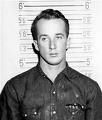
On May 2, 1964 black teenagers Charles Eddie Moore (b. 1945) and Henry Hezekiah Dee (b. 1945) are kidnapped while hitchhiking along U.S. 84 outside Meadville, Mass. by KKK members James Ford Seale (1936-) and Charles Marcus Edwards (1933-), taken to Homochitto Nat. Forest and tortured, then taken 100 mi. and thrown alive into Ole River in Warren County, Miss. near Tallulah, La. lashed to an engine block and railroad tracks, and later found in July 1964 during the search for the three "Mississippi Burning" civil rights workers; after a KKK leader rats them out, they are arrested in Nov. by FBI agents, then turned over to local authorities, who drop the case; in 2005 the prosecution of Edgar Ray Killen causes Moore's brother Thomas to look Seale up and get the case reopened, resulting in the arrest of the sick old man a few mi. from where the kidnapping took place on Jan. 24, 2007; on Aug. 24, 2007 he is given three life sentences.
On June 6, 1964 Japanese atomic bomb survivors (Hibakusha) arrive in Harlem, N.Y. to speak out against nuclear proliferation, meeting with Malcolm X, who utters the soundbyte: "You have been scarred by the atom bomb. You just saw that we have also been scarred. The bomb that hit us was racism."

On June 18, 1964 the "Splash Heard Round the World" sees the white owner of the Monson Motor Lodge in Ft. Lauderdale, Fla. break up an integrated "swim-in" by pouring acid into the pool, after which the nat. uproar helps get the 1964 U.S. Civil Rights Act passed. On June 19 the 1964 U.S. Civil Rights Act is approved by the U.S. Senate by 73-27, protecting constitutional rights for blacks in public facilities and public education and prohibiting discrimination in federally-funded programs by citing the commerce clause of the U.S. Constitution; on July 2 Pres. Johnson (an arch-enemy of the Ku Klux Klan) eagerly signs it; Title VII bars discrimination in employment on the basis of "race, color, religion, sex or national origin", and establishes the Equal Employment Opportunity Commission (EEOC) to take complaints, investigate, and impose penalties; U.S. rep. (1955-74) Martha Wright Griffiths (1912-2003) (D-Mich.) led the effort to keep the word "sex" in the bill.



On June 21, 1964 the Freedom Summer begins when three civil rights workers, black Mississippian James Earl "J.E." Chaney (b. 1943), and white Jewish New Yorkers Andrew Goodman (b. 1943) and Michael "Mickey" Schwerner (1939-) (a CORE organizer) disappear in Philadelphia, Miss. after stopping to investigate the burning of a black church for supporting civil rights activity, then being jailed briefly by cracker police for speeding in their station wagon; after a nat. uproar, on June 25 Pres. Johnson orders 200 naval personnel to Miss. to assist in finding them, and orders the FBI to investigate the case, causing J. Edgar Hoover to balk until LBJ strongarms him; the Navy divers go on to find the bodies of seven other Miss. blacks who disappeared in the past several years, and only find the big three on Aug. 4 after offering a $25K reward; the Ku Klux Klan is later proved to have beaten and shot them to death and buried them in an earthen dam on Olen Burrage's Old Jolly Farm 6 mi. SW of Philadelphia, Miss. on the orders of KKK leader (sawmill operator and part-time preacher) Edgar Ray Killen (1925-) (eager to rape and kill 'em?), who gives himself an alibi by attending a wake at a funeral home; next Jan. 16 18 people are arrested for the murders, incl. Killen, sheriff Lawrence Rainey (acquitted), deputy sheriff Cecil Price, and KKK imperial wizard Samuel Bowers, of which seven are found guilty, receiving sentences of 3-10 years, and serving no more than six; after the jury deadlocks on his charges, and the system fails to bring him to justice for decades, during which time three films are released on the case, Killen is finally convicted of manslaughter on June 21, 2005 in Philadelphia, Miss., receiving three 20-year sentences.
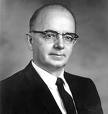
On July 3, 1964 failed white supremacist political candidate Lester Garfield Maddox (1915-2003) chases three black bucks from his Pickrick Cafeteria in Atlanta, Ga. at 891 Hemphill Ave. (across the street from Georgia Tech.) (opened 1947) with an axe handle, gaining nat. publicity, then goes on to become gov. of Ga. from 1967-71, winning against several candidates incl. Jimmy Carter (1924-), and going on to prove a moderate, appointing blacks to state office. In 1974 he opens his 2nd Pickrick fried chicken restaurant in Atlanta, Ga., serving all races and selling souvenir axe handles.

On July 18-23, 1964 the Harlem Race Riot starts peacefully to protest the killing of 15-y.-o. black teenie James Powell by white police officer Thomas Gilligan, then escalates, spreading to Bedford-Stuyvesant in Brooklyn; it is finally stopped after 400-500 are arrested by 6K pigs, with 500 injured, and property damage of $500K-$1M; a peaceful rally on July 25 results in the arrest of black Maoist activist William Leo "Bill" Epton Jr. (1932-2002) for hanging posters reading "Wanted for Murder: Gilligan the Cop" and for shouting "Burn, Baby, Burn", becoming the first person convicted in the U.S. of criminal anarchy since the 1919 Red Scare; he loses his appeal despite the law being changed in 1966 making his protest legal again, and serves 1 year on Rikers Island.
On July 24-27, 1964 the Rochester, N.Y. Race Riot starts with an arrest at a street dance, then escalates, causing the Nat. Guard to be called to a Northern city for the first time, resulting in four killed (3 in a heli crash) and 350 injured, with 1K arrests and 204 stores looted or damaged; after this a wave of black riots in protest of police brutality rock the U.S. until 1969, causing white flight to the suburbs.

On Aug. 1, 1964 Arthur Ashe (1943-93) becomes the first African-Am. to play on the U.S. Davis Cup tennis team, which loses to Australia; he goes on to win the U.S. Open in 1968 and Wimbledon in 1975, becoming a leading straight spokesperson for AIDS before his death.
On Aug. 2-4, 1964 the Jersey City, N.J. Race Riot starts with the arrest of a black woman for disorderly conduct, after which 800 blacks begin looting and rioting, demanding the hiring of more black policemen and the cleanup of the city, incl. better parks; after Irish-Am. mayor (1963-71) Thomas J. Whelan (1922-2002) refuses to discuss the blacks' demands, 400 police finally shut them down with 52 arrests after 46 are injured and 71 stores or businesses damaged. On Aug. 4 the bodies of missing civil rights workers Michael H. Schwerner, Andrew Goodman, and James E. Chaney are found buried in an earthen dam in Nashoba County, Miss. On Aug. 11-13 the Paterson, N.J. Race Riot is accompanied by the Elizabeth, N.J. Race Riot. On Aug. 15-17 the Chicago Race Riot in Ill. starts in the suburb of Dixmoor. On Aug. 28-30 the Philadelphia Race Riot in Penn. over police brutality in the arrest and rumored death of Odessa Bradford in North Philly results in 744 arrests and 341 injured, causing white flight from Philly to begin.
On Aug. 24-27, 1964 the 1964 Dem. Nat. Convention is held in Atlantic City, N.J., nominating Lyndon B. Johnson (LBJ) for pres., and Hubert H. Humphrey (HHH) of Minn. for vice-pres.; on Aug. 22 black civil rights activist Fannie Lou Hamer (nee Townsend) (1917-77) of the mainly black Miss. Freedom Dem. Party challenges the credentials of the all-white Miss. delegation, causing a split that drives a lot of conservative white Southerners out of the Dem. Party; the LBJ campaign is a sure-winner by portraying Goldwater as a Dr. Strangelove, running a TV commercial showing a young girl plucking petals off a daisy while counting to 10, followed by a nuclear countown and a nuclear mushroom cloud, and LBJ overdubbing the soundbyte "We must either love each other or we must die", followed by "Vote for President Johnson on November 3. The stakes are too high for you to stay home."
On Dec. 14, 1964 the U.S. Supreme (Warren) Court rules unanimously in Heart of Atlanta Motel v. U.S. that the 1964 U.S. Civil Rights Act requires public accommodations to refrain from racial discrimination; on Dec. 14 it also rules unanimously in Katzenbach v. McClung that the 1964 U.S. Civil Rights Act applies to restaurants because it serves food that has moved in interstate commerce, stretching it to apply to virtually all businesses.

On Feb. 14, 1965 after being denounced by his former org. the Nation of Islam as a Judas, Malcolm X's home is firebombed with Molotov cocktails thrown through the windows while his children sleep, causing no injuries, after which Malcom tells Mike Wallace of CBS-TV "Oh yes, I probably am a dead man already." On Feb. 21 ousted Nation of Islam leader (h.s. dropout and convicted robber) El-Hajj Malik El-Shabazz, AKA Malcolm X (Little) (b. 1925) is assassinated in front of 400 people during a speech in the Audubon Ballroom in Upper Manhattan, N.Y. by three Black Muslims toting a double-barrel shotgun and pistols which hit him 15x, leaving pregnant-with-twin-daughters Detroit, Mich.-born widow Betty Shabazz (nee Betty Jean Saunders) (1936-97) (AKA Betty X) and four daughters, after which Ossie Davis eulogizes him as "our shining black prince"; three Nation of Islam members are later convicted, incl. Norman 3X Butler (Muhammad Abdul Aziz) (1938-), Khalil Islam (Thomas 15X Johnson) (1935-) (who claims innocence), and Talmadge Hayer (Thomas Hagan) (1942-) (who is caught at the scene and confesses, but claims that Butler and Johnson are innocent); a 4th accomplice who caused a diversion before the shooting escapes; Aziz is paroled in 1985, and is appointed in 1998 by Louis Farrakhan to head a mosque in Harlem, N.Y.; Hagan, the only man to admit to the shooting is paroled in 2010. "Just as a tree without roots is dead, a people without history or culture also becomes a dead people"; "A man who stands for nothing will fall for anything"; "The love of liberty is the love of others; the love of power is the love of ourselves."
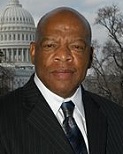

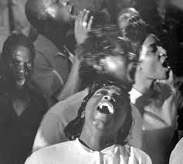
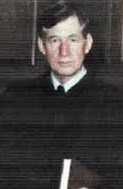
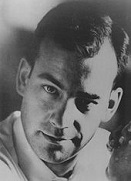
Alabama, sweet home of violent white bigots stinks up America and turns into their Gettysburg, losing the segregation war? On Mar. 6, 1965 a black would-be voter is murdered by whites in Perry County, near Selma, Ala., causing Mar. 7 to become known as Bloody Sunday as state troopers and a sheriff's posse attack 600 civil rights protesters in Selma with billy clubs, tear gas and wet bullwhips while marching from the Brown's Chapel African Methodist Episcopal Church to the ">Edmund Winston Pettus Bridge over the Alabama River; a famous photo shows John Robert Lewis (1940-2020) of the SNCC (later a U.S. Dem. Ga. rep.) being beaten on the ground by a white trooper bashing his head in with a nightstick; scores of marchers are injured, and 17 are hospitalized, incl. Larry Platt (1947-), who is later given the nickname "General Platt" and has a 2010 hit song "Pants on the Ground"; MLK Jr. rushes from Atlanta to Selma to lead a biracial protest march on Mar. 9, attended by 300, along with sympathy demonstrations in many Northern cities, but King quickly ends the march to comply with a court order; Pres. Johnson tasks Ala. officials for "the brutality with which a number of Negro citizens were treated; on Mar. 9 white Boston Unitarian Universalist minister Rev. James J. Reeb (b. 1927) is beaten by club-wielding white racists as he leaves a black restaurant, dying on Mar. 11 in Birmingham of massive head injuries, causing a nat. outcry, Pres. Johnson calling it "an American tragedy" that should spark the nation "to bring full and equal and exact justice to all of our people", sending 4K troops to protect the marchers on Mar. 20; Haleyville, Ala.-born federal judge Frank Minis Johnson Jr. (1918-99) of Montgomery (who ruled in favor of Rosa Parks in 1956 and suffered a burning cross on his lawn) allows a new procession because the white behavior had surpassed "the outer limits of what is constitutionally permissible"; journalist Haynes Bonner Johnson (1931-2013) wins a Pulitzer Prize for coverage of the Selma crisis, becoming the first time that a father and son receive a Pulitzer in history after his father Malcolm Johnson won in 1949 for the "Crime on the Waterfront" series that was turned into the 1954 film; three white men are later acquitted of Reeb's murder by a white jury; it took the death of a white to get LBJ off his fence?


A Southern white president says we shall overcome? On Mar. 15, 1965 after meeting with Ala. gov. George Wallace and breaking "the runty little bastard" with power politics (without making a martyr of him or inciting a new Civil War) Pres. Johnson addresses a joint session of Congress, calling on it to pass the U.S. Voting Rights Act, a result of the lobbying of U. of Ala. black activist Gracie Hawthorne et al., and delivering his We Shall Overcome Speech, with the soundbyte: "At times, history and fate meet at a single time in a single place to shape a turning point in man's unending search for freedom. So it was at Lexington and Concord. So it was a century ago at Appomattox. So it was last week in Selma", followed by "Their cause must be our cause too, because it's not just Negroes, but really it's all of us who must overcome the crippling legacy of bigotry and injustice. And we shall overcome"; on Mar. 17 he gives a speech attacking literacy tests; it passes on Aug. 6 after Sen. minority leader, Ill. Repub. Sen. (1951-69) Everett McKinley Dirksen (1896-1969) delivers all but two of the Senate Repub. votes, causing LBJ to call him up and tell him "You must have made a hell of a speech out there today", to which Dirksen replies "We are proud"; on Aug. 6 as Johnson signs the law he predicts that it will kill the Dem. Party in the South as blacks vote Dem. and whites flee to the Repub. Party; too bad, it ends up being used to gerrymander congressional districts on racial lines; special provisions that expire in 2007 require the Justice Dept. to approve all changes in election laws in certain jurisdictions like the South, near Indian reservations and in cities with large minority pops.; the U.S. Supreme Court goes on to uphold the 1965 U.S. Voting Rights Act 8-1 in S.C. v. Katzenbach (Mar. 7, 1966), then rules 6-3 that certain section are outdated in Shelby County v. Holder (June 25, 2013).


Assume the position, suckah? On Aug. 11-16, 1965 after two black youths clash with the Calif. Highway Patrol, the Watts Riots (worst race riots since 1943 Detroit?) begin in the 98% black Watts section of South Los Angeles, Calif. (only five black cops in a 205-man force), causing 34 deaths, 857 injured, 2.2K arrested, and $50M-$200M in property damage; it all starts when white that's-me-in-the-leather-jacket-and-tight-shoes Calif. Highway Patrol (CHiPS) officer Lee W. Minikus stops black driver Marquette (Ronald) Frye (1944-86) (who had been drinking vodka and orange juice) at the corner of Avalon Blvd. and Imperial Hwy. during the 4th day of a heat wave, and his mommy shows up and jumps the honky as he tries to arrest her son and force him into his car, allegedly brutally beating him; rumors begin that the pigs had hit a pregnant woman in the belly with a club and/or tried to choke her, causing a mob to form by 10 p.m, and at 11 p.m. 2K pissed-off blacks begin roving and looting; on Aug. 12 at 7:45 p.m. the riots resume, and black comedian Richard Claxton "Dick" Gregory (1932-2017) is wounded in the leg as he tours with a bullhorn begging for order; on Aug. 13 at 10 a.m. two white salesmen are attacked, followed by a white pig wounding a black looter at 11 a.m., causing 20K Nat. Guard troops to arrive by the afternoon as 5K rioters roam a 150-block area throwing Molotov cocktails; at 9:40 p.m. a sheriff's deputy is mortally wounded, followed by three more deaths; looters ignore signs on stores reading "Owned by a Brother"; on Aug. 14 snipers begin picking off soldiers and pigs, and the Nat. Guard force is increased to 14K, with a curfew imposed; the riots end on Aug. 16 after six days; on Aug. 18 police arrest 35 blacks after a gunfight at a Black Muslim mosque. On Aug. 12 a black riot starts in West Chicago, Ill. after a fire truck kills a black woman while answering an alarm in West Garfield Park; by Aug. 13 100 are arrested and 67 injured, and 2K Nat. Guardsmen are mobilized.
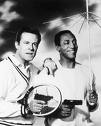
On Sept. 15, 1965 (Wed.) the cool TV series I Spy, produced by Sheldon Leonard debuts for 82 episodes (until Apr. 15, 1968), starring Robert Martin Culp (1930-2010) as internat. tennis star Kelly Robinson, and William Henry "Bill" Cosby Jr. (1937-) as his Man Friday, er, black trainer Alexander Scott, who are really U.S. spies and totally equal; Three-F Productions is formed by David Friedkin, Morton Fine, and Fouaid Said to produce the show.
On Sept. 24, 1965 Pres. Johnson issues Executive Order 11246, which "prohibits federal contractors and federally assisted construction contractors and subcontractors, who do over $10,000 in government business in one year from discriminating in employment decisions on the basis of race, color, religion, sex, or national origin."



On Oct. 3, 1965 after testimony by Harvard U. immigration historian Oscar Handlin (1915-2011) helps persuade Congress, and it passes the U.S. House by 326-69 and the U.S. Senate by 76-18, LBJ signs the U.S. Hart-Celler Immigration Act of 1965 (effective June 30, 1968) on Liberty Island, backed by Ted Kennedy against mainly white Southern opposition, abolishing the discriminatory 1924 quota system by removing "national origin" language, and making family unification the overarching policy, with the soundbyte: "This system violates the basic principle of American democracy, the principle that values and rewards each man on the basis of his merit as a man. It has been un-American in the highest sense, because it has been untrue to the faith that brought thousands to these shores even before we were a country"; permitting up to 300K immigrants a year, incl. 170K from the Eastern Hemisphere and only 120K from the Western Hemisphere (no more than 20K per country), the act becomes effective on July 1, 1968, and soon causes Asian Hindu and Muslim immigration to increase, resulting in a marked reduction of the percentage of whites and Christians in the U.S. pop.; it later becomes a key factor in the 2009 election of Pres. Barack Obama; it was sponsored by U.S. Rep. (D-N.Y.) (1923-73) Emanuel Celler (1888-1981) (who worked to get it passed since 1924), and co-sponsored by U.S. Sen. (D-Mich.) (1959-76) Philip Aloysius Hart (1912-76) ("the Conscience of the Senate"); on the Senate floor, after Ted Kennedy utters the soundbyte: "First, our cities will not be flooded with a million immigrants annually. Under the proposed bill, the present level of immigration remains substantially the same... Secondly, the ethnic mix of this country will not be upset... Contrary to the charges in some quarters, [the bill] will not inundate America with immigrants from any one country or area, or the most populated and deprived nations of Africa and Asia... In the final analysis, the ethnic pattern of immigration under the proposed measure is not expected to change as sharply as the critics seem to think... The bill will not flood our cities with immigrants, it will not upset the ethnic mix of our society, it will not relax the standards of admission, it will not cause American workers to lose their jobs" - he croaks just about the time the jig is up on his predictions?

On Jan. 13, 1966 Robert Clifton Weaver (1907-97) becomes the first African-Am. to hold a U.S. cabinet post as Pres. Johnson appoints him head of the new U.S. Dept. of Housing and Urban Development (HUD) (until Dec. 18, 1968).

On Jan. 17, 1966 Carl Maxie Brashear (1931-2006), the first African-Am. U.S. Navy diver is involved in an accident during recovery operations, resulting in a leg being amputated; on Apr. 1, 1968 he becomes the first amputee certified to make diving missions, culminating a long battle with the Navy brass - didn't I see that on Batman?
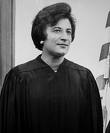
On Jan. 25, 1966 Pres. Johnson appoints NAACP atty. Constance Baker Motley (1921-2005) to the U.S. District Court for the Southern District of N.Y. at the urging of Sen. Robert Kennedy, with the support of Repub. N.Y. Sen. Jacob K. Javits, becoming the first African-Am. woman federal judge; her long civil rights record incl. jail time with Martin Luther King Jr. (1929-68), direction of James Meredith's U. of Miss. campaign and Autherine Lucy's U. of Ala. campaign; she helped write the briefs for the Brown v. Board of Ed. case, and was the first black woman to argue a case before the U.S. Supreme Court, winning 9 of 10 cases; a motley crew of 1,469 blacks now hold public office in the U.S.


On Mar. 22, 1966 GM chmn. (1965-71) James M. Roche (1906-2004), who rose through the ranks apologizes to Ralph Nader before a U.S. Senate subcommittee for his co.'s harassment, spying, and intimidation campaign; in 1971 before retiring he offers Philly black activist Baptist minister Rev. Leon Howard Sullivan (1922-2001) a seat on the GM board, and works to have GM and other corps. leave South Africa in protest against apartheid.
On Mar. 24, 1966 the U.S. Supreme (Warren) Court rules 6-3 in Harper v. Va. Board of Elections that poll taxes in state elections are illegal, extending the 24th U.S. Amendment of 1964, with dissenting Justices John M. Harlan II and Potter Stewart saying that it's a states rights issue, and dissenting Justice Hugo Black saying that new meanings to the 14th Amendment require constitutional amendments.
On May 13, 1966 U.S. HEW secy. John W. Gardner orders federal funds to be withheld from 12 school districts in Ala., La., and Miss. that are in violation of 1964 Civil Rights Act guidelines; he ignores Northern school districts; on June 26 the U.S. Court of Appeals in New Orleans pioneers affirmative action in U.S. v. Jefferson County, Ala. Board of Education, ruling that Southern schools must integrate all levels from K-12, with the soundbyte "The Constitution is color-conscious to prevent discrimination being perpetuated and to undo the effects of past discrimination. The criterion is the relevancy of color to a legitimate government purpose."

The U.S. civil rights movement splits over non-violence? On June 5, 1966 James Meredith leaves Memphis, Tenn. for a solo March Against Fear 220 mi. to Jackson, Miss. to encourage blacks to vote; on June 6 he is felled by shotgun blasts; after nat. civil rights leaders meet with him at his hospital bedside, the march continues on June 9, the marchers numbering several thousand; after they are gassed and beaten along the way, the civil rights movement splits irrevocably when on June 16 in Greenwood, Miss. Stokely Standiford Churchill Carmichael (1941-98), new chmn. (until 1967) of the Student Nonviolent Coordinating Committee (succeeding John Lewis) gives a speech, saying: "This is the 27th time that I've been arrested. I ain't going to jail no more. The only way we gonna stop them white men from whuppin' us is to take over. What we gonna start sayin' now is Black Power"; he is also the first to use the raised fist, causing Roy Wilkins of the NAACP and Whitney Young of the Nat. Urban League to abandon the march; Martin Luther King Jr. remains, addressing a rally in Jackson on June 26 attended by 15K, but the movement stays split, and Carmichael leaves the SNCC for the Black Panther Party.

On June 6, 1966 (Mon.) (6-6-66) U.S. Sen. (D-Mass.) Robert Francis Kennedy (1925-68) gives his Day of Affirmation Speech to 15K racially-integrated students at the U. of Cape Town in South Africa, bemoaning apartheid and uttering the soundbyte: "Few will have the greatness to bend history itself, but each of us can work to change a small portion of events, and in the total of all those acts will be written the history of this generation... It is from numberless diverse acts of courage and belief that human history is thus shaped. Each time a man stands up for an ideal, or acts to improve the lot of others, or strikes out against injustice, he sends forth a tiny ripple of hope, and crossing each other from a million different centers of energy and daring those ripples build a current which can sweep down the mightiest walls of oppression and resistance."

On Jan. 10, 1966 Nashville, Tenn.-born black activist Horace Julian Bond (1940-2015) is denied his seat in the Ga. legislature for opposing the Vietnam War; in 1968 he becomes the first black Dem. candidate for U.S. vice pres.

On June 18, 1966 marine biologist Samuel Milton Nabrit (1905-2003) becomes the first African-Am. to serve on the Atomic Energy Commission (AEC).
On July 18-24, 1966 (nights) after a bar posts a sign reading "No Water for Niggers", causing a crowd to form and the pigs to arrive, the Hough Race Riots become the first race riots in the history of Cleveland, Ohio, killing four and injuring 30, with 240 fires and 275 arrests before the Nat. Guard ends it, after which white flight reduces the white pop. to 42% by the end of the cent. - if you're white hough better pack your bags? On Aug. 8-9 the Lansing Race Riot in Mich. sees 200-300 black youths rampage for two nights, causing Mich. gov. George Romney to denounce advocates of Black Power and threaten action. On Sept. 6 the Atlanta Race Riot in the Summerhill section near Atlanta Stadium in Ga. breaks the image of the "city too busy to hate".
On Aug. 5, 1966 Martin Luther King Jr. is hit in the head with a rock thrown by an angry white mob during a march in mostly white Cicero, Ill. after they think he's trying to integrate them with the black community to the south - don't make me break out my woman?
On Sept. 12, 1966 after a year of black protests, the town of Grenada, Miss. becomes a scene of racial strife as white mobs attack black children trying to integrate white schools while the police do nothing; folk singer Joan Baez and other activists try to protect the children, only to be harassed by the police; on Sept. 16 a judge issues an injunction, causing state troopers to be called out; on Sept. 18 the FBI arrests 13 whites on conspiracy charges, causing the mobs to disappear; on Sept. 19 MLK Jr. addresses a rally of 650; too bad, the fight goes to another level as the children are harassed in the schools, causing walkouts, strikes, and boycotts the rest of the year - how can people in a free country be forced to mix?
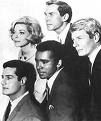
On Sept. 17, 1966 the hip spy show Mission: Impossible debuts on CBS-TV (until Mar. 1973), starring Steven Hill (1922-) as team leader Dan Briggs (1st season), then Peter Graves (1926-2010) (brother of "Matt Dillon in Gunsmoke" actor James Arness) as team leader Jim Phelps, Barbara Bain (1931-) and Martin Landau (1931-) as chameleon rubber-mask agents Cinnamon and Rollin Hand, Greg Morris (1933-96) as white-shirted has-to-be-black electronics whiz Barney Collier, and 6'4" Peter Lupus (1932-) as blue collar Italian muscleman Willy Armitage; in season four Leonard Nimoy replaces Landau as magician "The Great Paris", who is replaced in season six by Lynda Day George (1944-) as master of disguise Lisa Casey; the cool (5/4-time) Mission: Impossible Theme by Lalo Schifrin (1932-) is a hit single in 1968; the creeping feeling that the network execs are giving away the big secret of the JFK assassination conspiracy supercharges it?


On Oct. 15, 1966 Monroe, La.-born Huey Percy Newton (1942-89) and Liberty, Tex.-born Robert George "Bobby" Seale (1936-) found the rev. Socialist Black Panther Party for Self-Defense in Oakland, Calif., with the motto "Power to the people"; too, blacks decide to exclude whites (esp. liberal Jews) from the U.S. civil rights movement, causing Jewish orgs. in the U.S. to stop representing Am. Jewish interests in favor of backing Israel.

On Nov. 8, 1966 Repub. Edward William Brooke III (1919-2015) of Mass. becomes the first African-Am. elected to the U.S. Senate by popular vote since Reconstruction (85 years) (until 1979), winning by over 500K votes, and is the only black in the U.S. Senate until 1993 (Dem. Carol Moseley Braun).

12-26-66, how Christmasy? On Dec. 26, 1966 Md.-born Malcolm X admirer Maulana Karenga (Swahili "master teacher nationalist") (Ronald McKinley "Ron" Everett) (1941-), 1 965 founder of the cultural black nationalist group Org. Us after the Watts Riots, and (later chmn. of the black studies dept. at Cal. State Long Beach from 1989-2002) celebrates the first Kwanzaa (Swahili "first fruits"), billed as a 7-day non-religious African-Am. celebration of family and heritage, culiminating in the Karamzu feast, which attracts 5M participants annually by 1990; too bad, Karenga is convicted in 1971 of felony assault for torturing two women from his org., then goes Marxist in priz before being released in 1975, promulgating the Seven Principles of Blackness (Nguzo Saba).
In 1966 Barbara Connell's and William C. Jersey's A Time for Burning debuts, a documentary chronicling the unsuccessful attempts of Neb. Lutheran minister Rev. L. William Youngdahl to integrate his church, ending up losing his job.
In 1966 the term "Afro" (AKA natural) is coined for the disturbingly big round bushy hairstyle of black-is-beautiful African-Ams.

In 1966 after witnessing the mistreatment of segregated black soldiers on a troop ship heading to France in fall 1945, making him devote his career to the study of slavery, Denver, Colo.-born Cornell U. cultural historian David Brion Davis (1927-) pub. The Problem of Slavery in Western Culture (Pulitzer Prize) (rev. ed. 1988), which contains the soundbyte: "I have long interpreted the problem of slavery as centering on the impossibility of converting humans into the totally compliant, submissive, accepting chattel symbolized by Aristotle’s ideal of the 'natural slave'", using the violent Haitian Rev. of 1791-1804 to bolster the "animalization" of blacks, with white slaveholders projecting onto their black slaves the qualities they repressed in themselves, making them represent "the finitude, imperfections, sensuality, self-mockery and depravity of human nature, thereby amplifying the opposite qualities in the white race"; "Moral progress seems to be historical, cultural and institutional, not the result of a genetic improvement in human nature." He follows with Ante-Bellum Reform (1967). In 1968 he pub. Some Recent Directions in American Cultural History in Am. Historical Review, urging historians to cover the cultural dimension. He follows with The Slave Power Conspiracy and the Paranoid Style (1969), Was Thomas Jefferson an Authentic Enemy of Slavery? (1970), The Fear of Conspiracy: Images of Un-American Subversion from the Revolution to the Present (1971), The Problem of Slavery in the Age of Revolution, 1770-1823, The Great Republic, Part III: Expanding the Republic, 1820-1860 (2 vols.) (w/Bernard Bailyn et al.) (2nd ed. 1981, 3rd ed. 1985, 4th ed. 1992), Antebellum American Culture: An Interpretive Anthology (1979) (2nd ed. 1997), The Emancipation Moment (1984), Slavery and Human Progress (1984), Slavery in the Colonial Chesapeake (1986), From Homicide to Slavery: Studies in American Culture (1986), Revolutions: Reflections on American Equality and Foreign Liberations (1990), The Antislavery Debate: Capitalism and Abolitionism as a Problem in Historical Interpretation (w/Thomas Bender) (1992), The Boisterous Sea of Liberty: A Documentary History of America from Discovery through the Civil War (w/Steven Mintz) (1998), In the Image of God: Religion, Moral Values, and Our Heritage of Slavery (2001), Challenging the Boundaries of Slavery (2003), Inhuman Bondage: The Rise and Fall of Slavery in the New World (2006) (Ralpo Waldo Emerson Award), and The Problem of Slavery in the Age of Emancipation (2014). In 2014 Pres. Barack Obama presents him with the Nat. Humanities Medal for "reshaping our understanding of history", praising him for shedding "light on the contradiction of a Union founded on liberty, yet existing half-slave and half-free", adding that his "examinations of slavery and abolitionism drive us to keep making moral progress in our time." "No scholar has played a larger role in expanding contemporary understanding of how slavery shaped the history of the United States, the Americas, and the world than David Brion Davis." (Ira Berlin)

On Jan. 3, 1967 liberal Repub. Edward William Brooke III (1919-2015) becomes the first popularly elected African-Am. Mass. U.S. Sen. (until Jan. 3, 1979)., going on to co-write the 1968 U.S. Civil Rights Act of 1968 and become the first Senate Repub. to call for Pres. Nixon's resignation after Watergate.

On Jan. 16, 1967 after state law prevents another term, George Wallace's wife Lurleen Burns Wallace (1926-68) becomes gov. of Ala. (until May 7, 1968), being sworn in on the same spot where Jefferson Davis took his oath for Confed. pres. in 1861 and vowing to continue the fight against racial integration and the feds, becoming the 3rd female U.S. state gov.; she dies next May 7 of cancer; meanwhile he begins campaigning for U.S. pres.


On Mar. 1, 1967 New York Dem. rep. Adam Clayton Powell Jr. (1908-72), accused of misconduct is denied his seat in the 90th Congress; he gets it back in 1969 after a June Supreme Court decision; white Dem. Conn. Sen. (1959-71) Thomas Joseph Dodd (1907-71) (former Nuremberg War Crimes Tribunal prosecutor) is merely censured for his misconduct of misusing campaign funds and selling influence to West German business interests.



At least they both wear thick black glasses? On June 13, 1967 ("Thoroughly Good Day") after doing some wheeling-dealing in a hurry to quiet the racial unrest going on, Pres. Johnson nominates thoroughly good Baltimore, Md.-born U.S. solicitor-gen. Thurgood Marshall (1908-93) (great-grandson of a slave, who won 29 of the 32 cases he argued for the NAACP before the Supreme Court, incl. the 1954 Brown v. Board of Education case) to be the first African-Am. justice on the U.S. Supreme Court after convincing fellow Dem. Texan (U.S. atty.-gen. in 1945-9) Thomas "Tom" Campbell Clark (1899-1977) (on the court since 1949) to resign on June 12 because his left-wing civil rights activist son William Ramsey Clark (1927-) was appointed on Mar. 10 as U.S. atty.-gen. #66 (until Jan. 20, 1969); Marshall is confirmed as the 97th U.S. Supreme Court justice on Aug. 30, and sworn in on Oct. 2 (until June 28, 1991).

On June 14, 1967 James Clavell's To Sir, With Love, based on the 1959 autobio. novel by Guyanese writer E. R. Braithwaite stars Sidney Poitier black schoolteacher Mark Thackeray, who has an advanced degree but can't get a job in his field because of discrimination and ends up teaching white English students Barbara "Bags" Pegg (Lulu), Grace Evans (Faith Brook), Theo Weston (Geoffrey Bayldon) et al.; the theme song To Sir, With Love by Lulu becomes the #1 Billboard single for 1967; #7 grossing film of 1967 ($42.4M).
On June 27-28, 1967 14 people are shot in race riots in Buffalo, N.Y, followed by a long hot summer of race riots in 127 U.S. cities that kill 77 and injure 4K.


On July 12, 1967 (9:45 p.m.) black cab driver John Smith is brought into the 4th Precinct Station in the Central Ward of 52% black Newark, N.J. on a petty traffic violation, then severely beaten for allegedly resisting arrest, causing word to be spread on the street that he has been beaten to death, which leads to the 1967 Newark Race Riots (ends July 17), killing 27, injuring 725, and causing $10M in damage, with 1.5K arrests; on July 20-23 a Nat. Conference on Black Power is held in Newark, and the 1K delegates cite Malcolm X's soundbyte: "The day of nonviolent resistance is over", calling for the formation of a black militia and "a national dialogue on the desirability of partitioning the United States into two separate nations, one white and one black", declaring integration dead and adopting anti-white, anti-Christian, and anti-draft resolutions; meanwhile the Nat. Urban Coalition (NUC) is formed to address the civic problems highlighted by the race riots, organizing urban coalitions in 48 metro areas to help minorities, after which U.S. HEW secy. John W. Gardner becomes dir. after resigning as HEW secy. next Mar.; N.Y. NUC member Christian Archibald Herter Jr. (1919-2007) (son of Ike's secy. of state) utters the soundbyte: "If we don't give the Negro of this country some measure of hope, the people at the extreme left of the Negro community will ultimately gain control and we won't have a chance ever to do this job again."
On July 23-30, 1967 the 1967 12th St. Race Riot in Detroit, Mich. begins when the pigs raid a blind pig (speakeasy) on 12th St. and Clairmount on the city's West Side, and make 73 arrests, pissing-off the black community, escalating into five days of white-black mob violence, with 1.7K stores looted and 1,142 fires set damaging 683 bldgs., killing 43 (incl. 36 blacks), injuring 2K and leaving 5K homeless, with 5K arrests, the riots ending only after 4.7K federal troops are dispatched by LBJ, complete with tanks, becoming the first use of federal troops in a civil disturbance since 1942; Henry Ford calls it "the greatest internal violence since the Civil War", becoming the worst in the U.S. until the 1992 Los Angeles riots, causing white flight to accelerate and the downtroit Detown, er, downtown Detroit area to turn into a slum until next cent.; the Algiers Motel Incident sees three black men murdered, seven black men and two white women beaten by Detroit police and/or Nat. Guardsmen after they receive reports of a group of gunmen; none of those charged are convicted. On Aug. 1 the 1967 Washington, D.C. Race Riot sees rock-throwing and arson.

On July 27, 1967 La.-born black militant H. Rap (Hubert Gerold) Brown (1943-) addresses a rally of Eastern Shore blacks in Cambridge, Md., with the soundbyte "It's time for Cambridge to explode", calling a black school a firetrap which "should have burned down long ago", urging blacks to "get yourself some guns", and claiming that riots are a "dress rehearsal for revolution", adding that "Violence is as American as cherry pie"; on July 26 he added "If you give me a gun I might just shoot Lady Bird"; another soundbyte: "The honky is your enemy"; when a riot ensues and the school is burned, Gov. Spiro T. Agnew gets pissed-off, issuing a warrant for his arrest on charges of incitement to riot and arson, and he is arrested in Alexandria, Va. on July 29, with Agnew uttering the soundbyte: "I hope they pick Brown up soon, put him away and throw away the key"; too bad, Brown goes on the lam before trial, making the FBI's most-wanted list; Agnew's handling of the incident earns him points with the nat. Repub. leadership?

On July 27, 1967 in the wake of black urban rioting, Pres. Johnson appoints the Kerner Commission (Nat. Advisory Commission on Civil Disorders) to assess the causes of the violence, headed by Dem. Ill. gov. (1961-8) Otto Kerner Jr. (1908-76) - warning, enemy ships approaching? On Feb. 29, 1968 the Kerner Report is issued, concluding that "Our nation is moving toward two societies, one black, one white, separate and unequal", and blames the black riots in U.S. cities on white racism, noting that 400K housing units have been destroyed by white-run urban renewal, and only 10K new units built for blacks to replace them; the report is made public on Mar. 2 - move along, move along?
On Oct. 13, 1967 Pres. Johnson issues Executive Order 11375, expanding his 1965 affirmative action policy to cover gender-based discrimination.

On Oct. 28, 1967 in Oakland, Calif. police make a traffic stop on Black Panther leader Huey Percy Newton (1942-89), and a gun battle ensues; Newton is wounded and police officer John Frey killed; Newton is convicted of voluntary manslaughter but the conviction is later overturned by the Calif. Court of Appeals.



On Nov. 7, 1967 (Tues.) Carl Burton Stokes (1927-96) (Dem.) is elected the first black mayor (#51) of a major U.S. city, Cleveland, Ohio (until Nov. 8, 1971); meanwhile Ann Uccello (1922-) (Repub.) is elected the first woman mayor of a capital city, Hartford, Conn. (until 1979), also the city's first Repub. mayor in 20 years. On Nov. 7 after Pres. Johnson replaces the 3-commissioner govt. of Washington, D.C. with a single mayor-commissioner, asst. commissioner, and 9-member city council appointed by the U.S. pres., LBJ appoints Walter Edward Washington (1915-2003) as mayor-commissioner #1 (until Jan. 2, 1975), becoming the first African-Am. mayor of a major U.S. city, followed by Richard Hatcher (Gary, Ind.) and Carl Stokes (Cleveland, Ohio); after he sends his first budget to Congress, Dem. Rep. John L. McMillan of the House Committee on the District of Columbia sends him a truckload of watermelons; during the Apr. 1968 riots over the assassination of MLK Jr., he ignores FBI dir. J. Edgar Hoover's orders to shoot rioters, uttering the soundbyte: "I walked by myself through the city and urged angry young people to go home. I asked them to help the people who had been burned out."

In 1967 N.J. black middleweight boxer Rubin "Hurricane" Carter (1937-2014) is convicted of killing three whites in a Paterson, N.J. bar on June 17, 1966, and spends decades in prison while claiming he is innocent; after his 2nd (1976) conviction is overturned in 1985, prosecutors choose not to retry him, and he becomes an advocate for the wrongfully convicted - bad boys, bad boys, whatcha gonna do when they come for you?


In 1967 Wilhelmina Models in New York City is founded by Dutch-born supermodel Wilhelmina (1939-80) and her hubby Bruce Cooper, exec producer of "The Tonight Show"; they soon sign Naomi Ruth Sims (1948-2009), who makes the cover of the Aug. New York Times fashion supplement and goes on to become the first African-Am. supermodel.

On Jan. 18, 1968 black entertainer Eartha Kitt (1927-2008) links the high U.S. crime rate to the escalation of the Vietnam War at a White House luncheon given by Lady Bird Johnson for about 50 white and black women to discuss urban crime, with the soundbyte "You send the best of this country off to be shot and maimed, and they rebel in the street."

On Feb. 12, 1968 Eldridge Cleaver (1935-98) pub. Soul on Ice, essays written during a 9-year imprisonment for rape and drug dealing, admitting serial rape of white women as "an insurrectionary act"; cites Tom Paine, Karl Marx, and James Baldwin to advocate overthrowing the U.S. govt. by force and replacing it with a ha-ha-ha-ha black-run Socialist regime - now close your eyes, it's getting darker but clear? In 1978 he pub. the autobio. Soul on Fire after returning from an 8-year exile in Algeria, where the North Vietnamese supported him until too many of his friends showed up with their hands out, and he ditched the Black Panthers for evangelical Christianity to get a plea bargain, and founded Eldridge Cleaver Crusades, later changing to Mormon and becoming a conservative Repub.
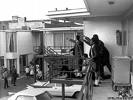


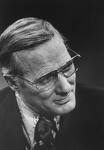
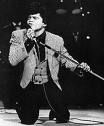
On Mar. 4, 1968 FBI dir. J. Edgar Hoover issues a Memo on Black Nationalist Hate-Groups, ordering a "counter-intelligence program" to stop the "Mau Maus" from taking over the U.S. and prevent the rise of a "black messiah", saying that MLK Jr. "could be a very real contender for this position should he abandon his supposed obedience to white, liberal doctrines (nonviolence) and embrace black nationalism". Camera crews go out and bravely shoot what's going on here? No matter who's zooming whom this year, people find one thing they can agree on? On Apr. 3 after the Citizens Board of Inquiry Into Hunger and Malnutrition in the U.S. claims that federal food aid programs reach only 18% of the nation's poor, and that there is widespread hunger in 250 "hunger counties" in 23 states, causing him to travel across the U.S. to gather a "multiracial army of the poor" for a Poor People's March (Campaign) to Washington, D.C. on May 12-June 24, with the goal of forcing Congress to enact a Poor People's Bill of Rights while uttering the soundbytes that Congress has shown "hostility to the poor" while appropriating "military funds with alacrity and generosity", but only providing "poverty funds with miserliness", and causing Reader's Digest to warn of a possible "insurrection", MLK Jr. utters the soundbyte: "It really doesn't matter what happens now.... some began to... talk about the threats that were out, what would happen to me from some of our sick white brothers.... Like anybody, I would like to live a long life. Longevity has its place, but I'm not concerned about that now. I just want to do God's will. And He's allowed me to go up to the mountain. And I've looked over, and I've seen the Promised Land. I may not get there with you, but I want you to know tonight, that we, as a people, will get to the Promised Land. And so I'm happy tonight. I'm not worried about anything. I'm not fearing any man. Mine eyes have seen the glory of the coming of the Lord." 4-4-6-8, what happened to 2 (Jr.)? Only 40 years from shooting uppity black leaders down to Barack Obama? On Apr. 4 (Thur.) 39-y.-o. Martin Luther King Jr. (b. 1929) is assassinated on the balcony of the black-owned Lorraine Motel in Memphis (where he is staying in Room 307) as he is about to lead demonstrations by striking black sanitation workers (on strike since Feb.), sparking Holy Week Riots in 126 U.S. cities for the next several days (worst in U.S. history since the U.S. Civil War), incl. Washington D.C., Chicago, Ill., Baltimore, Md., Kansas City, Mo., New York City, Detroit, Avondale, Cincinnati, Ohio, Miami, Fla., Pittsburgh, Penn., and Louisville, Ky., and Wilmington, Del., killing 46 (41 black), injuring 21K, and setting 2.6K fires; federal troops are called out to quell the riots in Washington D.C., Baltimore, and Chicago; Chicago mayor Richard J. Daley gives "shoot to kill" orders to police, who arrest 3K after nine are killed, 500 injured, and $11M property damaged; Baltimore has 5.8K arrests, six killed, 900 injured, and $14M in property damage; Washington, D.C. has 8K arrests (incl. Norman Mailer (1923-2007), who runs for mayor of New York afterward and gets 5% of the vote), 11 killed, 1K injured, and $24M in property damage, and the city's new black mayor Harold E. Washington pisses-off FBI dir. J. Edgar Hoover by giving orders that looters are not to be shot; across the country 21.27K arrests are made, and 55K federal troops and Nat. Guardsmen are called out; on Apr. 4 Bobby Kennedy announces MLK Jr.'s death in Indianapolis, Ind., uttering the soundbyte "What we need in the United States is not division, what we need in the United States is not hatred, what we need in the United States is not violence or lawlessness, but love and wisdom, and compassion toward one another, and a feeling of justice toward those who still suffer within our country, whether they be white or they be black"; a Nat. Day of Mourning is proclaimed by Pres. Johnson on Apr. 7 (Sun.); on Apr. 5 public statements by black singer James Joseph Brown (1933-2006) in Boston help calm blacks and prevent a riot; more public statements by NFL star James Nathaniel "Jim" Brown (1936-) do ditto ("Black isn't positive or negative, it's just a color"); NBC Monitor weekend radio show host Frank McGee (1921-74) had interviewed MLK Jr., asking him how he felt being a target for assassination, to which he responded that he had given serious thought to the possibility; on Apr. 8 King's widow takes her husband's place at the head of 42K demonstrators in Memphis; on Apr. 9 services for King attended by world leaders and celebs (no U.S. presidents) are held in Atlanta, Ga., after which Ga. gov. (1967-71) Lester Maddox denies him the honor of lying in state at the state capitol; MLK Jr.'s widow Coretta Scott King offers the unofficial leadership of the U.S. civil rights movement to famous entertainer Josephine Baker (1906-75), who declines; the murder is later pinned on white ex-con James Earl Ray (1928-98), who escaped in 1967 from the Miss. State Penitentiary, and who is arrested on June 8 at the London airport carrying a fraudulent Canadian passport under the name Ramon George Sneyd of Toronto by Scotland Yard detectives led by Thomas M.J. "Tom" Butler (1913-), and on July 19 he is put in Shelby County jail in Memphis; after receiving a 99-year sentence he later recants his confession, and doubts remain after his death - ties into the JFK and RFK assassinations, as LBJ's resignation is part of a deal to let Hoover gets his payback by having his enemy MLK Jr. bumped off while he runs the federal uninvestigation again? MLK Jr. quotes: "Our scientific power has outrun our spiritual power. We have guided missiles and misguided men"; "The time is always right to do what is right"; "Our lives begin to end the day we become silent about the things that matter"; "The arc of the moral universe is long, but it bends towards justice"; "If you want to say that I was a drum major, say that I was a drum major for justice"; "Never forget that everything Hitler did in Germany was legal"; "The Church was not merely a thermometer that recorded the ideas and principles of popular opinion; it was a thermostat that transformed the mores of society"; "Darkness cannot drive out darkness; only light can do that. Hatred cannot drive out hatred, only love can do that"; "I submit to you that if a man hasn't discovered something he will die for, he isn't fit to live"; "He who passively accepts evil is as much involved in it as he who helps to perpetrate it. He who accepts evil without protesting against it is really cooperating with it"; "I would be the first to advocate obeying just laws. One has not only a legal but a moral responsibility to obey just laws. Conversely, one has a moral responsibility to disobey unjust laws"; "Communism forgets that life is individual. Capitalism forgets that life is social, and the kingdom of brotherhood is found neither in the thesis of communism nor the antithesis of capitalism but in a higher synthesis. It is found in a higher synthesis that combines the truths of both"; "Now is the time to lift our national policy from the quicksand of racial injustice to the solid rock of human dignity."


On Apr. 6, 1968 17-y.-o. Black Panther Party treasurer Robert James "Lil' Bobby Hutton" (b. 1950) (first recruit to the Black Panthers) is killed (murdered?) in a gun battle with police in West Oakland, Calif., and in Nov. recently-released "Soul on Ice" jailbird writer Eldridge Cleaver (1935-98), who ran for U.S. pres. on the ticket of the Peace and Freedom Party and received 36,571 votes (0.05%), then arranged the ambush of the pigs and got shot and charged with attempted murder jumps bail and flees to Cuba and begins a 7-year exile, ending up in Algeria, where Timothy Leary joins him and gets put under "revolutionary arrest" for promoting drug use; Cleaver returns to the U.S. in 1975, becomes an evangelical Christian to make a plea bargain, and is sentenced to probation for assault.
On Apr. 11, 1968 (one week after MLK's assassination) Pres. Johnson signs the U.S. Civil Rights Act of 1968, which incl. Title VIII, prohibiting racial discrimination in the sale and rental of 80% of U.S. houses and apartments - it was all a govt. plot to get the bill passed and get a pest out of the way by activating a sleeper agent?
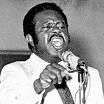
On May 12-June 24, 1968 after Pres. Johnson's 1964 War on Poverty wakes them up to their potential of forming a lobby, the multiracial Southern Christian Leadership Conference (SCLC)-led Poor People's Campaign (Poor People's March on Washington), led by MLK Jr.'s SCLC successor Ralph Abernathy (1926-90) sees 50K-100 march from Marks, Miss. to Washington, D.C. to demonstrate for a $30B federal anti-poverty bill, setting up Resurrection City; with Abernathy uttering the soundbyte: "The poor are no longer divided. We are not going to let the white man put us down anymore. It's not white power, and I'll give you some news, it's not black power, either. It's poor power and we're going to use it"; on May 14 they arrive in Washington, D.C., set up shantytowns, and hold daily demonstrations; Mrs. King comes out of her hubby's shadow and gives a major speech; on June 19 (Juneteenth) Solidarity Day sees tens of thousands join Resurrection City.
On June 17, 1968 the U.S. Supreme (Warren) Court rules 7-2 in Jones v. Alfred H. Mayer Co. that Congress can regulate the sale of private property to prevent racial discrimination under the 13th Amendment and the 1866 U.S. Civil Rights Act.
On Aug. 1, 1968 Pres. Johnson signs the U.S. Housing and Urban Development Act of 1968, authorizing a $5B building program for the indigent, mainly African-Ams.

On Aug. 21, 1968 the Medal of Honor is posth. awarded to PFC James Anderson Jr. (1947-67), becoming the first African-Am. U.S. Marine to get one.


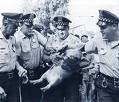

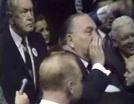








The Democratic Party implodes, giving the Republicans the White House? On Aug. 22-30, 1968 the 1968 Dem. Nat. Convention in Chicago, Ill. is the scene of mass protests by militant yippies and hippies, which are ruthlessly quashed by police, Nat. Guardsmen, and federal troops with tear gas and clubs, incl. the Festival of Life in Grant and Lincoln Parks, attended by 10K militants protesting the rising death toll in Vietnam by staging rock concerts (by MC5, etc.) in front of marijuana-smoking, nude public-lovemaking, draft-card-burning Baby Boomers, which is crushed on Aug. 25 by 16K Chicago pigs, 4K state pigs, and 4K Nat. Guardsmen armed with tear gas and nightsticks, cracking heads at mayor Richard Daley's orders to prevent them from overnighting; 308 are arrested, and later eight cops are indicted for use of excessive force (all acquitted); troops from Ft. Hood, Tex. are sent to Chicago but not used after some black soldiers hold a meeting questioning the orders and are court-martialed, causing questions about all the troops' loyalty; NBC-TV journalists Edwin Newman, John Chancellor, Frank McGee, and Sander Vanocur wear technologically advanced backpacks on the convention floor to conduct the first-ever live interviews with delegates, earning the title "Four Horsement of the Apocalypse"; on Aug. 27 CBS-TV journalist Dan Rather (1931-) is punched in the stomach while covering the convention; after convention chmn. (House Majority leader) Carl Bert Albert (1908-2000) fails to gain control of the rowdy delegates, LBJ calls U.S. Dem. Ill. rep. (1959-95) Daniel David "Dan" Rostenkowski (1928-2010) to take over, pissing Albert off and turning him into an enemy for life, starting by passing him over for House whip for Tip O'Neill when he becomes House Speaker a few weeks after the convention, after which Rostenkowski's own party refuses to nominate him for a 3rd term as chm. of the Dem. Caucus; on Aug. 28 Conn. Dem. U.S. Sen. (1963-81) Abraham Alexander Ribicoff (1910-98) gives a speech nominating George McGovern, ad-libbing the soundbyte "If George McGovern were president, we wouldn't have these Gestapo tactics in the streets of Chicago", after which the TV cameras pan in on mayor Richard J. Daley, who allegedly mumbles "Fuck you, you Jew son of a bitch"; Julian Bond gives a well-received Seconding Speech for Eugene McCarthy, which is written by McCarthy's speechwriter Jeremy Larner (1937-), launching Bond's nat political career; leaders of the protest incl. Yippie leaders Abbie Hoffman and Jerry Rubin, who get in a fight on Aug. 22 after deciding to run a pig for president, with Hoffman wanting a small and cute pig and Rubin wanting a big and ugly pig (they end up with a 200-lb. porker purchased by Phil Ochs et al. named Pigasus); other leaders incl. Rennard Cordon "Rennie" Davis (1941-), Thomas Emmet "Tom" Hayden (1939-) of Students for a Dem. Society (SDS), Black Panther leader Bobby Seale (1936-), and civil rights advocate David "Dave" Dellinger. On Aug. 28 while police and demonstrators clash outside, the Gettysburg, er, Dem. Nat. Convention nominates vice-pres. Hubert H. Humphrey for pres., and Maine Sen. Edmund Sixtus Muskie (1914-96) for vice-pres.; Humphrey becomes the first nominee who doesn't win a majority of votes in the primaries (because of RFK's death); too bad, the spectacle of scruffy not-so-white street protesters and respectable and not so respectable Dems. at each other's throats, combined with Humphrey's unwillingness to repudiate the admin.'s unpopular war policies makes the normally scary Repubs. a shoe-in with the white Silent Majority sitting in front of their TV sets eating their Swanson TV dinners?


On Oct. 2-10, 1968 the Detroit Tigers (AL) defeat the St. Louis Cardinals (NL) 4-3 (4-1 in Game 7) to win the Sixty-Fifth (65th) World Series, helping unite the city after the 1967 Detroit Race Riot; on Oct. 2 Bob Gibson strikes out 17 Tigers players to win Game 1; Gibson also wins Game 4 and wins the Cy Young and MVP awards with a 1.12 ERA during the season; Denny McLain wins Game 6, while teammate pitcher Micky Lolich (1940-) goes 3-0 and becomes World Series MVP; too bad, cool blind Puerto Rican immigrant crossover artist Jose (José) Feliciano (1945-) sings The Star-Spangled Banner in slow, jazzy Latin-style, changing the arrangement, starting a (racist?) backlash among veterans and causing radio stations to quit playing his music for several years, even though the single reaches #50 on the Billboard Hot 100, and 10 mo. later Jimi Hendrix does his here's-what-it-looks-like-here's-what-it-feels-like electric guitar rendition at Woodstock sans backlash?






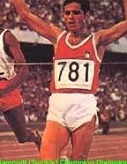


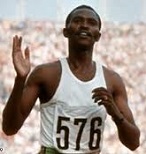
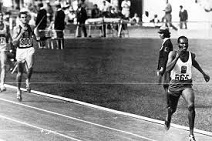


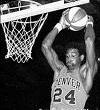
On Oct. 12-27, 1968 the XIX (19th) Summer Olympic Games in 7,349-ft. alt. Mexico City are attended by 6,082 athletes from 112 countries; Detroit, Mich. was a candidate; drug testing makes its debut, causing cheating countries to hire cleverer doctors; Montevideo-born New York City sculptor Gonzalo Fonseca (1922-97) creates a 40-ft. cast-concrete tower for the games; the U.S. wins the most medals (107) as well as the most golds (45); the Soviet Union is #2 with 91 (29 golds); eight men's and six women's world track and field records fall to the lower gravity and air resistance (except the distance runners, who conk out from lack of oxygen); black U.S. athlete Robert "Bob" Beamon (1946-) sets a world long jump record of 29 ft. 2-1/2 in., besting the 1964 record set by Ralph Boston of the U.S. (27 ft. 4-3/4 in.), and his record stands until ?; black U.S. sprinter Jim Hines (1946-) becomes the first to run the 100m in under 10 sec. (9.95); white U.S. athlete Al Oerter (1936-) wins his 4th consecutive gold medal in the men's discus throw; Naftali Temu (1945-2003) of Kenya wins the 10K after passing Degaga "Mamo" Wolde (1932-2002) of Ethiopia with only 50m to go; Wolde wns the marathon, becoming the 2nd Ethiopian after Abebe Bikili in 1964; Australian runner Ronald William "Ron" Clarke (1937-2015) (who lit the Olympic Flame in the 1956 Melbourne Olympics and won the 10K bronze in 1964) collapses during the 10K final, sustaining permanent vitral valve damage in his heart from the altitude, causing him to complain that high altitude Olympics are rigged for African nig, er, genetic and geographical backgrounds, esp. after Mohamed Gammoudi (Mohammed Tlili ben Abdallah) (1938-) raised near sea level wins a gold in the 5K, outsprinting Kenyans Naftali and Kip Keino; James Ronald "Jim" Ryun (1947-) (first high schooler to run a 4-min. mile in 1964) of the U.S. wins a silver in the 1.5K after Kipchoge "Kip" Keino (1940-) of Kenya beats him by a record 20m; William Clark "Bill" Steinkraus (1925-) becomes the first to win a gold in show jumping for the U.S. on his horse Snowbound; on Oct. 16 U.S. athletes Tommie Smith (1944-) and John Carlos (1945-) wear long black socks while competing in the 200m run, then raise their black-gloved fists (Smith right, Carlos left) while bowing their heads in the black power salute during their medal ceremony (Smith finishes 1st and Carlos 3rd, and Smith sets a world record at 19.8 sec.); despite being praised by Howard Cosell on Oct. 20, they are suspended by the USOC upon request of the IOC; 7'2" UCLA Bruins center Kareem Abdul-Jabbar (Ferdinand Lewis "Lew" Alcindor Jr.) (1947-) boycotts the Olympics; in 1969 after he joins the Milwaukee Bucks and makes too much use of them, scaring other teams, the slam dunk is made illegal in the NBA (until 1976); in 1969 leading scorer (16.1 points per game, .719 field goal percentage) 6'8" forward-center Spencer Haywood (1949-) of the U. of Detroit (sophomore) signs with the ABA Denver Rockets (#24) in 1969, being named rookie of the year, league MVP (youngest), and 1970 All-Star Game MVP, then with the help of owner Sam Schulman signs with the Seattle SuperSonics (#24) in 1970, becoming the first player to sign with the NBA without graduating from college, getting into a war with NBA commissioner Walter Kennedy that results in the anti-trust lawsuit Haywood v. National Basketball Association, which goes to the U.S. Supreme Court, which rules 7-2 on Mar. 1, 1971 (the Spencer Haywood Rule) that Haywood doesn't have to wait four years after graduating from college because he is a "hardship" case, needing to work to feed his family, after which he is loudly booed by Supersonics fans for years before moving to the New York Knicks (#42) in 1975-9, the New Orleans Jazz (#24) in 1979, the Los Angeles Lakers (#31) in 1979-80, Reyer Venezia in Italy in 1980-1, and the Washington Bullets (#24) in 1981-3; in the 1971 NBA Draft he officially becomes eligible is and selected #30 by the Buffalo Braves, who can't get him to leave Seattle.

On Nov. 5, 1968 the 1968 U.S. Pres. Election sees Repubs. Richard M. Nixon and Spiro T. Agnew defeat Dems. Hubert H. Humphrey and Edmund S. Muskie, with 31.770M (43.4%) (302 electoral votes) for Nixon, 31.270M (43.0%) (191 electoral votes) for Humphrey, and 9.906M (45 electoral votes) for George Wallace of the Am. Independent Party, who wins five Southern states, becoming the 4th time that a third party wins more than 10% of the vote in a U.S. Pres. Election (1892, 1912, 1924); Wallace becomes the last non-Dem. non-Repub. candidate to win any electoral votes (until ?); JFK conspiracy theorist and Freedom Rider Mark Lane and Dick Gregory of the Freedom and Peace Party, and anti-Vietnam War activist Dr. Benjamin Spock of the Peoople's Party (advocating free medical care, legalization of abortion and marijuana, a guaranteed minimum income, and immediate withdrawal of all U.S. troops from foreign countries) wins enough votes to fill a mini-piss pot maybe?; Shirley Chisholm (1924-2005) (D-N.Y.) becomes the first black woman elected to the U.S. Congress after she wins an upset V in Brooklyn's 12th Congressional District, which had been created by court-ordered reapportionment; her slogan is "unbought and unbossed"; she defeats James L. Farmer (1920-99), founder of the Congress of Racial Equality and a leader of the Freedom Rides in the South in the early '60s, and Ralph Carrano, the Conservative candidate; "I am an historical person at this point, and I'm very much aware of it" she tells The Washington Post a few mo. after being sworn in; she goes on to serve seven terms.

On Nov. 6, 1968 the Third World Liberation Front supported by the SDA, Black Panthers, and students at San Francisco State College strike, demanding open admission and a Third World (Ethnic) (Black) Studies Dept., causing the college to close on Nov. 19; on Nov. 26 after pres. Robert R. Smith resigns, Vancouver, B.C., Canada-born Japanese-descent English prof. (since 1955) Samuel Ichiye "S.I." Hayakawa (1906-92) is appointed acting pres of the college, followed by permanent pres. next July 1969 (until July 10, 1973); on Dec. 6 after pulling the wires from loud speakers on the protesters' van at an outdoor rally, Hayakawa relents and creates the first College of Ethnic Studies in the U.S. after reopening the campus on Dec. 2, then closes it early for the Christmas vacation to avoid having high school students join the protest; the strike ends next Mar. 21.

In 1968 Paulo Freire (1921-97) pub. Pedagogy of the Oppressed, a Marxist analysis of education in Brazil; Eng. trans. 1970; bestseller (700K copies); claims that traditional pedagogy is the "banking model", treating students as piggy banks to fill with knowledge, destroying their creativity; "No pedagogy which is truly liberating can remain distant from the oppressed by treating them as unfortunates and by presenting for their emulation models from among the oppressors. The oppressed must be their own example in the struggle for their redemption"; "Education makes sense because women and men learn that through learning they can make and remake themselves, because women and men are able to take responsibility for themselves as beings capable of knowing - of knowing that they know and knowing that they don't."

In 1968 Michael Harrington (1928-89) pub. Toward a Democratic Left: A Radical Program for a New Majority, which calls for a new political movement composed of the New Left, blacks, white youth, white collar labor unions, and religious groups; too bad, Tricky Dicky Nixon is elected instead?

In 1968 Eatonton, Putnam County, Ga.-born poet-novelist Alice Malsenior Tallulah-Kate Walker (1944-) pub. her first poetry book Once, followed by Revolutionary Petunias and Other Poems (Mar. 21, 1973), Good Night, Willie Lee, I'll See You in the Morning (1979), Horses Make a Landscape Look More Beautiful (1985), Her Blue Body Everything We Know: Earthling Poems 1965-1990 Complete (1991), Absolute Trust in the Goodness of the Earth: New Poems (2003), A Poem Traveled Down My Arm: Poems and Drawings (Oct. 28, 2003), Her Blue Body Everything We Know: Earthling Poems 1965-1990 Complete (2004), There Is a Flower at the Tip of My Nose Smelling Me (May 9, 2006), We Are the Ones We Have Been Waiting for: Inner Light in a Time of Darkness (2007), Hard Times Require Furious Dancing: New Poems (2010), The World Will Follow Joy: Turning Madness into Flowers (2014), AND Taking the Arrow Out of the Heart (Oct. 2, 2018). In 1982 she pub. novel #4 The Color Purple, which wins the Pulitzer Prize), set in 1930s rural Ga., about Celie, her Pa, who raped her at age 14, her sister Nettie, Shug, and her forced marriage to "Mr. ---", along with black-on-black violence, incest, and lesbianism; Celie moves to Memphis and designs unisex pants; "I think it pisses God off if you walk by the color purple in a field somewhere and don't notice it"; filmed in 1988 by Stephen Spielberg. In 1982 Eatonton, Putnam County, Ga.-born Alice Malsenior Tallulah-Kate Walker (1944-) pub. novel #4 The Color Purple, which wins the Pulitzer Prize) set in 1930s rural Ga.; Celie, her Pa, who raped her at age 14, her sister Nettie, Shug, and her forced marriage to "Mr. ---", along with black-on-black violence, incest, and lesbianism; Celie moves to Memphis and designs unisex pants; "I think it pisses God off if you walk by the color purple in a field somewhere and don't notice it"; filmed in 1988 by Stephen Spielberg. In 1983 she pub. In Search of Our Mothers' Gardens: Womanist Prose; people aren't really equal, so a "complex" equality must evolve?; proposes the theory of Womanism, defining the term "womanist" as "A black feminist or feminist of color. From the black folk expression of mother to female children and also a woman who loves other women, sexually and/or nonsexually. Appreciates and prefers women's culture. Committed to survival and wholeness of entire people, male and female."
On Mar. 10, 1969 the U.S. Supreme (Warren) Court rules 8-1 in Shuttlesworth v. City of Birmingham to strike down Birmingham Ordinance 1159 requiring a permit for a civil rights march because although "the Supreme Court of Alabama performed a remarkable job of plastic surgery upon the face of the ordinance" to disguise it as necessary for directing vehicular traffic, the circumstances showed that permits were denied to blacks to censor their expression of ideas; Justice John M. Harlan II recuses himself.

On Mar. 10, 1969 James Earl Ray is sentenced to 99 years after he pleads guilty to the murder of Martin Luther King Jr. in Memphis, Tenn.; he later recants. On Mar. 27, 1997 Dexter Scott King (1961-), son of MLK Jr. meets with James Earl Ray in prison, and comes out saying he believes his story of innocence and conspiracy.
On June 19, 1969 race riots rock Cairo, Ill.

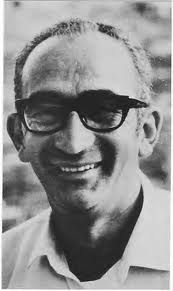
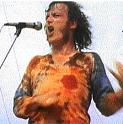



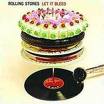
On Aug. 15-18, 1969 the Rock and Roll Decade ended more appropriately far away from kooky California with the Woodstock Music and Art Fair, which was held on the muddy 600-acre farm of dairy farmer Max B. Yasgur (1919-73) (who dies of a heart attack in Fla. in 1973) in the Catskill Mts. near Bethel in upstate New York; "What we have in mind is breakfast in bed for four hundred thousand"; 300K-500K drugged-and-sexed-out mainly Baby Boomer gen. people (biggest live entertainment audience in history?) endured 20-mi. traffic jams and cruddy weather to hear rock acts, take drugs, and go naked; future "Meet the Press" TV show host Timothy John "Tim" Russert (1950-2008) attended wearing a Buffalo Bills jersey carrying a case of beer; Woodstock rock acts included Joan Baez (1941-), The Grateful Dead, Richard P. "Richie" Havens (1941-), James Marshall (Johnny Allen) "Jimi" Hendrix (1942-70), Jefferson Airplane, Santana, The Who, Sha Na Na et al., while showing off and doing things with each other such as nudity, drugs and group sex, and groping for their own utopian society, only to discover VD, ODs, unwanted pregnancies, how much money they've blown, and how the rock acts don't work for free and want to sell them merchandise (advance sales were $1.2M); on Aug. 15 (Fri.) Richie Havens started things out, scoring a hit with his own version of Motherless Child with an added verse containing the repeated word "freedom", after which 11 performers followed, ending with 3-octave trilling Joan Baez (1941-), who scored with Sweet Sir Galahad (the first song she ever composed), and the "organizing song" Joe Hill; on Aug. 16 (Sat.) the 11 performers started with Quill, and included Santana, Canned Heat, and Janis Joplin; on Aug. 16 Pete Townshend of The Who knocked Abbie Hoffman from the stage as he tried to disrupt the show with a speech about poor John Sinclair, who got a 10-year sentence for possession of one marijuana cig; on Aug. 17 at 8 a.m. #11 Jefferson Airplane capped off the all-day-all-night marathon with eight songs; on Aug. 17 (Sun.) English singer John Robert "Joe" Cocker (1944-) (known for covers of Beatles songs performed with a gritty voice and weird arm movements) began the official day's events 9 hours late at 2 p.m., singing the Beatles hit With a Little Help from My Friends, and it went all night without finishing; on Aug. 18 at 9 a.m., after most people had left (80K remaining), Jimi Hendrix, the 10th and last performer for Sun. ended the show by giving a 2-hour 17-song performance, ending with a psychedelic rendition of The Star-Spangled Banner on his overamped electric guitar; at frequent intervals an announcer told the crowd "If you think you've taken poison, you haven't", referring to "bad acid"; a total of three people died at the event, one from a heroin OD, one from falling off a scaffold, and one from being run over by a tractor - let's see, that's EADGB, Every American Dog Goes Bad? After Melanie Safka (1947-) performed her song Beautiful People at Woodstock, she released the album Candles in the Rain in 1970, featuring Lay Down (Candles in the Rain) #6 in the U.S.), about the crowd reaction; in 1970 she also released the hit Look What They've Done to My Song, Ma; in 1973 she had a #1 U.S. hit with the song Brand New Key (The Roller Skate Song). Talking about ending the decade appropriately. On Sept. 12, 1969 after Brian Jones' death, the Rolling Stones released the compilation album Through the Past, Darkly (Big Hits Vol. 2), which features the tracks Honky Tonk Women, and We Love You. On Dec. 5, 1969 they released album #8 (#10 in the U.S.) Let It Bleed. The cover features a cake baked by English cook Delia Smith (1941-). Tracks included: Love in Vain, Let It Bleed, Midnight Rambler, Monkey Man, You Can't Always Get What You Want, You Got the Silver, and Gimme Shelter ("War, children, it's just a shot away... Love, sister, it's just a kiss away").
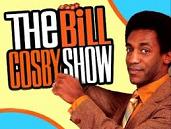
On Sept. 14, 1969 (Sun.) the sitcom The Bill Cosby Show debuts on NBC-TV for 52 episodes (until Mar. 21, 1974), sponsored by Procter & Gamble, starring William Henry "Bill" Cosby Jr. (1937-) as physical education teacher Chet Kincaid at a h.s. in Los Angeles, Calif., becoming the first African-Am. to star in his/her own eponymous comedy series.
On Oct. 29, 1969 the U.S. Supreme Court unanimously rules in Alexander v. Holmes Board of Education to order immediate school desegregation, superseding the previous "with all deliberate speed" ruling, pissing-off George Wallace, who calls the Burger Court "no better than the Warren Court", and calls the justices "limousine hypocrites" - hey, you can still watch The Brady Bunch and pretend?




On Nov. 10, 1969 the Children's Television Workshop's educational daytime TV program Sesame Street debuts in the U.S. on PBS-TV (until ?), starting a rev. in childhood learning by teaching preschoolers letters and numbers and inculcating racial tolerance; producer Joan Ganz Cooney (1929-) is backed by the Ford Foundation, Carnegie Corp., and the U.S. Office of Education; Jim Henson's Muppets debut, incl. Kermit the Frog, Oscar the Grouch, Big Bird, the Cookie Monster, Bert and Ernie (named after chars. in the 1946 film "It's a Wonderful Life"), and Grover; Big Bird is designed by Kermit Ernest Hollingshead Love (1916-2008), known for designing the 28-ft. marionette giant for Don Quixote (1965); Kermit the Frog is named for Henson's childhood friend Theodore Kermit Scott Jr. (1936-2008); Kermit's theme song is (It's Not Easy) Bein' Green, by Joseph Guilherme "Joe" Raposo Jr. (1937-89); the series goes on to reach an audience of 235M in 85 countries; James Earl Jones (1931-) is the first guest celeb.; in 1979 Saudi Arabia bans the Muppets because Miss Piggy violates their halal food code.


On Dec. 15, 1969 Daniel Mann's A Dream of Kings debuts, starring Anthony Quinn, becoming the last film appearance of Swedish-born blonde actress Inger Stevens (1934-70) before committing suicide next Apr. 30 at age 36 and letting her little secret of a black hubby (since 1961), NFL football player, actor, and producer Isaac Lolette "Ike" Jones (1929-) (first black grad from UCLA Film School in 1952) leak out of a bottle; she attempted suicide in 1959 when Bing Crosby dumped her, followed by Anthony Quinn, Dean Martin, Clint Eastwood, Harry Belafonte, Mario Lanza, and shortly before her suicide, Burt Reynolds - going my way?
In 1969 the U.S. Hate Crime Provisions (18 USC 245) are passed, giving federal authorities authority to punish crimes motivated by bias against a person's race, religion, or nat. origin, but requires the victim's participation in one of six federally-protected activities; on July 17, 2009 the U.S. Matthew Shepard Act extends protections to bias against gender identity, sexual orientation, or disability. In 1969 future U.S. pres. William Clinton integrates a whites-only swimming pool in Hot Springs, Ark. - how many did black babes did he hook up with?

In 1969 Calif. gov. Ronald Reagan gets black UCLA activist prof. Angela Davis (1944-) fired for being a member of the Communist Party; she is later rehired.


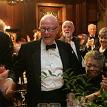
In 1969 St. Louis, Mo.-born writer-poet-entertainer Maya Angelou (Marguerite Ann Johnson) (1928-2014) (nickname comes from her older brother, who calls her "my-a-sister") (first black and first female street car conductor in San Francisco, Calif.) pub. the bestselling autobio. I Know Why the Caged Bird Sings, about her poor Southern Am. black upbringing, with title taken from the poem Sympathy by black poet Paul Laurence Dunbar (1872-1926); "One would say of my life, born loser, had to be, from a broken family, raped at eight, unwed mother of sixteen", causing her to become a role model for those wanting to make it big in publishing by making people feel sorry for them, er, for stirring stories of blacks struggling against white racism; she goes on to pub. five more autobios. (until 2002) with Random House ed. Robert Loomis (1926-), developing "a relationship that's kind of famous among publishers" (Angelou); incl. the poem I Know Why the Caged Bird Sings; "For the caged bird/ sings of freedom".
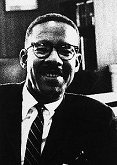
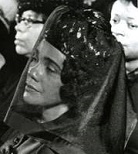
In 1969 Owensboro, Ky.-born photographer Moneta Sleet Jr. (1926-96) wins the Pulitzer Prize for feature photography for a photograph of MLK's widow Coretta Scott King at his funeral, becoming the first African-Am. to win a journalism award, and the first African-Am. man to win a Pulitzer Prize.

On Feb. 8, 1970 former (1963-7) Ala. gov. George Wallace promises to run for U.S. pres. again in 1972 "if Nixon doesn't do something about the mess our schools are in", urging Southern govs. to defy federal integration orders; meanwhile on Feb. 9 Jewish U.S. Sen. (D-Conn.) (1963-81) Abraham Alexander Ribicoff (1910-98) says that Northern liberals should drop their "monumental hypocrisy" and concede that de facto segregation exists in the North.

First trivialize it, then marginalize it, then eradicate it for its opposite? After decades of preparation, one Jew can now tell the entire U.S. white Christian viewing public to shove it? Or is it all just free market economics and nothing sinister? On Feb. 22, 1970 after claiming to be offended by their rep as the "Country Broadcasting System", CBS-TV exec Fred Silverman (1937-) orders the Rural Purge, the cancellation of their "hillbilly network" (white conservative middle America family-centered straight non-race-mixing) image, to make way for a younger urban audience, axing The Red Skelton Hour, Jackie Gleason Show, and their hit show The Beverly Hillbillies, along with Green Acres, Petticoat Junction, Hee Haw, and Mayberry, R.F.D., Family Affair, Hogan's Heroes, and even The Lawrence Welk Show, which had practically built the network; ABC-TV soon follows suit; Pat Buttram (Mr. Haney in Green Acres) utters the soundbyte "CBS killed everything with a tree in it"; CBS-TV fields a new generation of shows incl. All in the Family, M*A*S*H, and The Bob Newhart Show, and resurrects network game shows incl. The Price is Right; luckily the same year the FCC forces networks to devote one more hour of prime time to local shows, so that the Welk Show and Hee Haw survive in syndication - time for leftist, race-mixing, and gay-lez promotion shows to be let loose on the well-detached-from-their-parents white straight youngsters as fast as they can be forced down their throats, whoopee, how many years to President Obama?

The YMCA/YWCA gets jets? On Apr. 13-18, 1970 2.5K delegates attend the 25th 25th YWCA Triennial Nat. Convention in Houston, Tex., voting to make the elimination of racism its top goal, and passing resolutions calling for the abolition of nukes, a clean environment, a change in society's expectations for women, and the involvement of youth in leadership and decision-making; on May 22 the YMCA Nat. Council holds its annual meeting in Pittsburgh, Penn., and elects its first black pres., Donald Milford Payne (1934-2012) of Newark, N.J. (in 1989 he becomes the first black N.J. congressman); the Canadian and U.S. YMCA had earlier agreed to begin administering internat. programs separately after 80 years of joint sponsorship.

In Apr. 1970 the New Haven Nine Black Panther Trials in Conn. begin over the murder of suspected informer Alex Rackley on May 20, 1969 by fellow Black Panther members, turning into a media event as Yale U. students house tens of thousands of Black Panthers and supporters and hold daily protests, exploding two devices in the Yale hockey rink, rioting on May 1 and throwing rocks and bottles at the Nat. Guard, and going on strike from May 1 until the end of the term; on Apr. 24 Yale U. pres. (1963-77) Kingman Brewster Jr. (1919-88) utters the soundbyte "I'm appalled and ashamed that things should have come to such a pass that I am skeptical of the ability of Black revolutionaries to achieve a fair trial anywhere in the U.S." (insuring that they will get extra-light treatment?); after Lonnie McLucas is convicted only of conspiracy to commit murder and given 12-15 years in priz, and his two accomplices Warren Kimbro and George Sams Jr. plead guilty to 2nd degree murder (ending up released after 4 years), in Oct. Bobby Seale is tried along with Ericka Huggins, who boiled water to torture Rackley, and the jury deadlocks 11-1 for Seale's acquittal and 10-2 for Huggin's acquittal; the whole mess stinks up the Black Panthers, who begin a steep decline, becoming inactive by the middle of the decade; Yale Law School student Hillary Rodham Clinton (1947-) attends the trial to report violations of civil rights to the ACLU.
On May 11, 1970 the Augusta Riot in Ga. starts after 16-y.-o. mentally disabled black prisoner Charles Oatman is tortured to death in jail and the police attempt a coverup; on May 12 the riot is quashed after six blacks are shot in the back and killed by the massahs, er, police, plus 80 more injured, 200 arrested, and 50 businesses burned.

On June 16, 1970 after gaining the support of black Communist poet-playwright Amiri Baraka (1934-), Ala.-born Dem. Kenneth Allen Gibson (1932-), chief engineer for the Newark Housing Authority becomes the first African-Am. to win a mayoral election in a major NE U.S. city, Newark, N.J. (until 1986); too bad, in 1982 he is indicted for the "ghost employment" of a colleague, and in 2003 is convicted of bribery.
In Aug. 1970 "the Hunger Doctor" Donald E. Gatch is convicted of maintaining improper records of drugs dispensed by his office in Beaufort County, S.C., despite loudly squawking that it is a railroad job to shut him up for reporting hundreds of cases of malnutrition diseases in 1967, incl. pellagra, rickets, scurvy and Kwashiorkor, mainly in blacks, plus parasite diseases; "They think maybe if they can discredit me they can somehow discredit the fact that there are 20 million malnourished people in this nation."
On Sept. 3-7, 1970 an African People Congress meets in Atlanta, Ga. to study Afro-Am. culture and ideology.
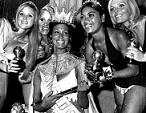

On Nov. 20, 1970 the 1970 Miss World Pageant in the Royal Albert Hall in London is won by black contestant Jennifer Josephine Hosten (1953-) of Grenada; black contestant Pearl Jansen from South Africa places 2nd; Irith Lavi from Israel places 3rd; too bad, judge Sir Eric Matthew Gairy (1920-97) (PM of Grenada since 1967) apparently rigs the results, making her the winner with only two firsts, while blonde white Swedish contestant Marjorie Christel Johansson, who received four firsts comes in #4, causing a protest outside the hall, after which dir. Julia Morley (1941-) resigns, and Johannsson later says she has been cheated; other judges incl. Glen Campbell, Joan Collins, and Nina.

In 1970 Moses Carl Holman (1919-88) becomes pres. of the Nat. Urban League (until 1988).
In 1970 MLK Jr.'s widow Coretta Scott King (1927-2006) founds the Center for Non-Violent Social Change in Atlanta, Ga.

In 1970 Nokomis, Ala.-born jazz critic Albert L. Murray (1916-) pub. The Omni-Americans: New Perspectives on Black Experience and American Culture, which pisses-off black Am. nationalists by dissing "the folklore of white supremacy and the fakelore of black pathology", while calling African-Ams. "uncontestably mulatto", which makes them greater, making attempts to talk about "blacks" in the U.S. fundamentally flawed; calls the "blues idiom" the highest expression of Am. culture.


In 1970 Am. blonde white actress Jean Seberg (1938-79), who became an outspoken supporter of the NAACP and Native Am. groups, and also supports the Black Panther Party is framed by FBI dir. J. Edgar Hoover with Pres. Nixon's approval when she becomes 7 mo. pregnant, leaking a false story that the father is not her 2nd hubby, Russian-born white French film dir. Romain Gary (1914-80) but big black buck Bobby Seale from the Panthers; after the girl is born premature on Aug. 23 and dies on Aug. 25, she shows her photo to the press to prove that it ain't a mule ah toe, blaming the infant's death on the trauma of the publicity; the baby is later revealed to have been fathered by Carlos Navarra; she turns into a suicidal alcoholic and prescription drug addict, and doesn't last the decade before turning up dead in the back seat of her car in Paris.
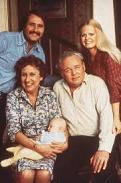
On Jan. 12, 1971 Jewish-Am. Norman Lear's leftist political sitcom All in the Family, based on the British series "Till Death Do Us Part" debuts on CBS-TV for 202 episodes (until Apr. 8, 1979), starring John Carroll O'Connor (1924-2001) (who successfully holds out for more money in 1974) as bigoted blue collar worker Archie Bunker, Jean "Stapleton (nee Murray) (1923-) as his wife Edith "the Dingbat", who suffers from menopause, Robert "Rob" Reiner (1947-) as his Jewish liberal son-in-law Michael "Meathead" Stivic, and Sally Ann Struthers (1948-) as his daughter Gloria, who becomes the victim of attempted rape and has a miscarriage; Meathead and Gloria go on to have son Joey Stivic in Dec. 1975, after which in 1976 the Ideal Toy Co. releases the 14-in. Joey Stivic doll, complete with an uncircumcised penis, billing it as the "first anatomically correct male doll", becoming a collector's item; on May 13 after Quaker Pres. Nixon watches it, he denounces an episode on homosexuality, telling his Christian Scientist asst. John Daniel Ehrlichman (1925-99), "Why it outrages me because I don't want to see this country go that way... You know what happened to the Greeks. Homosexuality destroyed them. Sure Aristotle was a homo, we all know that. So was Socrates, but he never had the influence that television had... Do you know what happened to the Romans? The last six Roman emperors were fags... You know what happened to the popes? It's all right that popes were laying the nuns. That's been going on for years, centuries. But when the popes, when the Catholic Church went to Hell in, I don't know, three or four centuries ago, it was homosexual, and it had to be cleaned out. Now, that's what happened to Britain. It happened earlier to France."
On Mar. 8, 1971 the U.S. Supreme Court rules 8-0 in Griggs v. Duke Power Co. that Title VII of the 1964 U.S. Civil Rights Act prohibits "objective" criteria such as a high school diploma or IQ score minimum for hiring employees if they result in a "disparate impact", i.e., a relative disadvantage to dumb, er, blacks without a "compelling business interest", and the employer has the burden of proof that the tests are "reasonably related" to the job for which they are required; in 1991 the Civil Rights Act is amended to eliminate the employer's burden of proof.

On Mar. 8, 1971 Pres. Nixon vents his bigotry against women, blacks, Jews, Mexicans, and Italians on tape recordings that are not made public until 1998; "The only two non-Jews in the Communist conspiracy were Chambers and Hiss. Every other one was a Jew and it raised hell with us." On May 13 Pres. "Tricky Dicky" Nixon makes taped private comments exposing his private prejudices and vices, starting with his new IRS commissioner, saying "I want to be sure he is a ruthless son of a bitch, that he will do what he's told, that every income tax return I want to see I see, that he will go after our enemies and not go after our friends", followed by homos, saying "You see, homosexuality, dope, immorality in general, these are the enemies of strong societies. That's why the Communists and the left-wingers are pushing the stuff. They're trying to destroy us", and "The Bohemian Grove, which I attend from time to time, it is the most faggy goddamned thing you could ever imagine, with that San Francisco crowd. I can't shake hands with anybody from San Francisco", followed by by blacks, saying "We're going to [put] more of these little Negro bastards on the welfare rolls at $2,400 a family. Let people like Pat Moynihan... believe in all that crap, but I don't believe in it. Work, work, throw 'em off the rolls. That's the key... I have the greatest affection for them, but I know they're not going to make it for 500 years. They aren't. You know it, too. The Mexicans are a different cup of tea. They have a heritage. At the present time they steal, they're dishonest, but they do have some concept of family life. They don't live like a bunch of dogs, which the Negroes do live like."
On Apr. 20, 1971 in Swann v. Charlotte-Mecklenburg Board of Education, the U.S. Supreme Court unanimously upholds the busing of students to achieve racial desegregation when segregation has been officially sanctioned and/or school authorities offer no acceptable alternative; justices are Douglas, Brennan, Marshall, Black, White, Blackmun, Harlan, Stewart, and Burger; the last time the court is unanimous about racial makeup of schools until ?; in May the U.S. govt. imposes a Big Brother busing plan on yee-haw Austin, Tex., requiring 13K students to be bused at an annual cost of $1M, causing a massive court fight; in July a federal judge rejects it, causing Ala. gov. George Wallace to complain that the Adolf Nixon admin. has done more to desegregate public schools than any previous admin., after which on Aug. 3 Nixon repudiates the plan, ordering that busing be limited "to the minimum required by law".
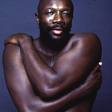
On July 2, 1971 Gordon Parks' Shaft, based on an Ernest Tidyman novel and starring Richard Roundtree as John Shaft launches the Blaxploitation genre, and wins Isaac Hayes (1942-2008) the first music Oscar ever given to an African-Am. composer; Parks also directs the 1972 sequel Shaft's Big Score.

On Aug. 29, 1971 black terrorists storm a police station in San Francisco, Calif. and kill Sgt. John V. Young (b. 1920) with a shotgun and injure a civilian clerk; eight black militant members of the Black Liberation Army (an offshoot of the Black Panthers) are arrested in New Orleans in 1975, but the case is dismissed after allegations of police torture to obtain confessions; they had been waging a way against law enforcement from 1968-73, and that doesn't stop the enemy gang, er police force from doggedly pursuing them, finally arresting eight of them in Jan. 2007 days before a documentary on the abuse allegations is scheduled to air, incl. Harold Taylor (1948-) and Ronald Stanley Bridgeforth (1944-).
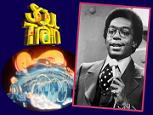
On Oct. 2, 1971 the syndicated African-Am. musical variety show Soul Train debuts for 1,117 episodes (until Mar. 25, 2006), created and hosted by Chicago-born Donald Cortez "Don" Cornelius (1936-).

On Dec. 18, 1971 Rev. Jesse Louis Jackson Sr. (1941-) announces in Chicago, Ill. the founding of Operation PUSH (People United to Save Humanity) - pray until something happens?
In Dec. 1971 the U.S. Labor Dept. issues Revised Order 4, becoming known as "the women's employment Magna Carta", mandating that that all businesses with federal contracts over $50K submit affirmative action plans for hiring minorities and women, exempting only the construction industry.

In 1971 Pittsburgh, Penn.-born Derrick Albert Bell Jr. (1930-2011), founder of Critical Race Theory becomes the first tenured African-Am. law prof. at Harvard Law School (1971), going on to tutor up-and-coming Barack Obama.
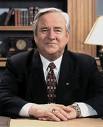
In 1971 white Baptist Rev. Jerry Lamon Falwell Sr. (1933-2007), who since 1950 has built up the Thomas Road Baptist Church in Lynchburg, Va. to nat. prominence, along with his "Old Time Gospel Hour", aired on 300 U.S. and 64 foreign TV stations, known for the 1958 soundbyte "When God has drawn a line of distinction, we should not attempt to cross that line - the true Negro does not want integration" founds Lynchburg Baptist College in Va. with 154 students and four full-time faculty, later renaming it Liberty U. and growing it to a 3,250-acre campus with 7.7K students, dreaming of making it the Notre Dame U. and Brigham Young U. for mainly white fundamentalist Christians who want to become active in leftist, er, conservative politics. In 1979 he founds the Moral Majority along with Heritage Inst. dir. Paul M. Weyrich (who coins the term) to give conservative Christian evangelicals a voice in politics, encouraging voter registration and becoming instrumental in the election of pres. Ronald Reagan and the blocking of the Equal Rights Amendment (ERA) and gay and abortion rights legislation, becoming one of the top 25 most influential Americans by 1983, lashing out against his foes, incl. liberals, abortionists, ACLU, feminists, gay rights activists, and the faithless; he disbands it in the late 1980s to concentrate on his Christian school, Liberty U. - you either wish him well or wish he'd fall down a well?

In 1971 Addison Gayle Jr. (1932-91) pub. The Black Aesthetic, which claims that African-Am. lit. should be judged on how it transforms the lives of African-Ams., not how it assimilates into the white mainstream.
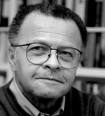
In 1971 David Levering Lewis (1936-) pub. Martin Luther King: A Critical Biography; the first?

On Jan. 14, 1972 the Norman Lear black sitcom Sanford and Son debuts on NBC-TV for 135 episodes (until Mar. 25, 1977), based on the 1962-74 BBC series "Steptoe and Son", starring Redd Foxx (Jon Elroy Sanford) (1922-91) as black junk dealer Fred G. Sanford, who lives at 9114 S. Central Ave. in Watts, Los Angeles with his son Lamont Sanford, played by Grady Demond Wilson (1946-), and his cousin-sidekick Grady Wilson, played by Whitman Blount Mayo (1930-2001), known for the catchphrase "Good Goobly Goop!"; LaWanda Page (Alberta Peal) (1920-2002) plays Fred's sanctimonious sister Esther, and Bea Richards (1920-2000) plays Lamont's aunt Ethel; Lynn Hamilton (1930-) plays Lamont's girlfriend Donna Harris; Foxx is billed as the black Archie Bunker.

On Feb. 5, 1972 Saint Kitts, West Indies-born Robert L. "Bob" Douglas (1882-1979), "the Father of Black Professional Basketball" becomes the first African-Am. elected to the Basketball Hall of Fame; he is inducted on Apr. 20.
On Mar. 17, 1972 Pres. Nixon asks Congress to halt the practice of busing in order to achieve desegregation. In Mar. the U.S. Equal Opportunity Commission (EOC) receives enforcement powers, and takes on Am. Telephone & Telegraph (ATT), calling it "without doubt the largest oppressor of women workers in the United States", forcing it to give $38M in back pay to women and black workers.

On Apr. 19, 1972 Vinnette Carroll (1922-2002) and Micki Grant (1941-) debut their gospel revue musical Don't Bother Me, I Can't Cope at the (Playhouse Theater, New York City; it runs for 1,065 perf., starring Micki Grant (Minnie Perkins McCutcheon); Carroll becomes the first African-Am. woman to direct on Broadway, also the first to receive a Tony nomination for direction.

On May 15, 1972 U.S. Dem. pres. candidate George Corley Wallace (1919-98) is shot 3x by Arthur Herman Bremer (1950-) while campaigning in Laurel, Md.; three others are wounded; Wallace survives as a paraplegic and finishes 3rd in Nov.; on Aug. 4 Bremer, who previously tried to assassinate Pres. Nixon is sentenced to 63 years for attempted murder; Wallace goes on to become Ala. gov. 4x (1963-7, 1971-9, 1983-7).
On May 27, 1972 an African Liberation Day March against Apartheid in South Africa draws 60K in cities across the U.S., Canada, and the Caribbean, and 30K in Washington, D.C.


On Oct. 12, 1972 Sidney J. Furie's Lady Sings the Blues debuts, starring Diana Ross as jazz singer slash ho Bille Holiday, Billy Dee Williams as Louis McKay, and Richard Pryor as the Piano Man; Lonne Elder III (1927-96) becomes the first African-Am. to be nominated for an Oscar for screenwriting; white Suzanne De Passe (1947-) is also nominated.

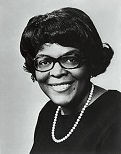
On Dec. 8, 1972 a United Airlines Flight 553 (Boeing 737-222) en route from Washington, D.C. to Chicago Midway Internat. Airport in Chicago, Ill. crashes short of the runway, crashing into a residential neighborhood, destroying five houses and killing 43 of 55 aboard, plus two on the ground; passengers killed incl. Ill. Rep. (D-Ill.) (since Nov. 1970) George Washington Collins (b. 1925) and Dorothy Hunt, wife of Watergate conspirator E. Howard Hunt are killed, along with pioneering female African-Am. CBS News correspondent Michele Clark; Collins' wife Cardiss Hortense Collins (nee Robertson) (1931-2013) is elected to his seat, becoming the first African-Am. woman to represent a midwestern district in Congress, serving in 1973-97; after the crash over $10K cash is found in Dorothy Hunt's purse - just shopping for shoes?

In 1972 Dick Gregory (1932-) pub. Dick Gregory's Political Primer; "In 1976 our nation will be two hundred years old... The way things are going in America today, it is probably wise to get a five-year headstart in celebrating. It's hard to say for certain at this point if there will be elections in '76, much less a nation."
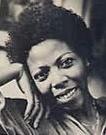
In 1972 Sherley Anne Williams (1944-99) pub. Give Birth to Brightness: A Thematic Study of Neo-Black Literature, a groundbreaking work relating 1960s black writers to African-Am. folk culture.
On Feb. 27, 1973 the U.S. Supreme (Burger) Court rules unanimously in Press v. Silver Spring Pool Club that the private Silver Spring Pool Club in Md. cannot bar residents because of color, with Justice Harry A. Blackmun writing the soundbyte: "When an organization links membership benefits to residency in a narrow geographical area, that decision infuses those benefits into the bundle of rights for which an individual pays when buying or leasing within the area."

On May 29, 1973 Thomas J. Tom" Bradley (1917-98) is elected as the first black mayor of Los Angeles, Calif. (#38), defeating incumbent Sam Yorty and being sworn-in on July 1 (until July 1, 1993).
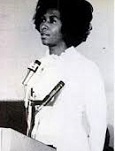
On June 5, 1973 Doris A. Davis (1935-) becomes the first African-Am. woman to govern a city in a major U.S. metro area when she is elected mayor of Compton, Los Angeles, Calif. (until 1977); blacks succeed her until ?.
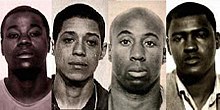
Oct. 1973 is Massacre Month at the U.S. Zoo? On Oct. 19, 1973 the Zebra Murders in San Francisco, Calif. (named for the use of the police broadast band Z, not for the fact that it's black on white?) see black Nation of Islam Death Angels armed with .32 Baretta handguns run around shooting whites ("blue-eyed devils") at random in the streets for 179 days (until Apr. 16, 1974), also torturing them with machetes and raping them, killing 15 and wounding 8-10 (up to 73 victims?) while terrorizing all whites in the area; they were taught that a scientist named Yakub created the "grafted" white race 1K years ago, and that it was weak and evil, and that they would earn points towards Paradise by killing all they could; on May 1 after Anthony Harris tips them off for the $30K reward, the HQ is traced to the Black Self-Help Moving and Storage on Market St., where a lucky plucker gets a pair of black wings attached to hs photo hung in an upstairs room for killing 9 white men, 5 white women, or 4 white children, after which seven are arrested, and four released for lack of evidence; on May 16, 1974 the rest are indicted, and on Mar. 3, 1975 the longest criminal trial in Calif. history begins, resulting in the conviction of Larry Green, J.C.X. Simon, Manuel Moore, and Jessie Lee Cooks, who are all sentenced to life in prison; before that San Francisco mayor Joseph Alioto and police chief Donald Scott authorized racial profiling, rounding up 600 black suspects, looking for a black man with a short Afro and narrow chin, after which they issued them Zebra Check cards to show to police if stopped again, until Denver, Colo.-born Dem. U.S. district judge Alfonso J. Sirpoli (1919-2009) rules the tactic unconstitutional; his earlier decisions favoring conscientious objectors in the Vietnam War caused Pres. Nixon to call him "the worst judge on the federal bench".

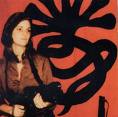

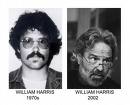


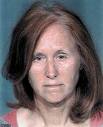

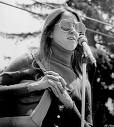


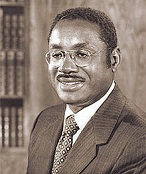
On Nov. 6, 1973 the up-and-coming Symbionese Liberation Army (SLA) (motto: "Death to the Fascist insect that preys upon the life of the people") assassinates black Oakland, Calif. school superintendent (since 1970) (first black) Marcus Aurelius Foster (b. 1923) and wounds his asst. after they announced a proposed student ID program. The classic case of a white babe who tastes some black and never wants to come back? On Feb. 4, 1974 19-y.-o. Am. newspaper heiress Patricia Campbell "Patty" Hearst (1954-), granddaughter of late newspaper magnate William Randolph Hearst (1863-1951) is kidnapped from her apt. in Berkeley, Calif. by two black male and one white female terrorists calling themselves the Symbionese Liberation Army (SLA), who also beat her math tutor boyfriend (UCB philosophy grad student) Steven Weed (1957-); on Feb. 12 the SLA sends a letter to KPFA 94.1 FM Radio in Berkeley demanding $230M in free food for the poor and social justice, plus $2M in ransom; on Feb. 19 cheapo daddy Hearst announces a $2M food giveaway program called People in Need, but before it's over she joins them, adopts the name Tanya (Che Guevara's girlfriend), and on Apr. 3 announces on tape her "decision to stay"; on Apr. 3 a tape-recorded statement sent to KSAN Radio by Patty Hearst denounces her family, and says that she has decided "to stay and fight" with the Symbionese Liberation Army (SLA) (how many times as big as she's used to?); on Apr. 15 she helps the SLA rob the Sunset Branch of the Hibernia Bank in San Francisco of $10,960, an automatic camera at the bank taking a famous photo of Hearst (alias Tanya) holding a submachine gun; on May 16 SLA members William "Bill" Harris (1945-) and Emily Harris (Emily Montague Schwartz) (1947-) get caught shoplifting ammo at the Mel's Sporting Goods store in Inglewood, Calif., getting in a shootout with owner Bill Huett and escaping in a stolen red VW bus with driver Patty Hearst - the power of black ideals, or the ideal power of black mamba snake? On May 17, 1974 LA police and FBI agents engage in a gun battle with SLA members in the bungalow HQ, which catches fire, and six bodies are recovered, incl. William "Willie" Wolfe (Patty Hearst's lover), Nancy Ling "Fahizah" Perry (b. 1947), Angela DeAngelis "Gen. Gelina" Atwood (b. 1949), Donald "Cinque" DeFreeze (b. 1943), Patricia "Mizmoon" Soltysik (b. 1950), and Camilla Hall (b. 1945); Patty Hearst is not there; on May 22 she is formally charged in Los Angeles, Calif. with 19 crimes. On Apr. 21, 1975 members of the SLA rob the Crocker Nat. Bank in Carmichael (suburb of Sacramento), Calif., during which Emily Harris shoots and kills 42-y.-o. Myrna Opsahl (b. 1932), a mother of four depositing money for her church, and Patty Hearst drives the getaway car, later fingering Kathleen Ann Soliah (1947-) for kicking a pregnant woman in the abdomen and causing a miscarriage; on Aug. 21 Soliah and other members of the SLA place a pipe bomb under a parked police car at an Internat. House of Pancakes restaurant on Sunset Blvd in Los Angeles, Calif., plus another in front of a police dept. 1 mi. away; after being profiled on "America's Most Wanted", she is finally apprehended on June 16, 1999 under the assumed name Sara Jane Olson in St. Paul. Minn. after having pub. the cookbook "Serving Time: America's Most Wanted Recipes", and receives two consecutive 10-life terms, reduced to 14 years, after which she pleads guilty to the Myrna Opsahl murder and gets another 6 years, and is paroled on Mar. 17, 2008, rearrested, then paroled again on Mar. 17, 2009. On Sept. 18, 1975 Patty Hearst and Wendy Yoshimura are arrested by the FBI in San Francisco in the kitchen of their apt.; Hearst wets her pants during the arrest; on the same day Emily and William Harris are arrested while jogging to the same apt. at Precita Ave.; Hearst is convicted of bank robbery and serves over 22 mo. in federal prison, when Pres. Carter commutes her sentence in 1979.

On Nov. 6, 1973 Coleman Alexander Young (1918-97) becomes the first African-Am. mayor of Detroit, Mich. (until 1993).
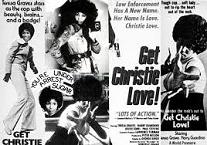
On Jan. 22, 1974 William A. Graham's Get Christie Love!, based on the novel "The Ledger" by Dorothy Uhnak debuts on ABC-TV for 23 episodes (until Apr. 5, 1975), starring "Laugh-in" star Teresa (Terresa) Graves (1948-2002) as an undercover police detective, known for the soundbyte says "You're under arrest, Sugah!", becoming the first African-Am. female lead in a U.S. network TV drama until Kerry Washington in "Scandal" (2012); too bad, she converts to Jehovah's Witness, causing scripts to have to be cleaned-up of sex and violence, making it a bore?

On Feb. 8, 1974 Norman Mailer's black sitcom Good Times (a spinoff of "Maude", which is a spinoff of "All in the Family") debuts on CBS-TV for 133 episodes (until Aug. 1, 1979), created by Chicago-born black writer Eric Monte (Kenneth Williams) (1943-) (who goes on to create "The Jeffersons" and "What's Happening!", then ends up on skid row in 2006 after becoming a crack addict), starring Bronx, N.Y.-born James Carter "Jimmie" Walker (1947-) as James "Jimmie" "J.J." Evans Jr., whose "Dy-no-mite" phrase becomes a craze, and Fla.-born Esther Rolle (1920-98) (Maude's former housekeeper) and N.J.-born John Amos Jr. (1939-) as his parents Florida Evans and James Evans Sr.

On June 21, 1974 after the NAACP filed suit in 1972 on behalf of black parents, U.S. district court judge Wendell Arthur Garrity Jr. (1920-99) rules in Tallulah Morgan et al. v. James W. Hennigan et al. that 160 of 201 Boston public schools have been deliberately segregated, violating the constitutional rights of blacks, and orders busing of 18K students in mainly black Roxbury to mainly white South Boston to achieve racial integration, causing a knee-jerk reaction by whites, who form mobs shouting "Nigger, go home!" on Sept. 12 when the busing begins, followed by violence, causing Mass. gov. Francis W. Sargent to call out the Nat. Guard in Oct.; in Sept. 1985 Garrity returns control of schools to the city, but retains standby supervision; Garrity dies in 1999 right after the schools end busing - I love my job?

On June 30, 1974 MLK Jr.'s mother Alberta Christine Williams King (b. 1904) is killed in Atlanta, Ga. by dual-pistol-packing lone Ky.-born black gunman Marcus Wayne Chenault (1951-) of Dayton, Ohio during church services at the Ebenezer Baptist Church conducted by her hubby MLK Sr.; he also kills Deacon Edward Boykin (b. 1905) and wounds a 3rd churchgoer, uttering the soundbyte: "All Christians are my enemies", adding "I am a Hebrew" named "Servant Jacob", and claiming "I was sent here on purpose and it's partly accomplished"; on Sept. 12 he is sentenced to the electric chair.
On July 25, 1974 in Milliken v. Bradley, the split (5-4) U.S. Supreme (Burger) Court guts the power of federal courts to enforce school desegregation in metro areas when it rules that "white flight" suburbs that have no history of segregation practices cannot be automatically compelled to join a unitary integrated busing area with the inner city, barring multidistrict busing; concurring justices are Stewart, Powell, Blackmun, Burger, and Rehnquist; dissenting justices are Douglas, Brennan, Marshall, and White.
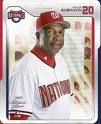
On Oct. 3, 1974 Beaumont, Tex.-born Frank Robinson Jr. (1935-), 5-season mgr. in the Puerto Rican Winter League is named ML baseball's first black mgr. (Cleveland Indians), drawing a congratulatory telegram from Pres. Ford; on opening day 1975 his wife Rachel utters the soundbyte: "I hope this is the beginning of a lot more black players being moved into front office and managerial positions and not just having their talents exploited on the field"; in Apr. 1975 his team scores its first V against the New York Yankees in the season opener, in which he hits a 1st-inning homer in his first at-bat, after which his team finishes the year 79-80, followed by 81-78 next year (first winning season for the Indians since 1968); too bad, after a bad season in 1977, he becomes the first African-Am. mgr. to be fired; his 1988 season as mgr. of the Baltimore Orioles opens with 21 straight and 107 total losses; he retires in Oct. 2006 with 2,943 hits, .294 batting avg., 586 homers (#4) and 1,829 RBIs (#10) as a player, and after becoming the first African-Am. player to manage a team in each major league, and to be named mgr. of the year in each league; too bad, color-line-breaking player Jackie Robinson dies in 1972 before he can see any of it.

In Oct. 1974 Patti Labelle (1944-) and the Labelles become the first African-Am. contemporary act to perform at the Metropolitan Opera in New York City.




In 1974 after being accused of killing 17-y.-o. Oakland, Calif. ho Kathleen Smith, Black Panthers co-founder Huey Percy Newton (1942-89) flees to Cuba, and names his singer babe Elaine Brown (1943-) (who ran unsuccessfully for the Oakland Calif. city council last year, with 30% of the vote, and runs again next year, getting 44% of the vote) as the new chmn. of the party (until 1977), going on to manage the campaign of Lionel Wilson, who becomes Oakland's first black mayor in 1977; after Newton (who was placed on the FBI Most Wanted List) returns from Cuba in 1977 after Peoples Temple leader Jim Jones visits him, and is acquitted for lack of evidence, then demands that staffer Regina Davis be beaten, she quits the party for its sexism, going to law school and becoming a prison reformer; too bad, on Dec. 13 Black Panther Party bookkeeper Betty Van Patter (b. 1929) disappears, and her severely beaten body is later found on a very pattering beach in San Francisco Bay, causing Marxist Black Panther supporter David Joel Horowitz (1939-) to accuse her (his close friend) of it to cover-up financial irregularities.

In Apr. 1975 Robert Lee Elder (1934-) becomes the first African-Am. to play in the Masters golf tournament in Augusta, Ga.

On Sept. 2, 1975 Joseph W. Hatchett (1932-) of Tallahassee, Fla. becomes the state's first African-Am. supreme court justice since Reconstruction; after becoming the first black elected to statewide office in Fla. by winning reelection, in 1979 he becomes the first black appointed to the federal appeals court for the Deep South - I don't care what color he is, I don't want to come up against any Judge Hatchett?
On Feb. 5, 1976 after a dispute over the school athletic team name (Raiders or Rebels), a 4-hour race riot at Escambia H.S. in Pensacola, Fla. involves 2K of 2.5K students and injures 30, four of them shot and the rest hit by rocks and debris, after which crosses are burned on several school board members' lawns, causing the Fla. Nat. Guard to be called in; in the fall term the students pick the name Gators; on July 26, 1977 the KKK holds a rally on school grounds, causing the school board to be reorganized.
On Sept. 23, 1976 the First Ford-Carter Debate in Philadelphia, Penn. (first U.S. pres. TV debates since 1960), hosted by Edwin Newman of NBC-TV is marred by a 27-min. sound loss during which the candidates stand silently behind their lecturns, and sees Ford portray Carter as too inexperienced and come out the winner; Carter pledges to end busing for desegregation.

In 1976 Pasadena, Calif.-born UCLA-educated feminist Octavia Estelle Butler (1947-2006) pub. her first novel Patternmaster. She goes on to become the first black woman to gain nat. prominence as a sci-fi writer and receive the MacArthur Foundation Genius Grant (1995).



On Aug. 17, 1976 Ithaca, N.Y.-born Alexander Murray Palmer "Alex" Haley (1921-92) pub. the bestseller Roots: The Saga of an American Family, which he calls "faction", a combo of fact and fiction, claiming to have spent 12 years researching his family in W Africa, discovering his first ancestor Kunta Kinte from Juffure, Gambia in 1750 (spawning a tourist boom there as well as a genealogy craze in the U.S.); the saga ends at a funeral in Ark.; spawns the Roots 8-episode miniseries on ABC-TV on Jan. 23-30, 1977, becoming the most successful TV miniseries, changing American perceptions of blacks; on Apr. 19, 1977 he receives a special Pulitzer Prize for it; in 1988 black poet Margaret Walker unsuccessfully sues him for plagiarizing her 1966 novel "Jubilee"; in 1997 a BBC documentary exposes his work as plagiarism, and he later pays white writer Harold Courlander $650K, but since he's such a PC sacred cow it's covered up by the U.S. media? On Jan. 23-30, 1977 the Roots miniseries, based on the 1976 Alex Haley bestseller is televised on ABC-TV on eight straight nights, comforting millions of whites that their white president from the Deep South is all for this TV network healing time, and can commiserate with their plight as long as they don't have to actually have to see a black in real life?; over 100M watch the final tearjerker episode.

On Nov. 6, 1976 Benjamin Lawson Hooks (1925-) succeeds Roy Wilkins as executive dir. of the NAACP (until 1992).
In 1976 Am. Neo-Nazi Eric Thomson pub. Welcome to ZOG-World, which popularizes the term "Zionist Occupation Govt." (ZOG) for the U.S. govt. On Dec. 27, 1984 the New York Times pub. an article about the white supremacist group The Order (Bruder Schweigen), which stages robberies in Calif. and Wash. "to raise money for a war upon the United States Government, which the group calls 'ZOG', or Zionist Occupation Government".





Captain Underpants to the rescue? On Jan. 20, 1977 Goober State (Ga.) born peanut farmer and U.S. Naval Academy grad. in nuclear physics James Earl "Jimmy" Carter (b. 1924) becomes the 39th U.S. pres. (until 1981) in the 57th U.S. Pres. Inauguration; first U.S. Naval Academy grad. to become pres., first Southerner since Zachary Taylor, first to use his nickname in an official capacity, and first to skip his middle name in his oath, using "Jimmy Carter"; one of three U.S. presidents to live at least 30 years after taking office (Herbert Hoover, Gerald R. Ford); a no-frills stickler, he surprises everyone by insisting on walking from the U.S. Capitol to the White House, and selling 10K bleacher seats for $25 each to help pay for the inaugural parade; later he insists on carrying his own bags, and causes an outcry by attempting to do with the playing of "Hail to the Chief"; the Carter Inaugural Address begins by thanking Ford for "all he has done to heal our land"; he goes on to become known as a failed pres. for failing to get reelected, while getting more legislation passed than any recent pres. except LBJ; Walter Frederick "Fritz" Mondale (1928-) becomes the 42nd U.S. vice-pres.; First Lady is Eleanor Rosalynn Smith Carter (1927-) (Secret Service codename: Dancer), who was active during the campaign and continues her active role in his admin.; Pres. Carter appoints Cyrus Roberts Vance (1917-2002) (LBJ's deputy secy. of defense, who resigned and advised him to pull out of South Vietnam) as U.S. secy. of state #57 (until Apr. 28, 1980), and Patricia Roberts Harris (1924-80) as U.S. secy. of HUD (later HHS) #6 (until Sept. 10, 1979), becoming the first African-Am. woman to enter the U.S. pres. line of succession (lucky #13).

On Jan. 30, 1977 after being appointed by Pres. Carter on Dec. 16, New Orleans, La.-born U.S. Rep. (D-Ga.) (since Jan. 3, 1973) Andrew Jackson Young Jr. (1932-) (former friend of MLK Jr., who was with him when he was assassinated in Memphis, Tenn. in 1968) becomes U.S. U.N. ambassador #14 (first African-Am.) (until Sept. 23, 1979), going on to become Atlanta, Ga. mayor #55 in 1982-90. On July 12, 1978 after an impeachment attempt (HR 805) in 1977 only gains 10 votes, on the eve of SALT negotiations Le Matin of Paris pub. a July 10 interview with U.S. ambassador to the U.N. (1976-9) Andrew Jackson Young Jr., in which he compares Soviet dissidents to U.S. civil rights activists, and utters the soundbyte that there are "hundreds, maybe even thousands" of "political prisoners in the United States", pissing-off Jews, causing Rep. Larry McDonald to try to impeach him on July 13, and Pres. Carter to rebuke him and the White House to disavow his views; he is finally forced to resign after meeting with a rep of the PLO against U.S. policy.

On Feb. 14, 1977 Clifford Leopold Alexander Jr. (1933-) becomes the first African-Am. secy. of the U.S. Army (until Jan. 20, 1981), presiding over making it an all-volunteer force while emphasizing minority business contracts.
On July 11, 1977 a posth. Medal of Freedom is awarded to Rev. Martin Luther King Jr. (d. 1968) in a White House ceremony.

On July 16, 1977 Janelle Penny Commissiong (1953-) of Trinidad-Tobago becomes the first black woman to win the Miss Universe title.

In Oct. 1977 Karen Batchelor Farmer (1951-) becomes the first African-Am. member of the Daughters of the Am. Rev. (DAR) (founded 1890) (member #623,128); 5K blacks fought in the Am. Rev.

In 1977 Bronx, N.Y.-born Louis Farrakhan (Louis Eugene Walcott) (1933-), head of the Nation of Islam's Harlem Mosque since 1965 quits and forms his own movement, going on to found the newspaper Muhammad Speaks in 1979, and becoming known for soundbytes against the Jews and in praise of Adolf Hitler.

In 1977 James Alan McPherson (1943-) pub. the short story collection Elbow Room, becoming the 2nd African-Am. to win a Pulitzer, and first to win for fiction.

In 1977 Lorain, Ohio-born Toni Morrison (Chloe Ardelia Wofford) (1931-) pub. Song of Solomon, about Milkman Dead, who searches for a missing treasure along with his black identity and heritage, becoming the first Book-of-the-Month Club selection by an African-Am. since Richard Wright's "Native Son" (1940). In 1987 she pub. Beloved, which wins the Pulitzer Prize; "124 was spiteful" (opening line); former slave Sethe in 1873 Cincinnati, Ohio is haunted by the ghost of the daughter she killed; based on "The Black Book: A Scrapbook Record of African Life, Compiled by the Authority on Black History M.A. Harris (1908-77)", which she began in 1974. In 1998 she pub. Paradise, about fictional all-black Ruby, Okla.

On Jan. 27, 1978 after ACLU dir. (since 1970) Aryeh Neier (1937-) (a Jew born in Nazi Germany) backs them, the Ill. State Supreme Court rules that the Neo-Nazi Nat. Socialist Party of Am. (NSPA) can display the Swastika in a march in predominantly Jewish Skokie, Ill.; Neier's actions cause 30K to quit the ACLU, and he resigns in Apr., denying any connection; it later turns out that NSPA leader Francis Joseph "Frank" Collin (Cohen) (1944-) is of Jewish ancestry, causing him to be ousted, after which he does three years for child molestation in 1979-2 then becomes a neopagan author.


On Mar. 6, 1978 Larry Flynt (1942-), white sex-addict publisher of Hustler mag. (which is known for going beyond "Playboy" and "Penthouse" with "open pussy" photos, lesbianism, B&D, etc.) is shot outside a courtroom in Lawrenceville, Ga. along with atty. Gene Reeves, allegedly by white supremacist assassin Joseph Paul Franklin (1930-), who got pissed-off an ed. of Hustler portraying interracial sex, and who escapes and later attempts to assassinate civil rights leader Vernon E. Jordan on May 29, 1980; the .44 caliber rifle shot paralyzes Flynt from the waist down - who changes his diapers?
On June 6, 1978 the U.S. Supreme (Burger) Court rules 7-2 in Monell v. New York City Dept. of Social Services that the 1871 U.S. Civil Rights (Ku Klux Klan) Act applies to muncipalities as well as states.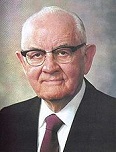
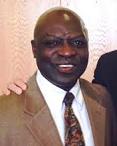
On June 9, 1978 after 148 years of institutional white supremacy, Church of Jesus Christ of Latter-Day Saints (Mormons) pres. #12 (1973-85) Dispenser of White Gumballs, er, Spencer Woolley Kimball (1895-1985) announces a Revelation on Priesthood, finally allowing blacks ("Canaanites") to be ordained as priests, and on June 11 Joseph Freeman Jr. (1952-) becomes the first black priest ordained by the LDS Church; by 1997 it has 500K members.

It's a long road back from nowhere to nowhere? On June 28, 1978 the U.S. Supreme (Burger) Court votes 5-4 in Regents of the U. of Calif. v. Bakke to order the medical school at the U. of Calif. at Davis to admit white Marine Corps. vet Allan Paul Bakke (1940-), who claimed to be a victim of reverse racial discrimination under Title VI of the Civil Rights Act, and bans quotas, while a different 5-4 majority votes to allow race to be used as one factor in a mix of admissions criteria to promote "diversity", which becomes the new PC buzzword; there were 3,737 applicants for 100 seats, of which 16 were reserved for minorities only; Brennan, Marshall, White, Blackmun, and Powell concur, and Stevens, Stewart, Burger, and Rehnquist dissent.

On Nov. 3, 1978 Diff'rent Strokes debuts on NBC-TV for 189 episodes (until May 4, 1985) (followed by ABC-TV from Sept. 27, 1985 to Mar. 7, 1986) for 189 episodes, starring cute little black guy (everybody should own one?) Gary Coleman (1968-) and less-cute black guy (but not old enough to be a threat to white wimmen yet?) Todd Anthony Bridges (1965-) in a mixed-race family, with hot young white sugar britches (close but not too close to interracial sex?) Dana Plato (1964-99), and introduces the U.S. public to the you-know-what-mixing issue in a palatable way, despite the suggestive title; Plato gets pregnant after the 6th season in 1984, and is dropped from the show; Janet Jackson appears on the show from 1980-4; after the show is cancelled all the teen actors fizzle and go bad; Plato goes into porno and gets arrested for theft; Bridges becomes a drug and alcohol addict, and is acquitted in 1989 of assault with a deadly weapon in the near-fatal shooting of an L.A. drug dealer; Coleman ends up a no-longer-cute security guard who stays a virgin until age 40, when in Feb. 2008 he reveals his secret marriage to 22-y.-o. white redhead Shannon Price (1985-).


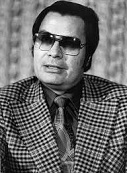


On Nov. 18, 1978 (Sat.) after arriving to investigate complaints of mistreatment of relatives, and being told by 20 members that they want to leave, then accompanying him to Port Kaituma Airport, anti-cult crusading Calif. Rep. Leo Joseph Ryan Jr. (b. 1925) (D-Calif.) and four others are killed in Jonestown, Guyana by Larry Layton and three other members of Rev. Jim Jones' Peoples Temple of the Disciples of Christ (founded 1955), making Ryan the first U.S. congressman killed in the line of duty (until ?); the killings are followed by the Jonestown Massacre, a night of mass murder-suicide by 911 cult members, becoming the worst religious mayhem since John of Leiden's cult in 1535; Jones kills himself, and only 32 members escape, incl. their controversial atty. Mark Lane (1947-); 75% of church members are black, a majority of them women who bought his promise of a black paradise sans racial prejudice, segregation, and economic inequality; the publicity hurts sales of Kool-Aid, even though a cheaper unsweetened brand called Flavor Aid (first marketed in 1929) might have been used instead of or as well; the Cult Awareness Network (CAN) is founded to deprogram its members; too bad, in 1996 the Church of Scientology buys it in bankruptcy court - making its name an oxymoron?

In 1978 Atlanta, Ga.-born white nationalist William Luther Pierce III (1933-2002) pub. The Turner Diaries under the alias Andrew MacDonald, becoming a Am. white supremacist hit about a violent rev. in the U.S. to exterminate all Jews and non-whites, leaving a clean white pop. of 50M; inspiration for the 1995 Okla. City Bombing of Timothy McVeigh, after which Pierce utters the soundbyte "Someone may have read the book", but later claims he doesn't approve of it; the FBI calls it the most dangerous book in America, making it more popular? In 1984 Luther pub. Hunter under the alias Andrew Macdonald, a prequel to "The Turner Diaries", about Vietnam vet Oscar Yeager, who assassinates interracial couples in the Washington, D.C. area; a copy is found in Terry Nichols' home by the FBI.
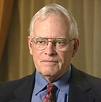
On Jan. 2, 1979 FAIR (Federation for American Immigration Reform) is founded by Mich.-born opthalmalogist John H. Tanton (1934-) (author of "International Migration" in 1975, and "End of the Migration Epoch?" in 1994) to fight against immigration to the U.S., especially from Mexico; too bad, his connections with white supremacist and eugenics orgs. stink him up?
On June 27, 1979 the U.S. Supreme Court by 5-2 definitively supports affirmative action in United Steel Workers v. Weber; William Rehnquist writes the dissenting opinion.
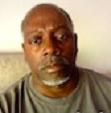
On Dec. 16, 1979 Willie Willis wins the Brunswick Nat. Resident Pro Tournament in Charlotte, N.C., becoming the first African-Am. bowling champion in the PBA in a non-touring event; he goes on to place 13th in the 1980 Firestone Tournament of Champions, becoming the first African-Am. bowler in the tournament (until ?); in 1986 he rolls his 19th perfect 300 game in competition.
On May 17-19, 1980 the 1980 Miami Riots Fla. in Miami's 40x60 block Liberty City neighborhood (pop. 233K) kill 14 (one of the worst riots in U.S. history); they erupt after an all-white justice-for-the-cops jury in Tampa acquits four former Miami police officers (three white, one Cuban) of fatally beating black insurance exec Arthur McDuffie (1946-79) on Dec. 17, 1979 after he flees an arrest for driving with a suspended motorcycle license, kicking him down and hitting him repeatedly with nightsticks, cracking his skull "like an egg", then attempting a coverup by running over his motorcycle with a police car to make it look like an accident; the lead prosecutor is future U.S. atty. gen. Janet Reno.


On May 29, 1980 Am. civil rights leader Vernon Eulion Jordan Jr. (1935-) is shot and critically wounded in an assassination attempt in Gary, Ind. by Mobile, Ala.-born white supremacist serial killer ("the Racist Killer") Joseph Paul Franklin (James Clayton Vaughn Jr.) (1950-2013), who got pissed-off after seeing him with a white woman in Ft. Wayne, Ind., becoming the first major news story for CNN (debuts June 1); on Mar. 6, 1978 Franklin allegedly shot Penthouse mag. publisher Larry Flynt and his atty. for an interracial sex article; Jordan goes on to become a close adviser to Pres. Bill Clinton; next Mar. 4 a jury in Salt Lake City convicts Franklin of violating the civil rights of two black men he shot to death; he later receives six life sentences and a death sentence, and is executed by lethal injection on Nov. 20, 2013.



On June 1, 1980 Cincinnati-born Robert Edward "Ted" Turner III (1938-) debuts Cable News Network (CNN), the first TV network with 24/7 news reporting, based in Atlanta, Ga., vowing to stay on the air till the world ends; Chicago-born African-Am. journalist Bernard Shaw (1940-) anchors the news until Mar. 2001; the first name he mentions is Pres. Carter; Moneyline TV Financial News debuts on CNN, hosted by Louis "Lou" Dobbs (1945-).

On June 9, 1980 during the making of the film "Bustin' Loose", black comedian Richard Pryor (1940-2005) suffers almost fatal 3rd deg. burns at his San Fernando Valley, Calif. home when a mixture of freebase cocaine explodes. On Dec. 12, 1980 Sidney Poitier's Stir Crazy debuts, a comedy starring Richard Pryor as Harry Monroe and Gene Wilder as Skip Donahue, two East coast dudes who are framed for bank robbery and end up in a Western priz, ending up in an inter-prison rodeo; becomes the highest grossing film dir. by a person of African descent (until ?).
On July 2, 1980 the U.S. Supreme (Burger) Court rules 6-3 in Fullilove v. Klutznick that Congress has authority to redress past racial discrimination via minority quotas in govt. contract awards, such as by a 10% setaside; too bad, three separate majority opinions are written, plus two minority opinions by dissenters Stewart and Rehnquist; the decision is overruled Adarand Constructors Inc. v. Pena (1995), which adopts strict scrutiny for federal contracting.
On Dec. 1, 1980 the U.S. Justice Dept sues Yonkers, N.Y. for racial discrimination and intentional housing segregation, and wins in 1984.
On Nov. 17, 1980 WHHM-TV in Washington, D.C. becomes the first African-Am. public broadcasting TV station.
On Mar. 21, 1981 black teenager Michael Donald is abducted in Mobile, Ala. by two Klansmen, then tortured and lynched in what prosecutors claim was a Ku Klux Klan conspiracy; a civil suit against the United Klans wins $7M and shuts them down.

On Jan. 4, 1982 U.S. audiences get treated with a black face with their morning coffee as NBC sports personality Bryant Charles Gumbel (1948-) replaces Tom Brokaw as host of Today, teaming with white face Jane "Bipolar" Pauley (until Jan. 3, 1997); too bad, Gumbel makes the mistake of writing a memo in 1989 dissing white Willard Scott and Jew Gene Shalit - a taste of future mass mixed marriages in the U.S.?
On Jan. 8, 1982 Bob Jones U. of S.C. and other racial-discrimination-promoting univs. are given tax-exempt status on the orders of Pres. Reagan after 11 years (1971), but on Jan. 12 after a firestorm of controversy he flip-flops; on May 24, 1983 the U.S. Supreme Court by 8-1 decides that the IRS can revoke the tax-exempt status of orgs. that are contrary to established public policy, incl. those who practice racial discrimination; the lone dissenter is Rehnquist.


That 1965 Astronaut Barbie really worked? On Apr. 19, 1982 Sally Kristen Ride (1951-) and Guion S. "Guy" Bluford Jr. (1942-) become the first woman and first black to be tapped by NASA for U.S. space missions - ride sally ride, and go on and bluff for the government? On Aug. 30, 1983 U.S. Air Force Col. Guion S. "Guy" Bluford Jr. (1942-) becomes the first African-Am. astronaut to travel in space, blasting off aboard Space Shuttle Challenger Mission STS-8, also carrying Richard H. Truly, Daniel Brandenstein, William Thornton, and Dale Gardner; after launching an Indian weather satellite, it returns on Sept. 5 - a long way from Port Chicago?

On July 28, 1982 Taylor Hackford's An Officer and a Gentleman, a Romeo-Juliet takeoff written by Douglas Day Stewart stars Richard Gere as U.S. Navy Aviation Officer Candidate Zack Mayo, who meets "Puget Sound Deb" factory worker trailer trash Paula Pokrifki (Debra Winger) and gets what he wants after uttering the soundbyte "I've got nowhere else to go", while she wants more than she can get until she proves she's a hooker with a heart of gold?; makes a star out of Louis Cameron Gossett Jr. (1936-) as drill instructor with a heart of gold Marine Gunnery Sgt. Emil Foley; David Keith and Lisa Blount play Gere-Winger duals Sid Worley and Lynette Pomeroy, with the latter being the only one in the flick without a heart of gold?; David Caruso plays whimpy candidate Topper Daniels; the final scene, a takeoff on the white knight in shining armor rescuing the princess is a keeper; features the song Up Where We Belong by Buffy Sainte-Marie and Jack Nitzsche, sung by Joe Cocker and Jennifer Warnes.

On Sept. 21, 1982 Michael Jackson's younger sister Janet Damita Jo Jackson (1966-) released her debut album Janet Jackson, which features the track Young Love. Album #3 Control (Feb. 6, 1986) (#1 in the U.S.) sold 14M copies, and features Control, Nasty, What Have You Done for Me Lately, When I Think of You, and Let's Wait Awhile. Album #4 Rhythm Nation 1814 (Sept. 19, 1989) (#1 in the U.S.) sold 14M copies, becoming the #1 album in the U.S. for 1990, generating a record seven top-5 hits, incl. 4 #1s, 2 #2s, and 1 #4; "We are a nation with no geographic boundaries, bound together by our beliefs. We are like-minded individuals, sharing a common vision, pushing toward a world rid of color lines"; Francis Scott Key wrote "The Star-Spangled Banner" in 1814, R is the 18th letter, N is the 14th letter, and guess what day the album is released; oh yes, in 1814 women were granted education beyond the 8th grade; it features Rhythm Nation, State of the World, Miss You Much, Love Will Never Do (Without You), Alright, Escapade, Black Cat, and Come Back to Me. Album #5 Janet. (Janet, period.) (May 18, 1993) (#1 in the U.S. and U.K.), an attempt to break away from the Jackson name also broke away from her Jehovah's Witness upbringing by posing nude on the cover, ending speculation that she's really just Michael with a wig, with lyrics talking about safe sex; it sold 20M copies worldwide, and features That's the Way Love Goes, If, Again, Because of Love, Any Time, Any Place, Throb, You Want This, Whoops Now, and What I'll Do. Album #6 The Velvet Rope (Oct. 7, 1997) (#1 in the U.S.) sold 10M copies; the lyrics go into domestic violence, sadomasochism, gay sex, and despondency; she signed with Virgin Records for a record $80M, eclipsing her brother Michael Jackson and Madonna, who only got $60M, causing her to become known as the Queen of Pop; tracks included I Get Lonely (#3 in the U.S), Together Again (#1 in the U.S.), Got 'till It's Gone (#36 in the U.S.), and Go Deep (#28 in the U.S.). Album #7 All for You (Apr. 24, 2001) (#1 in the U.S. and U.K.) sold 9M copies (3M in the U.S.), and features Doesn't Really Matter, All for You, Someone to Call My Lover, Son of a Gun (I Betcha Think This Song Is About You) (w/Missy Elliott), Come On Get Up, and Would You Mind (eliminated from a clean version of the album). Album #9 20 Y.O. (Sept. 20, 2006) (#2 in the U.S., #63 in the U.K.) features Call On Me (w/Nelly), So Excited, and Enjoy. She went on to sell 100M records, becoming one of the richest people in show biz.
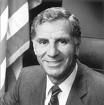
On Nov. 2, 1982 with unemployment at 7.4% and new jobs being created mainly in the low-paid service industry not manufacturing, the U.S. nat. elections are a D for Reagan and Reaganomics as the Repubs. lose 26 House seats.; Repub. Calif. atty.-gen. (since 1979) Courken George Deukmejian Jr. (1928-) becomes the first Armenian-Am. to be elected gov. of Calif., and next Jan. 3 is sworn in as Calif. gov. #35 (until Jan. 7, 1991); black Los Angeles Mayor Tom Bradley was ahead in the polls before his narrow V, becoming known as the Bradley (Wilder) Effect, the tendency of U.S. voters to vote white inside the voting booth despite their profession of loyalty for a black candidate outside the booth.

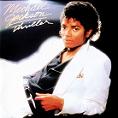
On Nov. 30, 1982 African-Am. singer Michael Jackson (1958-2009) releases his mega-album Thriller, which makes him into a superstar and breaks "the apartheid of pop" that has kept black music out of the mainstream; many young blacks and whites get a new hero who shows that staying a kid through adulthood is cool?; "His high-flying tenor makes him sound like the lead in some funked-up boys choir" (Time mag.) - once Commie kids hear him they'll ditch Communism in minutes?
On Dec. 28, 1982 African-Am. man Nevell Johnson Jr. (b. 1962) is fatally shot by Cuban-Am. police officer Luis Alvarez in a Miami, Fla. video arcade, setting off three days of race-related disturbances that leave another man dead; in Mar. 1984 Alvarez is acquitted of manslaughter, causing two more nights of rioting and 350 arrests.
In 1982 Shirley Chisholm leaves Washington, D.C. to teach at Mount Holyoke College in Mass., saying "When I ran for the Congress, when I ran for pres., I met more discrimination as a woman than for being black. Men are men."

In 1982 African-Am. civil rights activist folk singer Julius Lester (1939-) converts to Judaism, going on to work to heal the rift between the black and Jewish communities, and uttering the soundbyte: "The black assumption is that Jews are white people. And blacks don't understand that most Jews don't see themselves as white."


In 1982 the $10 Super Soaker (original name Power Drencher until 1991) recreational water gun is invented by Mobile, Ala.-born African-Am. engineer Lonnie George Johnson (1949-), who receives U.S. patent #4,591,071 on May 27, 1986; it takes until 1989 to get Larami to market it, becoming the best-selling toy in the U.S. in 1992.
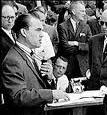
On Jan. 17, 1983 wheelchair-bound George Corley Wallace Jr. (1919-98) becomes the first to be inaugurated for a 4th term as gov. of Ala. (until Jan. 19, 1987).
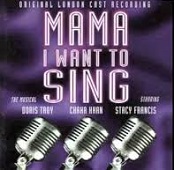
On Mar. 23, 1983 Wesley Naylor, Vy Higgenson, and Ken Wydro debut their musical Mama, I Want to Sing! (Hecksher Theater, New York) (Mar. 23) (2,213 perf.); stars Crystal Johnson (followed by Tisha Campbell) as African-Am. singer Doris Troy; longest-running black off-Broadway musical in history (until ?).

On Apr. 12, 1983 Dem. Harold Lee Washington (1922-87) is elected Chicago's first African-Am. mayor (until Nov. 25, 1987); he is sworn in on Apr. 29; Barack Obama becomes his friend and considers him a role model.

On June 15, 1983 the U.S. Civil Rights Commission criticizes the Reagan admin. for failing to appoint more women and minorities to high-level federal govt. positions, causing Pres. Reagan to fire all four members, incl. 1980 Carter appointee Mary Frances Berry (1983-), who successfully sues to be reinstated; meanwhile on Nov. 30 Reagan signs a law reconstituting the commission as an independent agency jointly administered by the pres. and Congress, whose eight members don't need Senate confirmation and may only be removed for neglect of duty or malfeasance.


She's a beautiful girl, no matter if she's black or white or black on white? On Sept. 17, 1983 after singing "Happy Days Are Here Again", Vanessa Lynn Williams (1963-) becomes the first African-Am. Miss America; too bad, she has to resign on July 23, 1984 after nude lezzie fun photos of her with a white woman are pub. 6 mo. later in the Sept. 1984 issue of Penthouse mag. (which sells 5.3M copies, the #2 selling issue of a mag. in history, #1 being the Nov. 1972 issue of Playboy at 7.1M); runner-up Suzette Charles (DeGaetano) (1963-) becomes the 2nd African-Am. Miss America, serving a record 7 weeks - a hundred years from now sexual athletics will be a required event?
On Nov. 2, 1983 after opposing it then flopping, Pres. Reagan signs a bill establishing the Martin Luther King Jr. Day federal holiday on the 3rd Monday in Jan. in honor of slain civil rights leader Martin Luther King Jr. (1929-68) (born on Jan. 15), beginning in Jan. 1986; most businesses and Wall St. ignore it.

On Nov. 8, 1983 Woodrow Wilson Goode Sr. (1938-) is elected the first black mayor of Philadelphia, Penn. (until Jan. 6, 1992).

On Dec. 4, 1983 African-Am. U.S. Navy Lt. Robert O. "Bobby" Goodman is shot down over Lebanon, and captured by the Syrians, and released next Jan. 3 after 30 days after intervention by on Dec. 29 by a party led by Rev. Jesse Jackson that incl. Louis Farrakhan and Rev. Jeremiah Wright, after which Pres. Reagan welcomes him at the White House on Jan. 4, and sends a letter to Syrian pres. Hafez al-Assad calling for cooperation in bringing peace to Lebanon.
On Jan. 17, 1984 the Reagan-packed U.S. Commission on Civil Rights votes to end numerical quotas for promotion of black workers and execs, saying "Such racial preferences merely constitute another form of discrimination."

On Apr. 3, 1984 Georgetown U. coach John Thompson Jr. (1941-) becomes the first black coach to win an NCAA basketball tournament.




On June 18, 1984 outspoken Jewish radio talk show host Alan Berg (b. 1934) is shot to death in the driveway of his Denver, Colo. home in front of his VW Beetle by two white supremacists of The Order, connected with the Aryan Nations Church, and eerily similar to a scene in the 1978 white supremacist novel "The Turner Diaries"; Order founder David Eden Lane (1938-2007) and several other white supremacists are railroaded by Denver's first African-Am. district atty. Norman S. "Norm" Early (normally up early to step and fetch it?) on federal RICO and other squishy charges when he can't prove a state murder charge and decides to 'get' them. On Nov. 17, 1987 a federal jury in Denver convicts two neo-Nazis and acquits two others of civil rights violations in the 1984 slaying of radio talk show host Alan Berg.
On July 16-20, 1984 the 1984 Dem. Nat. Convention in San Francisco, Calif. chooses Walter Mondale for pres. over Colo. Sen. Gary Hart; Geraldine A. Ferraro wins the vice-pres. nomination by acclamation on July 19; N.Y. Gov. Mario Cuomo's keynote address on July 16 is said to do more to promote his political rep than any oratory since William Jennings Bryan; on July 17 Rev. Jesse Jackson attempts to best him, turning the convention into a revival?; on July 16 150K union workers and 100K gay activists stage separate Anti-Reagan Marches.






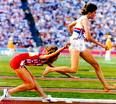




On July 28-Aug. 12, 1984 the XXIII (23rd) Summer Olympics are held in Los Angeles, Calif. after the Soviets pull out on May 7-8, and 13 other Communist nations follow suit (Romania attends); 6,797 athletes from 140 nations compete in 221 events in 23 sports; the first privately-funded games (profit $200M), featuring a new IOC trust fund set up in 1985 at the urging of Edwin Moses to subsidize athletes; the official mascot is Sam the Olympic Eagle; the opening ceremonies feature 80 grand pianos; the 9,320 mi. all-by-foot torch relay from New York City to LA involves 3,616 different runners, incl. 200 from sponsor AT&T; John Williams composes Olympic Fanfare and Theme for it; synchronized swimming, rhythmic gymnastics, and wind surfing debut; tennis (last seen in the 1924 Summer Olympics) is a demo sport, and baseball holds its 6th exhibition; the opening ceremony features Bill Suitor arriving in a Bell Aerosystems Jet Pack (Tyler Rocketbelt); the U.S. wins a lopsided share (83) of gold medals, West Germany is 2nd with 59, and Romania is 3rd with 20; Frederick Carlton "Carl" Lewis (1961-) equals Jesse Owens in 1936 by winning four golds (100m, 200m, 4x100m relay, long jump); Greg Louganis (1960-) of the U.S. wins gold in springboard and platform diving; the marathon is watched by 1M in person; Joan Benoit Samuelson (1957-) of the U.S. wins the first-ever Olympic women's marathon; Evelyn Ashford (1957-) of the U.S. wins the 100m gold with a world record 10.76 sec. (first under 11 sec.), while Gabi Andersen-Schiess of Switzerland upstages her with a stumbling last lap; Zola Budd (1966-) of South Africa (representing the U.K. to get around the apartheid problem) bumps U.S. runner Mary Decker Slaney (1958-) off the track in the 3 km for a pity party moment, allowing Marcica Puica to win; Nawal El Moutawakel (1962-) of Morocco becomes the first female medal winner from an Islamic nation (400m hurdles); Mary Lou Retton (1968-) of the U.S. becomes the first gymnast outside Eastern Europe to win the gymnastics all-round competition after only 1 of 11 women who won golds in the 1983 World Championships compete; Kiwi archer Neroli Susan Fairhall (1944-2006) becomes the first paraplegic athlete in the Olympics, placing 35th; the first privately-financed Olympics (organized by Peter Ueberroth); the debut of the Fuji Blimp.

On Sept. 20, 1984 The Cosby Show debuts on NBC-TV for 197 episodes (until Apr. 30, 1992), starring William Henry "Bill" Cosby (1937-) as African-Am. physician Heathcliff "Cliff" Huxtable, Phylicia Rashad (Phylicia Ayers Allen) (1948-) as his wife Clair Olivia Hanks Huxtable, along with their urbane upper middle class black Brooklyn children, incl. Sabrina Le Beauf (1958-) as Sondra Huxtable Tibideaux, Lisa Michelle Bonet (1967-) as Denise Huxtable Kendall, Malcolm-Jamal Warner(1970-) as Theodore Aloysius "Theo" Huxtable, and Tempestt Bledsoe (1973-) as Vanessa Huxtable.
On Oct. 10, 1984 Rev. Jesse Jackson formally launches his bid for the Dem. pres. nomination in Raleigh, N.C. - a non-white U.S. pres., the impossible dream?

On Dec. 8, 1984 Am. white supremacist Robert Mathews (b. 1953) is killed in shootout with the ef-bee-eye near Cooneville, er, Coupeville, Whidbey Island, Wash., leaving a last letter, containing the soundbyte: "By the time my son had arrived, I realized that White America, indeed my entire race, was headed for oblivion unless White men rose and turned the tide. The more I came to love my son the more I realized that unless things changed radically, by the time he was my age, he would be a stranger in his own land, a blonde-haired, blue-eyed Aryan in a country populated mainly by Mexicans, mulattoes, blacks and Asians. His future was growing darker by the day."

Merry Christmas, sucka II? On Dec. 22, 1984 New York's "subway vigilante" (an engineer) Bernhard Hugo "Bernie" Goetz (1947-) shoots at and wounds four black teens (Barry Allen, Troy Canty, James Ramseur, Darrell Cabey) in the Seventh Ave. 2 Express subway in Manhattan, then flees into a tunnel after telling a motorman that they tried to rob him; after the victims all turn out to have criminal records, but Cabey ends up a paraplegic, it sparks a nat. debate on vigilantism vs. legitimate self-defense, his claims of self-defense get him acquitted of attempted murder in 1987 in a trial where atty. William Kunstler represents Cabey; the other three wounded teens all go to jail; Goetz ends up convicted of illegal weapon possession and serves 8 mo.
In 1984 the city council of New York City passes Local Law 63, banning sex, racial, and other discrimination in private clubs with more than 400 members whose employees pay dues.
On Mar. 8, 1985 George Bush is the big Repub. winner in the first Super Tuesday pres. primaries, designed to boost the importance of the South; among Dems., Michael Dukakis, Jesse Jackson, and Al Gore split the lion's share of delegates. On Mar. 12 Rev. Jesse Jackson wins the Dem. precinct caucuses in his native state of S.C. On Mar. 15 Paul Simon defeats Jesse Jackson in the Ill. Dem. primary, while George Bush wins a clear V over Bob Dole in the Repub. primary. On Mar. 26 Jesse Jackson stuns fellow Dems. by soundly defeating Michael S. Dukakis in Michigan's Dem. pres. caucuses; on Mar. 27 Jackson vows that his campaign will continue to "win and grow". On June 7 Michael Dukakis clinches the Dem. pres. nomination by defeating Jesse Jackson in the N.J., Calif., Mont., and N.M. primaries.

On Dec. 18, 1985 Steven Spielberg's The Color Purple debuts, based on the 1982 Alice Walker novel, starring Danny Glover and Adolph Caesar; Oprah Winfrey's Oscar-nominated big screen debut; the first time that three black Am. women are nominated for the same film (Whoopi Goldberg, Margaret Avery); score by Quincy Jones.

In 1985 Cleveland-born black beauty (class pres., prom queen, high school newspaper ed.) Halle Berry (1966-) wins the Miss America Pageant for Ohio, and next year is runner-up in the Miss USA Pageant, telling the audience she wants to become an entertainer, then begins a modeling career, which leads to a part in a TV series, and more - a Bond girl one day?

In Apr. 1986 15-y.-o. English black model Naomi Campbell (1970-) appears on the cover of Elle mag., followed by the Aug. 1988 cover of Vogue Paris as their first black cover girl, launching her top model career.

On Sept. 8, 1986 the Oprah Winfrey Show debuts on daytime TV (until ?) with an episode on marrying the right person, and soon goes to the top of the ratings, rocketing Oprah Gail Winfrey (1954-) to the top in wealth and power among world blacks.
On Jan. 5, 1987 500 students led by Rev. Jesse Jackson protest the white-is-right humanities program at Stanford U., with the chant: "Hey hey, ho ho, Western Civ has got to go"; in 1989 the Western Culture course is replaced with the Humanities 101: Cultures, Ideas, and Values (CIV), which is displaces whites with blacks, women, and Marxist class struggle, claiming that whites foisted colonialism, racism, and slavery, and that their history is racist and anti-black and not worth studying.
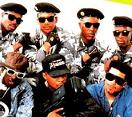
On Jan. 26, 1987 the Roosevelt, N.Y.-based hip hop group Public Enemy, incl. Chuck D (Carlton Douglas Ridenhour) (1960-), Flavor Flav (William Jonathan Drayton Jr.) (1959-), Professor Griff, and DJ Lord released their debut album Yo! Bum Rush the Show (#125 in the U.S.), which features the track You're Gonna Get Yours. Album #2 It Takes a Nation of Millions to Hold Us Back (Apr. 14, 1988) (#42 in the U.S., #8 in the U.K.) became very influential; it features Don't Believe the Hype, Night of the Living Baseheads, Bring the Noise, and Black Steel in the Hour of Chaos. Album #3 Fear of a Black Planet (Apr. 10, 1990) (#10 in the U.S.) features Fear of a Black Planet ("Man you ain't gotta worry 'bout a thing 'bout your daughter, nah she ain't my type. But supposin' she said she loved me, are you afraid of the mix of black and white, we're living in a land where the law say the mixing of race makes the blood impure. She's a woman I'm a man but by the look on your face see ya can't stand it... Excuse us for the news, I question those accused, why is this fear of black from white influence who you choose?"), Fight the Power, Anti-Nigger Machine ("Instead of peace the police just wanna wreck and flex on the kid. What I did was try to be the best so they fingered the trigger, figured I was a bigger nigger, and started to search"), 911 Is a Joke, and Burn, Hollywood, Burn (w/Ice Cube and Big Daddy Kane). Album #4 Apocalypse 91: The Enemy Strikes Back (Oct. 3, 1991) (#4 in the U.S.) features Bring the Noise (w/Anthrax). After this they began to tank.
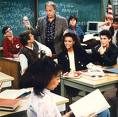
On Sept. 17, 1986 Head of the Class debuts on ABC-TV for 114 episodes (until June 25, 1991), about gifted students at Monroe (Millard Filmore) H.S. in Manhattan, starring Howard Hesseman (1940-) as history teacher Charlie Moore, who gets to teach students Daniel James "Dan" Schneider (1966-) as fat geeky computer nerd Dennis Blunden, Dan Frischman (1959-) as skinny geeky computer nerd Arvid Engen, Tony O'Dell (Anthony Dell'Aquila) (1960-) as narcisisstic conservative Reagan-loving white preppy Alan Pinkard, Robin Simone Givens (1964-) as spoiled black rich girl Darlene Merriman, Kimberly Russell (1964-) as Sarah Nevins, Khrystyne Kamil Haje (1968-) as sensitive redhead Simone Foster, Johar "Jory" Husain (Joher Coleman) (1968-) as Indian exchange student Jawaharlal Choudhury, and Tannis Vallely (1975-) as 10-y.-o. precocious Janice Lazarotto; William G. Schilling (1939-) plays principal Dr. Harold Samuels; too bad, the show attempts to sell braininess to the unbrainy U.S. public with a mixed PC message, and the so-called genius students are not much above avg. Euro students?

In 1987 black teenager Tawana Brawley (1972-) accuses six white law enforcement officers of abducting and raping her in New York City; within a year a grand jury declares the story a hoax; Rev. Alfred Charles "Al" Sharpton Jr. (1954-) backs Brawley throughout, stinking himself up. On Aug. 23, 1989 in a case that inflames racial tensions in New York City, black teenager Yusuf (Yusef) Hawkins (b. 1973) is shot dead after he and three friends are confronted and chased by 10-30 white youths in a heavily Italian working-class Brooklyn neighborhood; Rev. Al Sharpton leads a protest march through the neighborhood; two men are tried for the murder, and Joseph Fama is convicted of 2nd degree murder, while Keith Mondello is acquitted of murder but convicted on 12 lesser charges, causing more protest marches by Sharpton.

In 1987 William Julius Wilson (1935-) pub. The Truly Disadvantaged: The Inner City, the Underclass, and Public Policy, which denies that welfare causes ghetto poverty, and blames it on "spatial mismatch", where black women find it unwise to marry the fathers of their children because of their chronic unemployment.

Shut yo' mouth (STFU) or you're outta here, this is the land of the free, as long as you like being unemployed? On Jan. 16, 1988 Steuvenville, Ohio-born CBS-TV "The NFL Today" sports commentator Jimmy "the Greek" Snyder (1918-96), famous for predicting the outcome of 18 of 21 Super Bowls is summarily fired one day after telling a TV reporter in Washington, D.C. that "During the slave period, the slave owner would breed his big black with his big woman so that he would have a big black kid"; this event signals the arrival of the Regime of Political Correctness in the U.S., where the leftist mainly Jewish-controlled media attempt to stifle all free speech by creating an atmosphere where anybody expressing an opinion not in line with their super-liberal agenda of acceptance for integration, racemixing, homosexuality, feminism, affirmative action, and secularization (de-Christianization) of the govt. is open season for any govt. entity, univ., or corporation to silence and fire at will, with the action accepted without question and applauded openly by the media as not to be questioned - actually the horrible boat trip from Africa aboard slave ships already weeded out the weak and left the main pop. ready for prime time?

On Jan. 17, 1988 the Washington Redskins win the NFC championship by defeating the Minnesota Vikings 17-10; after another big John Elway 4th-quarter game-saving drive, the Denver Broncos defeat the Cleveland Browns 38-33 to win the AFC title; people in Cleveland begin to think they live under Denver's shadow, while people in Denver feel they have a Super Bowl jinx to beat. On Jan. 31, 1988 Super Bowl XXII (22) is held in San Diego, Calif.; the Washington Redskins (NFC) blow out the Denver Broncos (AFC) 42-10 after Denver momentarily appears to have broken their SB jinx with a 56-yard John Elway bomb to Ricky Nattiel for a TD on their first play from scrimmage, and a 10-0 opening lead; too bad, Washington doesn't wait till the 3rd quarter like the New York Giants, exploiting Denver's weak secondary to score 35 points in the 2nd quarter with four TD passes by QB (#17) Douglas Lee "Doug" Williams (1955-), making the rest of the game into a super bore in which Redskins rookie running back (#36) Timothy LaRay "Timmy" Smith (1964-) rushes for a record 204 yards like a hot knife through butter, incl. a 58-yard TD run; the largest deficit overcome to win a SB (10 points); outraged advertisers watching the masses turn the channel at halftime half-seriously clamor for a "No Denver in the Super Bowl" rule; Washington's Doug Williams is MVP (first black SB starting QB and MVP); speaking of Denver, in 2005 Timmy Smith is arrested for selling cocaine to an undercover police officer in Denver, sentenced to 2.5 years, then released on Mar. 3, 2008.


On Mar. 11, 1988 Ramon Menendez' Stand and Deliver, based on a true story stars Edward James Olmos as Bolivian-born teacher Jaime Alfonso Escalante Gutierrez (1930-2010), who makes it cool for Hispanic kids to study calculus in East L.A. barrio Garfield H.S. until they get high marks on the AP exam, only to be treated with white supremacist suspicion and accused of cheating.

On May 5, 1988 Eugene Antonio Marino (1934-2000) becomes the first African-Am. Roman Catholic archbishop in the U.S. during an installation Mass in the Atlanta Civic Center in Ga.; he resigns in July 1990 after having an affair with Columbus resident Vicki Long.

On Sept. 6, 1988 Lee Roy Young Jr. becomes the first black Texas Ranger in the force's 165-year history.
In 1988 Stanford U. elminates the required course in Western Civilization and History after protests by Rev. Jesse Jackson et al., featuring the chant: "Hey hey, ho ho, Western culture's got to go."
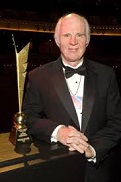
In 1988 Atlanta, Ga.-born historian Taylor Branch (1947-) pub. Parting the Waters: America in the King Years, 1954-63 (Pulitzer Prize), first in the 3-vol. 2,912-page trilogy America in the King Years, followed by Pillar of Fire: America in the King Years, 1963-65 (1998), and At Canaan's Edge: America in the King Years, 1965-1968 (2006), becoming the definitive bio. of MLK Jr.


In 1988 black gay sci-fi writer Samuel Ray "Chip" Delany Jr. (1942-) pub. his autobio. The Motion of Light in Water: Sex and Science Fiction Writing in the East Village, describing how he married white Jewish lesbian poet Marilyn Hacker (1942-) in Lower East Side New York City in summer 1961 and enjoyed a bohemian lifestyle and open interracial marriage until 1973.
On Jan. 23, 1989 the U.S. Supreme (Rehnquist) Court rules 6-3 in City of Richmond v. J.A. Croson Co. that a city-run minority set-aside program with "rigid" racial quotas giving preference to minority business enterprises in the awarding of municipal contracts is unconstitutional under the Equal Protection Clause of the 14th Amendment unless the city demonstrates a compelling interest rather than vague claims of past societal discrimination, with the Justice Sandra Day O'Connor writing the soundbyte: "To accept Richmond's claim that past societal discrimination alone can serve as the basis for rigid racial preferences would be to open the door to competing claims for 'remedial relief' for every disadvantaged group. The dream of a Nation of equal citizens in a society where race is irrelevant to personal opportunity and achievement would be lost in a mosaic of shifting preferences based on inherently unmeasurable claims of past wrongs. Courts would be asked to evaluate the extent of the prejudice and consequent harm suffered by various minority groups. Those whose societal injury is thought to exceed some arbitrary level of tolerability then would be entitled to preferential classification. We think such a result would be contrary to both the letter and the spirit of a constitutional provision whose central command is equality"; dissenting Justice Antonin Scalia doesn't believe that race-based programs are constitutional, period; the court follows with decisions on June 5 in Wards Cove Packing Co. v. Antonio and on June 12 in Martin v. Wilks weakening affirmative action in procedural ways.

On Feb. 10, 1989 Ronald Harmon "Ron" Brown (1941-96) is elected chmn. of the Dem. Nat. Committee, becoming the first black to head a major U.S. political party. On Apr. 3, 1996 he along with a delegation of 34 U.S. business leaders and journalists are killed when their Air Force CT-43A (modified Boeing 737) plane crashes into a mountain while attempting to land at Cilipi Airport in Dubrovnik, Croatia 2 mi. away.
On Apr. 19, 1989 a group of up to 50 black and Hispanic Harlem teenagers go "wilding" in Central Park, looking for random whites to terrorize and rape; they chase down, rape, and beat Trisha Meili, a 28-y.-o. Wall Street investment banker, who becomes known as the Central Park Jogger; six teenagers are charged and five convicted, until Matias Reyes confesses in 2002 that he did it alone - so let them off and I'll do their time?
On May 5, 1989 a federal judge orders sweeping changes in the FBI's promotion system months after the judge found that the bureau systematically discriminated against its Hispanic employees in advancements and assignments - stuffing taco's ain't a legitimate job function? In Apr. 1991 FBI Dir. William S. Sessions meets with black FBI agents to discuss their claims of racial discrimination and head off a threatened lawsuit - wake up, people? In 1991 the U.S. Congress extends the U.S. Civil Rights Act of 1964 to provide for the elimination of discrimination in the private and federal workplace based on sex, race, religion, and nat. origin.

On June 14, 1989 Shelton Jackson "Spike" Lee (1957-) debuts his film Do the Right Thing, starring himself and Danny Aiello in a comedy about racial tensions in a white-owned pizzeria in Brooklyn's Bed-Stuy section in the hot summer; the feature film debut of Martin Lawrence and Rosie Perez.



On Nov. 7, 1989 lt. gov. Lawrence Douglas "Doug" Wilder (1931-) becomes the first elected black state gov. in U.S. history, taking office next Jan. 14 as Va. gov. #66 (until Jan. 15, 1994); David Norman Dinkins (1927-) is elected the first black mayor (#106) of New York City, taking office on Jan. 1 (until Dec. 31, 1993); white supremacist former KKK leader David Ernest Duke (1950-) scores one for the pinks when he is elected to the State House of Reps. (Repub.) in La. (until 1992), and disavows his white supremacist agenda (but later returns to it) - I don't hate other races I just luuuuv mine?


On Dec. 15, 1989 Edward Zwick's Glory debuts, based on the book by Lincoln Kirstein and letters by U.S. Civil War Union Col. Robert Gould Shaw, cmdr. of the first all-black Union army co., starring Matthew Brockerick as Shaw, Denzel Washington as Pvt. Trip, and Morgan Freeman as Sgt. Maj. John Rawlins; launches the dir. career of Edward Zwick (1952-), who becomes known for action flicks with a cerebral dimension.


On Mar. 2, 1990 20-y.-o. 5'11-3/4" Carole Ann-Marie Gist (1969-) of Mich. becomes the first African-Am. Miss USA, crowned at its 39th pageant in Wichita, Kan., then on Apr. 15 becomes runner-up to green-eyed white redhead ("the Beauty Queen from Hell") Mona Grudt (1971-) of Norway in the Miss Universe pageant - now the ratings will tank for sure?

In Oct. 1990 a $12.5M verdict against the White Aryan Resistance (WAR) ("White Revolution is the Only Solution") is returned by a court for the killing of Ethiopian student Mulugeta Seraw in Portland, Ore.; WAR leader Thomas "Tom" Linton Metzger (1938-) then switches tactics to the "lone wolf lifestyle", doing nothing overt but waiting for the Great Serpent of the U.S. federal govt. to weaken.

On Jan. 2, 1991 Sharon Pratt Dixon (Kelly) (1944-) is sworn in as the first black female mayor (#3) of Washington, D.C. (until Jan. 2, 1995).
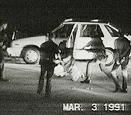
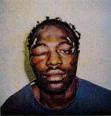



On Mar. 3, 1991 (shortly after midnight) after a 117 mph car chase, black motorist Rodney Glen King (1965-2017) is arrested by Los Angeles, Calif. police, who severely beat him when he's down while bystander George Holliday videotapes it all from a distance, shocking the U.S. with the appearance of Third World police brutality in the Land of the Free. On Apr. 2 black Los Angeles Mayor Tom Bradley calls for the resignation of white police chief (1978-92) Daryl (Darrel Francis) Gates (1926-2010) (known for telling the U.S. Senate Judiciary Committee that casual drug users are guilty of "treason" and "ought to be taken out and shot") 1 mo. after the Mar. 3 Rodney King incident, saying "I simply will not stand by as our city is being torn apart"; one hour earlier the ACLU announces it has 20K signatures calling for it; councilmen Zev Yaroslavsky and Michael Woo had already called for it; trouble is, Bradley doesn't have the power to fire him, and the Police Commission must do it; Gates replies that he will resign if the two blue ribbon citizen's panels in L.A. find him derelict in his duty, and calls the mayor's actions "kind of sneaky". On Apr. 29, 1992 the 1992 Los Angeles Riots begin after a jury acquits four police officers (three white, one Hispanic) accused of the Mar. 3, 1991 beating of suspect Rodney King (1965-2017), with mobs shouting "black justice" and "no justice, no peace"; at 6:46 p.m. white 18-wheel construction truck driver Reginald Oliver Denny (1953-) (carrying 27 tons of sand) is attacked by the "L.A. Bad Four", a gang of pissed-off black rioters, starting with Antoine Eugene "Twan" Miller (1972-2004), opening the door of his truck at Florence Ave. and Normandie, after which the others pull him out, then Henry Keith "Kiki" Watson (1965-) (who apologizes on the Phil Donahue show in 1993), holds his head down with his foot, then an unknown man throws a 5-lb. piece of medical equipment at him then hits him in the head 3x with a claw hammer, then Damian Monroe "Football" Williams (1973-) hits him in the head with a concrete slab, knocking him unconscious, then does a victory dance over his body and flips-off news helis, while Marika Tur and Bob Tur film the whole sequence from their heli, and later spend years suing everybody who play their video without paying them; finally Anthony Brown spits on him and leaves with Williams, and bystanders throw beer bottles at him and attempt to set his truck on fire, while Gary Williams (1958-) rifles Denny's pocket and steals his wallet, and Lance Parker (1966-) tries to shoot the gas tank of Denny's truck but misses; enter the "L.A. Good Four" (all black), Bobby Green (truck driver), Titus Murphy and Terri Barnett (boyfriend-girlfriend), and Lei Yuille (dietician), who come to Denny's aid, and Green drives Denny to the hospital in Denny's truck, where he is found to have 91 skull fractures and a dislocated left eye, and suffers a seizure and comes close to death, ending up with a permanent crater in his head; on Aug. 6 after it took a riot to get U.S. prosecutors to do their job on sacred cow cops, a federal jury indicts the four officers for violating Rodney King's civil rights, and this time two of them, Laurence Powell and Stacey Koon are kapow convicted next Apr. and sentenced to 30 mo., while Theodore Brisene and Timothy Wind breeze away; meanwhile non-cops Gary Williams and Football Williams get 3 and 10 years.

On Mar. 26, 1991 Dem. United Methodist pastor Emanuel Cleaver II (1944-) is elected the first black mayor of Kansas City, Mo. (until 1999).


On June 18, 1991 Wellington E. Webb (1941-) (whose portrait bears a striking resemblance to Dr. Seuss' Cat in the Hat?) is elected the first African-Am. mayor of Denver, Colo. (until 2003).




The token black on the court changes faces, but the difference is between the legs not the ears? On June 28, 1991 liberal black U.S. Supreme Court Justice Thurgood Marshall (since 1967) retires, and on July 1 conservative black Pin Point, Ga.-born U.S. Court of Appeals judge for the District of Columbia (since 1990) (chmn. of the EEOC in 1982-90) Clarence Thomas (1948-) is nominated by Pres. George H.W. Bush, winning Senate confirmation by 52-48 on Oct. 15 after a bumpy confirmation process, championed by U.S. Sen. (R-Mo.) John Claggett "Jack" Danforth (1936-); on Oct. 23 he becomes U.S. Supreme Court justice #106 (until ?), and the 2nd African-Am.; his confirmation is plagued by criticism by civil rights groups for his opposition to affirmative action programs and school desegregation busing, and is almost derailed by a leaked FBI report on allegations of sexual harassment made by U. of Okla. (Norman) law prof. Anita Faye Hill (1956-), who had worked for him at the Dept. of Ed. and the EEOC, and publicly woo-woos about his sexual advances on her, incl. his bragging about the size of his brains?; in early Oct. the Senate Judiciary Committee, chaired by U.S. Sen. (D-Del.) (1973-2009) Joseph Robinette "Joe" Biden Jr. (1942-) explores the charges, which Thomas calls a "high-tech lynching", but they decide are not conclusive after Biden blocks several women from testifying to corroborate Hill's testimony; after joining the court, Thomas converts to Roman Catholicism; "He told me that if I ever told anybody, it would ruin his career" (Hill); in 2019 as he prepares to run for U.S. pres., Biden privately expresses regret to Hill, with the soundbyte: "To this day, I regret I couldn't give her the kind of hearing she deserved. I wish I could have done something"; Hill says she doesn't consider it an apology.

On Oct. 3, 1991 Willie Wilbert "W.W." Herenton (1940-) is elected the first African-Am. mayor of Memphis, Tenn. (until ?).
On Nov. 20, 1991 White House counsel C. Boyden Gray issues a proposed pres. order telling federal agencies to eliminate their requirements for affirmative action programs, incl. requirements for cos. holding federal contracts; a public outcry causes it to be rescinded on Nov. 21.
On Nov. 21, 1991 after threatening to veto it until Repub. Mo. Sen. John C. Danforth drafts a compromise bill, Pres. Bush signs the U.S. Civil Rights Act of 1991, which overturns a series of Supreme Court rulings and extends to women, the handicapped, and religious minorities the power to collect monetary awards and limited punitive damages.

In 1991 Heterodoxy Mag. is founded by former leftist David Joel Horowitz (1939-) and Peter Collier as an "antidote for the new orthodoxy" caused by the leftist Baby Boomers, going on to oppose affirmative action and reparations for slavery.

In 1991 Stephen L. Carter (1955-) pub. Reflections of an Affirmative Action Baby, his autobio. showing how a black who got affirmative-actioned through Stanford and Yale ends up dissing affirmative action - and makes a buck from white readers?

On Oct. 17-24, 1992 the Toronto Blue Jays (AL) defeat the Atlanta Braves (NL) 4-3 to win the 89th World Series; the first WS games played in Canada, which finally beats the U.S. at its own game of baseball; Cito Gaston (1944-) of the Blue Jays becomes the first African-Am. WS team mgr.


On Nov. 3, 1992 Dem. Carol Elizabeth Moseley Braun (1947-) becomes the first black woman elected to the U.S. Senate (until 1999), and the only black in the U.S. Senate other than Edward Brooke (since 1967); Cynthia Ann McKinney (1955-) (Dem.) becomes the first black woman elected to the U.S. Congress from "Gone with the Wind" Jawjaw (Ga.), where she becomes known for flashy fashions incl. braids and gold tennies.
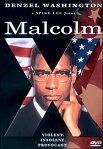
On Nov. 18, 1992 Spike Lee's Malcolm X debuts, starring Denzel Washington.

In 1992 Elaine Brown (1943-) pub. her autobio. A Taste of Power: A Black Woman's Story, about her time as chm. of the Black Panther Party (1974-7); "A woman in the Black Power movement was considered, at best, irrelevant. A woman asserting herself was a pariah. If a black woman assumed a role of leadership, she was said to be eroding black manhood, to be hindering the progress of the black race. She was an enemy of the black people... I knew I had to muster something mighty to manage the Black Panther Party."

In 1992 Akron, Ohio-born poet Rita Frances Dove (1952-) pub. her first novel Through the Ivory Gate. In 1993-5 she becomes the first African-Am. and youngest U.S. poet laureate.






The brains of LBJ, the gonads of Elvis? On Jan. 20, 1993 Ark.-born Georgetown U. grad, Oxford Rhodes scholar (first to become pres.) and Yale Law School grad., former Ark. gov., saxophone player ("first black U.S. pres.") ("first pres. to wear a tangerine lalalala speedo"?) (can't type) William Jefferson "Bill" Clinton (1946-) (Secret Service codename: Eagle/Elvis after his favorite singer) becomes the 42nd U.S. pres. (until 2001) in the 61st U.S. Pres. Inaguration; the 7th lefty U.S. pres. (last G.H.W. Bush); Albert Arnold "Al" Gore Jr. (1948-) (Secret Service codename: Sawhorse/Sundance) becomes the 45th U.S. vice-pres.; the 2nd time that the U.S. has six living presidents (Nixon, Ford, Carter, Reagan, Bush, Clinton); the youngest combined age of pres. and vice-pres. (90) (until ?); the inauguration is in keeping with his status as America's first Baby Boomer pres., and features Maya Angelou reciting her poem On the Pulse of the Morning, and Fleetwood Mac performing "Don't Stop" (Bill's favorite thing for a woman to say?), scaring conservatives half to death and crystallizing desperate all-out desires to 'get' him?; Hillary Rodham Clinton (1947-) (Secret Service codename: Evergreen) becomes the first First Lady to have her own office in the White House, where it is rumored that she is the real president, has hairy balls, etc. - the first FLOTUS to become POTUS? Alphonso Michael "Mike" Espy (1953-) becomes U.S. agriculture secy. #25 (until Dec. 31, 1994) (first black). Lani Guinier (1950-), Clinton's first nominee (Apr.) to lead the U.S. Justice Dept.'s Civil Rights Div. is dropped in June after her writings backing racial quotas cause her to be called one of "Clinton's quota queens" by the Wall Street Journal; in 1998 she becomes the first African-Am. to receive tenure at Harvard Law School. On Sept. 8 Minnie Joycelyn Elders (nee Jones) (1933-) becomes U.S. surgeon-gen. #15 (until Dec. 31) (first African-Am.); she stirs controversy by suggesting that masturbation be promoted to deter young people from sex.

On Dec. 8, 1993 Fred Schepisi's Six Degrees of Separation, based on the 1990 John Guare play about con artist David Hampton stars Will Smith as Paul, who pretends to be Sidney Poitier's son to gain entrance to upper-mid white society couple Flan and Ouisa Kittredge (Donald Sutherland and Stockard Channing); Poitier's real son is daughter Sydney Tamiia Poitier (1973-); "I read somewhere that everybody on this planet is separated by only six other people. Six degrees of separation between us and everyone else on this planet. The president of the United States, a gondolier in Venice, just fill in the names. I find it A) extremely comforting that we're so close, and B) like Chinese water torture that we're so close because you have to find the right six people to make the right connection... I am bound to everyone on this planet by a trail of six people" - reminds me of Barack Obama?


In 1993 world heavyweight champion boxer ape on the hoof Michael Gerard "Iron Mike" Tyson (1966-) is stripped of his crown after a felony rape conviction of Miss Black America contestant Desiree Washington (1973-) in his hotel room, where he maintained it was consensual (duh, she was in his room?); he regains it in 1996 but loses it to Evander Holyfield in Nov. 1996, setting the stage for the Ear Match on June 28, 1997.

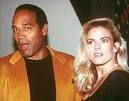

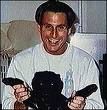


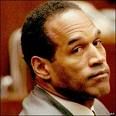










The actor figures out how to put the cops on trial and wins? On June 12-13, 1994 (night) the slasher-style murder of Nicole Brown Simpson (b. 1959) and friend Ron Goldman (b. 1968) leads to a great media circus as her hubby, former NFL football star O.J. Simpson (1947-) is arrested on June 17 after a 60-mi. low speed pursuit in his white Ford Bronco (which causes the NBA Finals on TV to be interrupted), and then in a televised media circus trial tried and acquitted on Oct. 5 next year, while most Am. whites believe him to be guilty, and most blacks believe him innocent; the supermarket tabloid The National Enquirer "reminded us what good, basic journalism is about" (Ted Koppel) by breaking many authentic stories about the case; O.J.'s Wisc.-born bleached-blonde surfer boy "professional houseguest" Brian "Kato" Kaelin (1959-) (son of Gilligan and Ginger?) becomes a celeb, and ends up flip-flopping and saying he believes he's guilty. On Jan. 24, 1995 U.S. TV has its first unofficial reality show when the opening arguments for the hit O.J. Simpson Murder Trial Series are aired; the I-know-I'm-guilty-but-I'm-O.J.-Simpson O.J. Simpson Defense Dream Team incl. Jewish Harvard prof. Alan Dershowitz (1938-), top black defense atty. Johnnie L. Cochran Jr. (1937-2005), and famed white atty. F. Lee Bailey (1933-); the inept prosecution team incl. outclassed-looking Hillary-wannabe Marcia Clark (1953-) and black beginner-looking Christopher Darden (1956-); Am. journalist Dominick John Dunne (1925-2009) covers the trial, gaining fame and later covering Simpson's 2008 kidnap-robbery trial in Las Vegas, Nev. before croaking in 2009; virtually every day until Oct. 3 the major networks cover the events at the trial, and on the big day over 100M viewers tune in as the handsome smiling German-looking trained actor with a deep dark tan and an air of an African prince presides over his subjects wearing a $1K brown suit with white shirt and yellow tie with a small blood stain from shaving, (which becomes a sought-after souvenir), putting on a "are you crazy" expression every time evidence proving his guilt is shown to the jury, as if to eclipse it with his beaming presence into irrelevacy, since a prince is above the law, and what a waste to make a jury tell the govt. so? On Sept. 28 after the O.J. Simpson Defense Dream Team plays the Race Card, making hay out of the alleged bigotry and incredibility of white police detective Mark Fuhrman (1952-), defense atty. Johnnie Cochran has a field day with the alleged murder gloves, which O.J. appears to not be able to fit all the way onto his widely-splayed hands, saying, "If it doesn't fit you must acquit" - always wear ill-fitting clothes when you do the crime? If the shoe is Bruno Magli, he did it exactly? 10-03-95 is O.J. Day in Hell? On Oct. 3 after deliberating less then four hours, a Los Angeles jury finds guilty-as-the-devil O.J. Simpson (1947-) not guilty of the murders of his wife Nicole Brown Simpson and her friend Ronald L. Goldman, causing the nation to split along color lines as 150M people witness the televised verdict at the end of the 372-day $9M trial; "Everything came together: race, celebrity, beauty, wealth, perjury, tape recordings, the chase of the car and the media focus" (Alan Dershowitz); on Oct. 11 Simpson agrees to a live interview on Dateline NBC, but cancels just hours before the broadcast because of protest calls to NBC and its affiliates from angry viewers who cry that he's as guilty as the devil. On Feb. 4, 1997 O.J. Simpson (1947-) loses a wrongful death civil suit over the death of his wife Nicole and Ron Goldman, and is ordered to pay $33.5M in damages; in 2006 daddy Fred Goldman asks a judge to give him the publicity rights to O.J.'s name, image, and likeness, saying "He personally has never paid a dime on the judgment to anyone."
In Mar. 1995 Don Black (1953-) starts the first Web site devoted to white supremacy, Stormfront - black white supremacist jokes here?



Somebody gets smart in the U.S. homeland, or, Oh no, another right-winger listening to talk radio? On Apr. 19, 1995 the Alfred P. Murrah Federal Bldg. in Oklahoma City, Okla. is truck bombed by army-trained white supremacists Timothy James McVeigh (1968-2001) and Terry Lynn Nichols (1955-), killing 168 and injuring 500, incl. 19 children (some in diapers) in a day care center on the 2nd floor; a nurse dies during rescue efforts; the nation learns about the lethality of fuel oil and fertilizer; on Apr. 21 the feds arrest McVeigh, and his ass is grass and they got the lawnmower, fuel oil and fertilizer, and lighter?; in the days before McVeigh's arrest clears it all up, Americans assume that Muslim terrorists from the Middle East are to blame, resulting in nearly 250 incidents of harassment and violence; on Dec. 27, 2006 the House Internat. Relations Investigative Subcommittee releases its findings that there is no conclusive evidence of a foreign connection to the attack but that the FBI failed to fully investigate other suspects and executed McVeigh too soon without making enough effort to question him; the govt. covered up connections with Muslims, incl. Ramzi Yousef (1967-) (1993 WTC bombing conspirator and nephew of 9/11 mastermind Khalid Sheik Mohammed), 1993 WTC bombing conspirator Abdul Hakim Ali Hashim Murad (1968-), and Hussain Al-Hussaini?
On June 12, 1995 the U.S. Supreme Court rules 5-4 in Adarand Constructors v. Federico Pena that affirmative action programs are constitutional only when they address specific acts of past discrimination, adopting strict scrutiny, and reversing "Fullilove v. Klutznick" (1980); they also rule 5-4 to reject a sweeping school desegregation plan in Kansas City, Mo.
On June 20, 1995 the Southern Baptist Convention (largest Protestant denomination in the U.S.) apologizes for its past support of slavery and for "condoning... systematic racism in our lifetime".


On Oct. 16, 1995 the Million Man March for African-Am. men, organized by the black supremacist Nation of Islam leader Louis Farrakhan (1933-) is held in Washington D.C., although only 400K black men show up, incl. young Barack Obama (1961-), who is inspired by it, uttering the soundbyte: "What was lacking among march organizers was a positive agenda, a coherent agenda for change"; Farrakhan's advisor is black radical academic Cornel Ronald West (1953-), a personal friend of Barack Obama, who later introduces him at his first fundraiser in Harlem in 2007.

On Dec. 15, 1995 Oliver Parker's Othello debuts, starring Kenneth Branagh as Iago, miscast French-speaking Irene Jacob as Desdemona, and Laurence "Larry" Fishburne III (1961-) as Othello, who becomes the first black to play the white-playing-black role in a major film.

In 1995 Indian-born Roman Catholic writer Dinesh D'Souza (1961-) pub. The End of Racism: Principles for a Multiracial Society, which claims that cultural differences cause a distinct difference in achievement between races, not racism, and disses the "civil rights industry", multiculturalism, and proportional representation as "fighting discrimination by practicing it", calling for the 1964 U.S. Civil Rights Act to be repealed.

In 1995 George Walker (1922-) composes Lilacs, based on the 1865 poem "When Lilacs Last in the Door-yard Bloom'd" by Walt Whitman on the death of Pres. Lincoln, becoming the first African-Am. composer to win a Pulitzer Prize for music - he got out of the bushes?
On Mar. 20, 1996 a federal appeals court rules that race may not be used as a criterion for college admission at the U. of Texas, even for the "wholesome practice of correcting perceived racial imbalance", pissing-off affirmative action proponents. In summer 1996 the U.S. Congress passes the U.S. Personal Responsibility and Work Opportunity Reconciliation Act, radically transforming the U.S. welfare system, limiting cash benefits to most recipients to five years; some states go on and enact shorter time limits - the trajectory of your life just changed? What is a percolator, or, Affirmative action draws Calif. backlash? On Nov. 5, 1996 Calif. voters approve Proposition 209, banning affirmative action (racial and gender preference) in college admissions, state employment, and public contracts; the U.S. Supreme Court upholds its constitutionality. On Aug. 28, 1997 Calif.'s Proposition 209 takes effect, ending affirmative action, causing thousands to march across San Francisco's Golden Gate Bridge in protest.
On Feb. 4, 1997 Pres. Clinton delivers his 1997 State of the Union Address, talking about a "detailed plan to balance the budget by 2002", and covering welfare, crime, the environment, relations with NATO and China, and the ISS, asking that top priority be given to education; meanwhile the bans on affirmative action in Calif. and Tex. cause minority enrollments in law schools to drop towards zilch, and on Apr. 5 a Harvard U. report reveals that for the 1991-4 period the U.S. has experienced "the largest backward movement toward segregation" since the 1954 Brown v. Board of Ed. U.S. Supreme Court decision.


On Apr. 13, 1997 (Sun.) Eldrick "Tiger" Woods (1975-) hugs his dad after winning his first major prof. golf title, the Masters by 12 strokes and a record low score of 270, the widest margin of victory in history, becoming the first non-white and youngest golfer to win the Masters, achieving #1 ranking in his 42nd week as a golf pro, already being the first player to win three consecutive U.S. amateur titles (1994-6); he doesn't win the Masters again until 2001, and his score creeps up to 272; too bad, white golfer Frank Urban "Fuzzy" Zoeller Jr. (1951-) (who won his first Masters in 1979, but comes in 35th this time) makes joking remarks about him, saying "Tell him not to serve fried chicken next year", offending Woods and the growing PC police, after which he apologizes.

On June 28, 1997 (Sat.) Mike Tyson bites off the tip of Evander Holyfield's ear in round 3 of the Pay-Per-Chew pay-per-view heavyweight title bout (originally titled "The Sound and the Fury"), losing the match and stinking up his rep., ending his caveman-wolfman-vampire career with one bout, er, bite. On Oct. 25, 1997 the Million Woman March in Philadelphia, Penn. draws 300K-1.5M African-Am. women.

On Jan. 2, 1998 Dr. (Ph.D in criminology) Lee Patrick Brown (1937-), the city's first black police chief (1982-90) is sworn-in as the first black mayor (#59) of Houston, Tex. (until Jan. 2, 2004).

On June 7, 1998 49-y.-o. Texas black man James Byrd Jr. (b. 1949) is beaten with a baseball bat then dragged to death behind a pickup truck by three white men, John William King, Lawrence Russell Brewer, and Shawn Allen Berry, getting decapitated alive after hitting a culvert, his trunk later dumped in a black cemetery by the happy perps, who go to a BBQ; being known as white supremacists, the FBI is called in; they are later convicted on capital murder charges, and Berry lucks out with a mere life sentence; King writes a jailhouse letter to Brewer saying "We have made history. Death before dishonor. Sieg Heil!" - after their dreamed-of white revolution fails to materialize, then what?
On July 24, 1998 after Morris Dees of the Southern Poverty Law Center (SPLC) sues them, a jury in S.C. rules that two chapters of the Ku Klux Klan must pay $37.8M to the Macedonia Baptist Church for a June 21, 1995 arson, finding that the Klan's hate message motivated the four former Klansmen who were convicted for it in 1997; in Nov. a judge reduces the award to $21.5M, but either way the Klan is financially kaput.

On Aug. 21, 1998 a Hattiesburg, Miss. jury convicts former KKK imperial wizard Samuel Holloway Bowers (1924-2006) of ordering a firebombing that killed Miss. civil rights activist Vernon Dahmer Sr. on Jan. 10, 1966; juries had deadlocked on Bowers 4x before; he receives a life sentence, and dies in the state pen in Jackson, Miss.
In 1998 the total number of black-white interracial couples in the U.S. grows from 167K out of 49.7M (1 in 300) in 1980 to 330K out of 55.3M (1 in 165) - how soon until it's 50 in 100?

Happy 120th Birthday, Herr Hitler? On Apr. 20, 1999 (Tues.) starting at 11:21 a.m. the Columbine High School Massacre in Littleton, Colo. (less than 10 mi. from TLW's home) sees America's worst school rage shooting (until ?), with 13 killed (12 students and a teacher) and 23 injured by two disaffected white supremacist (closet gay?) students, 18-y.-o. Eric David Harris (b. 1981) and Dylan Bennet Klebold (b. 1982), who finish by killing themselves, leaving insane Web pages; later students are permitted to place memorial tiles in the school, and one reading "Jesus Wept" is banned for being religious?; families of victims sue to have historic statements by the killers and their parents sealed or destroyed, while the U.S. Nat. Archives and Records Admin. offers to store them, and in Apr. 2007 U.S. District Judge Lewis T. Babcock orders them sealed for 20 years - why weren't the Columbine shooters black, and when will they be?

On July 2-5, 1999 Wilmette, Ill.-born white supremacist Benjamin Nathaniel Smith (b.1978) goes on a drive-by shooting spree in the U.S. Midwest, targeting blacks, Jews and Asians, and killing two and wounding nine before killing himself, pissing-off Pres. Clinton, who calls it "a rebuke to the very ideals that got us started", concluding "we still got work to do here at home".


In 1999 Serena Williams (1981-) wins the U.S. Open, becoming the first black woman since 1958 to win a Grand Slam tennis title. In 2000 Venus Williams (1980-) of the U.S. defeats her younger sister Serena Williams (1981-) to win the women's title; Venus Williams wins the U.S. Open women's single title.
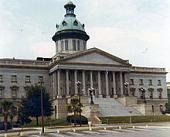
Your choices just got a whole lot younger? On May 18, 2000 after a controversy during the 2000 pres. primary, the S.C. Legislature passes the South Carolina Heritage Act of 2000, ordering the Confederate Stars and Bars battle flag removed from its Sandlapper capitol dome after 138 years (1862), and after the Johnny Rebs get over their shock it is removed on July 1, becoming the last Confed. state to do it; never fear, a smaller square version is put next to the Confederate Soldiers' Memorial on the N side of the Capitol in front of the main entry, but after yet more NAACP protests it is removed also, er, it is left flying while an African-American History Monument is unveiled on Mar. 26, 2001; meanwhile on Aug. 8 fortune intervenes, as the Confederate submarine H.L. Hunley, which in 1864 became the first sub to sink an enemy vessel is raised from the ocean off sandlapping Charleston, S.C. after 136 years - 9 years till Pres. Barack Obama?
On Apr. 7, 2001 a white police officer shoots unarmed but fleeing black man Timothy Thomas in Cincinnati, Ohio, setting off race riots for several days.
On May 1, 2001 former KKK man Thomas E. Blanton Jr. is convicted of the 1963 murder of four black girls in Birmingham, Ala.

On Mar. 24, 2002 the 74th Academy Awards in Los Angeles are hosted by Whoopi Goldberg (2nd time), who opens dressed in feathers and dangling from the roof of the Kodiak Theatre on a gold swing; 248 films are eligible for consideration; the best picture Oscar for 2001 goes to A Beautiful Mind (starring the previous year's best actor winner Russell Crowe), along with best dir. to Ron Howard, and best supporting actress to Jennifer Connelly; Denzel Washington (1954-) and Halle Berry (1966-) make Oscar history by becoming the first blacks to win simultaneous best actor and actress awards for Training Day and Monster's Ball, respectively.
On June 23, 2003 the U.S. Supreme (Rehnquist) Court votes 6-3 in Gratz v. Bollinger to strike down the U. of Mich. undergrad affirmative action program because its point system is too quotalike; the same day they vote 5-4 in Grutter v. Bollinger to uphold affirmative action at the U. of Mich. law school as long as race is part of a nuanced review of each applicant; in the first vote John Paul Stevens, Ruth Bader Ginsburg, and David Souter dissent; in the 2nd Anthony Kennedy, William Rehnquist, Antonin Scalia, and Clarence Thomas dissent, and the deciding vote is cast by Sandra Day O'Connor, with Scalia writing the soundbyte: "This is not, of course, an 'educational benefit' on which students will be graded on their Law School transcript (Works and Plays Well with Others: B+) or tested by the bar examiners (Q: Describe in 500 words or less your cross-racial understanding). For it is a lesson of life rather than law - essentially the same lesson taught to (or rather learned by, for it cannot be 'taught' in the usual sense) people three feet shorter and twenty years younger than the full-grown adults at the University of Michigan Law School, in institutions ranging from Boy Scout troops to public-school kindergartens"; Pres. Bush. issues a statement applauding the court for recognizing the value of diversity - how did such a tiny number of people get in this position anyway?
On Dec. 19, 2003 the Nat. Museum of African American History and Culture (NMAAHC) is founded on the Nat. Mall in Washington, D.C.; on Feb. 22, 2012 Pres. Obama attends the groundbreaking ceremny; it opens on Sept. 24, 2016.
On May 17, 2004 (Mon.) at a 50th anniv. observance of the 1954 Brown v. Board of Education school desegregation decision in Constitution Hall in Washington, D.C., black entertainment millionaire and Ph.D in Education Bill Cosby delivers his Pound Cake Speech, a litany of self-reliance, personal responsibility and other moral values that need to be taught to black youths and families, causing the press to have a field day when a few black leaders see him as blaming the victim.


On Aug. 8, 2004 2-time black Repub. pres. hopeful Alan Lee Keyes (1950-) enters the Ill. Senate race, but ends up losing to handsomer black Dem. Barack Hussein Obama II (1961-) (I'm So Damn Hussein and I'm Back, Bam?) (the new Adlai Stevenson?) (first African-Am. pres. of the Harvard Law Review), whose un-PC name comes from a Muslim grandfather (a Kenyan farmer), and Muslim father (a Kenyan govt. economist and Communist), although he is a member of Chicago's Trinity United Church of Christ and opposes abortion; the name Barack is of African origin and means blessed, while Hussein is of Arabic origin and means handsome; Barach comes from the Hebrew phrase "Ben Rabi hayyim" meaning son of Rabbi Hayyim?; rumors soon spread that he is really a Muslim terrorist plant with a master plan to take over the controls of the U.S. and pilot it into the ground; meanwhile the fact that he's half-white and half-black and that the U.S. suffers from a dearth of leaders makes him an instant candidate for U.S. pres. in 2008 despite lack of voter knowledge about him; Keyes ran after original Repub. nominee Jack Ryan left the race over a sex club scandal, and former Chicago Bears coach Mike Ditka turned down a chance to run against Obama, later saying that he probably would have won, and that it was the biggest mistake of his life seeing how the bum made it to the White House.

White men can't jump, but they can't open their mouths in public either in the new PC U.S.? On Oct. 25, 2005 after a 48-10 loss to Texas Christian U. (TCU), Cheraw, S.C.-born Air Force Academy coach (1980-2006) Fisher DeBerry (1938-) makes un-PC statements and touches the new third rail of U.S. politics at a media luncheon, commenting that TCU "had a lot more Afro-American players than we did and they ran a lot faster than we did. That doesn't mean that Caucasian kids and other descents can't run, but it's very obvious to me that they run extremely well"; also "The black athlete, statistically, from program to program, seems to have an edge as far as speed is concerned"; the PC police then come down on him hard, resulting in a reprimand, even though the statements are true and white men can't run with the black men?; black running backs have led the NFL in rushing for the past 43 consecutive seasons; between 1977-2005 96 receivers were drafted in the first round of the NFL, all of them black; the world records at every race distance under 800m are held by men of West African descent, as it has been since the middle of the 20th cent.; as of 2001, 494 of the fastest 500 times in the 100m run have been by men of West African descent; of the approx. 200 times the 10-sec. barrier has been broken, all have been by runners of West African descent; when it comes to distance running, Kenyans and Ethiopians dominate, with most of the top runners coming from one small Kenyan ethnic group - East is East and West is West, and never the what?
On Jan. 18, 2006 Coretta Scott King (b. 1927) makes her last public appearance on the eve of her late hubby's birthday; she dies on Jan. 31 in an alternative medicine clinic in Mexico; on Feb. 5 she becomes the first woman and first black to lie in honor in the Ga. Capitol Rotunda; on Feb. 7 her funeral draws four U.S. presidents and other notables along with 10K at the New Birth Missionary Baptist Church in Lithonia, Ga.; her hubby's funeral four decades earlier was attended by no presidents - how long before crazed American blacks prohibit caricatures of their prophet?
On July 20, 2006 Pres. Bush makes his first appearance as pres. at an annual convention of the NAACP in the Washington Convention Center in Washington, D.C.; chmn. Julian Bond had in the past compared Repubs. to Nazis and Bush to Hitler, but new pres. Bruce Gordon has mellowed the group out?


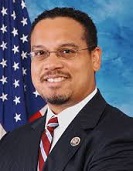
On Nov. 7, 2006 (Tues.) the 2006 U.S. Nat. Elections are held with bated breath by the Repubs., as the Dems. only need to gain 6 seats to win control of the House and 15 for the Senate, and becomes a Repub. bloodbath and anti-Bush backlash, with the Dems. winning the House and Senate (first Sen. majority in 12 years); 79M people vote (40.4%); Dem. Deval Laurdine Patrick (1956-) becomes the first African-Am. elected gov. of Mass., and the 2nd in the U.S.; Ted Strickland (1941-) becomes the first Dem. gov. of Ohio in 16 years, while Sherrod Campbell Brown (1952-) defeats Mike DeWine to take his U.S. Senate seat; the new Congress has 42 black reps. and one black sen., all Dems.; black rep. James Enos "Jim" Clyburn (1940-) of S.C. becomes the #3 leader of the House as majority whip, the 2nd black to reach the post after William Gray of Philly; Keith Maurice Ellison (1963-) (D-Minn.) (a black atty. from Detroit who converted in college) becomes the first Muslim elected to the U.S. Congress, planning to use the Quran at his swearing-in; Nancy Pelosi becomes the 52nd U.S. House Speaker and the first female one, becoming the 3rd in line for U.S. pres. and the most powerful woman in U.S. history - two whats and four whats separate her from the Ovulating Office? On Nov. 7, 2006 voters in Mich. by 58%-42% pass the Mich. Civil Rights Initiative (Proposal 2), banning affirmative action by publicly-funded institutions; on Apr. 22, 2014 the U.S. Supreme Court rules 6-2 in Schuette v. Coalition to Defend Affirmative Action that voters in Mich. have the right to ban race-based preferences in college admissions, upholding the initiative.

On Apr. 4, 2007 irreverent radio host John Donald "Don" Imus (1940-) describes the Rutgers women's basketball team as "nappy-headed hos", causing a firestorm by PC police; despite being put through an inquisition on Apr. 9 by Rev. Al Sharpton and apologizing to the team (apology accepted), CBS Radio fires him on Apr. 13 (Fri.), causing him to sue them for $40M, citing his contract that acknowledges that his services are expected to be "controversial"; meanwhile other groups cite black rappers for using the words Imus used in multi-million selling albums, raising the specter of double standards again; on Dec. 3 he returns to the airwaves on WABC-AM in New York City, properly contrite about daring to be non-PC?
We're back to the Biblical era of Judges? On June 25, 2007 the Bushified U.S. Supreme Court shows its shift to the right in three 5-4 rulings, deciding against freedom of speech in the Bong Hits 4 Jesus Case, against taking race into account when assigning students to schools, and poking a giant hole in the McCain-Feingold campaign financing law by allowing TV ads by special interests groups as long as they don't mention voting; Arthur Kennedy swings to the majority side on all four, which incl. Bush babies John Roberts and Samuel Alito, plus Antonin Scalia and Clarence Thomas, who, despite owing his education to affirmative action writes "It is far from apparent that coerced racial mixing has any educational benefits, much less that integration is necessary to black achievement"; John Roberts adds the soundbyte "The way to stop discrimination on the basis of race is to stop discriminating on the basis of race"; Breyer, Souter, Stevens, and Ginsburg dissent; opinion is divided on whether the Brown case is being affirmed or undermined; liberal justice Stephen Breyer laments "It's not often in law that so few have changed so much so quickly"; the term ends after the court announces that it will review the rights of terrorist suspects detained at Guantanamo Bay next term; on June 28 the liberals score one with a 5-4 ruling to overturn the death sentence of a Texas murderer because he may not be able to understand why he's being executed for gunning down his wife's parents since he quotes the Bible; concurring justices incl. Stevens, Souter, Ginsburg, Bryer, and swingy Anthony Kennedy.

On Nov. 4, 2008 with the tanking U.S. economy widely blamed on the Republican Party, and Obama (campaign slogans: "Change we can believe in", "Yes we can", "No drama") running the best-financed pres. campaign in U.S. history ($745M vs. $350M in contributions) ($11 for each Obama vote) (including many suspicous donations, which after he became president were scrubbed. After flip-flopping on a promise to take only govt. funding from Sept. on, while Republican opponent John McCain kept his promise and had to stop taking contributions in Sept. after accepting $84.1M in public campaign money (spending $150K on clothing for running mate Sarah Palin, which became an issue, while Obama raised $150M in Sept. alone), the 2008 U.S. pres. election was a V for Barack Obama over John McCain (131M of 197M eligible voters vote) (52.9%-45.7%, 365-173 electoral votes, 28-22 states, 69.5M vs. 59.9M votes) (most votes in history, vs. 62M for Bush in 2004) (first pres. candidate two split the electoral votes of Neb.), marked by joyful tearful celebrations in the streets all over the U.S., especially by blacks, with only 43% of white voters voting for him, although 60% of Obama supporters were white, and only 74% of the voters in the election were white, and Obama got 40% of the white men, along with 95% of black voters (don't call it a racist vote, it's a spiritual thing, a first, it's history?), 67% of Hispanic voters, and 78% of Jewish voters (vs. 74% for John Kerry in 2004), who were treated to "The Great Schlep", in which Jews flew to Fla. to talk their Jewish grandparents into voting for him. Young voters went for Obama 2-1, and the Repub. turnout was the lowest since 1976. For the first time, young black voters ages 25-44 had the highest percentage turnout (64%, vs. 62.2% for white, 47.3% for Asian, and 47.7% for Hispanic). Obama won the key contested states of Penn., Ohio and N.M., which swung it to him. The Sarah Palin chess move fizzled with women, as only 56% went for McCain-Palin, including 82% of Hillary Clinton voters. Joseph "Joe" Biden became the first Roman Catholic vice-pres. to be elected. A record 70M watched election returns on TV, culiminating with the sight of a 125K (240K?) crowd at Grant Park off Lake Michigan in Chicago, Ill. gathering to hear his victory speech, where he uttered the soundbytes "Change has come to America"; "If there is anyone out there who still doubts that America is a place where all things are possible, who still wonders if the dream of our founders is alive in our time, who still questions the power of our democracy, tonight is your answer"; "The road ahead will be long. Our climb will be steep. We may not get there in one year or even in one term. But, America, I have never been more hopeful than I am tonight that we will get there". Jesse Jackson openly wept. John McCain gave a concession speech which shows his big heart, with the soundbytes "The American people have spoken, and they have spoken clearly"; "This is an historic election, and I recognize the special significance it has for African-Americans and for the special pride that must be theirs tonight"; "I wish Godspeed to the man who was my former opponent and will be my president, and I call on all Americans, as I have often in this campaign, to not despair of our present difficulties, but to believe, always, in the promise and greatness of America, because nothing is inevitable here". Obama promised his daughters Malia Ann and Sasha a new puppy if he won, making a big deal about it, and ending up with Portuguese Water Dog Bo Obama (2008-), a gift from Sen. Ted Kennedy and his wife Victoria "Vicki" Kennedy, and named after R&B singer Bo Diddley. 106-y.-o. African-American Ann Louise Nixon Cooper (1902-2009), who knew MLK Jr. and voted for him in Oct. and was called by him specially was given special notice in the speech, dying on Dec. 21, 2009. Too bad, he had to give his victory speech behind a bulletproof screen, as white supremacists blew their gaskets and vowed to kill him. The Obama V caused a massive positive reaction worldwide, changing America's failing image instantly. Meanwhile the V caused a run on gun stores as a belief he will outlaw guns spread (he has promised to outlaw automatics), and Roman Catholic priest Jay Scott Newman of Greenevile, S.C. warned parishoners to refrain from receiving Holy Communion if they voted for Obama because he supports abortion, and claimed that voting for him "constitutes material cooperation with intrinsic evil". Many Americans were scared of Pres. Obama because of his prior alignment with radical extremists, covered-up background, and Socialist leanings.
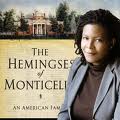
In 2008 Annette Gordon-Reed (1958-) pub. The Hemingses of Monticello: An American Family, which wins a Pulitzer Prize, becoming the first African-Am. to win for history.











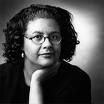

On Nov. 13, 2008 "Well, look" (his pat response to questions, along with "Let me be clear" and "Make no mistake") announced that he would resign from the Senate on Nov. 16 before the start of a lame duck session, and was inaugurated on Jan. 20, 2009 before a record crowd. He was given the Secret Service codename Renegade. He became the first urban president, first to have Internet access at his desk, have a BlackBerry and use email daily, the 3rd U.S. pres. to win the Nobel Peace Prize, and the 11th U.S. pres. to grow and/or use cannabis after Washington, Adams, Jefferson, Madison, Monroe, Jackson, Taylor, Pierce, Lincoln, and JFK. Richard Tosaw, a lawyer from Modesto, Calif. sold 4K $20 printed cardboard periscopes called Obama-Scopes that "make you two feet taller" and helped improve one's view of the proceedings. Joseph Robinette "Joe" Biden Jr. (1942-) (Secret Service codename: Celtic) became the 47th U.S. vice-pres., the first Roman Catholic. Michelle Obama was given the Secret Service codename Renaissance. The first children are Malia Ann Obama (1998-) (Secret Service codename: Radiance) and Natasha "Sasha" Obama (2001-) (Secret Service codname: Rosebud). Second Lady is Jill Tracy Jacobs Biden (1951-) (Secret Service codename: Capri). First Dog is Bo Obama (2008-) (Portuguese Water Dog or Portie). Obama took his oath of office on the same velvet-bound Bible used at his hero Abrahama, er, Abraham Lincoln's first (1861) inaguration before a record 1.9M crowd, who braved 17F weather (no arrests?). The inaugural theme was "A New Birth of Freedom", a phrase taken from Lincoln's Nov. 19, 1863 Gettysburg Address allegedly to celebrate the 200th anniv. of his birth year. Ailing Mass. Dem. Sen. Edward Kennedy experienced a seizure during a lunch for Obama, but recovered. Obama's 2009 Inauguration Speech, written by 27-y.-o. white guy Jon Favreau (1981-) didn't live up to expectations of being full of great JFK-caliber soundbytes, and skips past Martin Luther King Jr. and Abraham Lincoln to George Washington, and flip-flops from promising to walk on water to calling for sacrifice and service from the pop., with the soundbytes: "A man whose father less than 60 years ago might not have been served at a local restaurant can now stand before you to take a most sacred oath. So let us mark this day with remembrance of who we are and how far we have traveled."; "On this day, we come to proclaim an end to the petty grievances and false promises, the recriminations and worn-out dogmas that for far too long have strangled our politics."; "We must pick ourselves up."; "To those who cling to power through corruption and deceit and the silencing of dissent, know that you are on the wrong side of history, but that we will extend a hand if you are willing to unclench your fist." Harlem, N.Y.-born black poet Elizabeth Alexander (1962-) recited her inaugural poem Praise Song for the Day, becoming the 4th poet to read at a U.S. pres. inauguration (Robert Frost in 1961, Maya Angelou in 1993, Miller Williams in 1997). Obama wasted no time in becoming the first U.S. pres. to address "the Muslim World", uttering the soundbyte that the U.S. is "a nation of Christians and Muslims, Jews and Hindus and non-believers." As he assumes office, 79% of Americans incl. 59% of those who voted for John McCain were optimistic about his admin. The Dow Jones plunged 4%, becoming the worst inauguration day slide (until ?). Obama inherited a $1.3T deficit from the Bush admin., and by Mar. he increased the 2009 deficit to $1.8T, while his own spending programs will more than double the nat. debt from $8T to $17.3T ($15.4T?) by 2019, equal to 82.4% of the GNP, although he did promise to halve the 2009 deficit by 2014. Obama's look, funny ears, and intellectual style caused him to be compared to Star Trek's Spock, while according to a Denver U. prof. his political philosophy is a combo of Abe Lincoln and John Dewey. Too bad, a growing groundswell of anti-govt. hostility began by Americans who feared that Obama was plotting to take the U.S. Socialist, Fascist, or Islamic, or foist a OWG on the U.S. complete with concentration camps, causing a fervor of frantic Internet postings by extremists incl. Tex. radio show host Alexander Emerich "Alex" Jones (1974-), leading to Tea Parties in the spring, town hall meeting disruptions in the summer, the Birther Movement, which questions the validity of his birth in U.S. territory, fears that the swine flu virus was manufactured, and fears that he is handing the U.S. over to Muslim Sharia. In the evening Obama hosted the first-ever pres. ball open to the residents of mainly-black Washington, D.C., sweetly dancing with his wife to music by Beyonce (1981-), who sung the 1960 Etta James hit At Last. After chief justice John Roberts flubbed the oath of office, he gave it to Obama again in the White House before nine witnesses. Despite being Muslim-friendly, is Obama a stooge of the Zionist Illuminati? Speaking of stooge of somebody, on Jan. 21, 2009 Pur-res-ident Obama wasted no time and signed Executive Order 13489, sealing his personal records, including his birth, adoption and repatriation records, school records including financial aid, grades and theses, law client list, Bar Assoc. record, even passport and medical records, so maybe he wants to be the world's #1 mystery man while in office and has the power to do it. Too bad, we need to answer the real question, which is, does he need to be the world's #1 mystery man, and why.
On Apr. 22, 2009 the U.S. Supreme Court hears arguments on a reverse discrimination suit by white firefighters in New Haven, Conn., appearing divided; on June 29 in Ricci v. DeStefano they rule 5-4 in favor of the firefighters (even though the appeals court led by Sonia Sotomayor ruled against their case with the "disparate impact" excuse), with the soundbyte "an employer could not cast aside a selection method based on a statistical disparity alone"; Ruth Bader Ginsburg dissents, writing "Relying heavily on written tests to select fire officers is a questionable practice, to say the least." On Apr. 29, 2009 conservative justices on the U.S. Supreme Court attack a key element of the 1965 U.S. Voting Rights Act, questioning whether Southern states should still be held to account for past racial discrimination; the law forces those states to get special approval before making changes in the way they conduct elections.
On July 16, 2009 Pres. Obama addresses the NAACP, uttering the soundbyte "Make no mistake, the pain of discrimination is still felt in America", with blacks "out of work more than just about anybody else", and "more likely to suffer from a host of diseases but less likely to own health insurance", adding "Government programs alone won't get our children to the Promised Land", and "One of the most durable and destructive legacies of discrimination is the way we've internalized a sense of limitation; how so many in our community have come to expect so little from the world and from themselves, causing some blacks to criticize him for blaming them for the crisis and for resurrecting Daniel Patrick Moynihan's 1965 "culture of poverty" theory.


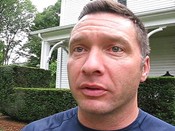

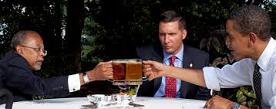
On July 22, 2009 Pres. Obama gives a press conference to boost his struggling health care reform program, in which he mentions the July 16 arrest of famed black Harvard prof. Henry Louis "Skip" Gates Jr. (1950-) in his own house near the Harvard campus after being investigated for being a burglar and cleared after producing an ID, the white policeman Sgt. James Crowley trumping up "disorderly conduct" charges for "exhibiting loud and tumultuous behavior" just for mouthing off to him and other trespassing gun-wagging cops who refuse to produce their badge numbers so he could identify them later, Obama saying that the police "acted stupidly"; although the charges were dropped, and no charges filed against the police, Gates goes on to speak out against police racial profiling and demand an apology, raising a nat. firestorm of controversy in the PC press, with Obama sticking to his guns and the police backing each other up, and Crowley calling Obama "way off base", after which Obama calls Crowley and says he should have used different words to avoid inflaming the controversy, but stops short of apologizing to Da Man, and on July 25 Obama invites both of them to the White House for a 1-hour Beer Summit on July 30 in an attempt to get it behind him; the open statements to the press by Crowley that he would arrest anybody who was "loud and boisterous" (i.e., mouths off to him) in the future raises profound constitutional questions (three strikes of mouthing off to a cop and you get life?); Gates goes for Red Stripe, Obama for Bud Light, and Crowley for Blue Moon; on July 30 Boston policeman Justin Barrett (1973-) is suspended for sending an email calling Gates a "jungle monkey", and later fired; meanwhile Lucia Whalen, who made the 9/11 call speaks to the press on July 29, saying she is pained by being called a racist and didn't actually know or describe Gates as black.
On Feb. 18, 2010 the Obama admin. announces a $1.25B settlement with black farmers over past discrimination in USDA loan programs. On Nov. 30, 2010 the U.S. House votes 256-152 to approve the $4.6B Pigford II and Cobell settlement of class-action suits from Indians and 70K African-Am. farmers, the latter getting $1.25B of it, and Alaska Natives getting $3.4B; in 1999 15,640 black farmers received $1B under Pigford I.
In 2010 NFL football legend Jim Brown gives an interview to Graham Bensinger, saying that there is more racism in the U.S. now than at any time in history.
In Mar. 2012 an Atlantic Southeast Airlines flight becomes the first with an all female African-Am. flight crew.
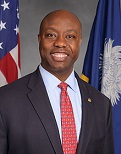
On Jan. 2, 2013 Tim Scott (1965-) becomes a Repub. S.C. Sen., becoming the first African-Am. sen. from S.C., going on to win reelection in 2014, becoming the first black Repub. elected to the U.S. Senate since Edward Brooke in 1966, and the first elected from a Southern U.S. state since 1881.
On June 25, 2013 the U.S. Supreme Court by 5-4 strikes down Section 4 of the 1965 U.S. Voting Act, designating "covered jurisdictions" of the U.S. that must have changes to their voting laws cleared by the federal govt., because the "pervasive... flagrant... widespread... rampant" discrimination in 1965 is kaput, and "today’s statistics tell an entirely different story"; the real statistics prove otherwise?

On June 28, 2013 Eugene K. Pettis becomes the first African-Am. pres. of the 95K-member Fla. Bar Assoc., 2nd biggest in the U.S.

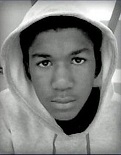
On July 13, 2013 a 6-person jury acquits white (German-Peruvian with some black descent) neighborhood watch volunteer George Michael Zimmerman (1983-) in the Feb. 26, 2012 shooting death of 17-y.-o. African-Am. Trayvon Benjamin Martin (1995-2012) in Sanford, Fla., causing nationwide riots and protests and causing the Black Lives Matter (BLM) movement to be founded on Twitter with the hashtag #BlackLivesMatter.
On Oct. 2, 2013 the $15M Hutchins Center for African and African American Research at Harvard U. opens, headed by Henry Louis "Skip" Gates Jr. In Oct. Norfolk, Va.-born Nadia Crow becomes the first African-Am. TV news anchor in Utah, at KTVX-4 in Salt Lake City.
In Jan. 2014 the African Am. Intellectual History Society (AAIHS) is founded at the U. of N.C. in Charlotte, N.C.

On Mar. 24, 2014 Towson U. students Ruffin and Korey Johnson become the first African-Am. women to win a U.S. nat. college debate tournament, the Cross Examination Debate Assoc. (CEDA) championships at Indiana U. On July 1 Michelle Janine Howard (1960-) becomes the U.S. Navy's first 4-star adm.
In Sept. 2014 the article Ten Percent Is Not Enough, condemning the effort to integrate African slaves into Am. white society as futile is pub. in the American Renaissance Blog, after which it circulates slowly until it is attributed to the Baltimore Sun and renamed "The Black Dilemma", after which it goes viral; it contains the soundbytes: "The experiment has failed. Not because of culture, or white privilege, or racism. The fundamental problem is that white people and black people are different. They differ intellectually and temperamentally. These differences result in permanent social incompatibility"; "Our rulers don’t seem to understand just how tired their white subjects are with this experiment. They don’t understand that white people aren't out to get black people; they are just exhausted with them. They are exhausted by the social pathologies, the violence, the endless complaints, the blind racial solidarity, the bottomless pit of grievances, the excuses, the reflexive animosity. The elites explain everything with 'racism', and refuse to believe that white frustration could soon reach the boiling point"; "They will be the only ones who are surprised when real revolution comes to the United States, and that it is white people who lead the revolt."
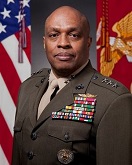
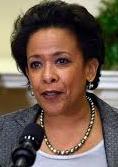
On Jan. 23, 2015 Jamaican-born USMC Lt. Gen. Vincent R. Stewart becomes dir. #20 of the U.S. Defense Intelligence Agency, the first African-Am. and first U.S. Marine. On Apr. 23 after being nominated by Pres. Obama in Nov., the U.S. Senate votes 56-43 to confirm Loretta Elizabeth Lynch (1959-) as U.S. atty. gen., becoming the first black woman; she is sworn in on Apr. 27 - she would have to be named Lynch?
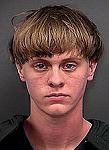
After all the oceans of blood, it takes just 9 more deaths to cause Confederate flags to fall all over the South? On June 17, 2015 (eve.) after attending a Bible class there for 1 hour to case them, white supremacist Dylann Storm Roof (1994-) shoots up the all-black Emanuel African Methodist Episcopal Church in Charleston, S.C., killing nine incl. pastor and state sen. Clementa C. Pinckney while shouting "You rape our women and you're taking over our country"; on June 18 he is arrested at a traffic stop in Shelby, N.C., before which new U.S. atty. gen. Loretta Lynch announces a federal hate crimes investigation, and after which Pres. Obama calls for gun control, with the soundbytes: "Communities like this have had to endure tragedies like this too many times", and "Let's be clear. At some point, we as a country will have to reckon with the fact that this type of mass violence does not happen in other advanced countries." On June 18 the U.S. Supreme (Roberts) Court rules 5-4 in Walker v. Texas Div., Sons of Confederate Veterans that license plates are govt. speech and subject to more content restrictions than private speech under the First Amendment; the decision comes one day after the Charleston church shooting, causing three state govs. (Va., N.C., Md.) to announce on June 23 plans to discontinue Confederate flag specialty license plates. On June 23 (night) Am. Black Panther leader Malik Shabazz gives a speech at a Save the Black Church rally in Marian Square near Mother Emanuel African Methodist Episcopal Church in Charleston, S.C., calling for blacks to finish the job started by slave Denmark Vessey in 1822 and rise up and kill all whites in their beds. On June 24 after a nationwide protest sparked by the Emanuel African Methodist Episcopal Church massacre, which incl. S.C. Gov. Nikki Haley on June 22 calling for it to be taken down from a monument at the S.C. State Capitol and relegated to a museum, amd Walmart, Sears, and Amazon discontinuing sales of Confed. flags, and Apple banning any app displaying it, even historical games, Robert Bentley of Ala. becomes the first Southern gov. to order the removal of Confederate banners from the state capitol; the Confed. flag still flies high outside the S.C. statehouse near an open casket ceremony for slain state sen. Rev. Clementa Pinckney; on June 26 Pres. Obama delivers a eulogy, calling him a "man of God who lived by faith", lobbying for gun control, singing "Amazing Grace" and uttering the soundbyte about the Confederate flag: "By taking down that flag we express God's grace"; on June 27 African-Am. protester Brittany "Bree" Newsome climbs the 30-ft. flagpole in front of the S.C. State Capitol and removes the Confed. flag herself before surrendering the police on charges of defacing public property; on June 30 S.C. Repub. Sen. Lindsey Graham calls for the flag's removal on NBC-TV's "Meet the Press", calling it a "roadblock to the future of my state". On Aug. 11 U.S. Dem. pres. candidate Hillary Clinton meets with Black Lives Matter activists (coined in 2013 by Alicia Garza) backstage at an event in N.H. in a tense confrontation where they accuse her of "victim blaming", and cite a "white problem of violence". On Dec. 9 during arguments over Fisher v. Texas questioning affirmative action, U.S. Supreme Court justice Antonin Scalia utters the soundbyte that maybe it's a good thing to exclude African-Am. students from top-tier universities because they could go to a "less advanced school, a slower-track school where they do well", adding "Most black scientists do not come from advanced schools. It does not benefit them. They benefit from a slower track", pissing-off the PC police.
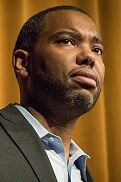
In July 2015 Baltimore, Md.-born Ta-Nehisi Paul Coates (1975-) pub. the autobio. Between the World and Me, based on James Baldwin's 1963 book "The Fire Next Time"; white supremacy is an indestructible force that Am. blacks will always struggle against?
On Oct. 10, 2015 (Sat.) the Justice or Else Rally in the Nat. Mall in Washington, D.C. celebrates the 20th anniv. of the Million Man March, with Nation of Islam leader Louis Farrakhan hogging the microphone for 2 hours, praising #BlackLives Matter and damning the white devil establishment, with the soundbyte: "Moses was not an integrationist and neither are we. Let me be clear, America has no future for you or for me. She can't make a future for herself, much less a future for us."
On Apr. 20, 2016 the U.S. Treasury announces that black anti-slavery activist Harriet Tubman will replace white slaveholder U.S. pres. Andrew Jackson on the $20 bill; Alexander Hamilton is allowed to stay on the $10 bill after a popular Broadway show lobbies for him.
On July 29, 2016 a federal appeals court strikes down the 2013 N.C. voter ID law, claiming that it was "passed with racially discriminatory intent".
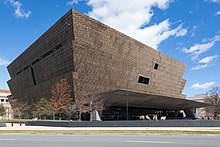

On Sept. 24, 2016 Pres. Obama dedicates the Smithsonian Institution's Nat. Museum of African Am. History and Culture on the Nat. Mall in Washington, D.C. (opened Dec. 19, 2003), featuring the Contemplative Court, complete with a cylindrical fountain raining down from a skylight to the center of the room.

In Mar. 2017 Ghana-born Nancy Abu-Bonsrah (1990-) is accepted into the Johns Hopkins U. School of Medicine's neurosurgery residence program, becoming the first black woman.
On Aug. 12, 2017 after marching on the U. of Va. campus the night before, the white nationalist Unite the Right rally in Charlottesville, Va. to protest the removal of a statue of Confed. Gen. Robert E. Lee ends in violent clashes with counter-protesters, after which a car driven by white supremacist James Alex Fields Jr. rams the crowd, killing 32-y.-o. Heather Heyer and injuring 19; on Aug. 15 black protesters pull down a statue of a Confed. soldier in Durham, N.C.; on Aug. 15/16 (night) Baltimore, Md. mayor Catherine Pugh orders four Confed. monuments taken down. On Aug. 14 after the fake news media blasts him for not explicitly calling out white supremacists in his criticism of the Charlottesville protest, as if he supports them, Pres. Trump meets in the White House with atty. gen. Jeff Sessions and FBI dir. Chris Wray, then delivers a gives a Speech on Racism, with the soundbyte: "Racism is evil, and those who cause violence in its name are criminals and thugs, including the KKK, Neo-Nazis, White Supremacists, and other hate groups that are repugnant to everything we hold dear as Americans", confirming that the FBI and Dept. of Justice are investigating the car attack; too bad, on Aug. 15 Trump doubles down with observations that "both sides" were to blame for violence in Charlottesville, mentioning "the alt-left that came charging at them", that "Not all of those people were neo-Nazis... [or] white supremacists... Those people were also there because they wanted to protest the taking down of a statue", claiming that many "fine people" were among the protesters, and that the movement to strip the U.S. of its 850+ Confed. monuments is an effort to "change history" and "change culture", mentioning George Washington and Thomas Jefferson, which only makes the PC police madder; on Aug. 16 after some CEOs quit to protest his remarks, Trump disbands two high-profile business advisory councils; on Aug. 18 House Dem. Leader Nancy Pelosi endorses a measure to censure Trump, joining 79 Dem. colleagues, and calls on House Speaker Paul Ryan to remove all Confed. statues from the U.S. Capitol; meanwhile on Aug. 7 U.S. Rep. (D-Tenn.) Steve Cohen introduces articles of impeachment against Trump after his no confidence resolution in July went nowhere. On Dec. 9 the $20M Miss. Civil Rights Museum in Jackson, Miss. opens, becoming the first state-sponsored civil rights museum in the U.S.; the opening is attended by Pres. Trump amid protesters, while U.S. Rep. (D-Miss.) Bennie Thompson, U.S. Rep. (D-Ga.) John Lewis, and Jackson mayor Chokwe Antar Lumumba refuse to attend.
In 2018 virtually every new TV ad in the U.S. features a black actor, with biracial couples becoming increasingly common; actors of other races don't object to being shut out of jobs so that the U.S. can be portrayed as 50% black and increasingly biracial, even though blacks are only 12% of the pop. and biracial couples 15%?
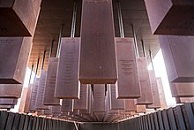
On Apr. 26, 2018 the Nat. Memorial for Peace and Justice (Nat. Lynching Memorial) in Montgomery, Ala. opens, commemorating 4K victims of lynching in the U.S., with 805 hanging coffin-shaped steel rectangles, each representing a county.
On May 20, 2018 (eve.) the 2018 Billboard Music Awards on NBC-TV, hosted by Kelly Clarkson see Ed Sheeran and Kendrick Lamar receive six awards each; they and Bruno Mars got 15 nominations each; Janet Jackson and Rhythm Nation rock the house with "Nasty", "If", and "Throb", and gives a speech for her Icon Award (first black woman), with the soundbyte: "I'm deeply humbled and grateful for this award. I believe that for all the challenges, for all our challenges, we live at a glorious moment in history. It's a moment when, at long last, women have made it clear that we will no longer be controlled, manipulated, or abused. I stand with those women, and with those men equally outraged by discrimination, who support us in heart and mind."

On Jan. 29, 2019 (2:00 a.m.) gay biracial "Jamal Lyon in Empire" actor Jussie Smollett (1982-) claims to be attacked in the Streeterville neighborhood of Chicago, Ill. by two white men wearing ski masks who shout racial and homophobic slurs, incl. the soundbyte "This is MAGA country"; after all the usual PC leftist media personalities and politicians incl. Kamala Harris (who tweets that it is "a modern-day lynching") jump to label it a hate crime proving that Pres. Trump's supporters are all violent bigots that he fostered, it turns out that Smollett staged the event to get publicity, causing a backlash against the Never Trumpers that they're the bigots, who jump to judge white males but pretend to reserve judgment as long as possible for black males, women, gays, etc.; on Feb. 20 after the Nigerian-born brothers Abimbola "Abel" Osundairo and Olabinjo "Ola" Osundairo testify before a grand jury, Feb. 20 Smollett is charged with felony disorderly conduct, which carries up to a 3-year prison sentence and a requirement to recompense the police for the cost of their investigation over his false police report.
On June 29, 2018 West Point Academy announces the appointment of Lt. Gen. Darryl A. Williams as its first-ever black suptd. (#60).
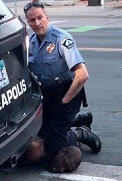
On May 25, 2020 after being arrested for passing a counterfeit $20 bill, 46-y.-o. black man (longtime drug user and petty criminal) George Floyd (b. 1973) is executed on the streets of Minneapolis, Minn. by slow strangulation by four police white officers while brave bystanders film it, screaming "I can't breathe" in vain before going silent as Dereck Chauvin stands with his knee on his neck for 8 min. 46 sec., sparking worldwide outrage and street protests, resulting in all four being fired and charged with 2nd deg. murder, and giving power to the left to lobby for massive changes in U.S. society to eliminate systemic racism; on June 4 despite being a criminal, George Floyd is elevated into a new black saint with a globally-televised memorial that features Al Sharpton comparing Floyd's plight to all black Americans, who forever live with whitey's knee on their necks.
On June 5, 2020 NFL commissioner Roger Goodell apologizes for the league's position opposing players kneeling during playing of the nat. anthem, expressing condolences to the families of George Floyd, Ahmaud Arbery, and Breonna Taylor, with the soundbyte: "We, the National Football League, condemn racism and the systematic oppression of Black People. We, the National Football League, admit we were wrong for not listening to NFL players earlier and encourage all to speak out and peacefully protest. We, the National Football League, believe Black Lives Matter. I personally protest with you and want to be part of the much-needed change in this country."
On June 7, 2020 leftist protesters in Parliament Square, London, England deface a statue of Winston Churchill with graffiti calling him a racist.
On June 8, 2020 after kneeling for 8 min.and guess how many sec. in memory of George Floyd while wearing African kente cloth stoles (used by Ashanti slave traders), U.S. House and Sen. Dems. introduce the U.S. Justice in Policing Act that would ban chokeholds and create a nat. reporting database for police misconduct.
On June 9, 2020 after Va. Dem. Gov. Ralph Northam announced the imminent removal of a statue of Robert E. Lee from Richmond, Va. on June 4, the U.S. Marine Corps orders the removal of all Confed. paraphernalia from all Marine bases around the world, causing U.S. Army Gen. David Petraeus to call for the removal of the names of Confed. figures from all U.S. military bases.
On June 8, 2020 leftist ANTIFA and Black Live Matter protesters set up a 6-block "police-free" ISIS-style barricaded Capitol Hill Autonomous Zone (CHAZ) (Antifastan?) surrounding the police dept.'s East Precint bldg. in downtown Seattle, Wash., with local rapper Raz Simone as warlord #1, causing Pres. Trump to threaten to send troops, sending the tweet to Seattle's mayor: "Take Back Your City Now. If You Don't Do It, I Will"; on June 11 the New York Times calls it "the Homeland for Racial Justice"; on June 15 the protesters change the name to CHOP (Capitol Occupied Protests) after the chop chop 1789 French Rev.; on July 1 (a.m.) after murders end their patience, police take it back, er, only the vacant police HQ before whimping-out and leaving the protesters in control, demanding a complete defunding of the police along with an endless list before they'll leave.
On June 22, 2020 white self-described black leftist Black Lives Matter activist Shaun King tweets the soundbyte that all statues of Jesus Christ portraying him as a "white European" should be torn down as "a form of white supremacy".
On June 22, 2020 (eve.) leftist protesters in Washington, D.C. attempt to set up their own copycat Black House Autonomous Zone (BHAZ) and attempt to topple the statue of Andrew Jackin in Lafayette Park, telling the Nat. Guard: "All your ancestors are in Hell"; on June 23 (6:45 a.m.) Pres. Trump tweets the soundbyte: "There will never be an "Autonomous Zone" in Washington, D.C., as long as I'm yuour President. If they try they will be met with serious force!"; no surprise, leftist Tweetistan partially censors it.
On June 23, 2020 Black Entertainment Television (BET) founder Robert Johnson appears on CNBC, and calls for Marxist revolutionary Black Lives Matter to form its own political party - insuring that the black Dem. vote will be split so that Trump will be reelected?
On June 23, 2020 1.6K Google employees sign an internal petition demanding their firm stop selling its software to the police, with the soundbyte that it should be "joining the millions who want to defang and defund these institutions".
On June 24, 2020 Greater New York Black Lives head Hank Newsome gives an interview to Martha MacCallum on FNC, uttering the soundbyte that if America doesn't give them what they want, they "will burn down this system and replace it", causing Pres. Trump to call it "treason, sedition, insurrection".
On June 25, 2020 (1 mo. anniv. of George Floyd's death) House Dems. pass the U.S. George Floyd Police Reform Act, which is so radical that it's a non-starter with Senate Repubs.; meanwhile House Repubs. introduce a resolution attempting to block defunding of the police, which is voted down by a straight-party 231-176 vote.
In June 2020 the Nat. Museum of African Am. History and Culture puts up a Web page that defines "whiteness" in America to incl. individualism, hard work, objectivity, the nuclear family, progress, respect for authority, delayed gratification, and science - they must believe the black race is obsolete?
On July 11, 2020 the city of Seattle, Wash. summons its white employees to a meeting titled "Interrupting Internalized Racial Superiority and Whiteness", telling them that their skin color is a crime?; meanwhile a Black Lives Matter member tells a white woman to get on her knees to apologize for the color of her skin?
On Sept. 30, 2020 Calif. Dem. gov. Gavin Newsom signs AB 3121 creating a 9-member Task Force to Study and Develop Reparation Proposals for African Americans, with a Special Consideration for African Americans Who are Descendants of Persons Enslaved in the United States"; Calif. entered the Union in 1850 as a free state.
On June 1, 2021 woke Pres. Biden visits Tulsa, Okla. to commemorate the 100th anniv. of the 1921 Tulsa Massacre, pledging federal money to reduce the racial wealth disparity gap regardless of laws prohibiting racial discrimination incl. $100B over 5 years for preferences for black-owned businesses, increasing their share from 10% to 50%. On June 17 Pres. Biden signs the Juneteenth Nat. Independence Day Act, making June 19 a nat. holiday, kneeling for 94-y.o. activist Opal Lee, with the soundbyte: "Juneteenth marks both a long, hard night of slavery and subjugation and a promise of a brighter morning to come. Great nations don’t ignore their most painful moments. They don’t ignore those moments in the past. They embrace them. Great nations don’t walk away. We come to terms with the mistakes we made. And remembering those moments, we begin to heal and grow stronger,"
On Apr. 26, 2022 Harvard U. pres. Lawrence Bacow announces the creation of a new $100M endowment fund to “close the educational, social and economic gaps that are legacies of slavery and racism", joining Georgetown U. and Princeton Theological Seminary.